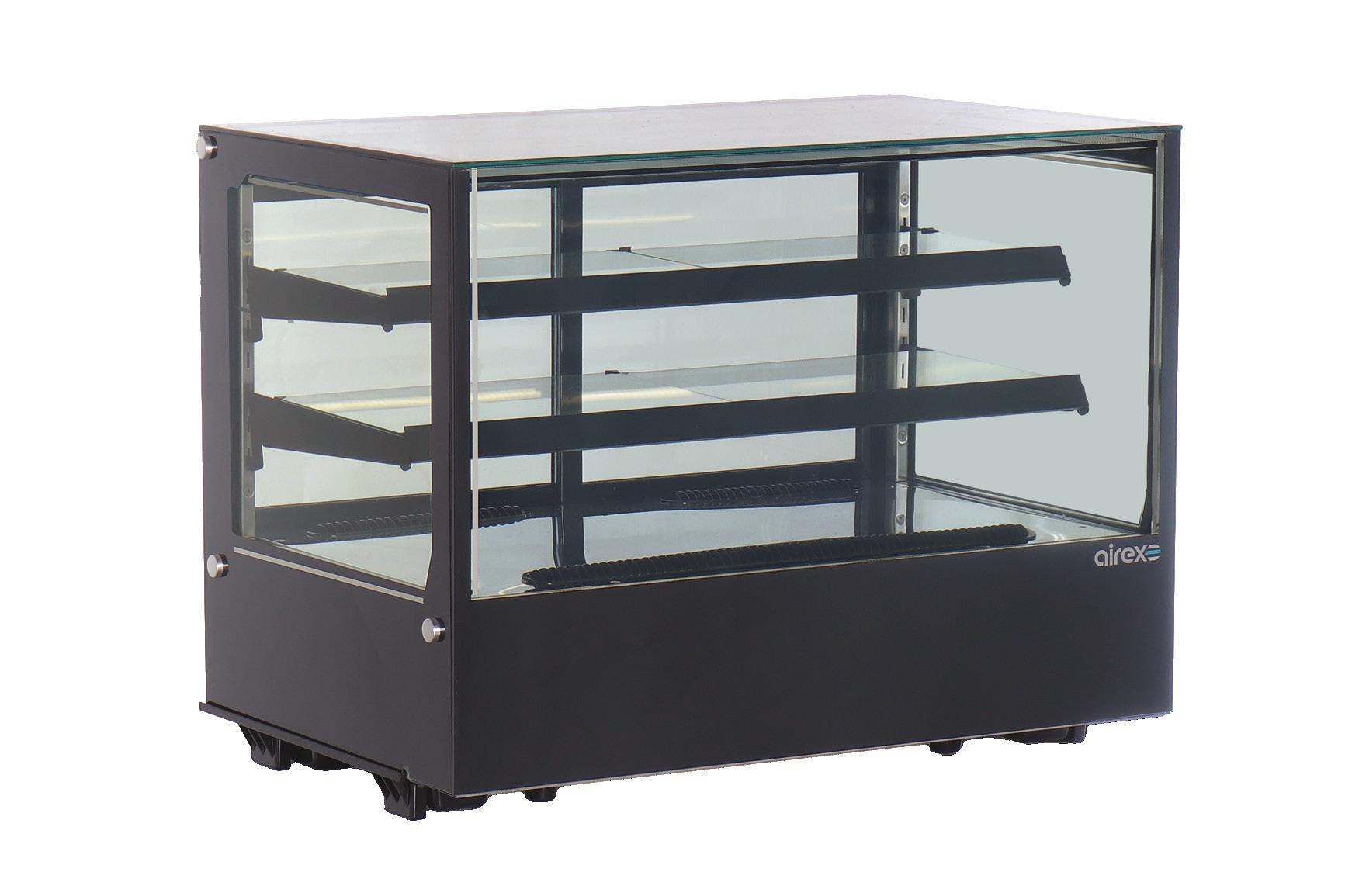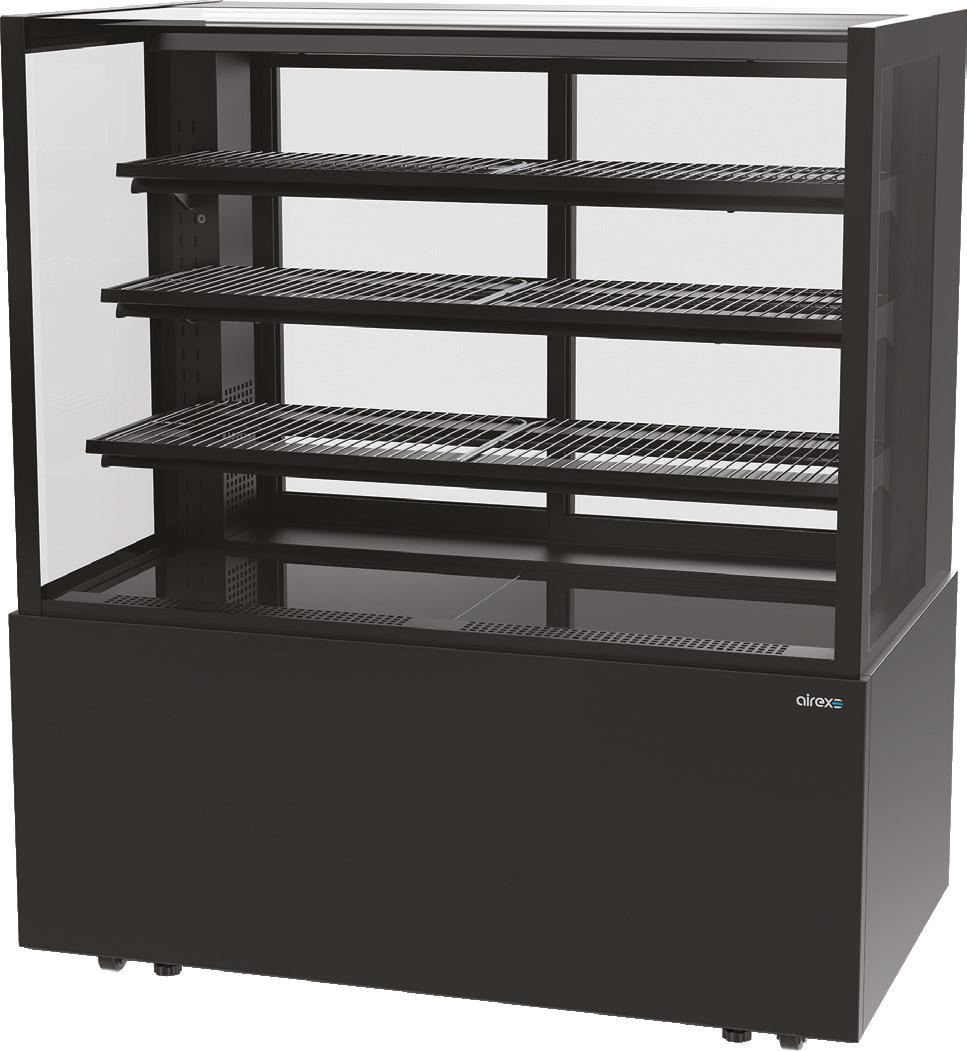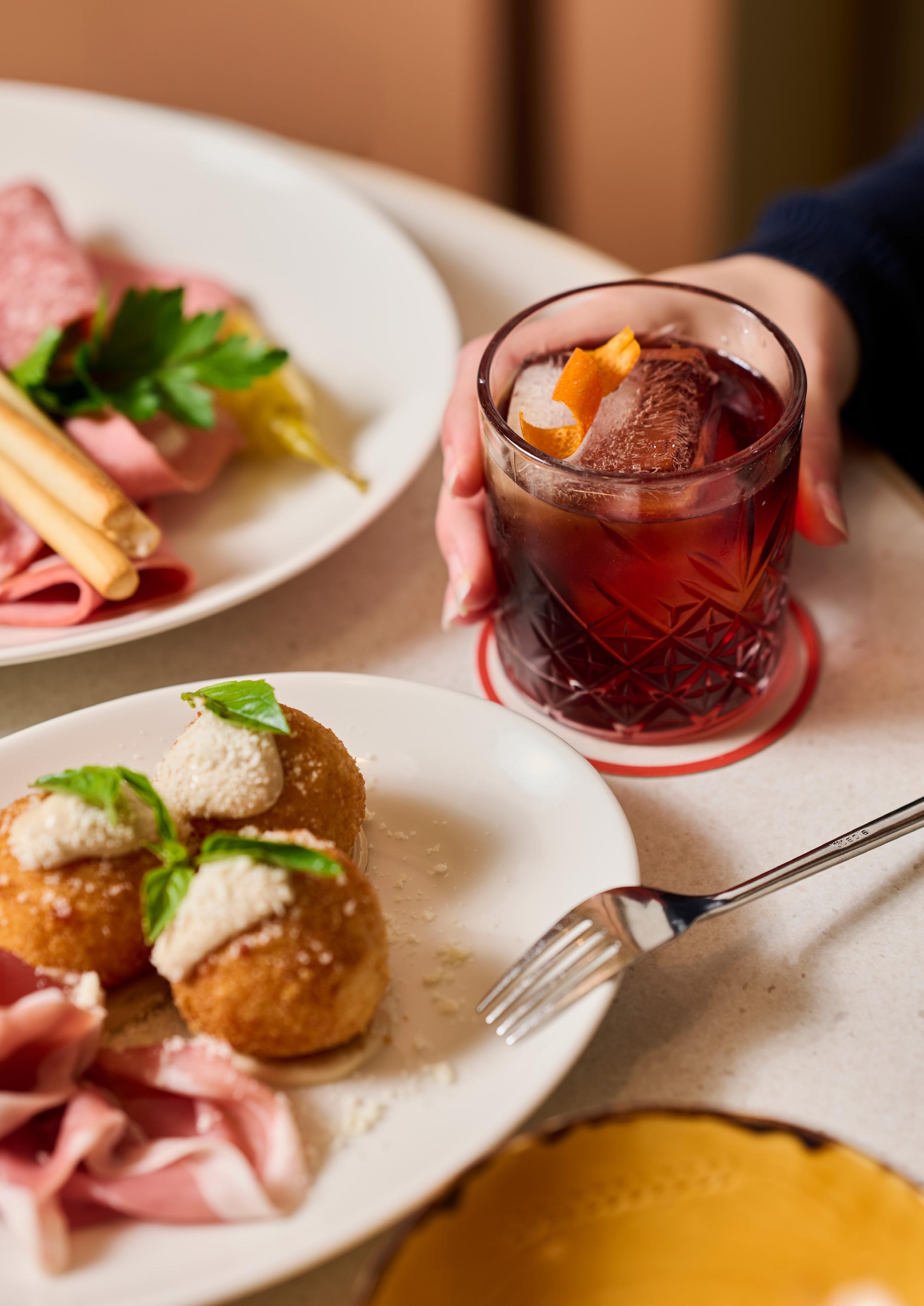

SPECIALS BOARD
The food, spaces and stories that will leave members wanting more this Spring
LOW ADMIN FEE







Signing in
Clubs are stepping into spring with fresh ideas, milestones, and new opportunities.

THE AUSTRALASIAN GAMING Expo has wrapped up for another year, and what a whirlwind it was. If you were there, I hope you left with a notebook full of fresh ideas to bring back to your club. Technology dominated the conversation, with compliance and regulation never far behind. It’s exciting, serious and timely all at once, which is a reminder that innovation always comes with responsibility. In this issue, we take a look at how some operators are finding the sweet spot between embracing new technology and staying true to their duty of care.
Speaking of a balancing act, the kitchen has its own tightrope to walk. Sustainability and rising costs are more critical concerns than ever. Sourcing local produce can be pricier, but many clubs are proving it’s worth supporting regional suppliers while delivering the quality and freshness members expect. We talk to some clubs about how they are rising to the challenge and creating summer menus that don’t break the budget.
This quarter has also been busy on the industry
awards circuit. I had the pleasure of attending the ClubsNSW Clubs and Community Awards, where I witnessed firsthand the camaraderie of the sector. Fundraising efforts to help Taree Aquatic Club get back on its feet following devastating floods were a highlight, and we’re thrilled to shine a spotlight on the results of that initiative.
And then there’s pickleball, which is now one of the world’s fastest-growing sports. Its popularity means some clubs are seeing it not just as a fad, but as a genuine way to attract new members and diversify their offerings.
As we shake off winter and head into spring, I hope this issue sparks some helpful ideas, whether it’s in thinking about how to tackle regulation, exploring new ways to diversify, or celebrating the ongoing legacy of your club.
Signing out.
Aimee
Editor, Club Management aimee@intermedia.com.au www.clubmanagement.com.au
Published by: Food and Beverage Media Pty Ltd
41 Bridge Road GLEBE
NSW Australia 2037 Tel: 02 9660 2113
Publisher: Paul Wootton
Managing Editor: Vanessa Cavasinni vcavasinni@intermedia.com.au
Editor: Aimee Chanthadavong aimee@intermedia.com.au
Commercial Director - Hospitality Group: Simon York Tel: 02 8586 6163 Mob: 0431 219 328 syork@intermedia.com.au
Group Art Director –Liquor and Hospitality: Kea Webb-Smith kea@intermedia.com.au
Production Manager: Jacqui Cooper jacqui@intermedia.com.au
Sourcing local produce can be pricier, but many clubs are proving it’s worth supporting regional suppliers.
Cover Venue: Southbound Clubhouse and Grill
Cover Photography: Ashleigh St George, Pew Pew Studios
Subscription Rates: 1yr (4 issues) for $36.00 (inc GST) 2yrs (8 issues) for $72.00 (inc GST)
To subscribe and to view other overseas rates visit www.intermedia.com.au or Call: 1800 651 422 (Mon – Fri 8:30-5pm AEST) Email: subscriptions@intermedia.com.au
WE CARE ABOUT THE QUALITY OF YOUR AIR
“Create safer and healthier spaces with tailored hygiene solutions that combine expert advice, data-informed decisions, automated workflows and personal care.”
Phil Gacitua General Manager
Airgene
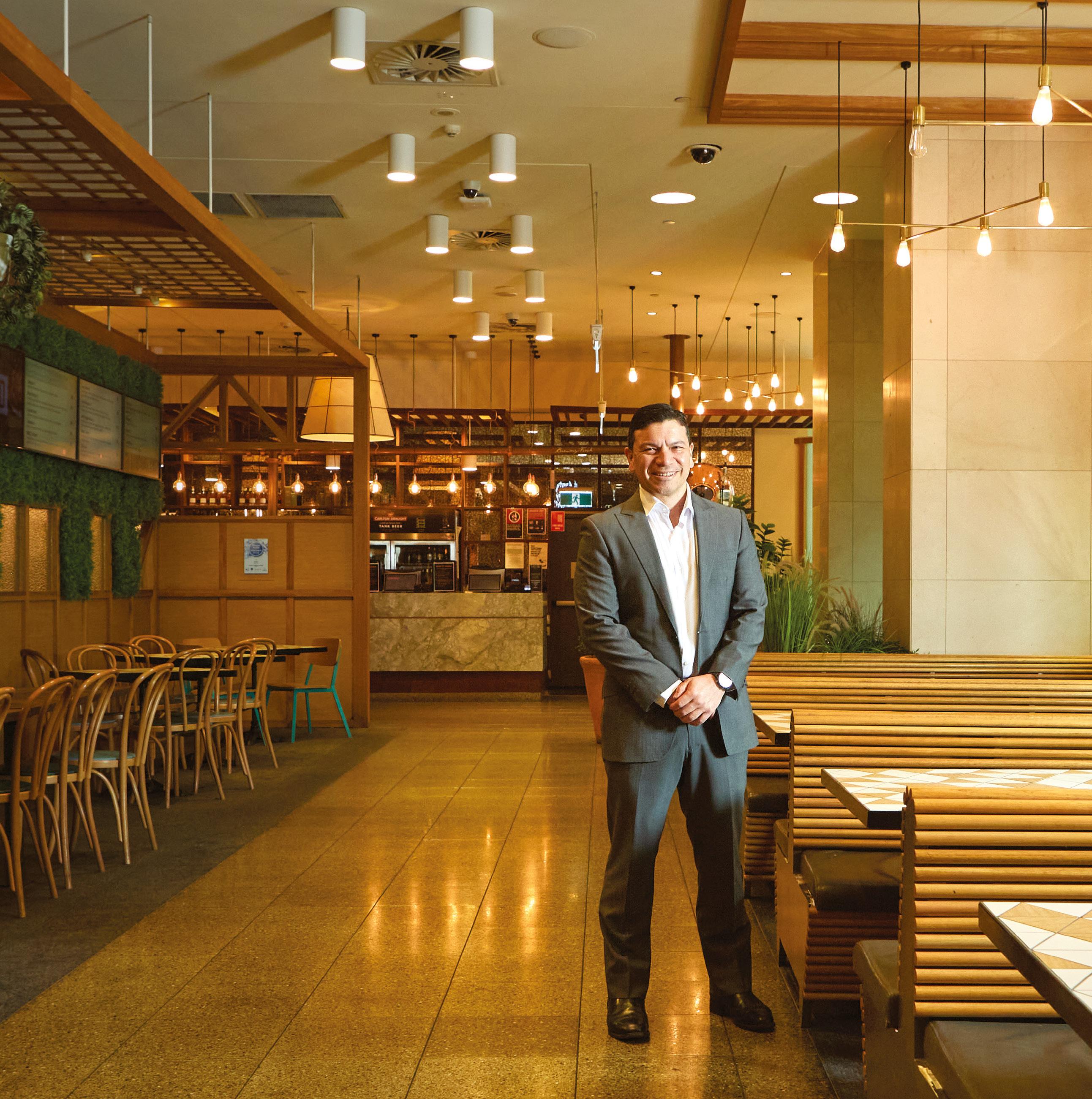
Scan to book a FREE system diagnostic and health check
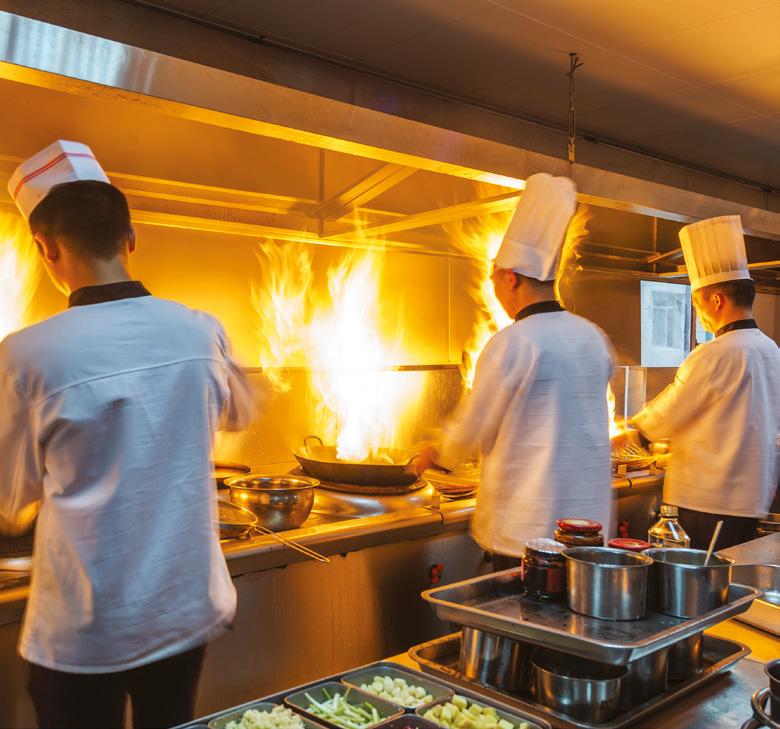
Your partner in indoor air quality, compliance and risk reduction
Improve indoor air quality and reduce fire hazards with tailored HVAC hygiene, kitchen exhaust cleaning and filtration services. Call Airgene today on 1300 728 310 to ensure compliance, extend asset life and reduce business risks.

Regulars
10 / News Briefs: Club news from across the country.
26 / The Foyer: The best new products on the market.
28 / The Bar: Fantastic new drinks products to stock behind the bar.
32 / On The Big Screen: The sporting fixtures that will make visitors flock to your sports bars.
98 / Q&A:
Kirwan Sports Club’s Angela Burling on what it means to be named the 2025 Women in Clubs Bursary recipient.
Features
34 / CEO Profile:
Joe Kelly on the potential he sees in North Ryde RSL.
38 / Responsible Clubs: Why it’s a crucial time to prioritise compliance training and reduce risk.
Spring 2025
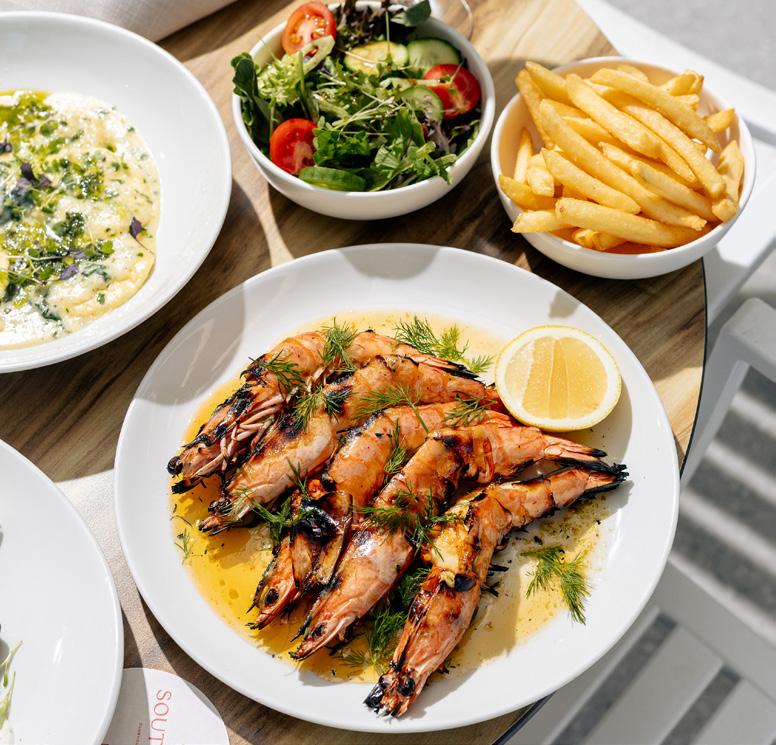
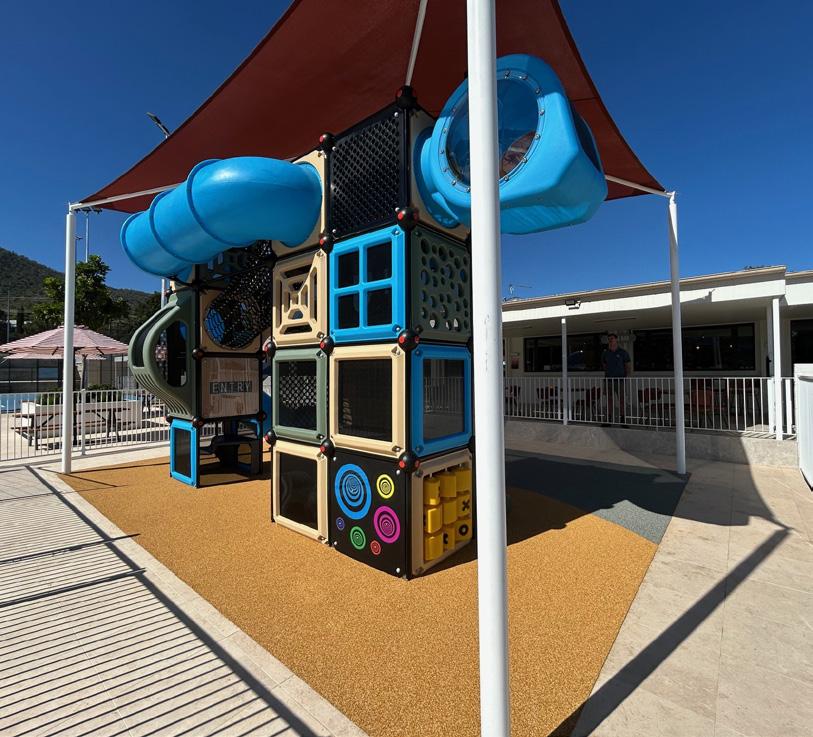
44 / Latest in Tech: Inside the technological advancements changing the way clubs operate.
52 / Marketing and Branding: What story does your club want to tell?
78 / Outdoor Areas:
How outdoor spaces are helping bring new life into venues.
Food And Beverage
58 / Summer Menu Designs: How kitchens are balancing seasonality, sustainability and member expectations.
72 / Chef Profile: What keeps Frankston RSL’s Dean Webster chasing new flavours and fresh ideas.
In Focus
84 / Pickleball: It’s the hot new sport that’s caught the attention of some bowling clubs.
Redevelopment
88 / Broadbeach Bowls Club:
A new look was unveiled just in time for the Australian Open Bowls.
Events and Awards
20 / Hospitality NT Awards:
The night of nights for Northern Territory’s hospitality industry.
22 / Post-AGE:
All the highlights from this year’s Australasian Gaming Expo.
74 / Perfect Plate:
NSW club diners voted for their favourite dishes.
90 / ClubsNSW C&C Awards:
A chance to recognise the clubs making a difference in their communities.
94 / CCV Awards:
Victoria’s leading community clubs were honoured at this year’s gala awards.





In the

What’s happening
in clubs across Australia
Forestville RSL redevelopment gets green light
Forestville RSL has announced its $76 million plan to build new club facilities and a boutique retirement community has just been given the tick of approval by the local council and planning panel.
Under the approved plans, the club will build a new single-level club featuring meeting and function spaces, multiple dining options, family-friendly play areas, configurable event spaces, RSL displays and a sub-branch office space. Alongside this new club facility will be Garraway, a boutique retirement living village housing 52 independent seniors living apartments.
Forestville RSL CEO Ian Thomson said the redevelopment will allow the club to diversify its income while improving club facilities.
“The redevelopment reflects the same foresight our founders demonstrated 66 years ago,” he said.
“We are acting now to protect the financial wellbeing of the club and ensure we remain a vibrant centre for the local community. Most importantly, we are proud to achieve this without selling any of our land or relinquishing local control of our club.”
The club said the redevelopment is set to be delivered in two stages. The initial stage involves building the new club facilities, 16 units, and an underground car park while the existing club continues to operate. Stage two will see the construction of three additional independent living unit buildings with 36 apartments and associated car spaces, plus the demolition of the existing club facilities.
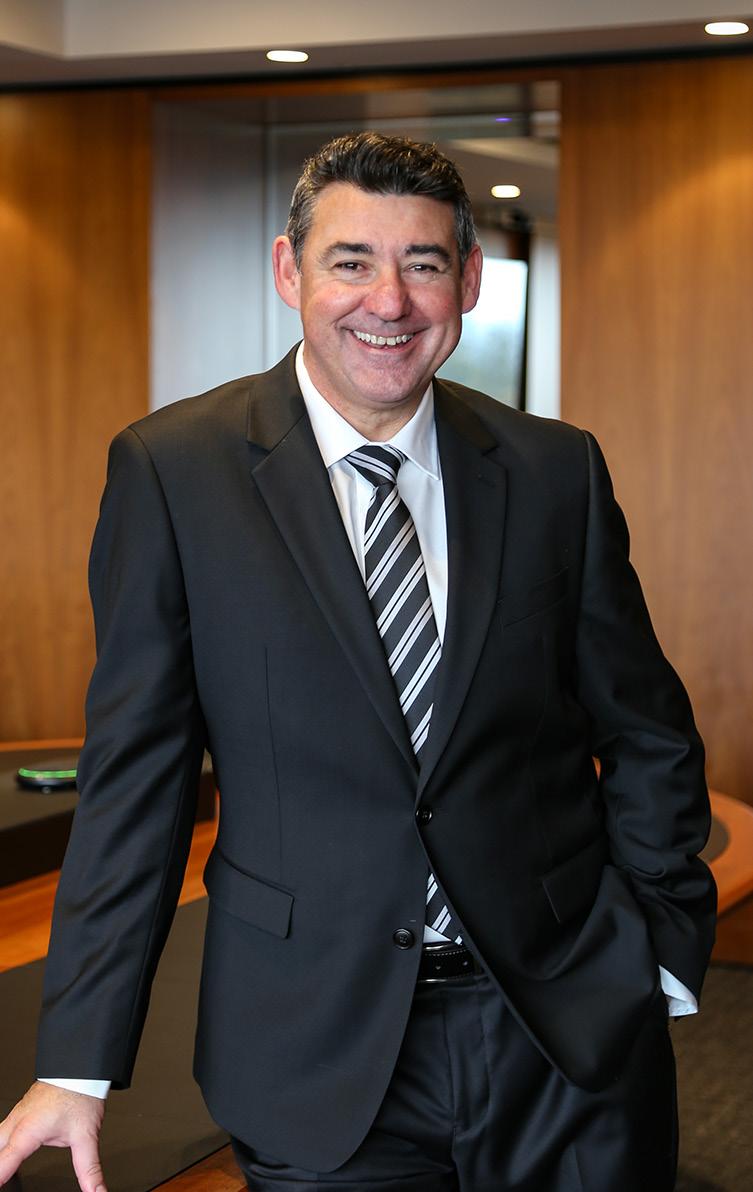
Holman Barnes Group names
Daniel
Paton as new CEO
Holman Barnes Group has announced the appointment of Daniel Paton as its new chief executive officer, succeeding Simon Cook.
Paton steps into the role after serving as the group’s chief financial officer for the past nine years.
“I’ve really found a home here. The progression from CFO was a natural one, because I’d been working closely with the former CEO on strategy and master planning, and have been part of implementing that strategy,” Paton said.
Paton takes over at a pivotal time for the group, with major projects in the pipeline. These include an expanded food and beverage precinct at the Markets Club, which is on track for a Christmas completion; a complete upgrade of Croydon Sports Club; and the long-awaited return of a registered club to the Balmain Leagues Club site as part of the new Rozelle Village.
There’s also an ambitious plan to redevelop the Wests Ashfield headquarters that will deliver new function spaces and the group’s first hotel.
“We’ve got a progressive board that is keen to get these projects underway and give a new offering to our patrons,” Paton said.
“Function space is something we’ve needed to improve on for a long time, and it’ll bring in a new demographic.”
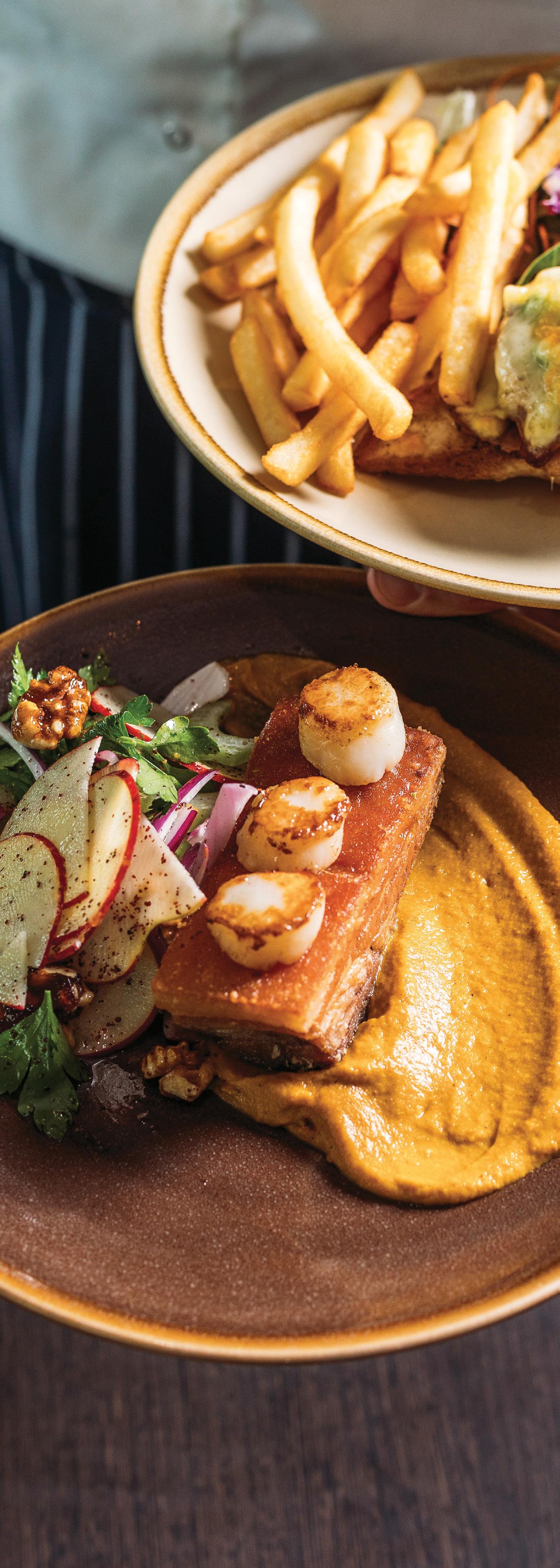
“Future





New F&B concepts with a point of difference to reposition your Club in a
Source outstanding F&B operating partners and suppliers.
Retain and win new customers with great service experiences.
Master the controllable F&B costs – labour and cost of goods.
Ron
Kent
| Vikings Group General Manager
Image: Ben Calvert | Vikings Group
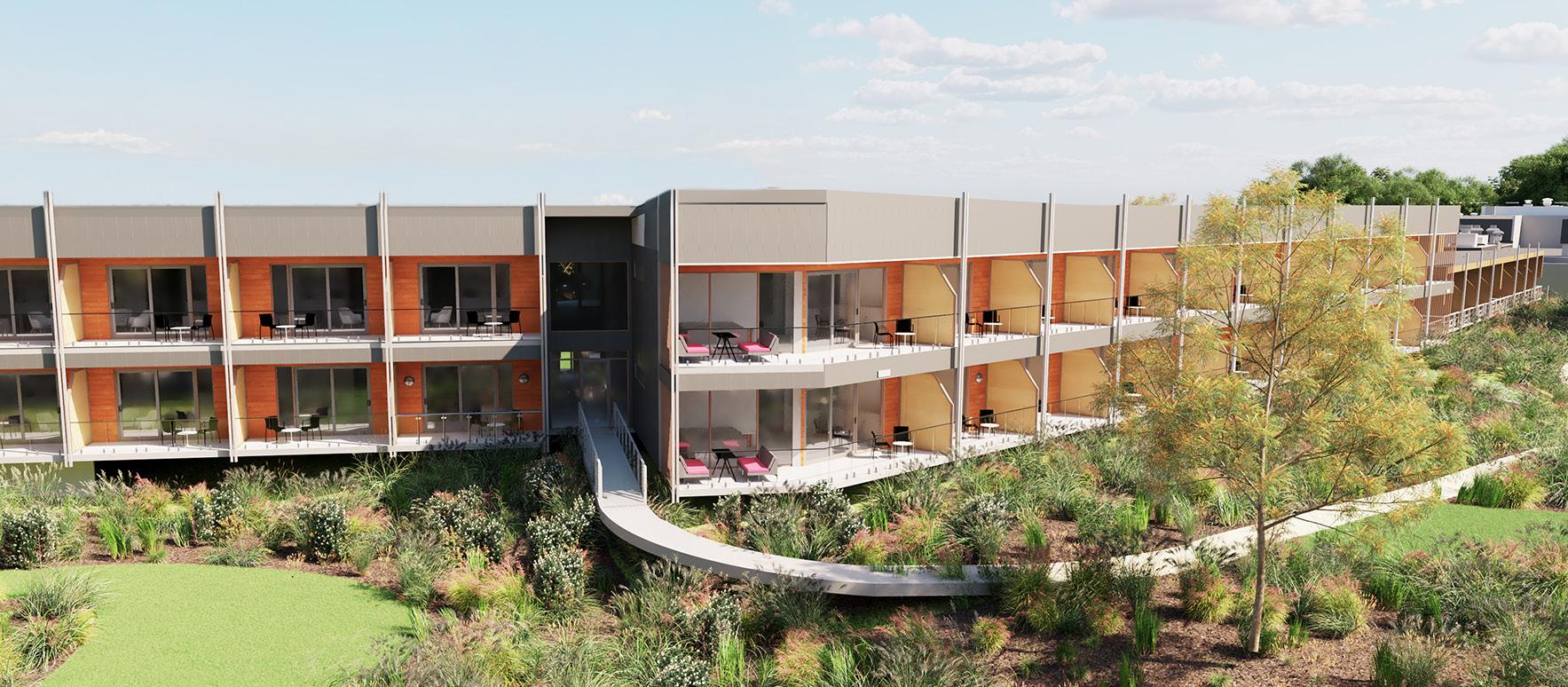
RACV
eyes multi-million-dollar Inverloch Resort
expansion
Royal Automobile Club of Victoria (RACV) has unveiled expansion plans for Inverloch Resort.
An additional 36 premium rooms will be introduced as part of a new two-level wing to allow the facility to welcome up to 20,000 additional guests annually. Floor-to-ceiling windows will give guests panoramic ocean views, while the bold design by architect firm GHD will be built using sustainable materials and native vegetation.
“With regional tourism booming post-pandemic, these new premium rooms will help address a significant market gap while elevating Inverloch’s status as a premium destination,” RACV executive general manager leisure Craig Peachey said.
According to RACV, the expansion will specifically target three underserved markets segments: the conference and events sector, travellers seeking premium coastal accommodations, and family groups requiring flexible room configurations.
With construction now underway, the new wing is expected to welcome its first guests by December 2026.
RACV’s position as Victoria’s leading accommodation provider has been reinforced after it claimed multiple awards at the recent 2025 Victorian Accommodation Awards for Excellence, including a third consecutive win for its RACV Torquay Resort’s meetings and events facilities.
Country Club Tasmania launches entertainment precinct
Country Club Tasmania has opened The Range, a new entertainment precinct featuring a clubhouse bar and restaurant serving a full menu daily, function space, a 28-bay driving range, and an 18-hole minigolf course.
The project has been 18 months in the making, with the help of Altis Architecture and Bearwood Group Builders.
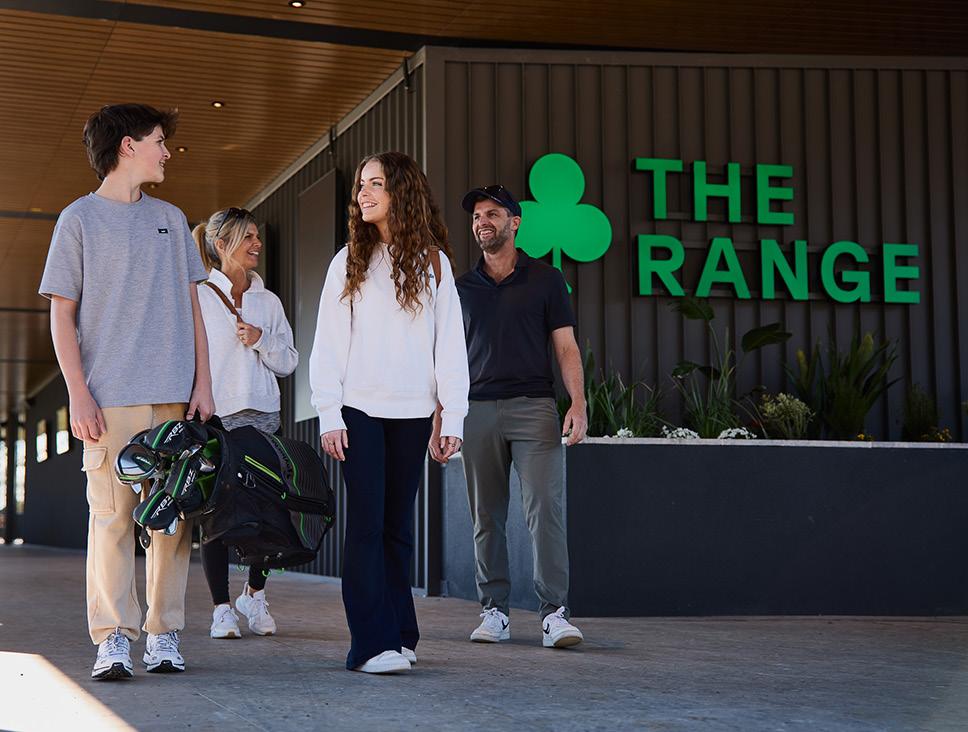
Country Club general manager Ross Hannah said the launch marks a bold new era of leisure and play in Launceston.
“With its cutting-edge design and vibrant atmosphere, the precinct brings a buzz to the region that’s been missing – offering a fresh, fun-filled experience for everyone who walks on the green. It’s the beginning of an exciting transformation unfolding at Country Club Tasmania,” he said.
The Range has been designed to appeal to all ages. “This addition reimagines the Tasmanian golf experience, making golf accessible, fun, and inclusive for all ages and skill levels,” Hannah said.
“It was inspired by other entertainment offerings across the country, with the intention of contributing to the resort’s bold vision to become a premier destination for golf in Australia.”
The Range is part of the venue’s $14 million facility upgrade, which also includes a major renovation of its golf course set to open in spring 2026.

North Ryde RSL unveils new logo
North Ryde RSL has introduced a new logo to mark the beginning of the club’s next chapter, to ensure it remains recognisable and relevant.
Inspired by the iconic rising sun from its existing emblem, the refreshed identity will be rolled out across club signage, digital platforms, uniforms, and communications over the next few months.
The club said its original crest will remain an important symbol of tradition, reserved for formal occasions.
“This new logo represents more than a refreshed design – it symbolises the strength, pride and unity of the North Ryde RSL Community Club,” CEO Joe Kelly said. “While we continue to honour the traditions and values that have shaped us since 1958, this modern identity reflects our commitment to staying relevant and accessible for generations to come.”
Turn to page 34 for our CEO Profile with Joe Kelly, as he shares what’s next for North Ryde RSL.

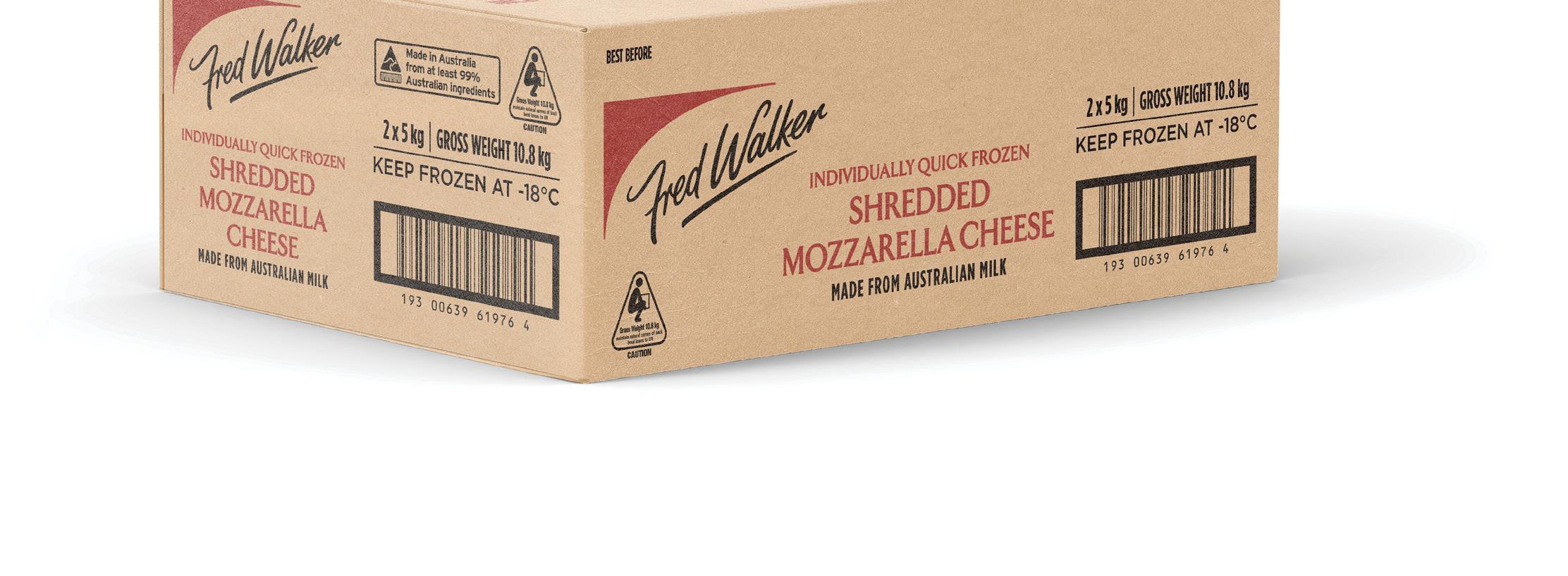
NEW
QUICK FROZEN MOZZARELLA
NEW Fred Walker Individually Quick Frozen Mozzarella is a quality, convenient, diced shred mozzarella that delivers the great TASTE , melt , STRETCH , and blister properties, with the added benefit of 365 days shelf life. Using a process of snap freezing mozzarella at its perfect age, it delivers the ultimate pizza solution all year round.
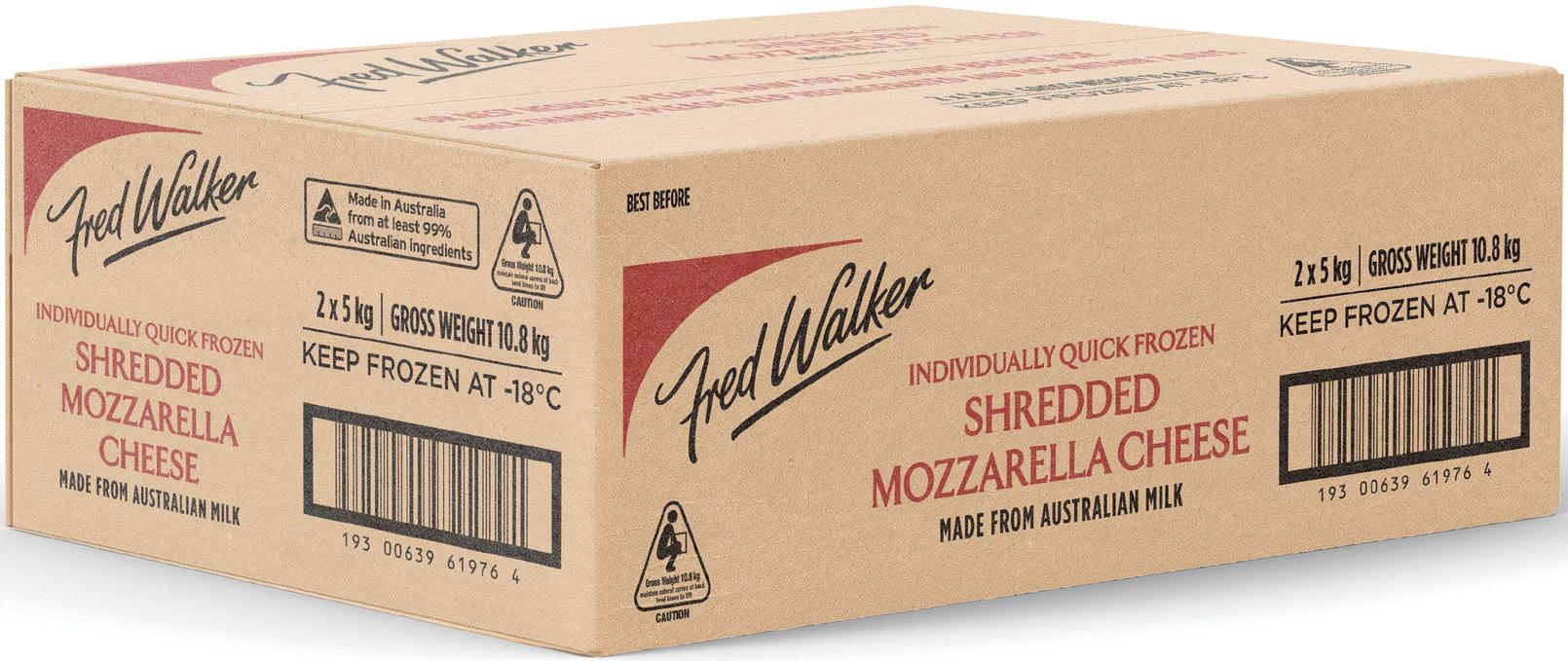

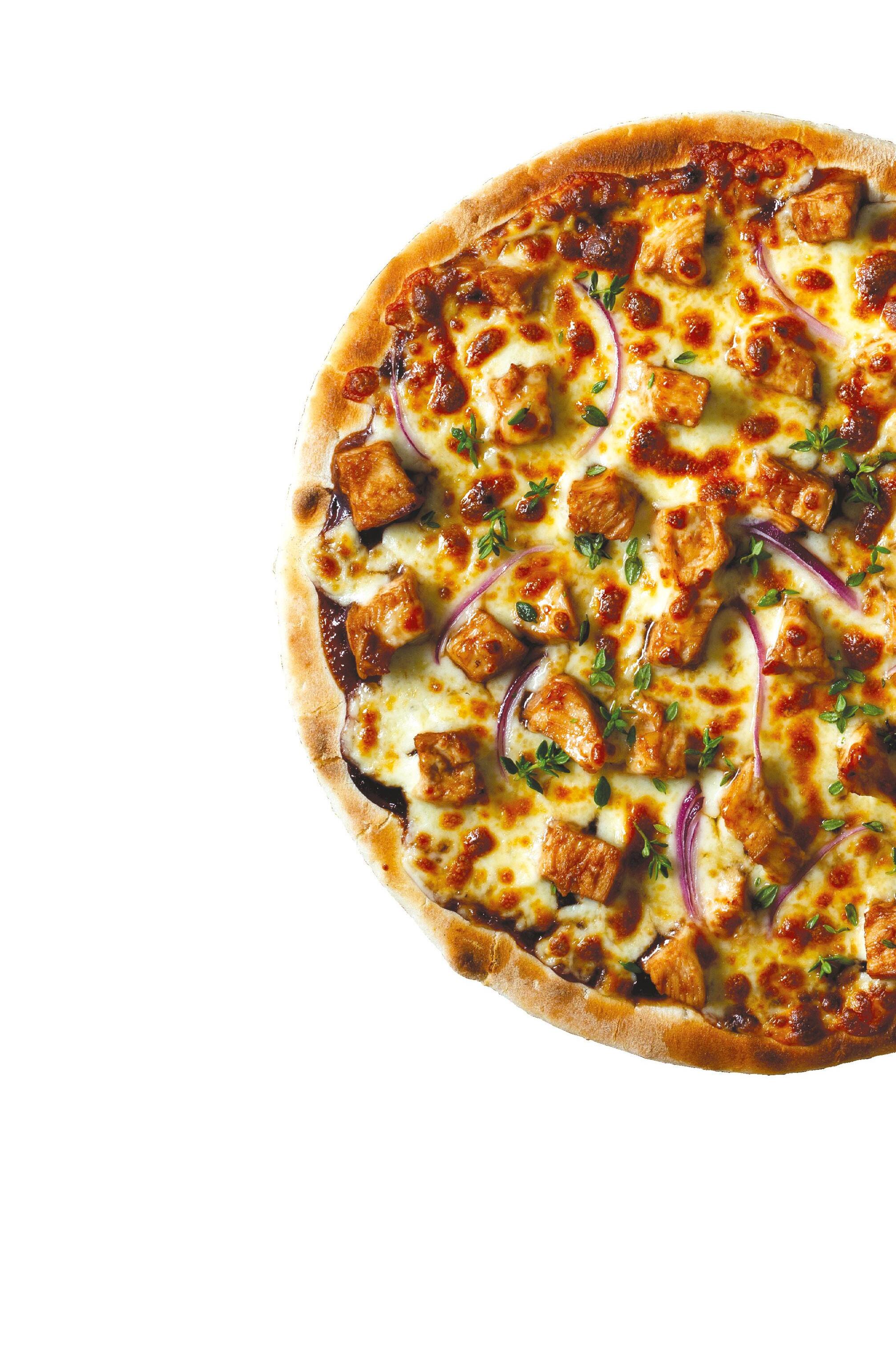


Taree’s beloved Sailo’s reopens after devastating floods
Two months after record-breaking floods tore through the NSW mid-north coast, the Taree Aquatic Club – known affectionately to locals as The Sailo’s – has reopened its doors, thanks to an extraordinary show of support from the wider club community.
The May floods saw the Manning River swell to unprecedented levels, gutting the much-loved waterfront venue. But a coordinated response led by ClubsNSW, along with boots-on-the-ground support from Disaster Relief Australia (DRA), helped the club back on its feet.
Clubs across New South Wales raised close to $385,000 to support The Sailo’s recovery and fund DRA’s clean-up efforts. Local clubs, such as Club Forster, also chipped in directly, donating furniture and offering practical assistance.
“The support from the club industry was overwhelming,” stated secretary manager Peter Hemingway. “From the moment ClubsNSW got in touch, their help was second to none.”
When Hemingway first reopened the doors after the floodwaters receded, the scene was grim.
“It was just a war zone,” he recalled. “There was about a foot of mud throughout the club. Freezers had toppled, the front desk was knocked over, pokies smashed, tables and chairs everywhere. It was a matter of opening the doors, throwing everything out the front, and hosing the place down.”
Fire and Rescue NSW in Taree also lent vital assistance in those chaotic early days. But the road to recovery was steep.
“All the catering and bar equipment had to be replaced. It was a complete restart,” Hemingway said. “Our main electrical board was half underwater. We had to replace the elevator, the fire and security systems, sensors, everything.”
Despite the extensive damage, The Sailo’s has been back operating since mid-July, complete with a refreshed look. A new reception desk, new furniture, and a fresh coat of paint have given the space a lift.
“We’ve had great support from the community coming back in for a meal or a drink,” Hemingway said.
ClubsNSW CEO Rebecca Riant said the reopening is a powerful reminder of the role clubs play in the lives of regional communities.
“Clubs are the heart of their communities, and when disaster strikes, they always step up,” she said.
“This was evident during the flood emergency, when 12 of the 15 official evacuation centres were located within clubs.
“The donations from clubs reflect the deep commitment our industry has to not only helping communities rebuild after devastation but to rebound stronger than ever. It’s in the toughest of times that our clubs truly shine.”

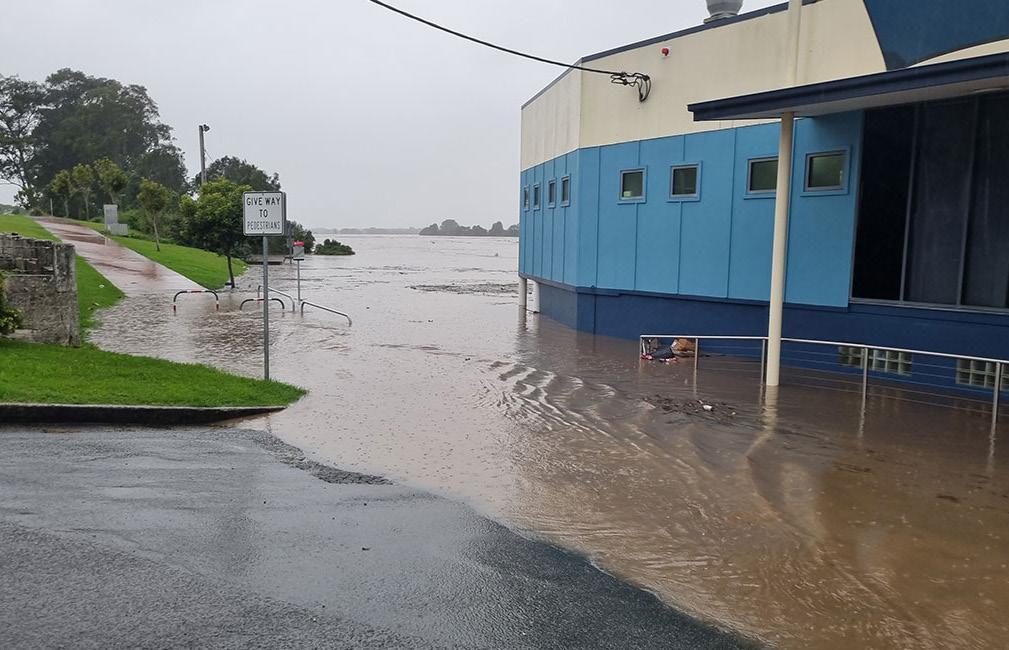
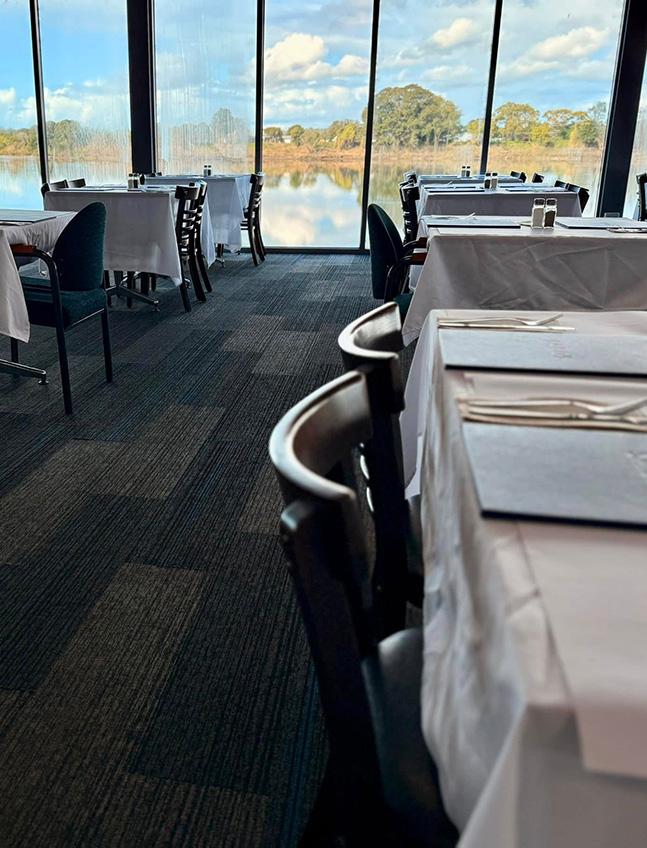
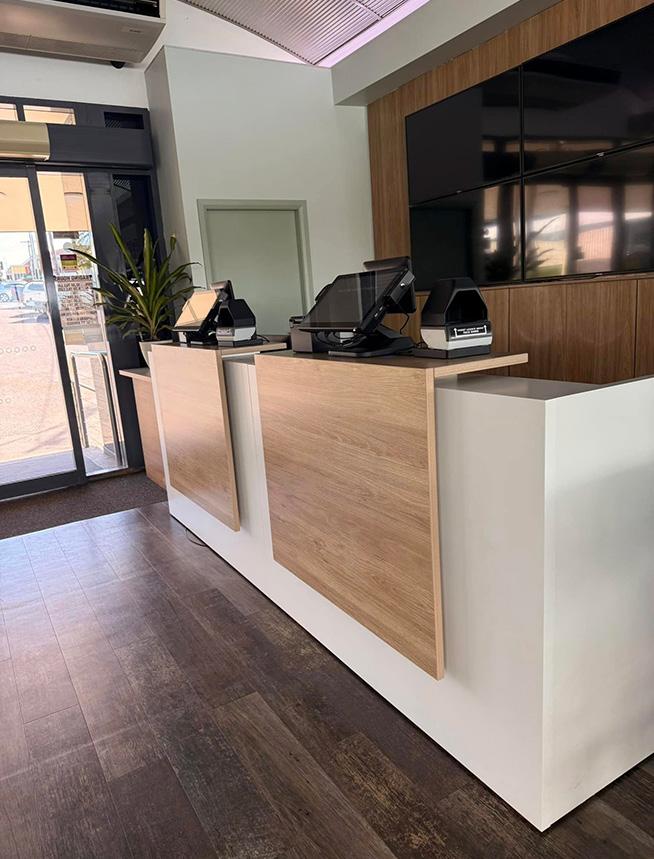
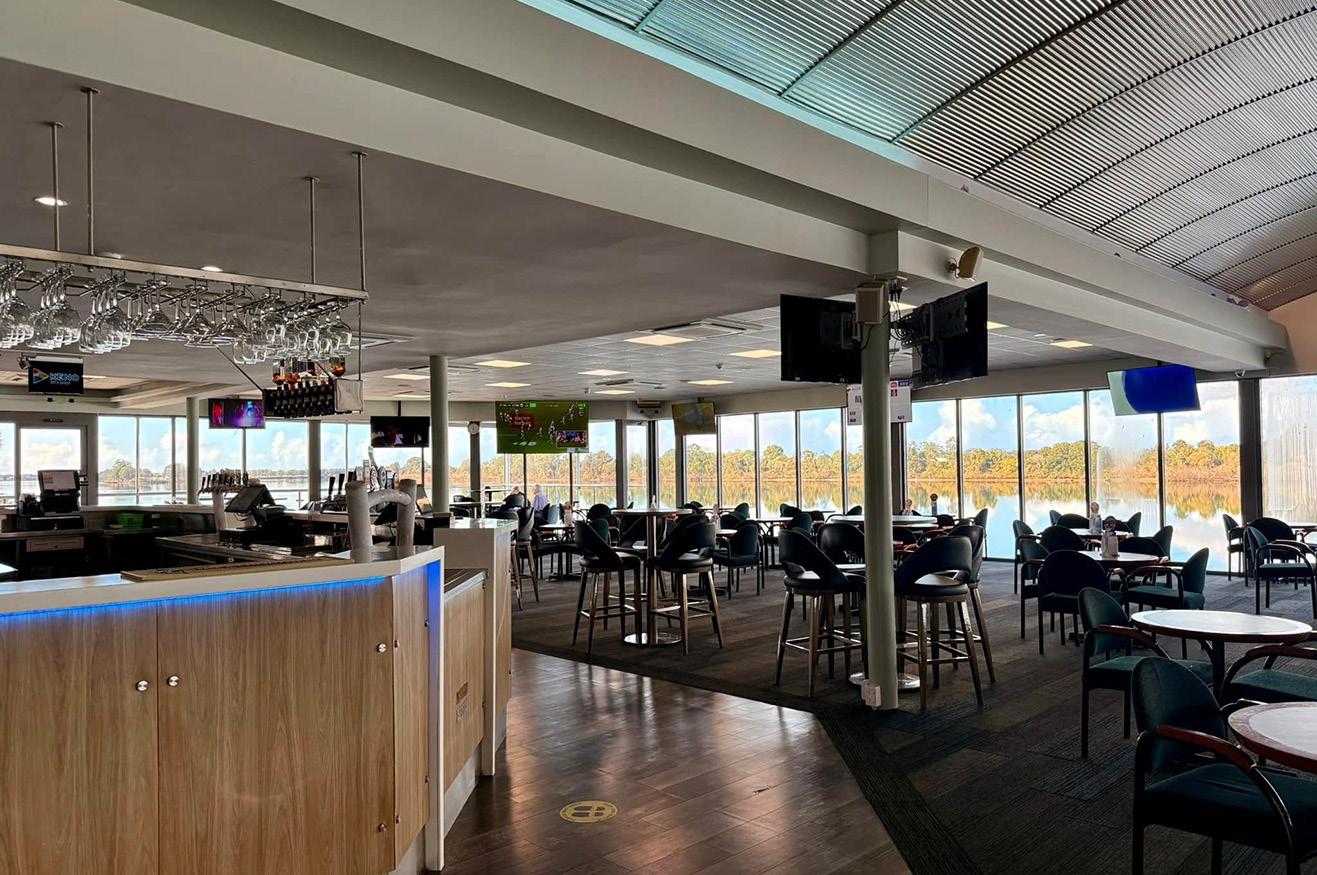



A render of the façade of the new-look Cabravale Club Resort.
A render of the rooftop pool of the new Novotel hotel that’s opening in November.


A century in the making
From its humble post-war origins to an ambitious resort-style reimagining, the newly renamed Cabravale Club Resort marks 100 years of history with a bold new chapter.
IN 1925, 20 returned servicemen found more than comradeship in a weathered army hut. Unbeknownst to them, they planted the seeds of a community. What began as a modest gathering place for those seeking purpose after war has grown into one of Western Sydney’s most significant clubs. This year, that story entered a new chapter.
Formerly known as Cabra-Vale Diggers, the club has officially rebranded as Cabravale Club Resort. The name change coincides with the club’s 100-year anniversary, marked by a centenary gala on 16 July.
“Cabra-Vale Diggers has grown from a humble hut into one of the great pillars in Western Sydney,” said club president Walter Robinson.
“Over the decades, we’ve expanded, modernised and adapted, but what has never changed is our heart. We’ve been a place where people laugh, breathe, celebrate and support each other.
“We’ve hosted weddings, wakes, milestones and memories. Our walls have absorbed the voices of thousands who have gathered not just to eat, drink and play, but to belong.”
The rebrand accompanies a multi-million-dollar redevelopment, which will introduce a 140-room
Novotel Hotel managed by Signature Hotel Management Group under the Accor brand, two destination dining venues led by culinary ambassador Dany Karam, and a suite of upgraded entertainment and business facilities.
But more than a name or a build, club CEO Boris Belevski said the centenary marked a renewal of purpose.
“It’s not just a rebrand,” he said. “It’s a renewed purpose putting care, connection and contribution at the heart of what we do.”
Honouring
the past, embracing the future
The centenary gala held at the club’s function venue, The Space, was more than a celebration. It was an opportunity for reflection and a glimpse into the future. NSW Minister for Gaming David Harris, who attended the gala, praised the club for its enduring community role.
“This facility has been able to grow because it’s supported by the community. It’s been able to do the things that it does in the community because it actually understands its local community,” he said.
“That comes through the fact that those directors, not just the current ones, but previous ones, have listened to
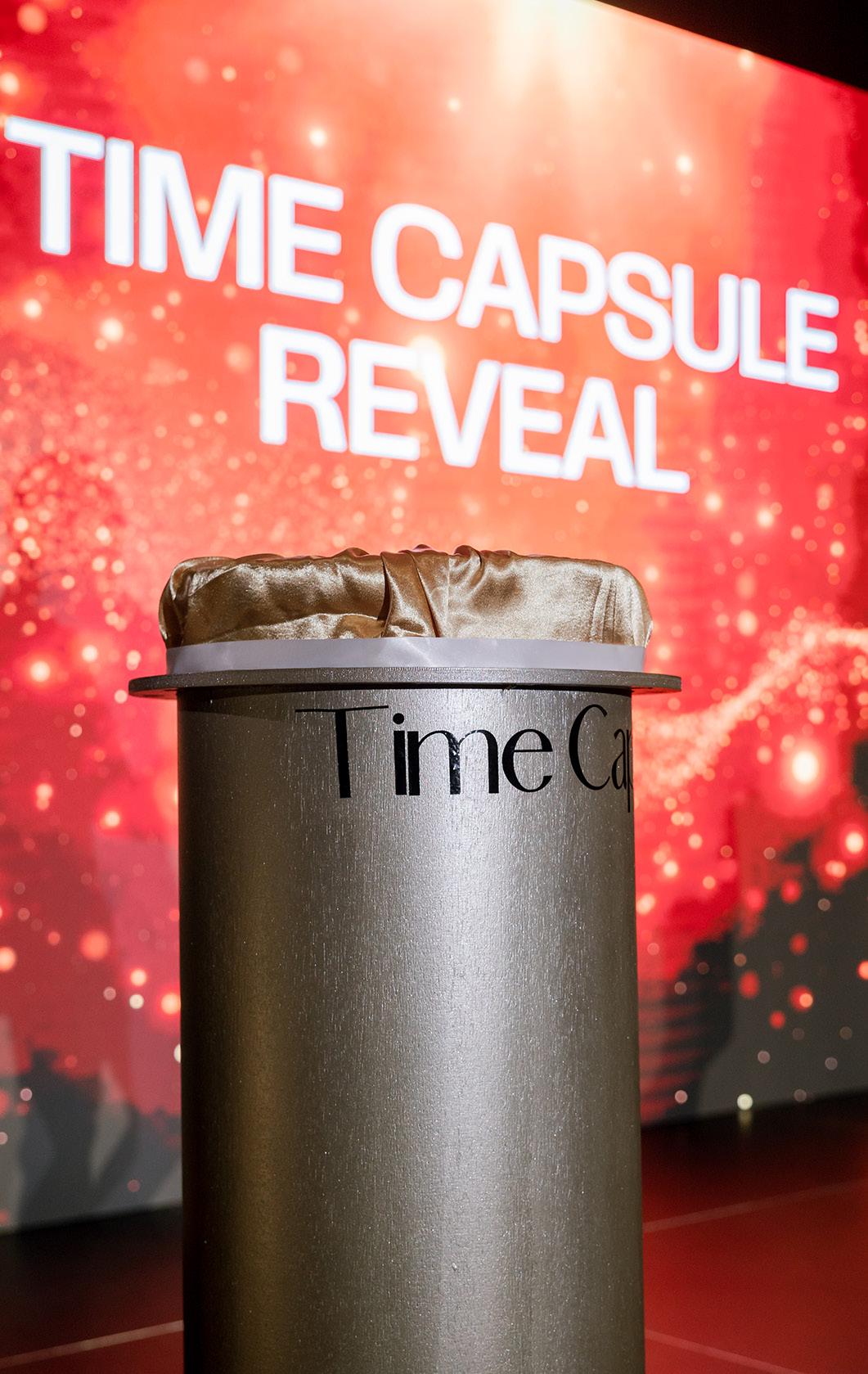
their membership and have built what is an amazing club here now, which has got even more to open in the near future.”
During the evening, guests witnessed the launch of a new time capsule, sealed with messages and mementoes to be reopened in 2050.
A newly published historical book Heritage & Heart was also unveiled on the night. It documents the club’s rich legacy through stories and rare photographs.
“While we honour the past, we also embrace the future with optimism and open arms,” Robinson said.
The club also used its centenary celebration to launch Cabravale Community, a new initiative that builds on its long-running Cabra Diggers Cares program, which has contributed over $1.75 million to local causes.
Under the new banner, Cabravale has announced a headliner partnership with The Sebastian Foundation, which tackles youth mental health through its Open Parachute program and builds resilience and peer support skills in schools.
With its redevelopment set to deliver a new cinema, karaoke complex with private rooms, business, and modern sports bar, Cabravale Club Resort is repositioning itself as “Australia’s first integrated club resort”.
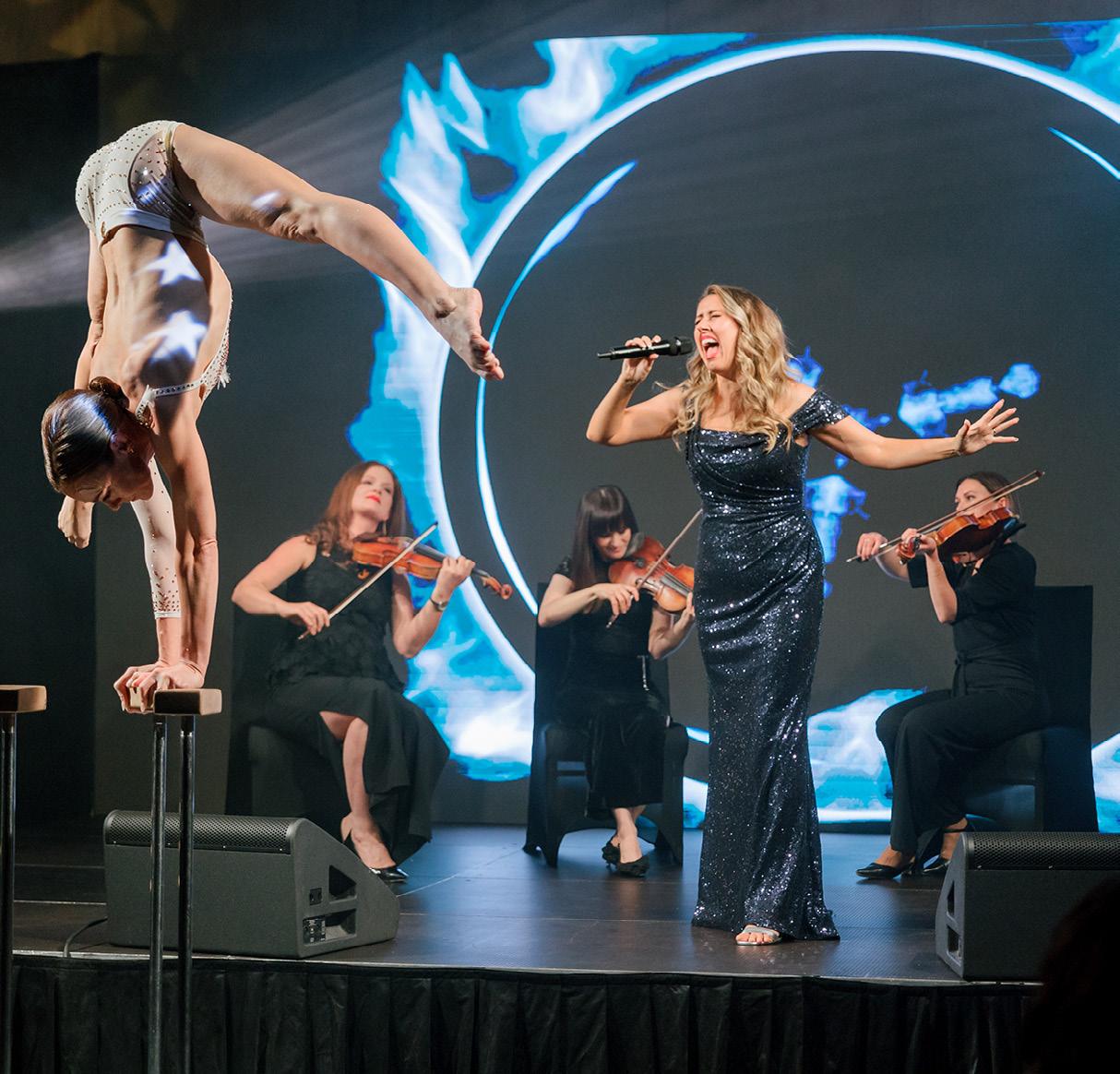
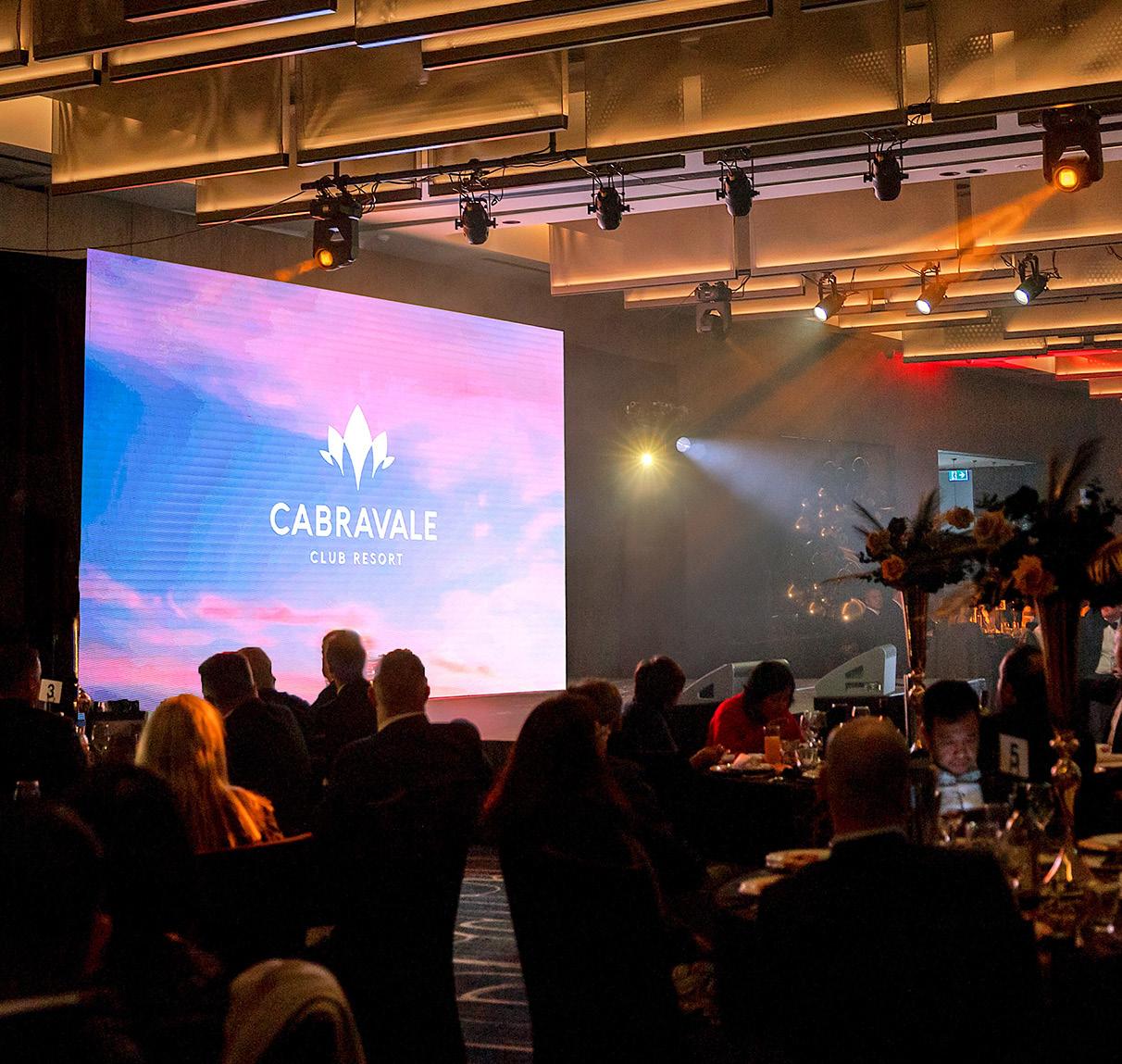
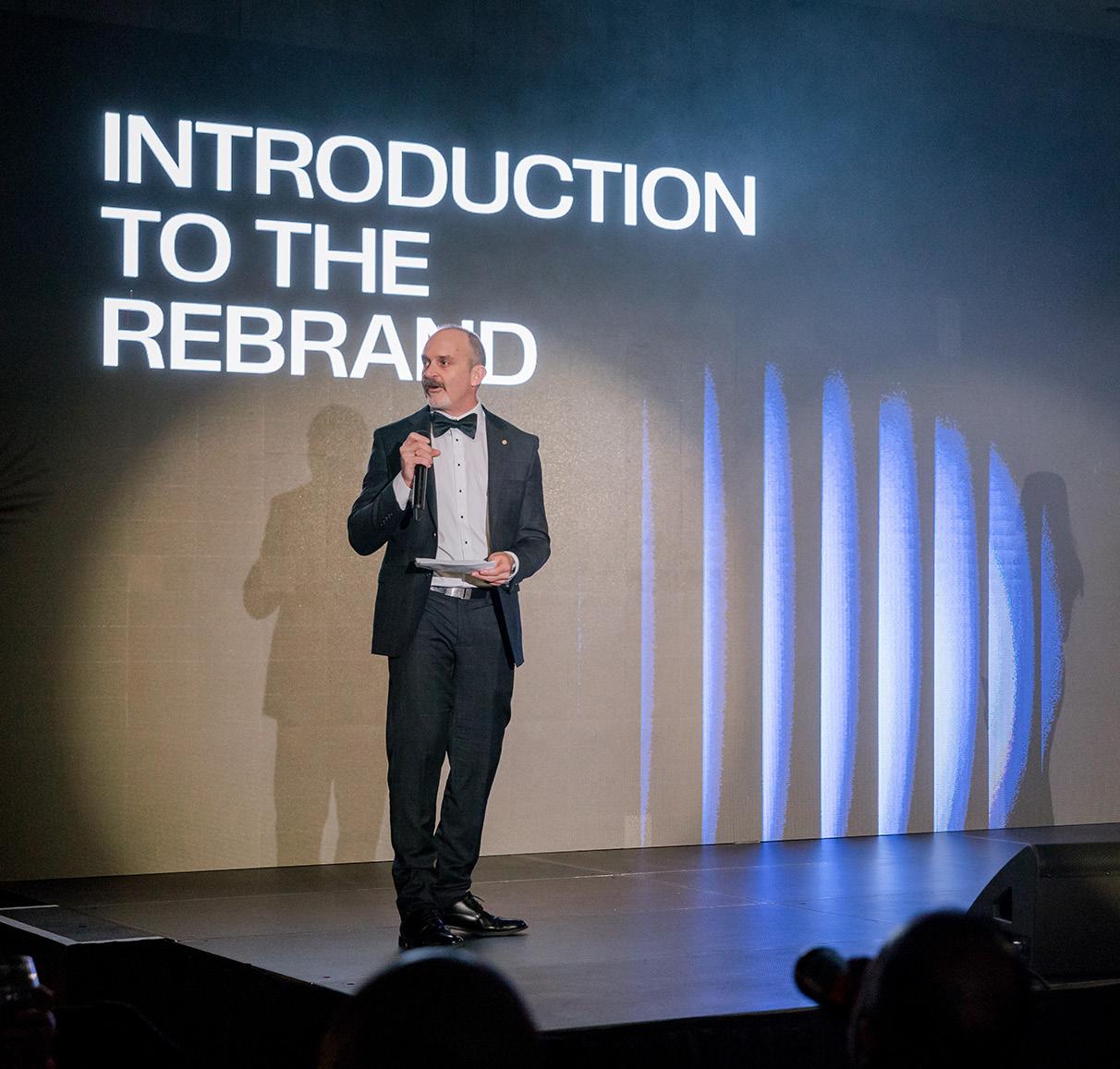
The Cabravale Club Resort gala dinner, with the new logo proudly displayed on screen.
The gala dinner’s opening act performed by 2023 The Voice Australia winner Tarryn Stokes, accompanied by a four-string quartet.
The time capsule to be opened in 2050.
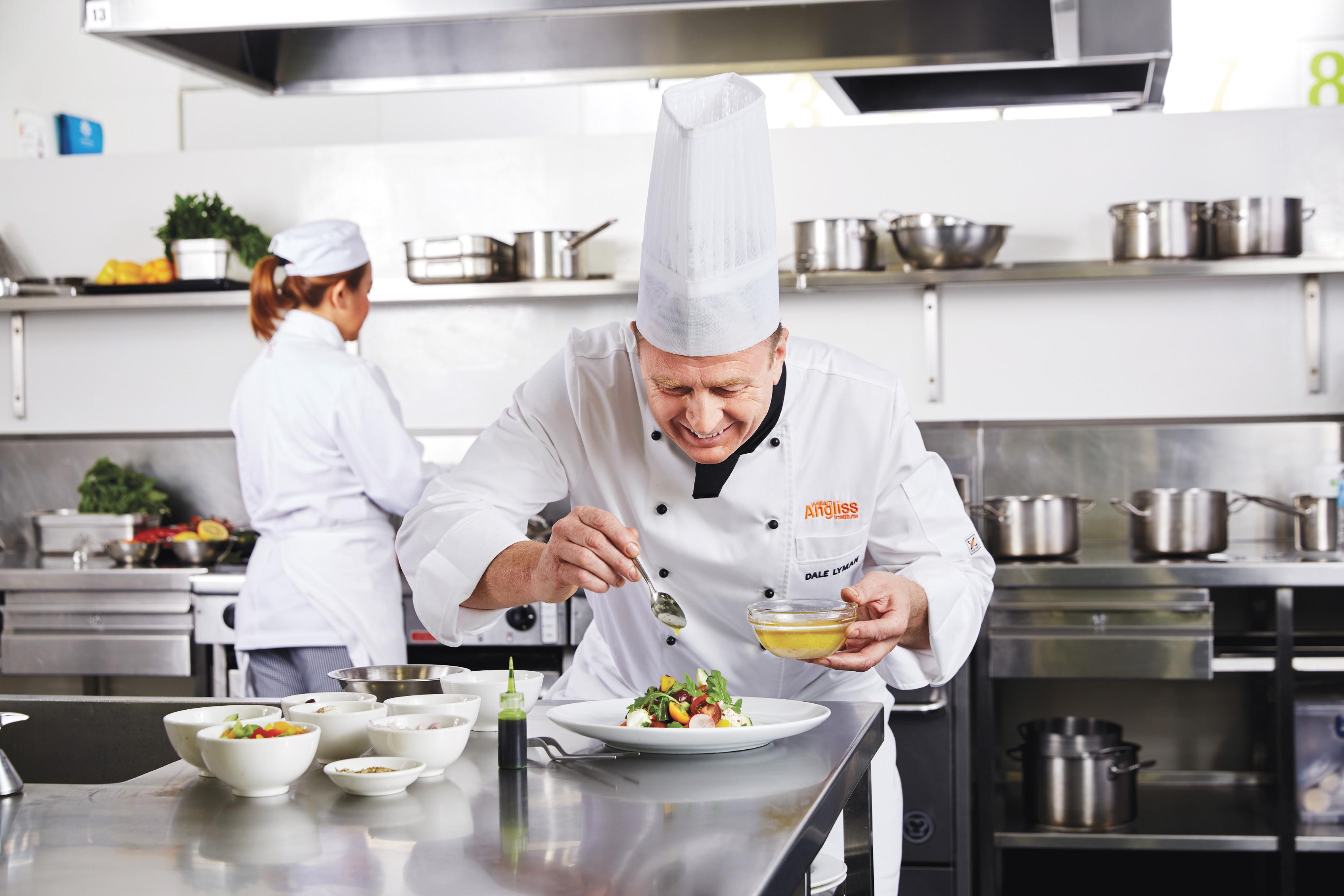

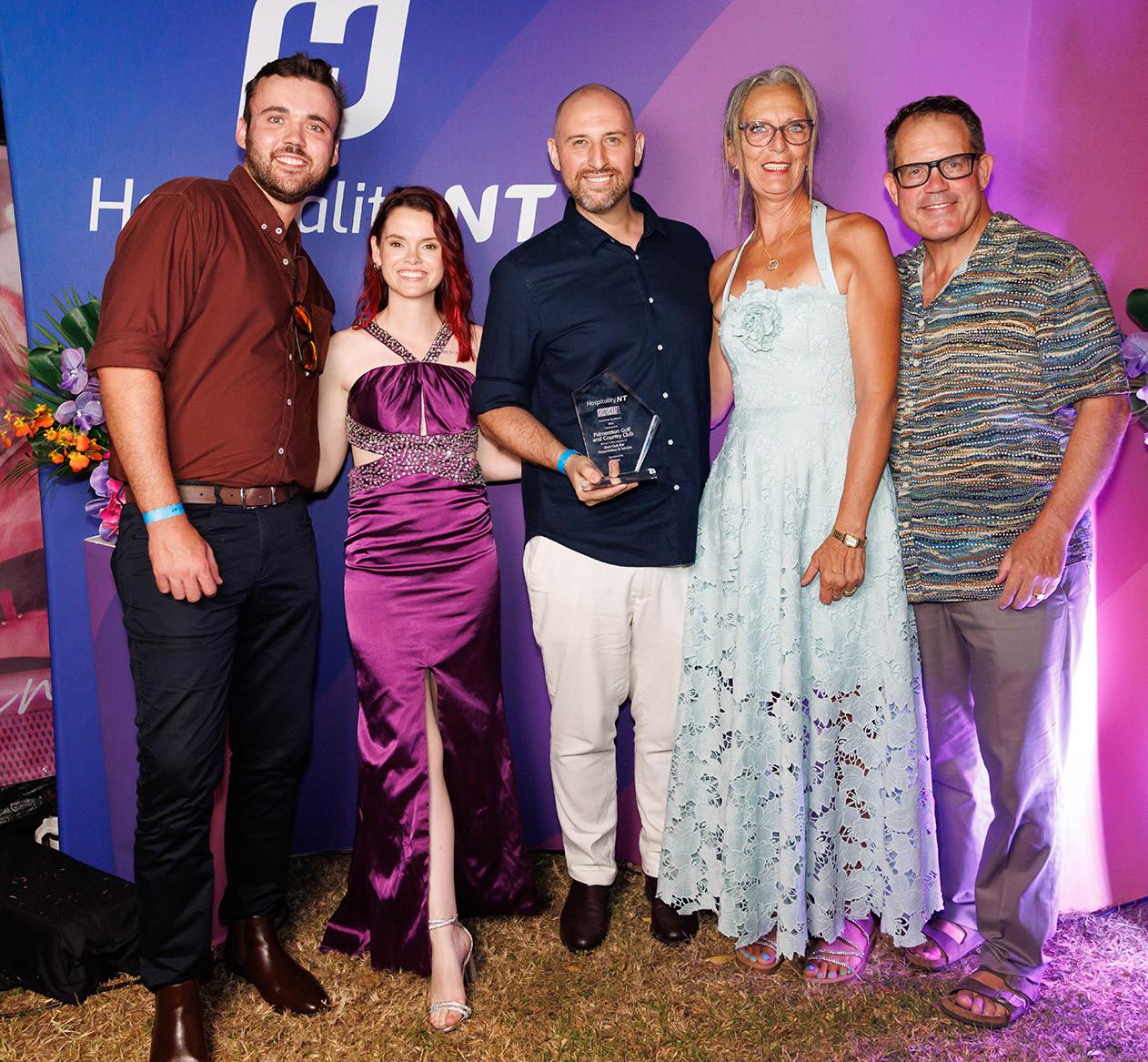
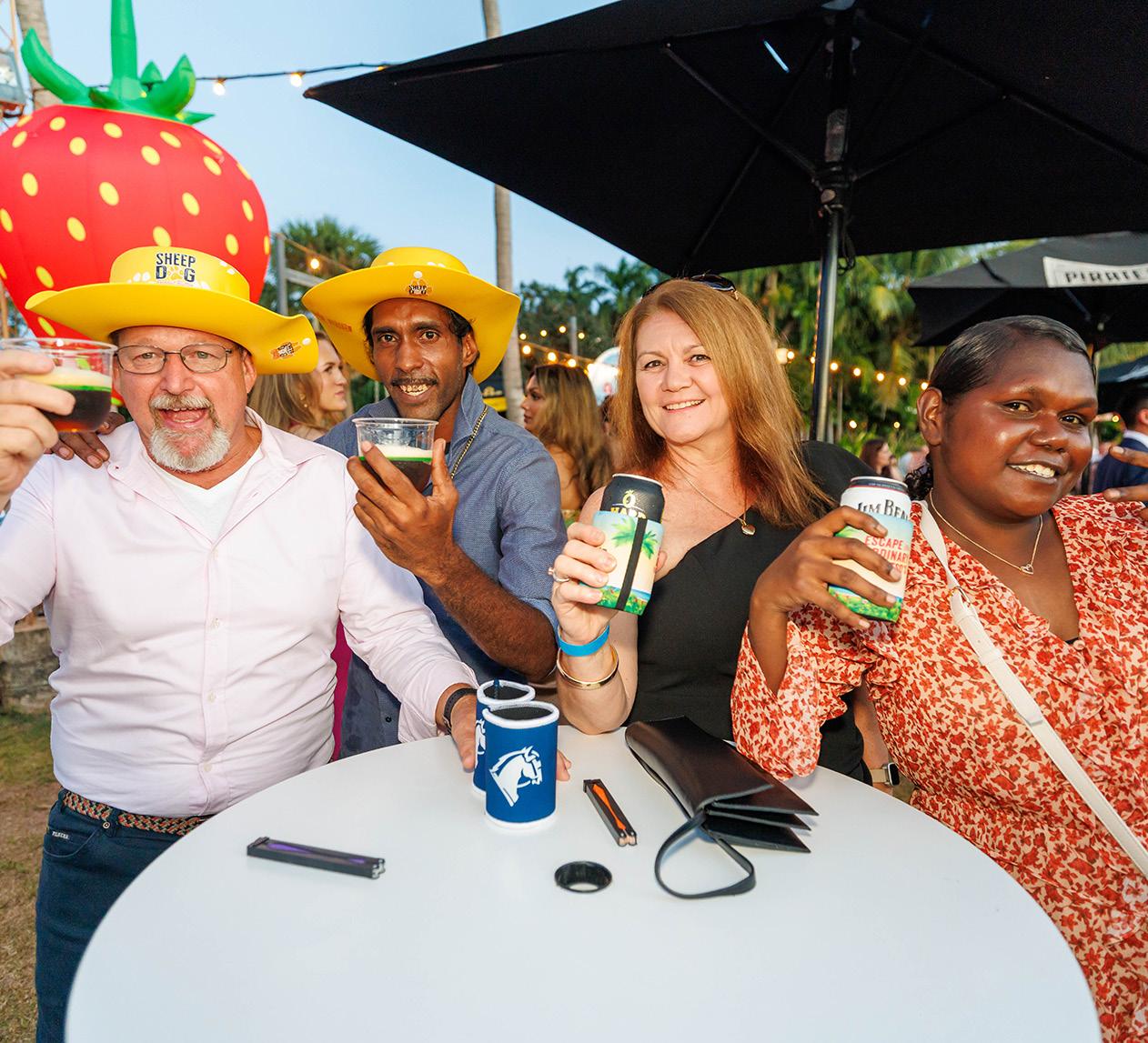
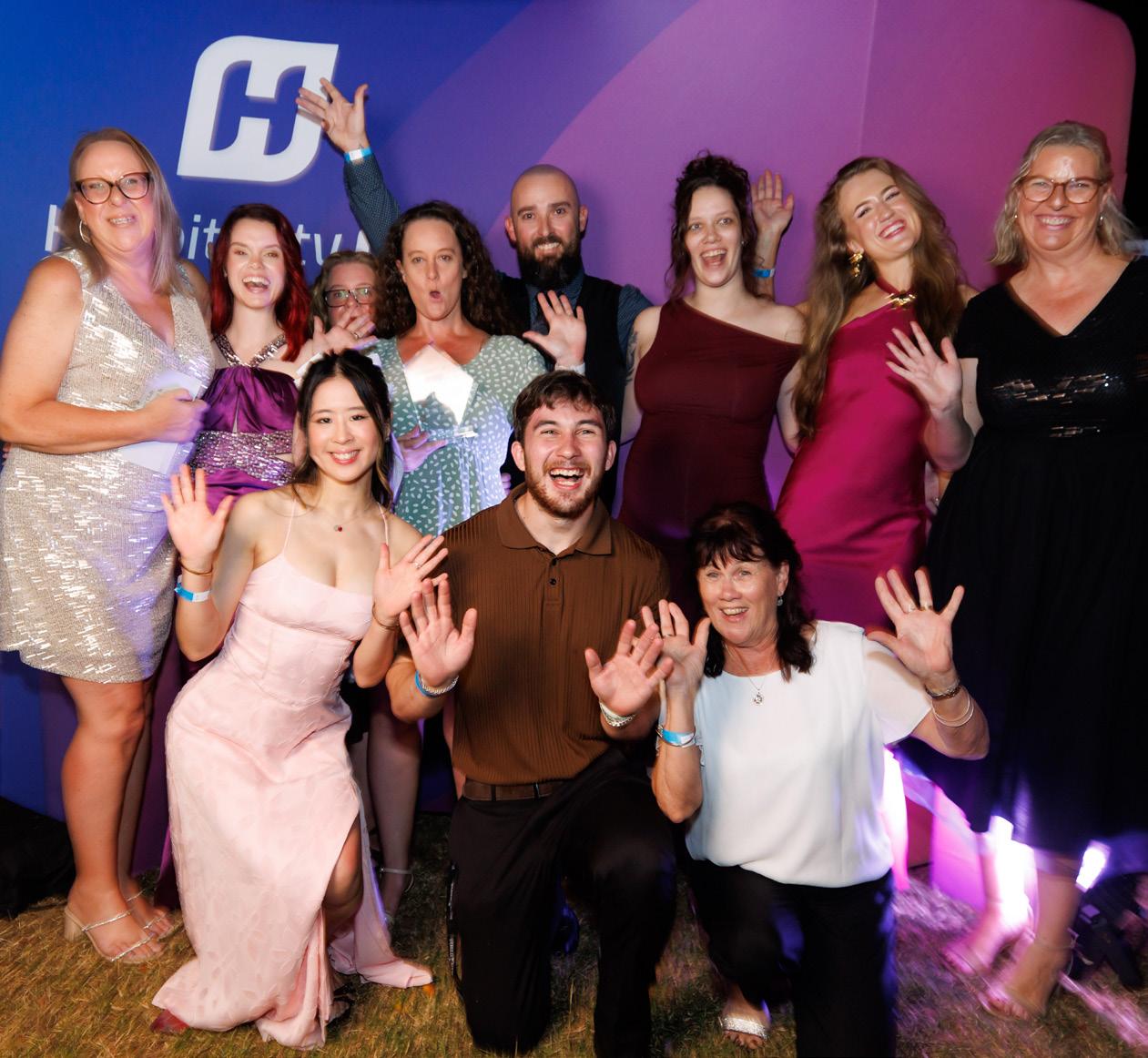
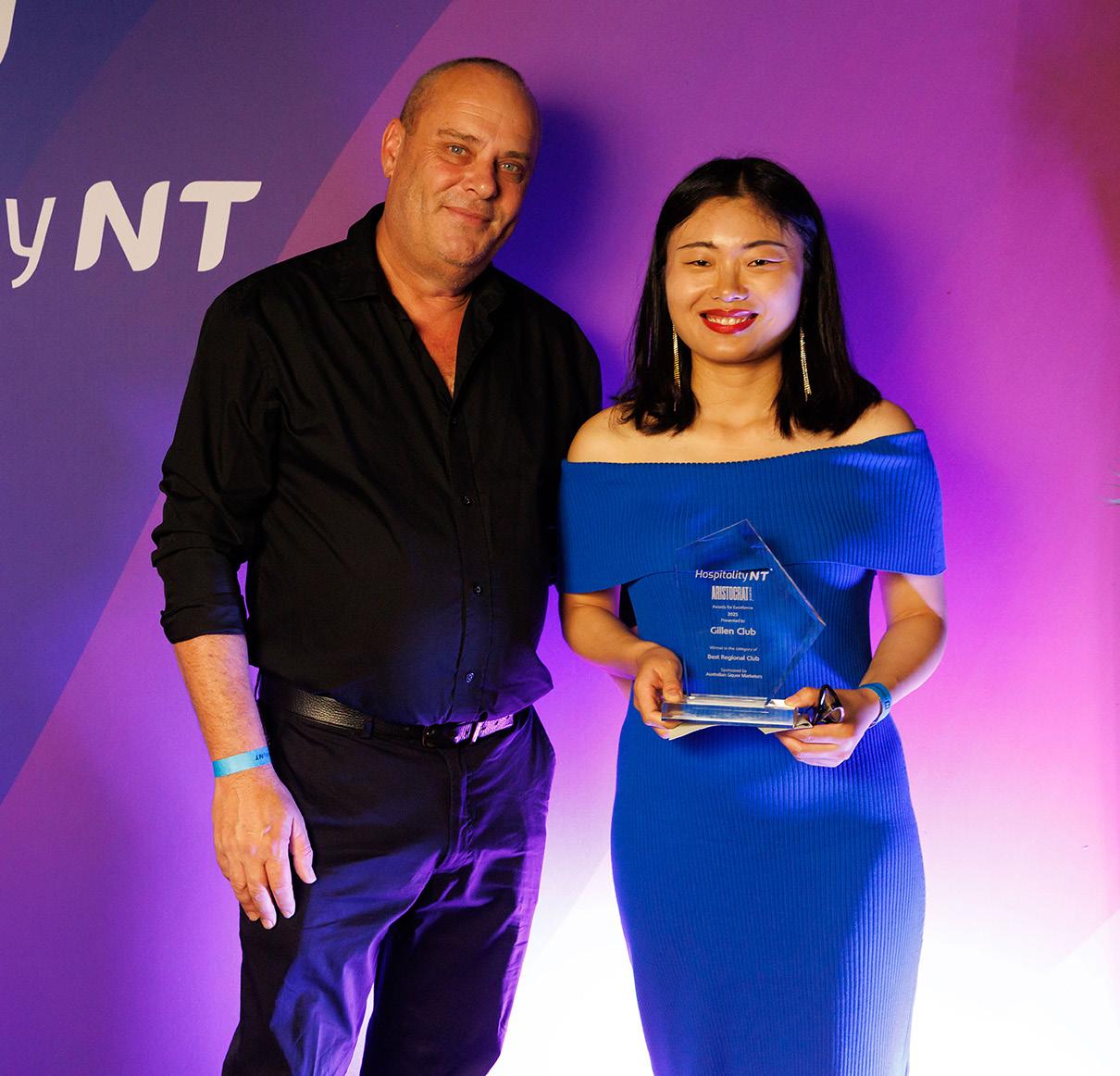
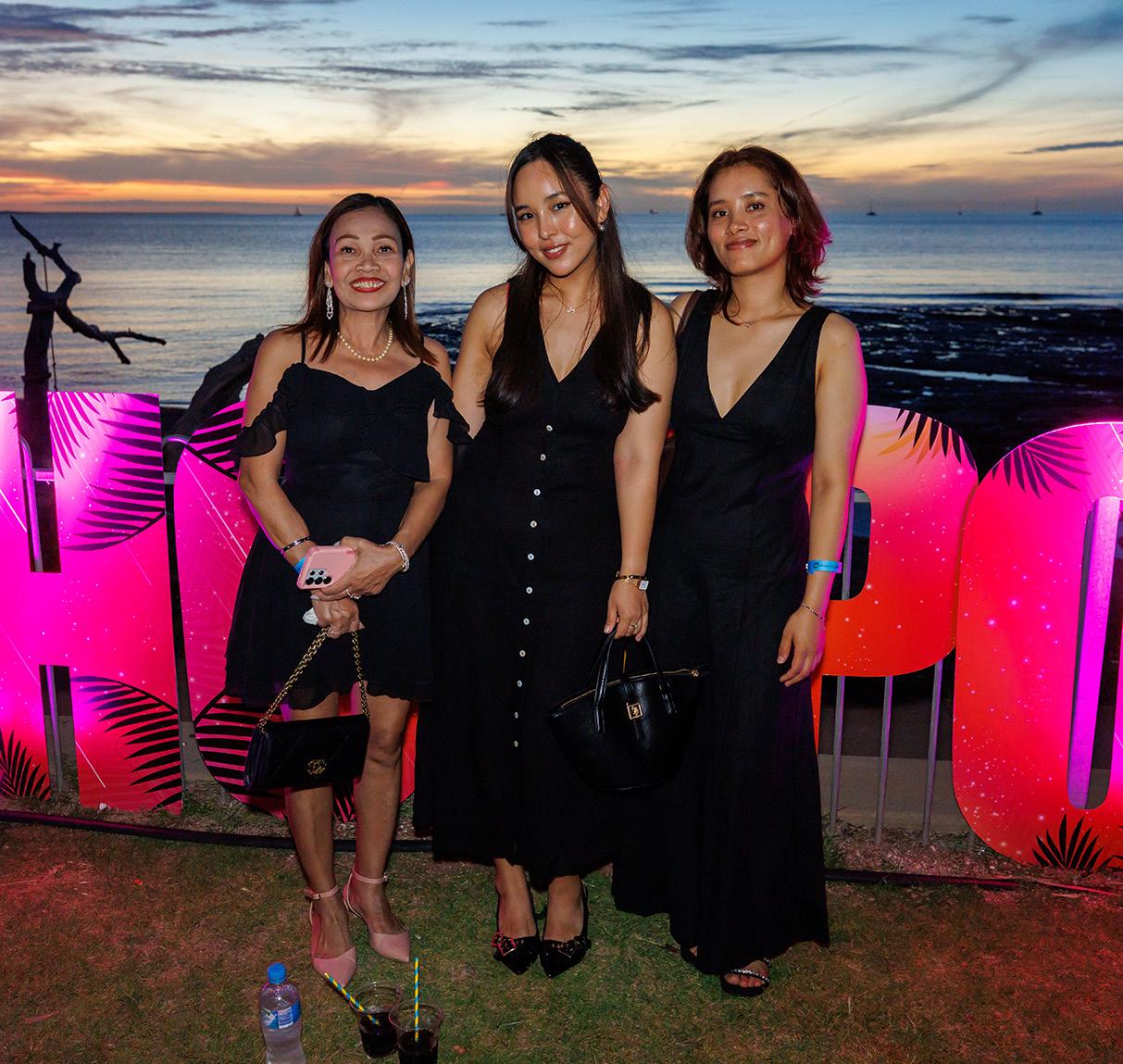
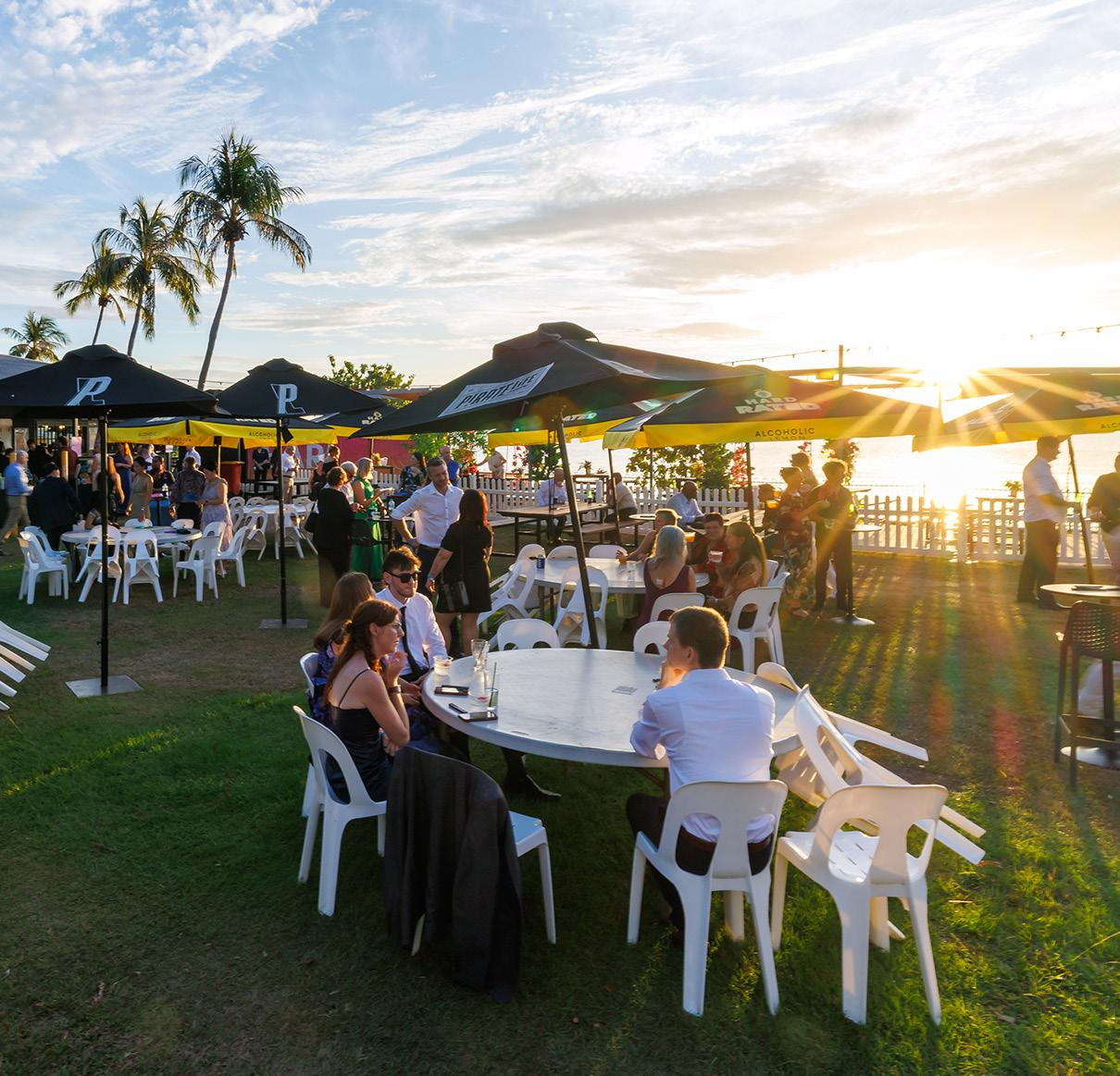
Cazayls Palmerston Club took out the win for Outstanding Club Community Service and Achievement, as well as Best Club Gaming.
Gillen Club won Best Family Friendly Venue and Best Overall Regional Club.
Palmerston Golf and Country Club won B venue, Best Club Bar Presentation ,
Palmerston Golf and Country Club won Best TAB venue, Best Club Bar Presentation and Service, and Best Overall Club.
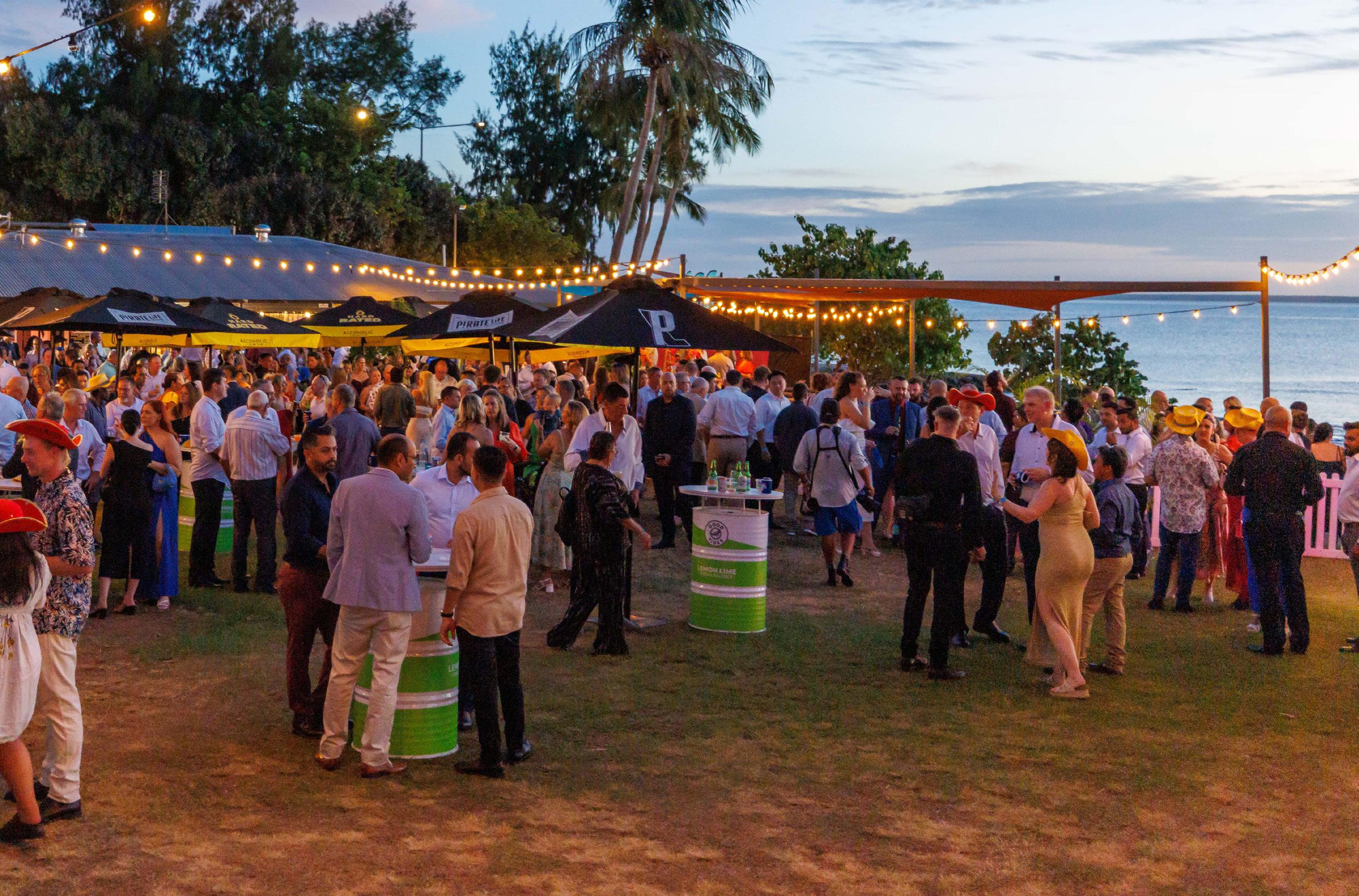
Territory clubs shine at Hospitality NT Awards
The Top End’s finest hospitality talent was celebrated in style at the 2025 Hospitality NT Awards for Excellence.
BETWEEN THEM, PALMERSTON Golf and Country Club and Cazalys Palmerston Club claimed five top honours at this year’s 2025 Hospitality NT Awards for Excellence.
Palmerston Golf & Country Club was awarded Best Overall Club for the second year running, alongside wins for Best Club Bar Presentation and Service and Best TAB Licensed Venue, also for the second consecutive year.
Cazalys took out Best Club Gaming Venue and Outstanding Club Community Service and Achievement.
“It’s just a really good acknowledgement for us from the industry, that we’re doing the right thing,” Palmerston Golf and Country Club and Cazalys GM, Matt Hewer told Club Management.
“And of course, it’s a really good celebration for the staff. The staff really do get a kick out of it.”
Hewer added that the clubs’ reputations are bolstered by their ability to continually reinvest.
“We’re in a fortunate position where we’re able to reinvest wisely into our venues, and it shows good returns.”
He also noted the clubs are always looking for opportunities to expand, with a key priority focused on improving accessibility across the golf course.
Meanwhile, Alice Springs’ Gillen Club secured
Best Overall Regional Club and Best Family Friendly Venue.
Held at the Darwin Ski Club, this year’s awards brought together more than 500 industry leaders, nominees and guests to celebrate the best in Territory hospitality.
Hospitality NT CEO Cathy Simmonds said the awards honour what makes the local industry truly exceptional.
“From our beloved outback pubs and iconic roadhouses to vibrant CBD bars, community clubs and world-class resorts – every venue plays a part in shaping the Territory’s unique hospitality identity,” she said.
The night also saw major wins for Hilton Darwin, which picked up five awards in the accommodation categories, and newcomer The Cinema Collective, which walked away with four, including Best Overall Pub/Tavern and Best New Venue. Meanwhile, Dundee Beach Tavern earned Best Overall Regional Pub and the Best Draught Beer Quality – Regional.
In total, more than 290 nominations were submitted across all categories, including over 40 in the highly competitive Employee Awards category showcasing the talent, passion and commitment driving the Territory’s hospitality industry forward.
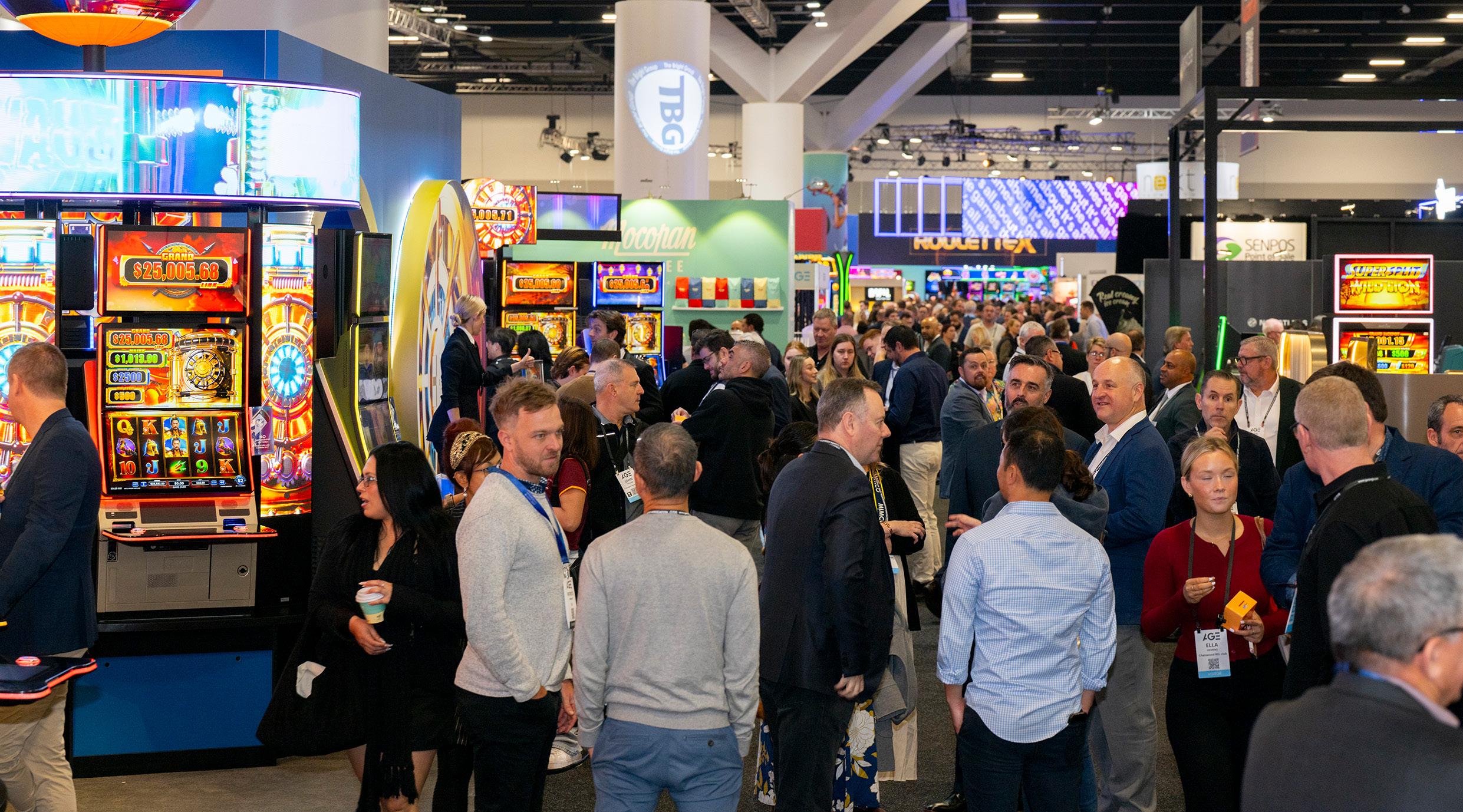
Industry innovation dominated AGE 2025
An enthusiastic number of delegates showed up for the three-day industry event at the ICC Sydney where technology solutions stole the spotlight.
ANOTHER HUGELY SUCCESSFUL Australasian Gaming Expo (AGE) was held on 12-14 August at Sydney’s International Convention Centre, with record attendances across the three days.
Since its first show in Sydney in 1990, AGE has grown to become one of the world’s largest gaming and hospitality trade shows. This year’s expo welcomed 217 exhibitors, up from 202 in 2024, showcasing the breadth, diversity and vibrancy of the nation’s hospitality sector. Newcomers to the expo included surveillance solutions provider C.R Kennedy & Company, boutique catering and foodservice company Catering HQ Group, financial and risk advisory firm Kroll, and automated photo booth supplier
The Haylo.
Manufacturers, service providers, venue operators, players, government and regulators all came together to uncover the latest market trends and challenges.
“This is our industry’s most important chance to get together to identify and drive business opportunities. There’s no better way than being face-to-face, and it’s just fantastic to see it getting bigger and better each year,” said Jinesh Patel, CEO of the Gaming Technologies Association, host of the AGE.
The exhibition floor delivered a full spectrum of solutions for modern venues, with strong emphasis on technology-driven tools designed to streamline operations and enhance customer experiences. Entertainment and venue ambiance
also remained central, with audio-visual systems, lighting design and furnishings on display to help elevate guest experiences.
Food and beverage innovation featured heavily, with new kitchen equipment and service solutions focusing on efficiency, speed and sustainability. Exhibitors also presented the latest in surveillance, access control and responsible gaming tools for managers seeking to boost compliance and safety standards. Environmental solutions, including eco-friendly packaging, waste management and energy-saving devices, underscored the industry’s growing commitment to sustainability.
“Importantly too, the AGE continues to display innovation and clever-thinking – at every stand there was a new, smarter way of doing things and it’s brilliant to see how it all integrates to give customers the best possible hospitality experience,” Patel said.
Bitesize Group was awarded the Best Stand for 2025 where they showcased and lured attendees with samples of their new chocolate creation and savoury snacks. Meanwhile, Simtech was crowned the Steve Cowan Memorial Award for their unique double-sided transparent “ghost” LED screen that would rival some the best display technology.
Shared insight
Beyond the buzzing expo floor, the Australasian Gaming Expo 2025 seminar program offered three days of fresh insights, practical strategies,
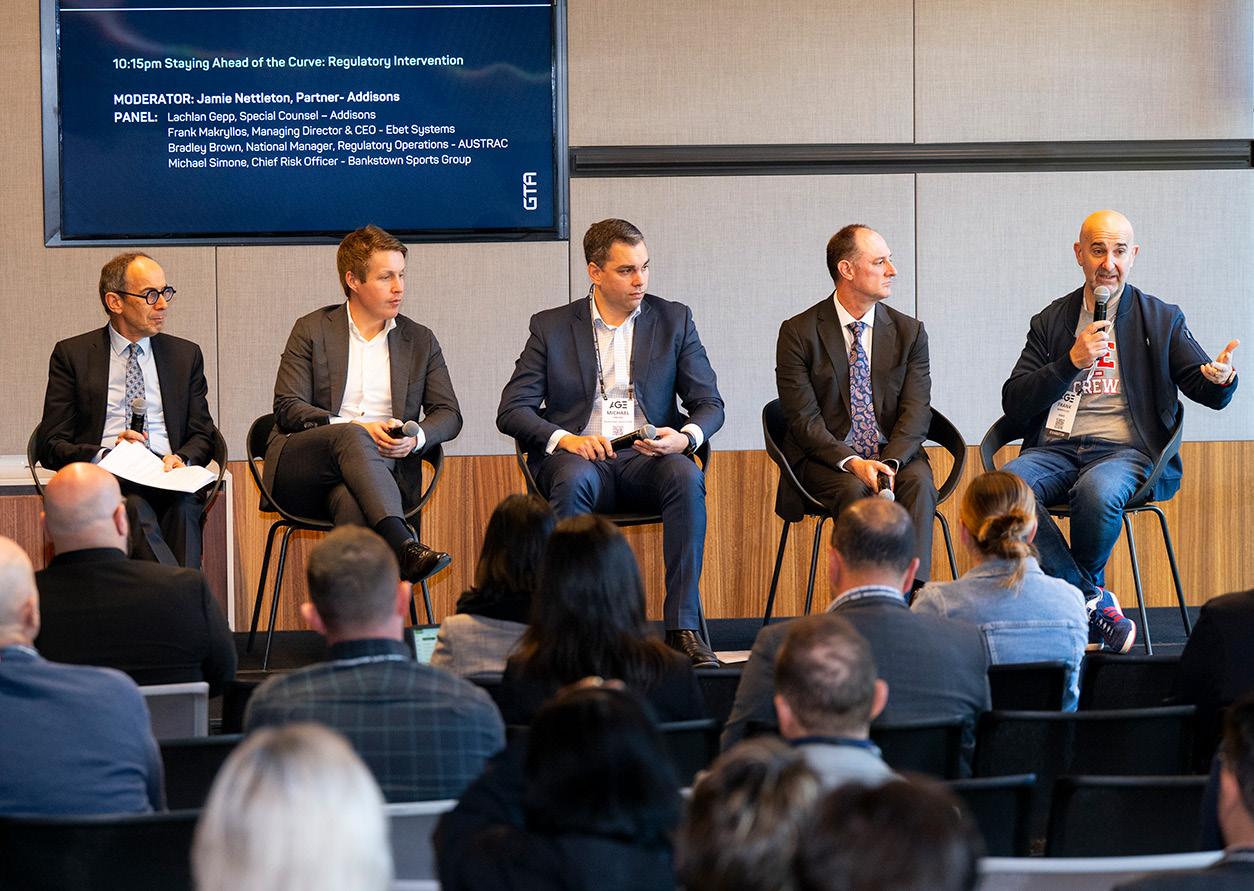
“This is our industry’s most important chance to get together to identify and drive business opportunities.”
Jinesh Patel, Gaming Technologies Association CEO
and inspiring conversations for the gaming and hospitality sectors.
Curated by the GTA and hosted by emcee Michelle Pascoe, each day was designed to give attendees takeaways they could action immediately in their venue.
Day one opened with a regulatory deep dive to help venues prepare for tightening AML and CTF requirements.
Bankstown Sports Group chief risk officer Michael Simone detailed how the club has embedded compliance across all levels of the organisation. He said strong board prioritisation was key, with compliance now a standing agenda item at every meeting.
“It was through that senior buy-in and that board prioritisation of getting compliance at the forefront of every meeting that it wasn’t going to go away,” he said.
He added that investment in training and resources, from advanced RCG programs to introducing a 24/7 CCTV control room, had built a culture where staff “almost celebrate the juniors on the floor that might identify something”.
During that same panel, eBet Systems CEO Frank Makryllos offered a clear warning that regulatory policies need to be more than just documents.
“It can’t be something that just sits in the drawer,” he said.
“You’ve got to find a way to operationalise that, systemise it, and be able to prove to AUSTRAC that you’re actually implementing it. A lot of venues say, ‘yeah, we do all of this stuff’, [but] it’s also a matter of being able to substantiate it.”
AUSTRAC’s national manager of regulatory operations, Bradley Brown, set the conversation in a wider context, reminding operators that the regulator’s goal was not simply enforcement but protecting communities.
“We do not necessarily want our communities filled with crime, or the criminal proceeds from drug trafficking and illicit tobacco

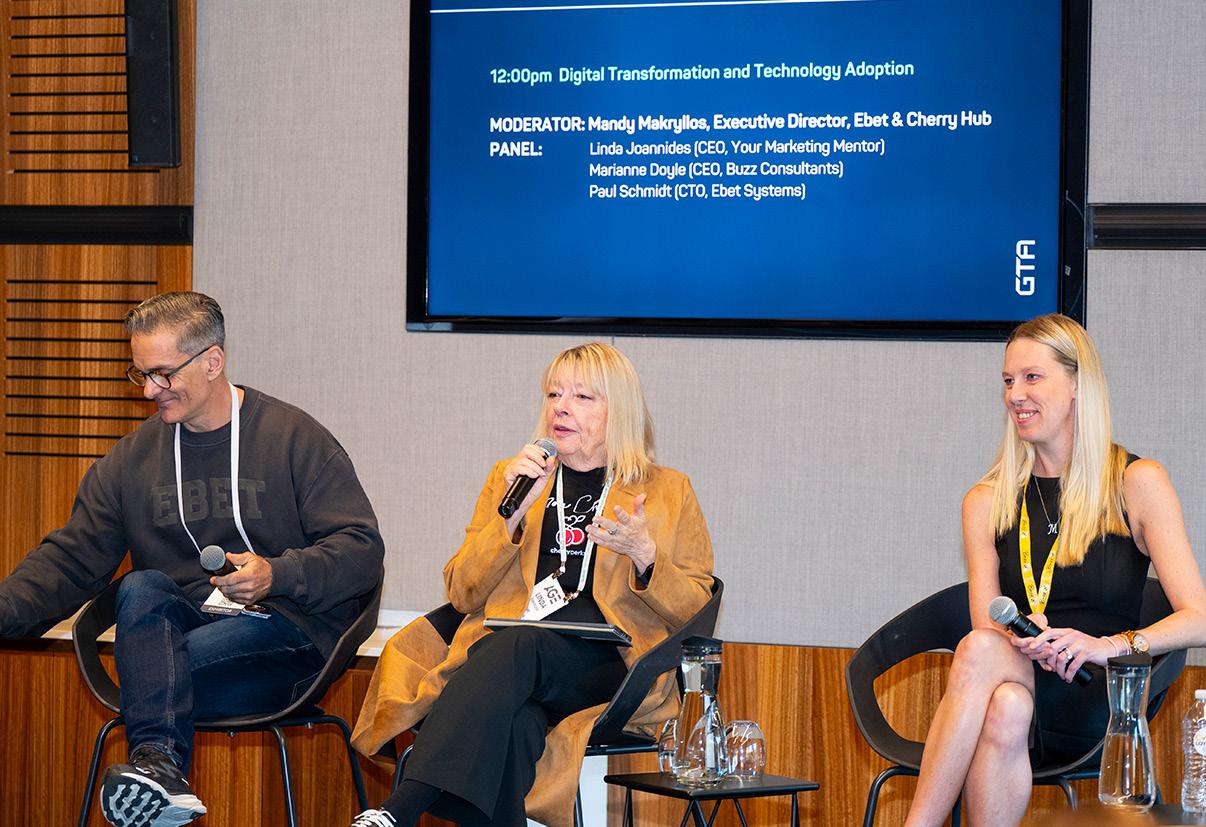

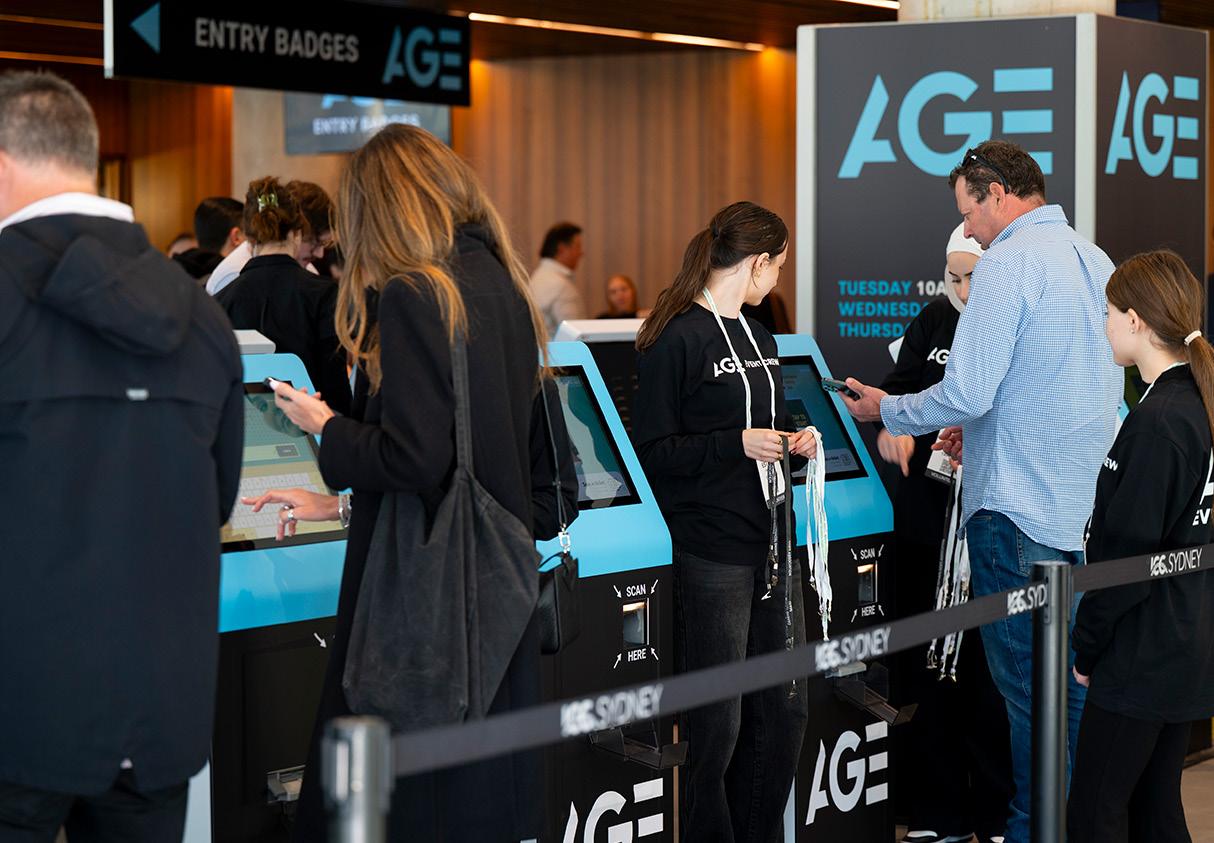
The refreshed logo was designed by Daily Press.
The AGE 2025 seminar program kicked off with a panel of experts discussing regulatory responsibilities.
Conversations about technology dominated this year’s event.
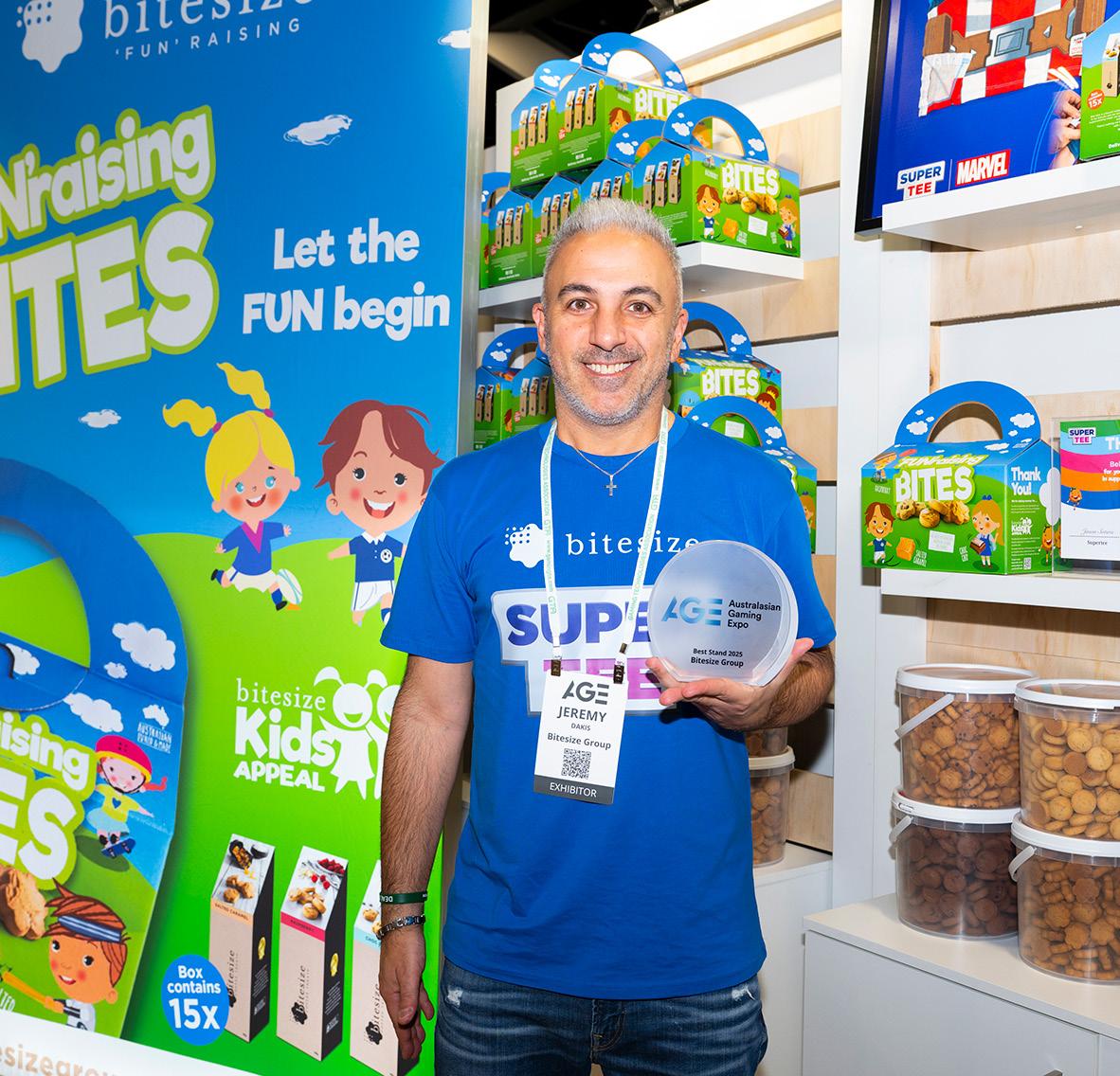
“The AGE continues to display innovation and clever thinking.”
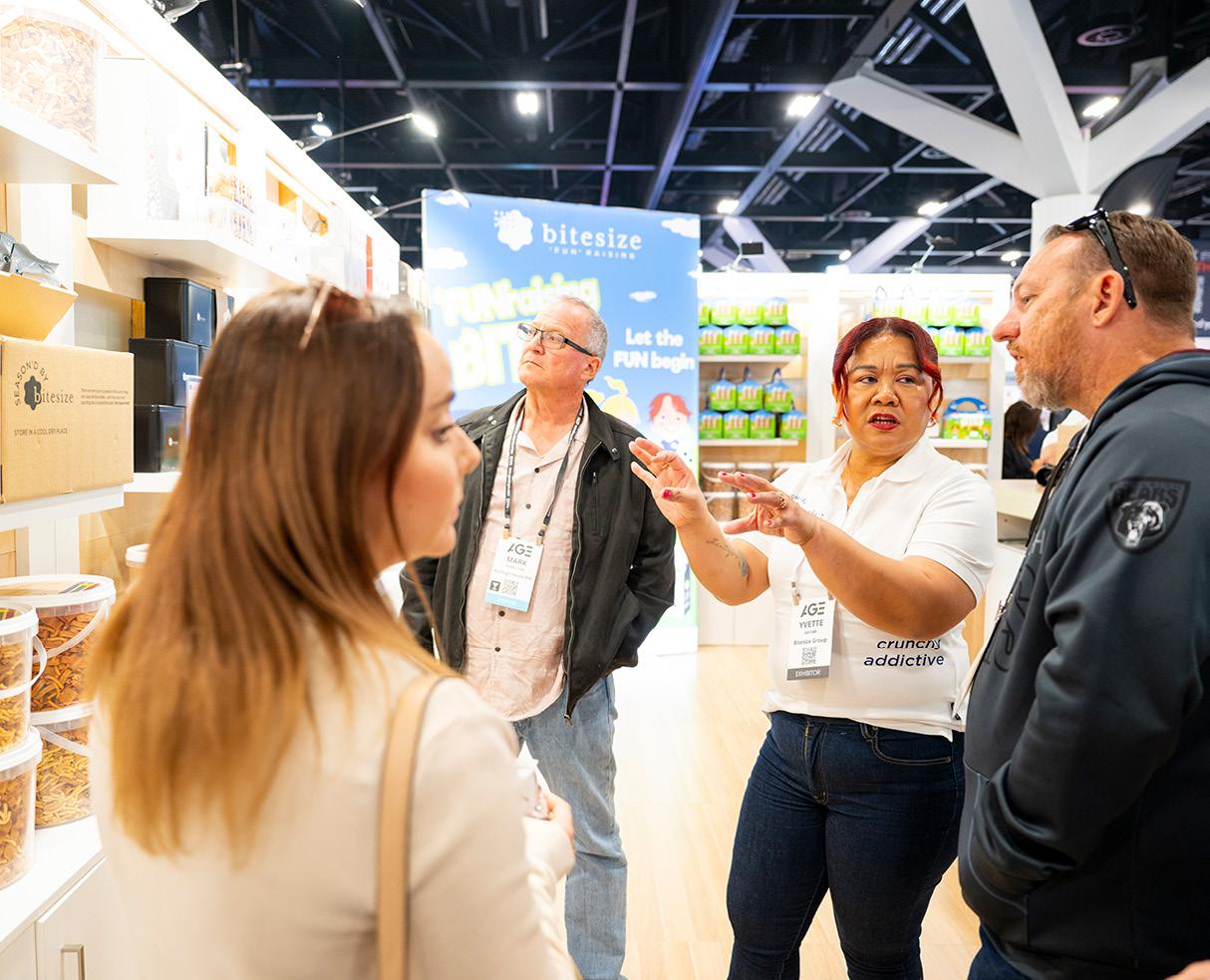
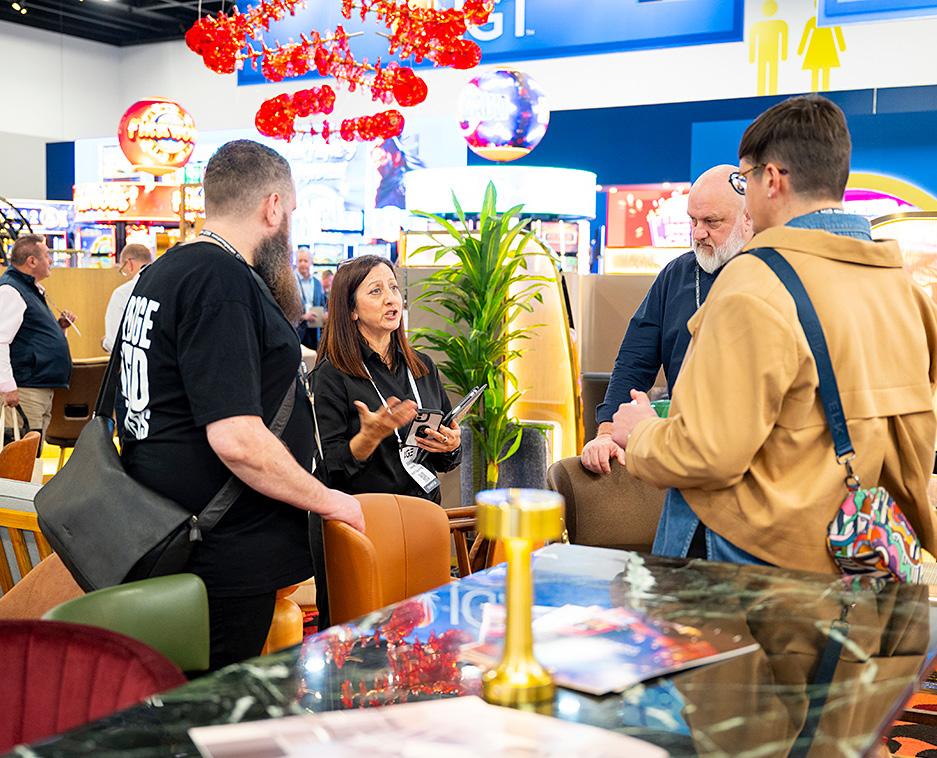
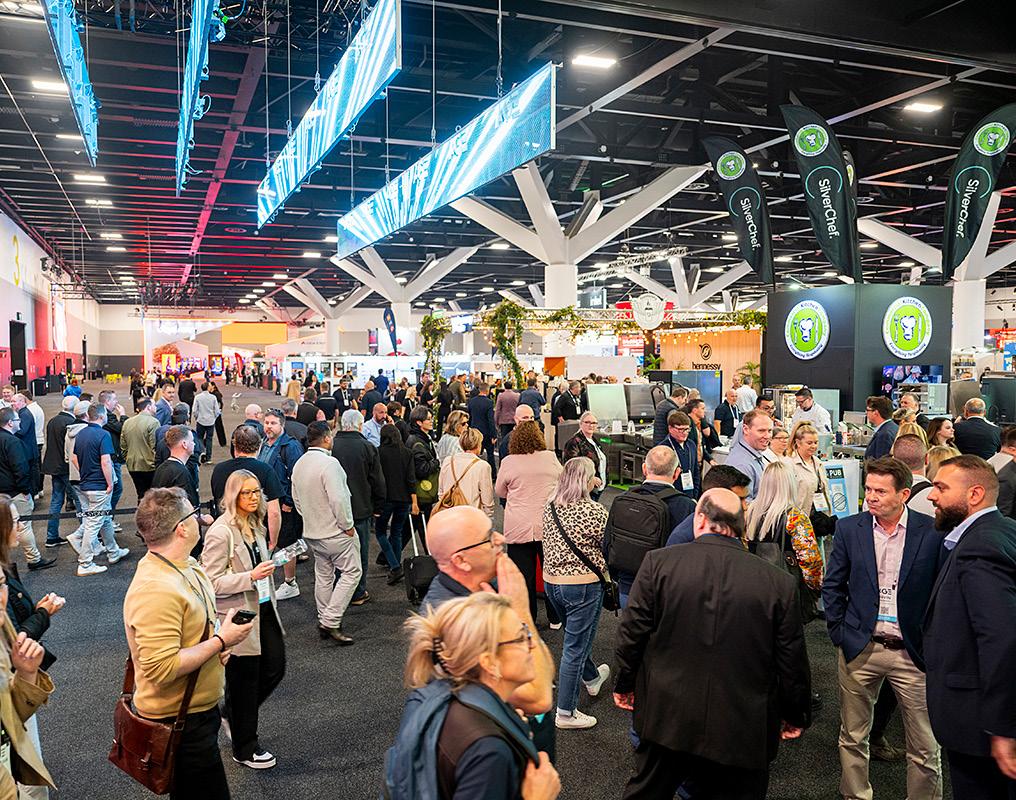
filtering through our businesses, which then has a potential impact on our reputations,” he said.
Brown flagged that a “plethora” of new guidance material will be released later this year to help businesses ahead of legislative changes coming into effect on 31 March 2026.
Day two of the AGE 2025 seminar program turned to skills, design and digital transformation, offering fresh ideas for developing staff capability, embedding compliance into daily operations, and improving retention. There was also a lively conversation between BSPN Architecture director Luke Ponti, PHaT Sourcing CEO Daniel Dickson, and Donnelly Design principal Tony Donnelly on the latest trends in gaming interiors.
The final day celebrated women in the industry, with a panel of rising stars and leaders spotlighting how women are transforming venues, driving investment, and reshaping operations.
“You can never underestimate the importance of trade shows and the chance they offer for all of us to collaborate and connect, and a big thank you to everyone who helped behind the scenes to make this our most successful AGE yet,” Patel said.
Fresh look for AGE
This year’s AGE also started with a refreshed brand identity an logo, embodying the event’s evolution and the future focus on both the gaming and hospitality industries.
The new logo designed by Daily Press, long-time exhibitors at AGE, appeared across all AGE communications.
Designed with simplicity, strength and connection in mind, the new logo signals AGE’s transition to a modern brand and replaces the colourful, pokie-inspired logo that served the expo for more than a decade.
The clean, contemporary branding was integrated into this year’ event, from signage and marketing collateral to digital platforms and on-site experiences.
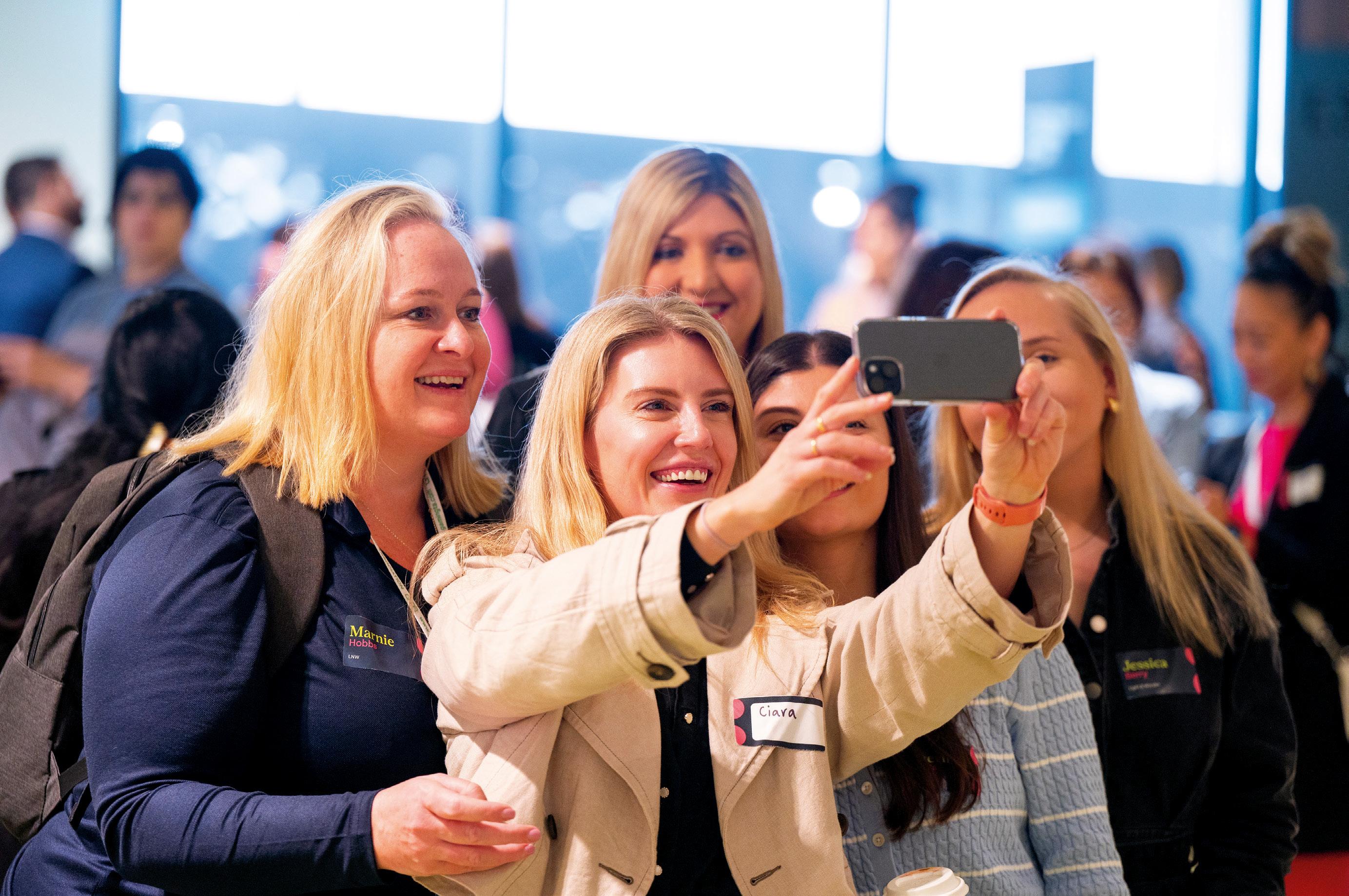
Jinesh Patel, Gaming Technologies Association CEO
Bitesize Group was awarded the Best Stand for 2025.

RETURNS TO ICC SYDNEY

Tuesday, 11 August 2026 | 10 AM - 5 PM Wednesday, 12 August 2026 | 10 AM - 5 PM Thursday, 13 August 2026 | 10 AM - 3 PM


The Foyer
Brand news and promotions
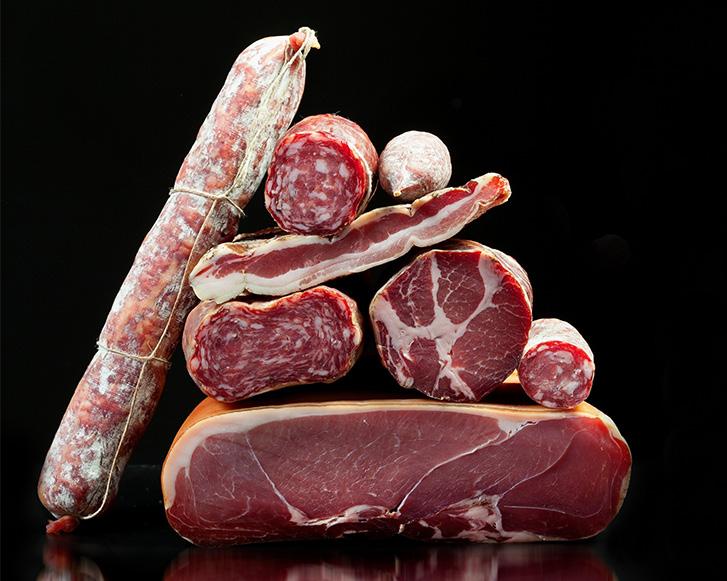
Borgo Salumi crowned Australia’s best Queensland-based, family-run Borgo Salumi has officially claimed its place as Australia’s most Platinum and Gold awarded smallgoods producer, after receiving 21 awards for 18 products entered at the prestigious 2025 IFFA DVA International Product Competition in Frankfurt, Germany, one of the world’s most revered smallgoods competitions.
Held every three years, the competition is hosted by the German Butchers’ Association and judged at IFFA, one of the world’s largest meat industry trade fairs.
Borgo Salumi’s accomplishment included three coveted Platinum trophies, 13 Gold medals, three Silver medals and two Bronze medals. Platinum is the highest honour bestowed at the IFFA Awards. When a product receives a Gold medal and it is deemed truly outstanding by the judges, it is reassessed for potential Platinum recognition. This level is reserved for only the most exceptional entries – those that go above and beyond in quality, flavour, and craftsmanship.
At the IFFA 2025 Awards, Borgo Salumi achieved this elite status with three of its products being awarded platinum: Friulano Salame; Salame al Prosciutto and Pistachio; and Free-Range Prosciutto Borgo. This rare triple win is a testament to Borgo’s dedication to tradition, quality, and artisanal excellence. www.borgo.com.au

Invoicing functionality added to Zeller app
Australian fintech Zeller has announced an update to its all-in-one B2B financial app, including the release of new invoicing functionality, enabling small businesses with a fully mobile solution to create, manage, track, and send invoices directly from their smartphone.
As Australia’s only B2B financial app, Zeller App delivers business owners access to every product within the Zeller financial ecosystem, including invoicing, transaction accounts, card management, fund transfers, expense tracking, and payments acceptance, all from a single app.
Invoices can be built and sent in seven clicks from the Zeller App, reducing time spent after-hours manually issuing invoices to clients. Business logos can be added, invoice design can be customised, and personalised messages added to ensure invoices are on-brand. www.myzeller.com/au
Tajima Australian Grainfed Wagyu wins two prestigious awards
Tajima Australian Grainfed Wagyu has earned two prestigious medals at the 2025 Queensland Branded Beef Awards. The premium wagyu brand secured a Gold medal in Class 3 –Wagyu, MB6 or less with a score of 86.1, as well as a Bronze medal in Class 4 –Wagyu, MB7+.
The Royal Queensland Branded Beef Competition is among the most respected competitions in the country, recognising outstanding quality, flavour, and consistency in beef.
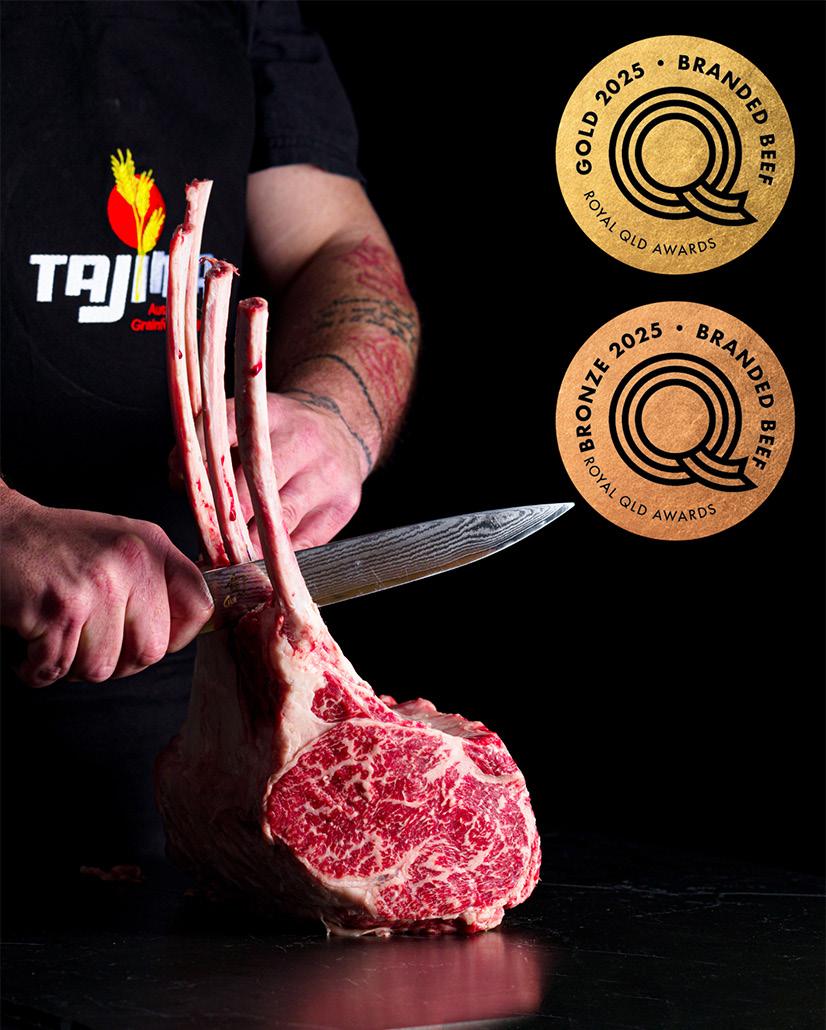
This year, more than 50 entries from producers throughout Australia competed across the five beef classes. Unlike other competitions, the Royal Queensland Branded Beef Competition only recognises the top three performing brands in each category, making it a true showcase of the year’s finest.
Tajima Australian Grainfed Wagyu is Andrews Meat Industries’ flagship wagyu brand, established in 2007. www.andrewsmeats.com

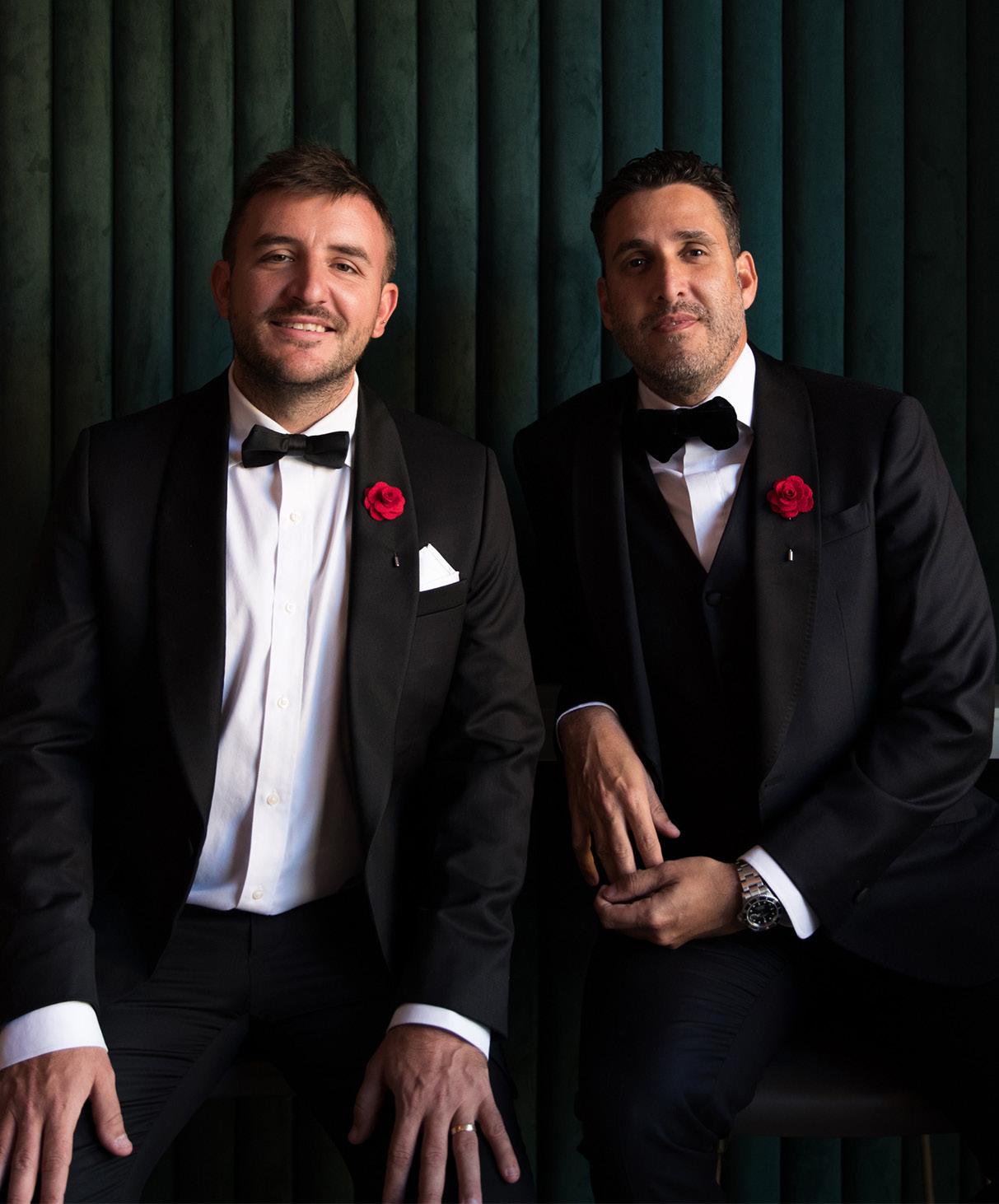
Allara and Maybe Group launch hospitality consultancy service
Internationally acclaimed hospitality collective Maybe Group has launched a new premium hospitality consultancy service with Allara Global.
Designed to support other venues to deliver the world-class hospitality experience that defines Maybe Group, the new partnership brings together on-the-ground expertise and best-inclass training.
While Allara Global is renowned for its cutting-edge training solutions for hospitality businesses, this new direction leverages the creative and operational excellence of Maybe Group, whose portfolio includes the award-winning Maybe Sammy, named the most influential bar in the world in 2023 and awarded Best Cocktail List at the 2024 Australian Liquor Industry Awards.
The new consultancy program has been built for venues of all shapes and sizes and provides bespoke solutions for every aspect of the consumer experience, including venue experience and design; signature beverage programs; staff training and coaching; hospitality innovation and operational excellence.
Using a hybrid delivery model, the program is both creative and scalable, offering consultancy across concept and experience design, on-site and digital training integration, and ongoing support and performance optimisation. https://allaraglobal.com/maybeconsulting
The Observation Beehive: A world-first eco-innovation for hospitality
The Observation Beehive is a groundbreaking, world-first indoor installation that merges nature, luxury, and education into an unforgettable experience. Designed as a high-end, fully enclosed beekeeping system, this innovative feature allows guests to observe the fascinating, hidden world of honeybees from the safety and comfort of an interior space within your venue.
This state-of-the-art observation unit showcases a live, thriving colony behind precision-engineered acrylic panels, offering a rare glimpse into the bees’ daily life. Crafted with architectural elegance and technical excellence, the Observation Beehive is designed to be a striking centrepiece – blending seamlessly into modern interiors while prioritising the health and comfort of both bees and humans. Its modular hexagonal design also allows for custom expansion.
Perfect for establishments seeking to enhance their space with a unique, eco-luxury feature, it invites guests to reconnect with nature, support pollinator conservation, and experience the wonder of the hive – up close and unlike ever before.
Inside the Hive creates fully enclosed, luxury-grade observation beehives that:
• Enhance customer experience through unique interaction and storytelling
• Strengthen brand identity by showcasing sustainability in action
• Contribute towards Green Star ratings and eco-certifications
• Serve as conversation pieces that leave guests inspired and connected
Perfect for added interest in a club foyer or any other space. sales@insidethehive.com.au


The Bar
Drinks news and promotions
Coopers taps into growing NOLO demand with Coopers Zero
Coopers Brewery has launched Coopers Zero, its first non-alcoholic beer under the iconic Coopers roundel, tapping into the fast-growing no- and low-alcohol (NOLO) category. Packaged in a silver can, it’s the brewery’s latest permanent addition since the 2023 debut of Coopers Australian Lager.
“More and more Australians want a beer/life balance,” said Coopers managing director Michael Shearer. “We set out to develop and deliver a great-tasting, full flavoured beer to cater for Australians seeking to lower their alcohol intake or switch up their drinking habits.”
With less than 0.5 per cent ABV and only 49 calories per 375ml can, Coopers Zero offers subtle hop aroma, moderate bitterness, and a crisp, smooth finish. www.coopers.com.au
Maker’s Mark debuts first wheat whisky in Australia
Maker’s Mark has launched Star Hill Farm Whisky, the distillery’s first new mashbill in over 70 years and its first wheat whisky.
The limited expression celebrates regenerative agriculture, using wheat grown to enhance soil health, flavour and sustainability.
Rob Samuels, eighth-generation whisky maker and managing director of Maker’s Mark, said: “We are proud to share Star Hill Farm Whisky with the world –a 10-year journey to unlock nature’s depth of flavour... it will expand our platform to advance regenerative agriculture beyond our business, fostering a more sustainable future for our industry, people and planet.”
Master distiller Dr. Blake Layfield said: “This release is a complex yet balanced blend of sevenand eight-year whiskies... The nose captivates with notes of buttery caramel, golden raisins and gingerbread.”
www.suntoryoceania.com
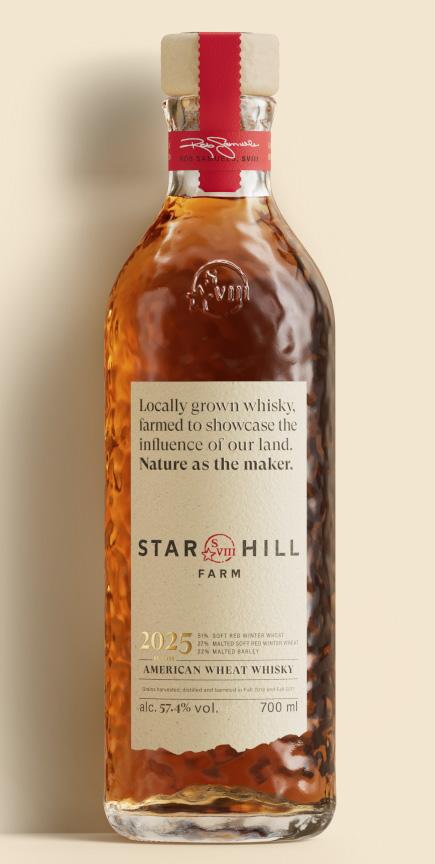
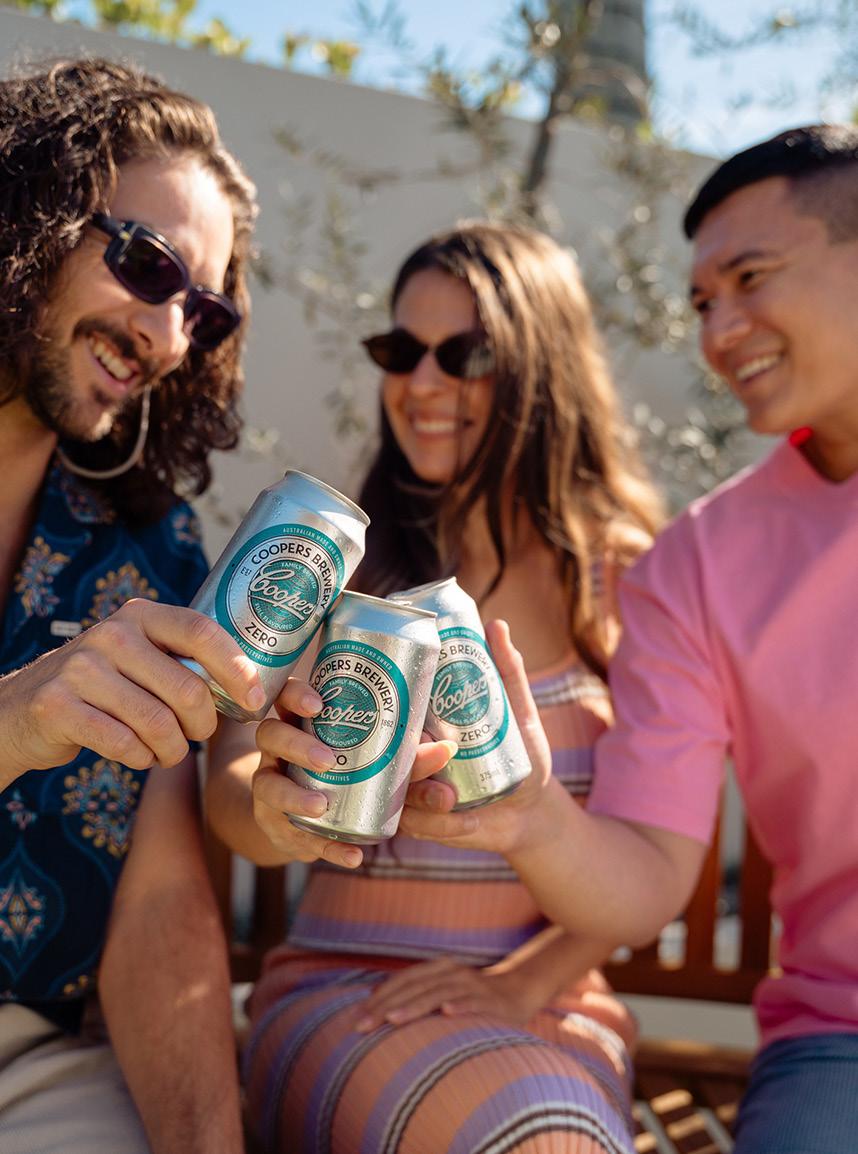
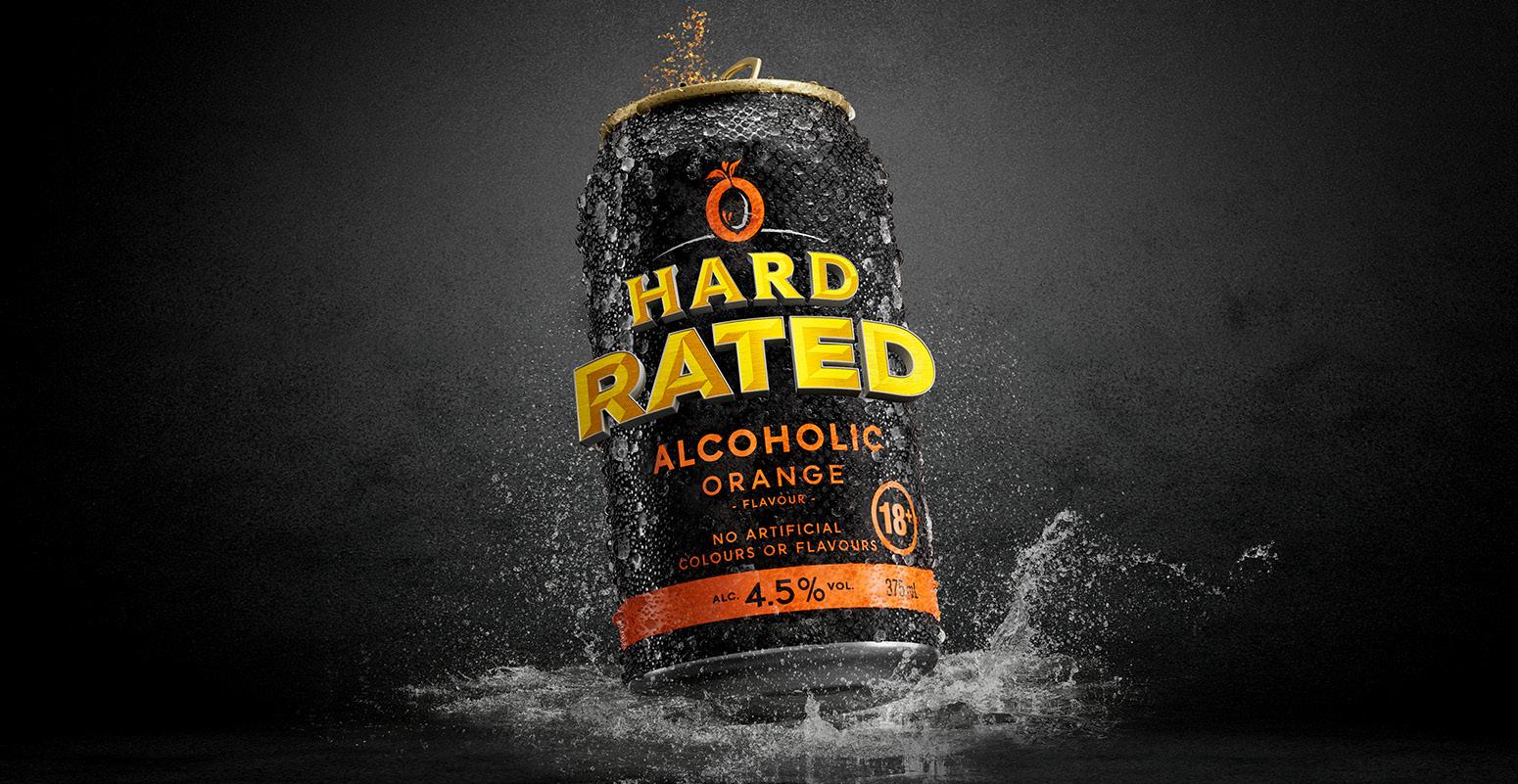
Hard Rated branches out with Alcoholic Orange
Australia’s number one white spirit premix brand has added a bold new flavour to its lineup – Hard Rated Alcoholic Orange 4.5 per cent.
The latest release delivers a low-fizz, sweet and tangy orange hit with no artificial colours or flavours.
Asahi Beverages’ head of RTDs and Cider, Sarah Wilcox, said: “We’re absolutely thrilled to launch Hard Rated Orange, as we know consumers have been crying out for a great tasting orange-flavoured alcoholic drink.”
Launched in 2023, Hard Rated quickly hit the top spot for white spirit premix in Australia and has held it ever since. The new flavour aims to keep that momentum going, tapping into the growing demand for RTDs year on year.
Hard Rated Alcoholic Orange is available now in 375ml cans (four, 10, 24, 30-packs) and on tap at selected venues nationwide. www.asahibeverages.com

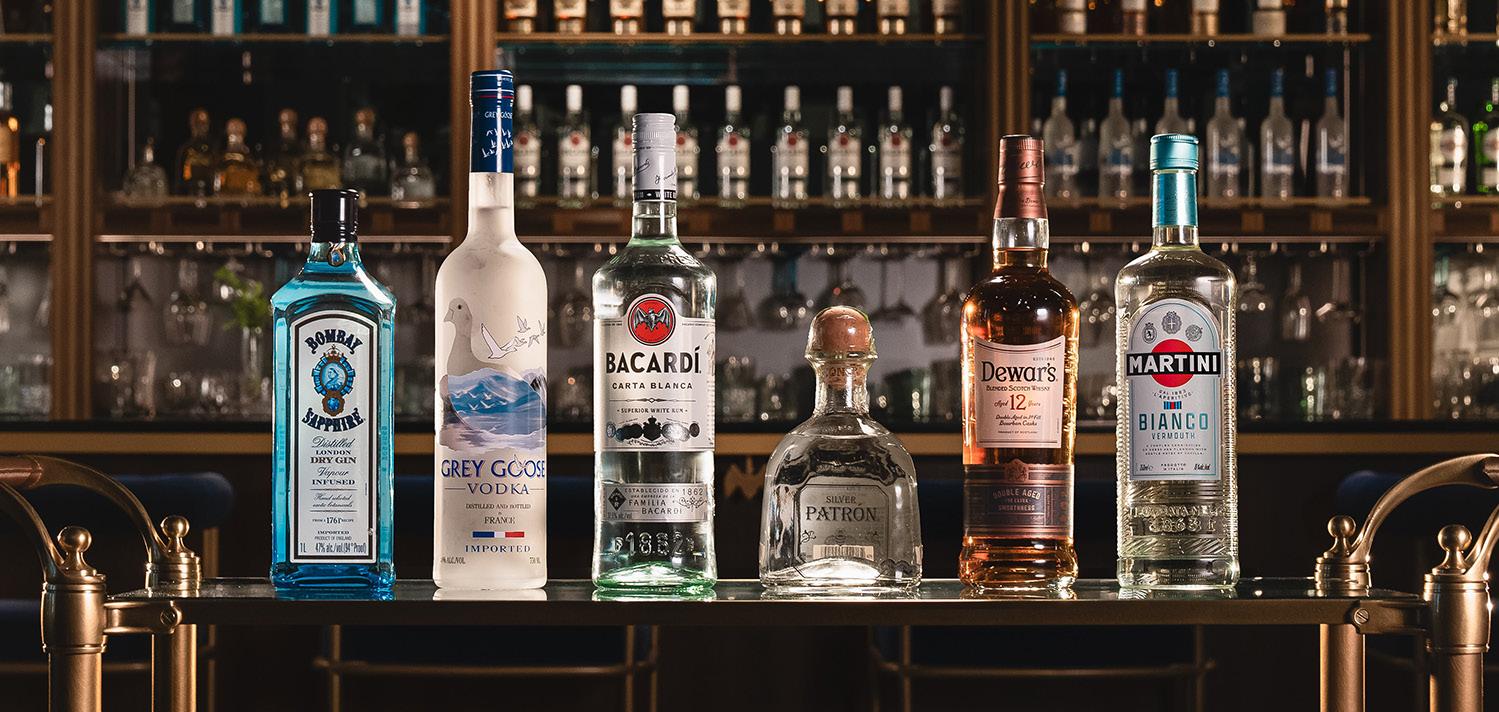
CCEP and Bacardi-Martini Australia strike distribution deal
Bacardi-Martini Australia has announced a new distribution deal with Coca-Cola Europacific Partners (CCEP) with the aim of significantly expanding the reach of its premium spirits and RTD portfolio in the local market.
Under the agreement, Bacardi-Martini will retain control of consumer marketing and brand strategy while leading engagement in the on-premise channel.
CCEP will take responsibility for national distribution and market expansion, leveraging its extensive sales network to boost availability of key brands including Bacardí rum, Bombay Sapphire gin, Grey Goose vodka, Patrón tequila, Dewar’s blended Scotch whisky, Angel’s Envy American Straight Whiskey and Martini vermouth.
The new, multi-year distribution agreement will come into effect on November 3, 2025.
ww.bacardilimited.com/country-info/australia/ www.cocacolaep.com/au/
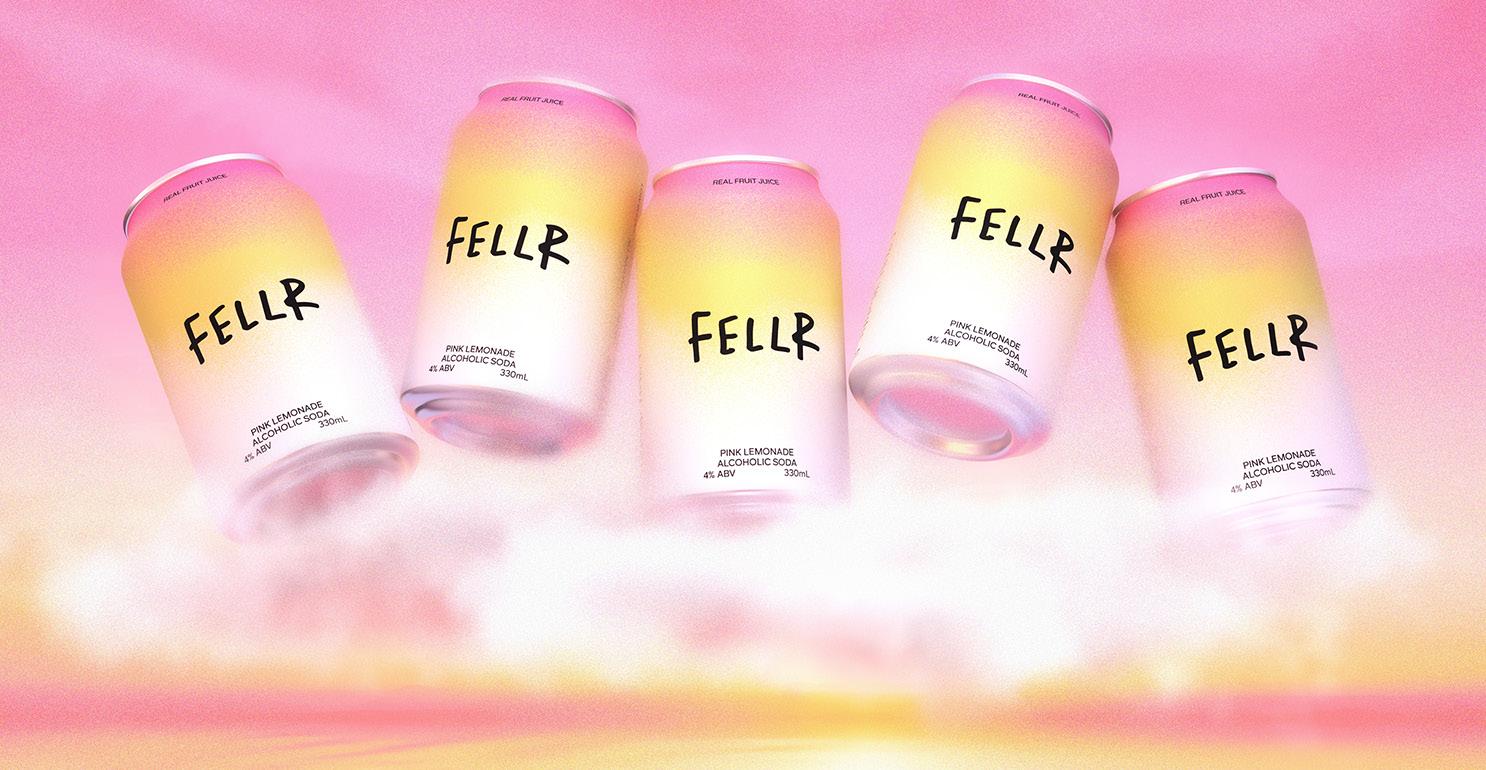
FELLR freshens up RTDs with Pink Lemonade
Premium independent RTD brand FELLR has unveiled its latest release, Pink Lemonade – a nostalgic yet modern serve crafted with real raspberry and lemon juice.
With just four grams of sugar and 94 calories per can, Pink Lemonade delivers a light, sessionable option that’s full flavoured without being overly sweet. The new flavour brings a refreshing punch of citrus and berry to FELLR’s line-up, designed for long afternoons in the sun.
FELLR co-founder Will Morgan said: “We’ve always focused on making drinks that are full of flavour without the sugar spike. With real fruit juice and fewer calories, Pink Lemonade is a crowd-pleaser that actually tastes like the flavour on the can.”
Co-founder Andy Skora added: “We’re seeing a shift away from overly sweet RTDs. With Pink Lemonade, we’ve delivered something juicy and refreshing, without being sickly – it’s crisp, clean and perfect for all-day drinking.” www.drinkfellr.com
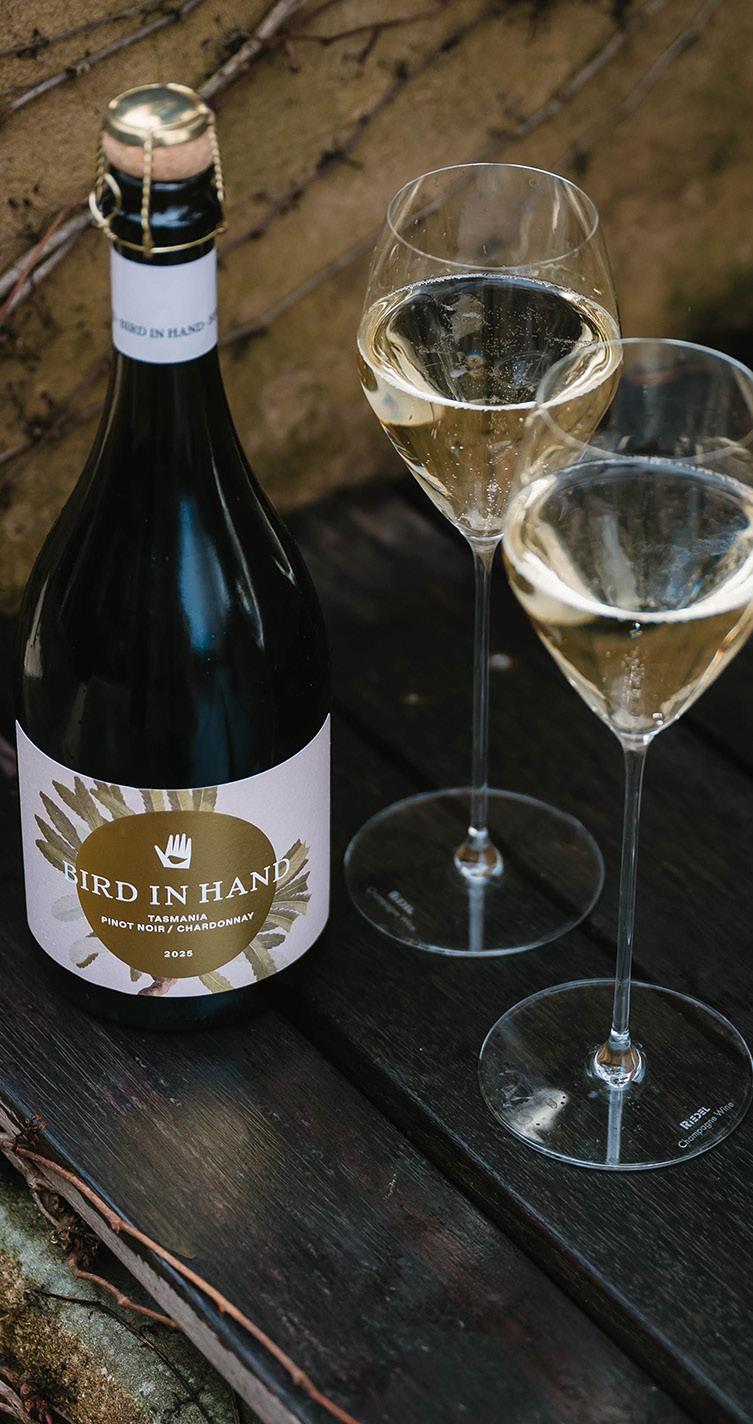
Bird in Hand debuts 2025 Tasmanian Sparkling
Bird in Hand has released its 2025 Tasmanian Sparkling, expanding the winery’s Tasmanian Series following the recent launches of Nouveau Pinot Noir, Reserve Pinot Noir and Riesling. Crafted from Pinot Noir and Chardonnay grown at the Tamar Valley vineyard near Rowella, the sparkling showcases cool-climate purity and precision.
“Tasmania offers the ideal conditions for sparkling wine – pristine fruit, natural acidity and incredible site expression,” said Bird in Hand senior winemaker Sarah Burvill.
“The 2025 Sparkling captures all of those characteristics – it’s vibrant and precise, and layered with finesse. We aimed for a style that is bright and fresh, and perfectly celebratory.”
With production limited to 1,600 dozen, the release highlights Bird in Hand’s growing Tasmanian footprint. www.birdinhand.com.au

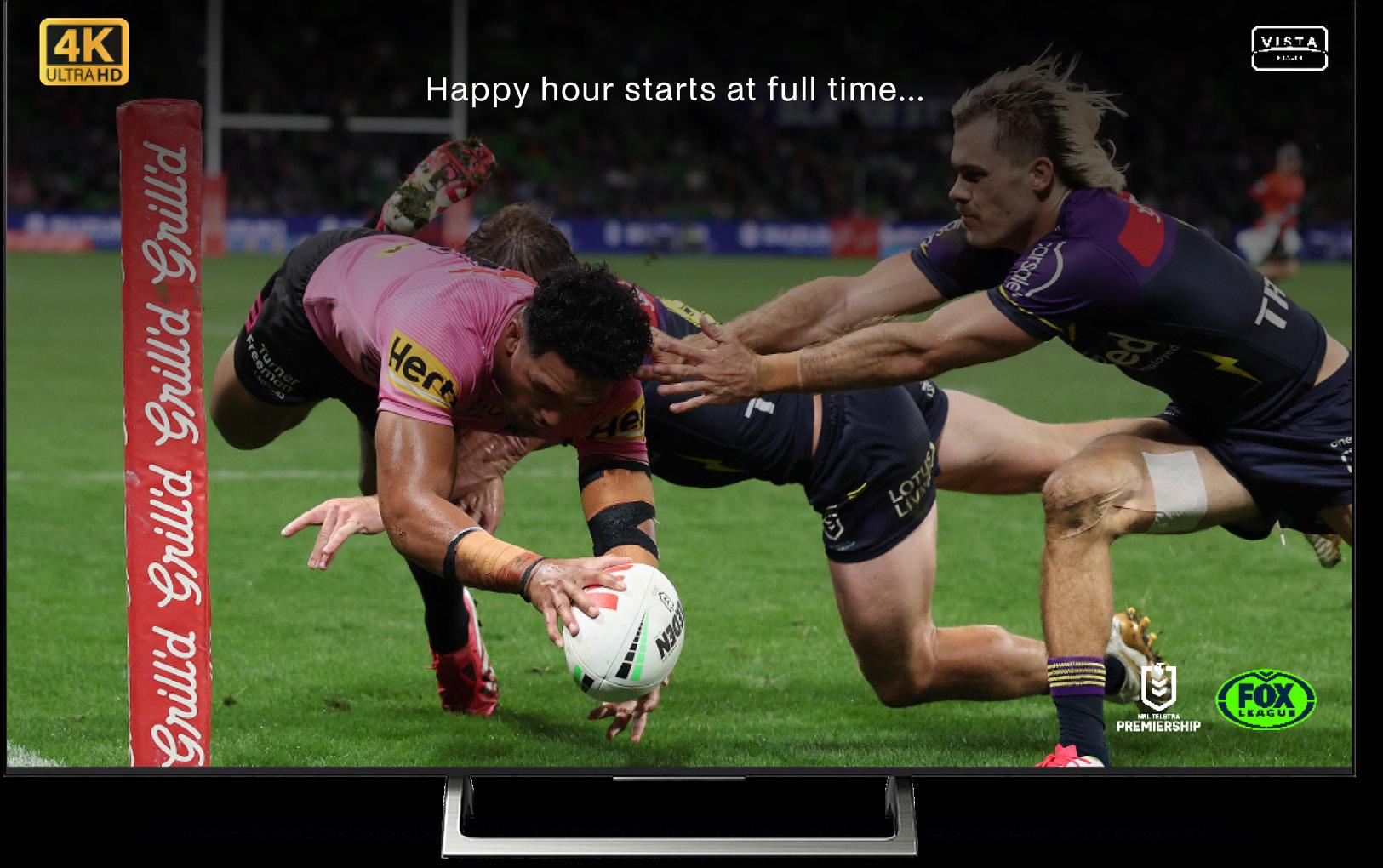
Delivering sport that matters, when it matters
Tap into the sports Australians love, right when they’re watching to boost trade and keep patrons around for longer.
WHEN IT COMES to sport, Australian fans know what they want – and when they want it. With Foxtel, venues can tap into the premium line-up of sport content that actually drives patron engagement.
But it’s not just about the sheer volume of sport. Foxtel offers an unrivalled breadth of sport content that truly caters to Australian fans. From the Ashes to the Formula 1, to the big 4 US leagues, Foxtel delivers the codes and moments your patrons turn up for.
It’s also sport that’s on when it actually matters. Foxtel’s coverage is designed for Australian venues, with matches and events airing during peak trading hours and right when your patrons are most engaged. That means more reasons for patrons to visit, stay longer, and spend more.
This summer kicks off with a huge Summer of Cricket, featuring The Ashes, ODIs, T20s and the ever-popular Big Bash League. It’s the kind of content that fuels big nights and brings in groups ready to settle in and cheer on their team.
Meanwhile, US sports on ESPN offer a serious boost to daytime and weekday trade. The NFL begins in September, NBA and NHL start in October, and MLB is heating up as it heads into playoff season. With these sports airing live during mornings and afternoons, they offer prime opportunities for venues to fill seats during traditionally quieter periods.
Main Event continues to deliver with UFC and boxing blockbusters running all year round. With UFC’s unstoppable rise in popularity, and two current Aussie champions – Alexander Volkanovski and Jack Della Maddalena – potentially defending their belts over summer, there’s never been a better time to get on board.
Rev heads aren’t left behind either. Formula 1 and Supercars, including the legendary Bathurst 1000, are part of the Foxtel lineup too.
To truly bring the live sport experience in your venue to life, Foxtel provides game-changing Business iQ technology that delivers favourites, including cricket and Formula 1, in 4K Ultra High Definition.
Keep screens active during off-peak times with replays, highlight packages and other relevant programming tailored to Aussie fans with Business iQ’s On Demand Sport library, The Vault.
Business iQ also helps you promote your venue’s own events and upsell services effortlessly. Use the self-service portal to push live on screen messages and digital signage to promote specials or upcoming events, without pulling staff away from the floor or adding extra operational load.
Elevate your sport viewing atmosphere to the new standard with Foxtel. Visit www.foxtel.com.au/venues or call 1300 761 056.

Fed up with being the last to know?
Stay up to date! Follow the Club Management Linkedin page for the latest club news in your feed.
On The Big Screen
Fixtures and matches that will pack out your sports bars
Footy at its best
Spring sees the beginning of the Finals Series for both the AFL and the NRL, culminating in the Grand Finals on Saturday 27 September and Sunday 5 October respectively. Both codes have had massive seasons and the best teams are getting down to it – and will have many guests sat in your sports bars, beer gardens and wherever you have a screen.
Will last year’s winners Brisbane Lions take out the AFL title once more, or can Adelaide or Geelong deny them the repeat?
In the NRL, the Canberra Raiders, Melbourne Storm and Canterbury Bulldogs are all in the hunt for the title – who will emerge as the 2025 champions? The NRLW will also hold its Grand Final on the same day as the men’s comp, with the AFLW Grand Final to be held on Saturday 29 November.
The AFL and NRL Finals Series starts on 4 and 14 September respectively, and can be viewed on Foxtel.
The AFL Grand Final takes place on Saturday 27 September on Channel 7.
The NRLW and NRL Grand Finals take place on Sunday 5 October on Channel 9.



Hit a six with the ICC Women’s ODI World Cup
Australia will look to continue to show its cricketing prowess at the ICC Women’s ODI World Cup, hosted by Sri Lanka and India. The Australian Women’s team are reigning champions, having won the title the last time the tournament was held in 2022. The Aussie squad will be pleased to have their skipper, Alyssa Healy, back after an injury-plagued six months. Healy has predicted that England and India will be the two teams to beat in Australia’s quest to be named world champions once more.
The ICC Women’s ODI World Cup will run from 30 September to November, with matches beginning at 7:30pm at the earliest. Venues can access the Women’s World Cup directly through the Amazon Prime Video app, with a domestic user log in, or start a 30-day free trial for the event.

Images supplied: Foxtel.
Image supplied: Amazon.

Cheering on Australia’s F1 contender
Heading into the final ten races of the 2025 Formula 1® season, Australian Oscar Piastri is leading the driver’s championship, with a slim lead of nine points over his McLaren teammate Lando Norris. Will the Aussie – in only his third year of racing in Formula 1® – take out the most prestigious title in motorsport?
Get behind Piastri’s title fight, as he looks to make history. While many of the races are held overnight, the Azerbaijan and Las Vegas Grands Prix are in prime viewing time in Australia. Azerbaijan GP – Sunday 21 September, 9pm. Las Vegas GP – Sunday 23 November, 3pm. Show all the action on Foxtel.
Getting into the Spring Carnival spirit
Spring Carnival racing is back and can mean big business for clubs. Races throughout the season will bring guests to your clubs, but the two biggest races of the year can pack out your clubs and turn into big F&B trade through event activations.
First up is TAB Everest Day, the feature race of Sydney’s Spring Carnival. With $20m in prize money up for grabs, it’s the richest turf race in the world, and gaining more popularity every year. Then, completing the Spring Carnival is the Melbourne Cup, the most prestigious racing event on the Australian calendar. It may be ‘the race that stops the nation’, but it definitely packs venues, so have your Melbourne Cup strategy ready to go!
The TAB Everest Race will be held on Saturday 18 October at 4pm. It will be shown on Sky Racing and Channel 7.
The Melbourne Cup will be held on Tuesday 4 November at 3pm. It will be broadcast by Sly Racing and Channel 9.


Kicking goals with the EPL
Securing the rights to several of the world’s best football league coverage in Australia – including the Champions League, Emirates FA Cup, the Barclays WSL and more – Stan Sport is the new home of international football. The crown jewel is the English Premier League (EPL), which has just got its new season underway. Activate Saturday and Sunday late nights with the best matches between the likes of Manchester United, Arsenal, Chelsea and more, with some of the best players in the world going head-to-head.
Tune in with Stan Sport all Spring and Summer.

Image supplied: Stan Sport.
Image supplied: Foxtel.
Image supplied: Victorian Racing Club.
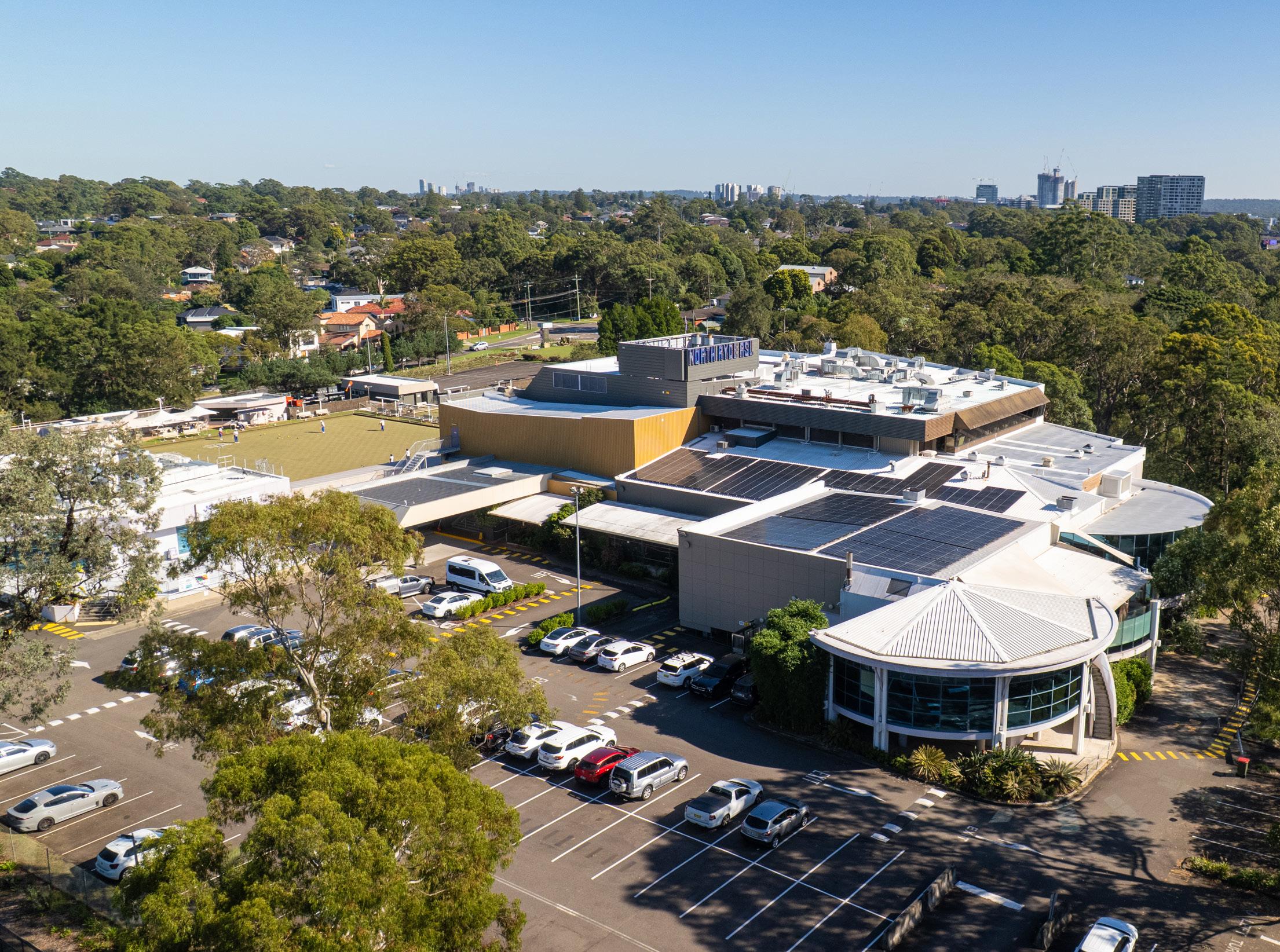
On his watch
With a major land deal edging forward and a full club overhaul on the drawing board, North Ryde RSL CEO Joe Kelly is looking to make an impact, while fielding more than a few critics along the way.
WHEN JOE KELLY took over as CEO of North Ryde RSL in October 2023, he inherited more than a club with ageing facilities and financial strain. He stepped into the middle of a long-running and politically charged dispute over a prized piece of land known as TG Millner Field in Sydney’s northern suburb of Marsfield. The club owns the land, but the local council has tried repeatedly to acquire it for public open space.
“Development started well before me,” Kelly said.
Back in 2000, North Ryde RSL began leasing the site from Eastwood Rugby, which had owned it since purchasing it from the Millner family. The RSL club took over management of the grounds as part of that lease.
“All they want is a big backyard, and they don’t care who pays for it.”
“It never made any money, like a lot of those smaller clubs don’t,” Kelly said.
In 2017, with Eastwood Rugby facing financial difficulties, North Ryde RSL purchased the land, before it entered a joint venture with a developer and Eastwood Rugby to rezone and redevelop the land. The goal was to transform the RE2-zoned site into R2 lowdensity residential, allowing for 132 two-storey townhouses and a 10,000-square-metre park, which would be permanently zoned RE1 for public use.
If that plan was rejected, the fallback was to pursue a seniors’ living development, according to Kelly.
Changing of the guard
The club submitted its proposal, but in 2022, things changed.
“The then-Perrottet government and the council agreed they were going to acquire and rezone the land. The state government would’ve put in most of the money. But then the Perrottet government lost [the election], and the Minns Government came in and said, ‘No, we’re not spending the money on that.’”
The North Sydney Planning Panel, expecting the land to be
resumed by the government, knocked the club’s application back.
“They said the land was going to be resumed, so they couldn’t approve a development.”
But when the Minns Government withdrew support and council couldn’t secure funding, the situation changed again.
“Council did offer $27 million for it back in the day. They then indicated they had $15 million. We’ve got proper valuations saying… it’s worth about $80 million.”
Last year, after another rejection, the club went directly to the planning panel. In June, the planning panel indicated the proposal can proceed to the next stage. While it doesn’t mean it’s over the line, it brings the club’s plans a step closer to reality.
“There’s still a long way to go,” Kelly admitted. “We have to make a few changes, then it’ll go back to the panel, then to the minister for signoff for public exhibition. No doubt there’ll be objections and supporters, before it goes back to the planning panel for a final decision.”
“It’s never been public land”
Kelly is upfront about the myths surrounding the TG Millner site.
“Council goes around saying it’s open space, but it’s not. It’s always been private land. It was owned by the Milner family. People say the Milner family donated it to Eastwood Rugby. They didn’t. They sold it. Eastwood Rugby bought it, and we bought it off them.”
He said only a small group, about 800 neighbours, are behind most of the opposition.
“They complain about every game or training we put on: the lights, the noise, the traffic. All they want is a big backyard, and they don’t care who pays for it.”
One breakthrough came earlier this year when the club’s consultants uncovered a NSW Planning document outlining City of Ryde’s open space strategy for 2035.
“It doesn’t mention TG Millner at all… the plan talks about building or upgrading another 17 fields in the council area. Funnily enough, council accepted and adopted that strategy this year. Yet the mayor comes out and says they need TG Millner. It’s not even in their own document.”
Two independent consultants confirmed TG Millner wasn’t required for meeting the
councils’ open space targets. “We presented that to the planning panel. It’s one of the reasons they knocked council back.”
Kelly also disputed the public fears about the proposed development.
“You’ll read that there are towers and towers going up, there are no towers. It’s all two-level townhouses; no more than nine metres in height.”
As for the planned park, Kelly said it will include casual sports facilities such as basketball and pickleball courts, as well as barbeques, and walking paths. In the meantime, Kelly said the field will remain as the home for the Eastwood Rugby Club until next year, before it relocates due to the local area’s changing demographic, which has led to a reduction in rugby at the field.
Taking on the challenge

Kelly, who started as a glassy at Logan Diggers when he was 17 while studying a bachelor of hotel management and business, has worked across Queensland and now Sydney. He didn’t expect to stay in clubs but was always drawn to the community impact.
“Being able to make money to give back to the community, that’s the part I love,” he said. “Take this club, for example, they’ve never ducked away from their community obligations or intra-clubs, even though they went through some lean years.”
One of those intra-clubs is the widows’ club, which Kelly said remains one of his favourites.
“They do two lunches a year, and there’s only one rule: you just have to be a member and have had a husband pass away,” he said. “They all come together, go on trips. A lot of them could be socially isolated if it wasn’t for the club and that group. Things like that have always been the number one motivator for me.”
Prior to joining North Ryde RSL, Kelly ran the Broncos Leagues Club, which he described was the “toughest job” he’d ever done. He joined them at a time when the club was in the red.
“The club had a lot of debt; it’s in a blue-chip suburb, so it’s not a traditional club area. When we renovated, we clocked up more debt, and then Covid hit, and we had to shut. But when I
“Once [TG Millner Field] is developed, whatever happens with it, we’ll be debt free.”
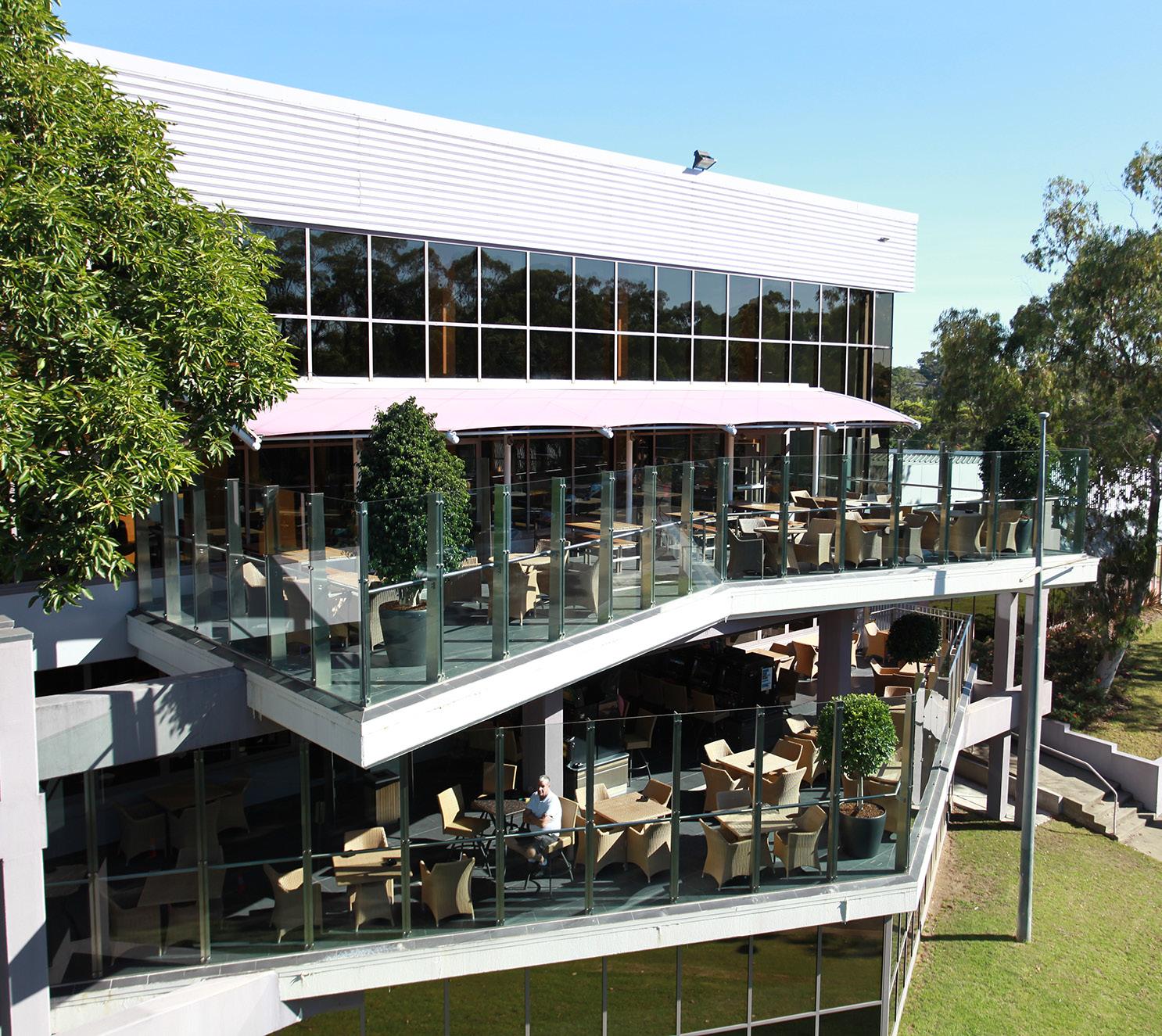
“Let’s spend $30-40 million and get this [club] humming again.”
left, we’d halved the debt, and we were making good money. But my time there was done.”
Kelly said he always wanted to move to Sydney, and when the North Ryde RSL role came up, he saw potential, even if the club had been losing money.
“They’ve probably been losing a million for the last five or six years, but last year we made a really good profit. This year will be a lot better.”
The club’s only debt now is tied to TG Millner Field.
“Once that’s developed, whatever happens with it, we’ll be debt free.”
Planning for the future
Alongside the TG Millner project, a full-scale masterplan for the club is currently in the works.
“We’re drawing it now to get approvals by April next year… and hopefully by January 2027, we will be getting it rolling.”
For Kelly, North Ryde RSL reminds him of the Broncos Leagues Club before it was renovated.
“When I walked in here, I could just see it needed some love. You walk around this club, you get lost; it’s a maze. You can see when it was built where one thought bubble ended and the next one started.”
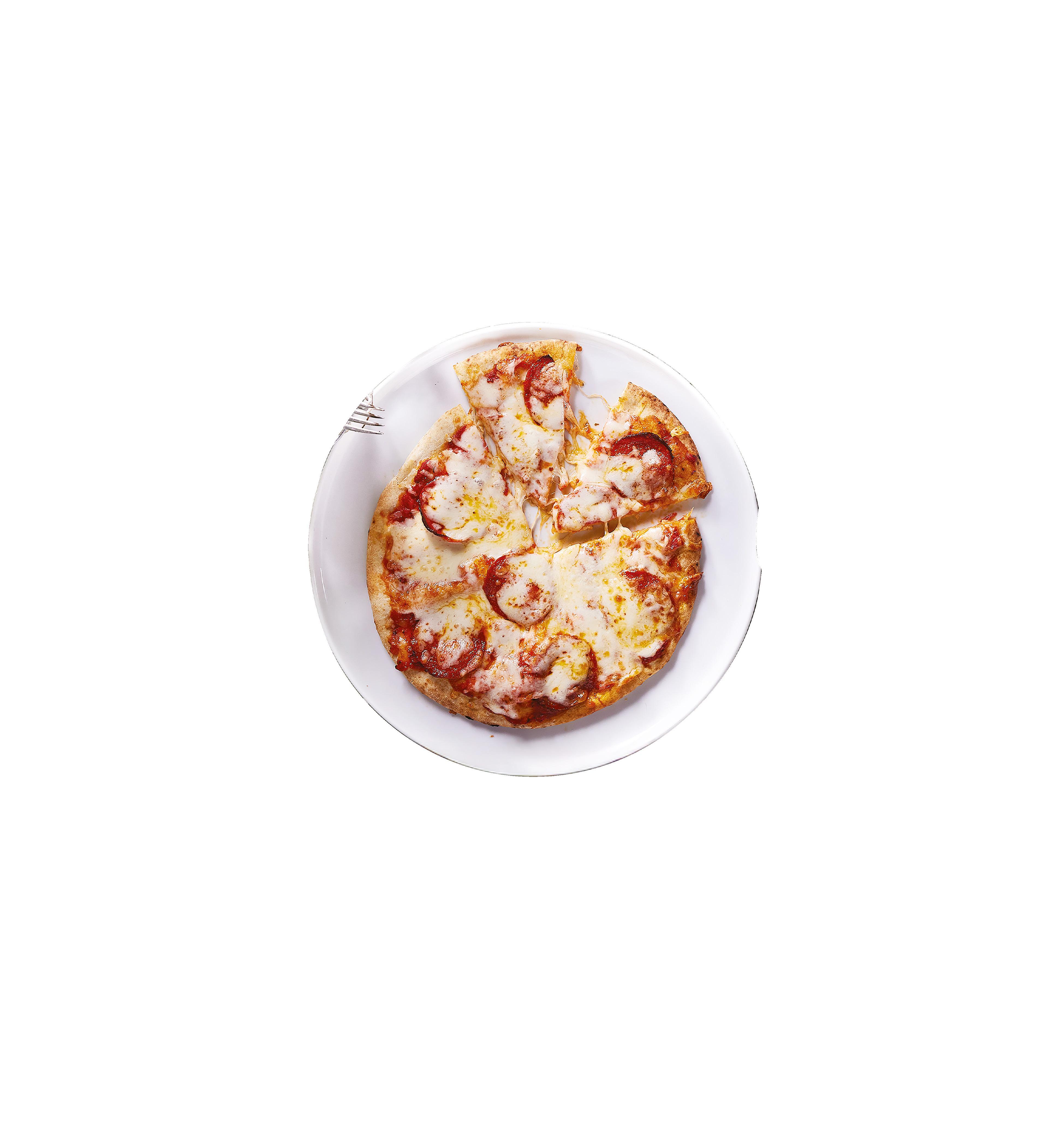
A shred above the rest

Flexible shred pieces for convenience and versatility
Ideal ‘all-rounder’ for a range of applications
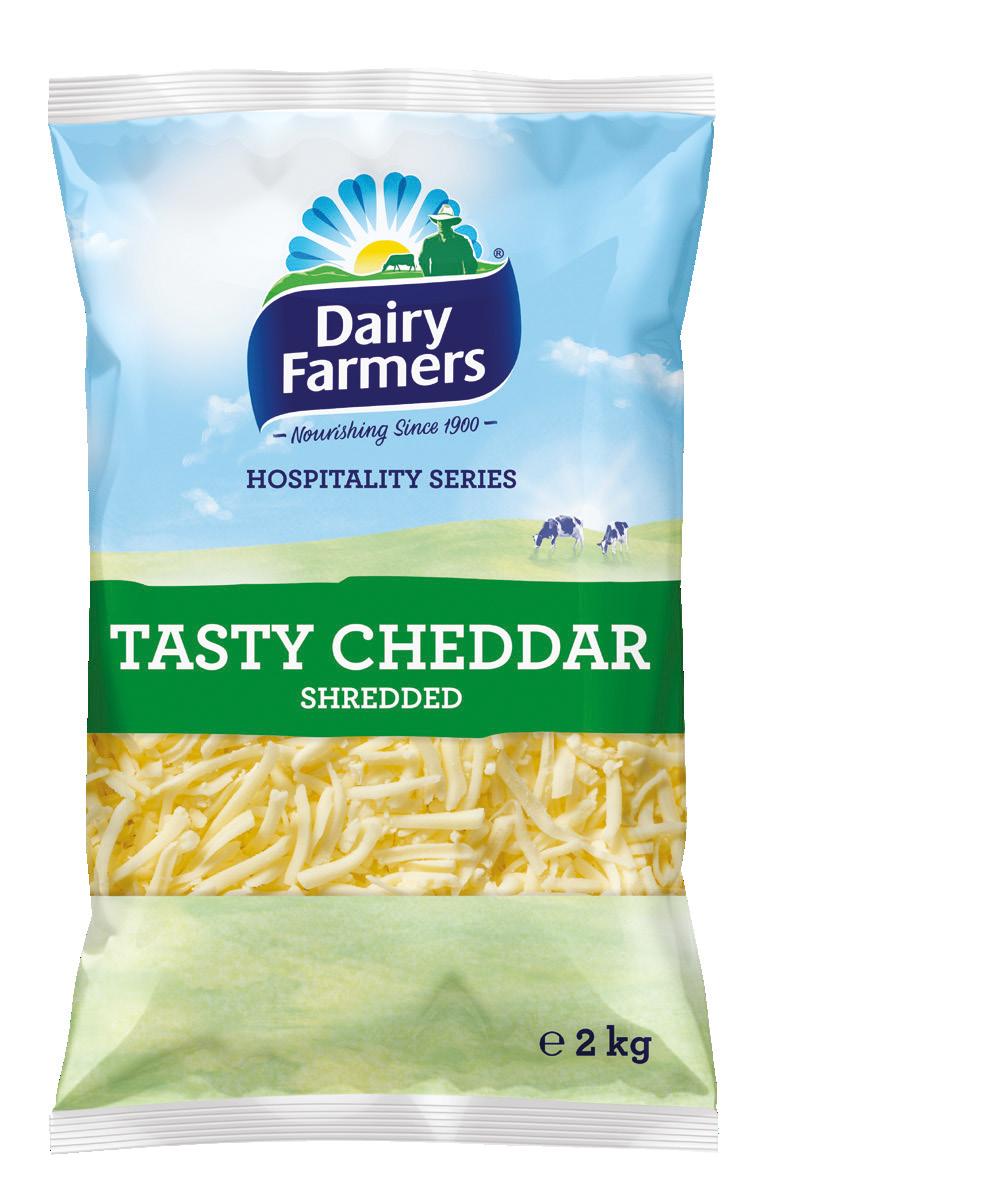
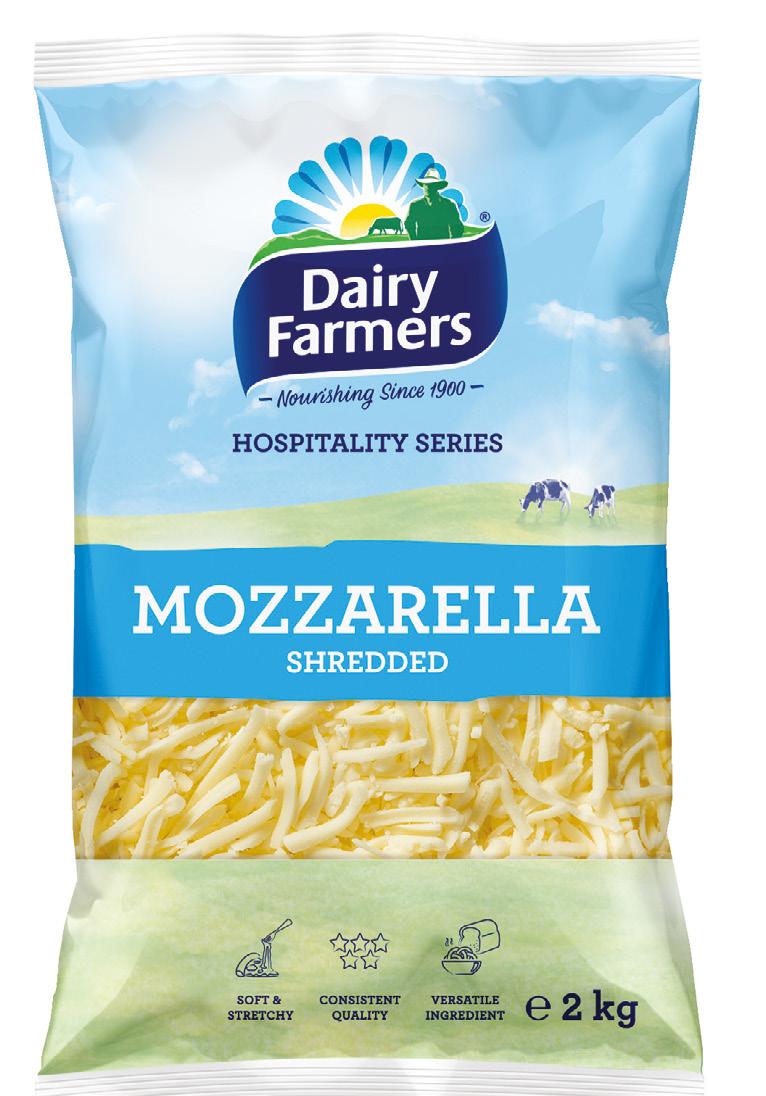
Smooth taste with a mild cheddar flavour
Great stretch with melt in mouth texture
Consistent golden caramelisation when heated
White style shred

Beyond box-ticking
With regulators increasing their scrutiny, clubs are under pressure to prioritise compliance training and risk reduction.
IN A TIME of increasing regulatory focus, clubs are facing growing expectations to tighten their approach to compliance and training.
With AUSTRAC now pursuing civil proceedings against Mounties over alleged breaches of antimoney laundering laws, the message is clear: all venues must be able to demonstrate not just intent, but action.
Even for well-resourced clubs, keeping up with the pace and complexity of regulatory change can be challenging. According to Daisy Brown, chief risk officer at Revesby Workers’ Club, the volume of updates and competing priorities is one of the biggest pressures currently facing the sector.
“I believe the biggest challenge clubs are currently facing is the number of differing regulatory changes that are continually evolving, placing increased pressure on resources,” she said.

“Whilst it is easy to get caught up in gaming harm minimisation measures and AML/CTF program uplifts, which are of course of critical importance and probably the most challenging at this current time, there are other mandates and regulations that need to be on the agenda.”
Brown also notes upcoming changes such as mandatory organic food waste services and ESG reporting obligations, which will require modern slavery assessments and improved data privacy measures.
“With clubs becoming such multi-faceted businesses that rely heavily on third parties, it is difficult to keep up and ensure we are approaching regulatory changes proactively, allowing time to assess risks and appropriately prepare for mandates,” she said.
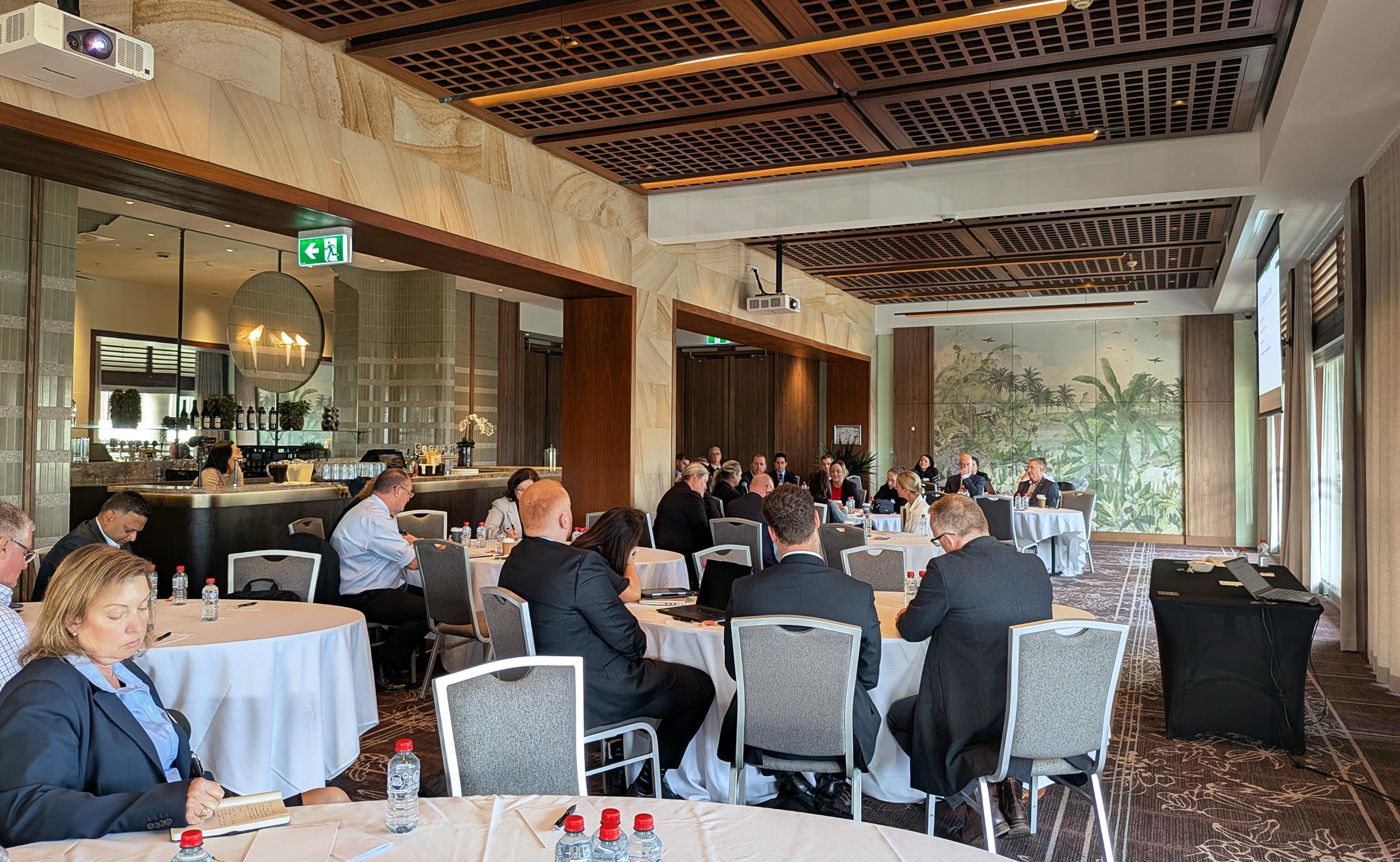
“Being responsible goes far beyond simply complying with legislation and ticking a box.”
Daisy Brown, Revesby Workers’ Club chief risk officer
Working together
Rather than tackling these challenges in isolation, Brown helped launch the Club Compliance Network, an industry-led forum for risk and compliance professionals working in clubs.
The idea took root when she connected with Liverpool Catholic Club’s compliance manager Lisa Chapman.
“We discussed how it would be beneficial to connect with others in similar roles,” Brown explained.
“The network began to grow, and with Canterbury League Club kindly offering to host the first face-to-face meeting, the interest grew very quickly with a robust agenda focused on AML/CTF requirements.”
Brown explained the purpose of the group is to connect and collaborate with industry professionals, where they can discuss governance, risk management, compliance, processes, and other topics of interest.
“I hope that collectively we can uplift the industry approach to compliance and risk reduction, allowing us to continue being trusted responsible operations and offer safe and inclusive environments for the community,” she said
The Club Compliance Network’s first meeting, where over 25 clubs were represented, revealed
there was a clear commonality between venues – large and small – centred around the ongoing challenges that clubs face with evolving regulatory changes.
“Regardless of the size of your club, pressure is being placed on available resources while we navigate the landscape and continue to ensure we provide exceptional customer service to the community,” Brown said.
“Clubs are seeking technology that can speed up data monitoring processes. However, given that we must be mindful of how we handle, use and store sensitive data, the use of these solutions can be quite complicated.
“Some clubs are simply trying to find the time to strengthen frameworks, processes and procedures and ensure these are documented effectively.”
Many are also grappling with how to best manage the complexity of their AML/ CTF programs.
“A clear takeaway was the need to ensure that we comply with our AML/CTF programs in place, which means consistently reviewing the processes and procedures outlined in these programs to keep them up to date,” she added.
“Equally, it is vital these programs are reflective of the risks unique to our venue. There is not a one-size-fits-all approach, so clubs must
Be aware, be alert, take action
Here are some top tips from AUSTRAC about how you can protect your business from money laundering and terrorism financing.
Tailor an AML/CTF program to suit your business
Monitor customers who receive a higher amount of gaming payouts
Monitor your venue for suspicious activity
Keep your AUSTRAC enrolment details up-to-date
Maintain accurate transaction records
For more information, visit austrac.gov.au/pubsandclubs
spend time conducting thorough risk assessments for each venue they operate.”
Brown believes a compliance network will deliver benefits for all venues.
“When it comes to compliance, we are not competitors,” she said. “The network should be seen as a strategic advantage for all venues to work together to reduce risk, share insights, and promote consistency across the industry.
“We should be open to share ideas, successes, failures and lessons learned with each other, which might help another venue understand what pathway will be successful for them.
“I believe we will adapt to best practices faster by collaboratively discussing emerging risks in the sector, and this is likely to greatly assist smaller clubs who may not be lucky enough to have some of the resources that larger clubs have.”
For Brown, this kind of industry-wide consistency speaks to the deeper values clubs should embody.
“As pillars of the community, being responsible goes far beyond simply complying with legislation and ticking a box,” she said.
“It comes from a developed culture within the team that

“…this isn’t a regulation to follow because you must, it’s a tool to protect your venue, your guests, and your professional integrity.”
Andrew Lewis, Allara Global CEO
Did you know?
According to AUSTRAC, if your business has entitlements under licence to operate 15 or less EGMs you may be exempt from many obligations, including having an AML/ CTF program, customer due diligence and submitting certain reports to AUSTRAC, although you must still enrol with AUSTRAC and report suspicious matters. For more information, visit austrac.gov.au/pubsandclubs

is centred around transparency, proactively balancing our regulatory obligations with community expectations and our ethical responsibilities.”
Training that sticks
But collaboration is only one part of the equation. Training is the other. According to Allara Global CEO Andrew Lewis, targeted experiential learning can make a significant difference in how staff understand and respond to compliance requirements.
“People learn best when engaged in situations and experiences that are highly relevant to them and their work roles,” he said.
“For example, when a bartender or duty manager is presented with a scenario involving unusual spending or suspicious behaviour, they’re not drawing on vague compliance definitions. Instead, they can recall the specific guidance from their training designed for their exact role, using the right language and examples rooted in hospitality. When training is designed like this, it just clicks.
“It says: this isn’t a regulation to follow because you must, it’s a tool to protect your venue, your guests, and your professional integrity.”
Culture starts at the top
One of the most important success factors any compliance training, Lewis said, is buy-in from leadership.
“We see that when clubs and their senior leaders take a proactive approach and advocate training as a core business priority, compliance improves, and the business moves from reaction and rectification to prevention,” he said.
In practice, this means compliance isn’t just an item in an email from HR or a once-a-year exercise but delivering it consistently, from on-boarding to regular team meetings. Lewis pointed out how
there are customers who gamify their training, while others have tied manager KPIs directly to team completion rates.
“It doesn’t have to be onerous, you can incorporate it into daily tasks and team conversations,” he said.
“I’m talking about sharing insights at your regular team briefings, using message boards and intranets for short bursts of information, or a team chat after a real incident, and making online training mobile-friendly and easily accessible so the team can regularly access it and complete knowledge quizzes.
“The goal is to make learning a normal part of the job, so it stays fresh in people’s minds long after the initial training.”
Consistency is key
Brown shares a similar perspective, explaining how Revesby Workers’ Club approaches compliance training.
“We are in the process of increasing the regularity of compliance training,” she said.
“Whilst there are requirements that must be met, we feel that additional training is beneficial to ensure our team members are regularly reminded of expectations and role requirements.”
She said Revesby’s operations team actively engages with staff on shift to identify knowledge gaps, while the people and culture team has created a balanced approach to online and face-to-face training.
“They have found a balanced approach to online and face-to-face training which was worked well in ensuring staff are constantly engaged,” she said.
Looking ahead, Brown believes clubs will need to evolve how they deliver training to match the complexity of the regulatory landscape.
“Tabletop exercises and AI-simulated training will become increasingly popular in the industry,” she predicted.
Reduce risk. Protect your venue.
Compliance training made for hospitality.
Lower your risk
Minimise incidents and avoid costly penalties
Ready-to-go courses
Food safety, WHS, AML, Respect@Work and morealways up to date.
Stay audit-ready
Track training progress with real-time reporting.
Simplify your compliance training today.
Book your free demo



Get smart
Adopting new technology can seem daunting, but there are already some clubs leading the charge, embracing AI and facial recognition technology to smarter payment solutions.



IN AUGUST, THE Productivity Commission handed down a report that framed artificial intelligence not just as a tool, but as a potentially transformational force – one that could boost Australia’s economic output by more than $116 billion over the next decade.
Likening the gains from AI to the impact of steam engines during the Industrial Revolution, the report found that productivity among Australian workers could grow by 4.3 per cent. The Commission also flagged a further $10 billion in productivity improvements annually if businesses and individuals are able to better access and use personal data to inform decisions.
While the full impact of AI on the economy remains uncertain, the message is clear: automation, data use and intelligent systems are already reshaping the way services are delivered – and some of that change is already happening inside clubs.
At Carina Leagues Club in Brisbane, an AI assistant named Jasmine now picks up most incoming calls. Jasmine is part of a voice AI solution developed by yomconnectAI, a platform designed specifically for hospitality venues.
According to Carina Leagues Club CEO Adam Wiencke, it’s already making a difference.
“Jasmine is Carina Leagues Club’s conversational AI receptionist who handles general enquiries, directs calls, takes messages, and provides real-time information about the club’s dining, entertainment, and promotions,” he said. “Jasmine is also supported by a broader AI team that helps to manage our restaurant bookings and functions, so there are a few different voices on the line when members call.”
Carina Leagues went live with Jasmine in mid-February 2025, and the club has already seen a noticeable shift.
“Members who call the club receive fast responses to common questions through the AI knowledge bank and can book a table at our restaurants seamlessly over the phone,” Wiencke said. “With our admin team spending less time answering phone calls, they’ve been able to focus more on our in-club experience, stepping away from the front desk and connecting with our members and guests in person.
“The change has given us the opportunity to fine-tune our service offering and continue delivering best-in-class experiences.”
While it has been mostly smooth sailing, Wiencke highlighted the biggest challenge was integrating multiple systems and ensuring they all communicated effectively.
“Our biggest learning was around training the AI,” he said. “At first, we input information into the knowledge bank the same way we’d communicate with our staff. But in some cases, we needed to be far more detailed to ensure the AI shared the right information with members.
“The overall experience reinforced our belief in taking the first step and leading the way. We’re proud to keep moving forward, embracing change and exciting innovations to continue serving our community well into the future.”
The feedback from members has also been encouraging. “We’ve had quite a few people comment they didn’t even realise Jasmine was a robot,” Wiencke said.
Keeping it in check
Beyond customer service, Revesby Workers’ Club chief risk officer
Daisy Brown sees clear potential for clubs to explore the role AI can play
“A robust framework is key to ensuring we use this AI appropriately.”
Daisy Brown, Revesby Workers’ Club chief risk officer
“With our admin team spending less time answering phone calls, they’ve been able to focus more on our inclub experience.”
Adam Wiencke, Carina Leagues Club CEO
in strengthening governance and compliance. She believes it’ll play a large factor in fostering a proactive technologybased culture and help clubs move away from the traditional reactive approach to compliance.
“As there is no solution out there to provide us with an end-to-end system that can integrate all aspects of our operations, I imagine more clubs will start to invest in building bespoke AI solutions that bridge some of these gaps,” she said.
“This may be tools to assist in some of the manual day-to-day transaction monitoring tasks or applying machine learning to data for identifying trends and providing early risk prevention.”
Brown also sees a role for AI in policy management and boardroom efficiency.
“I have seen risk management platforms exploring the use of AI in policy libraries, which may allow us to start having policies updated automatically with legislation changes,” she said.
She also believes boardrooms could benefit from automation.
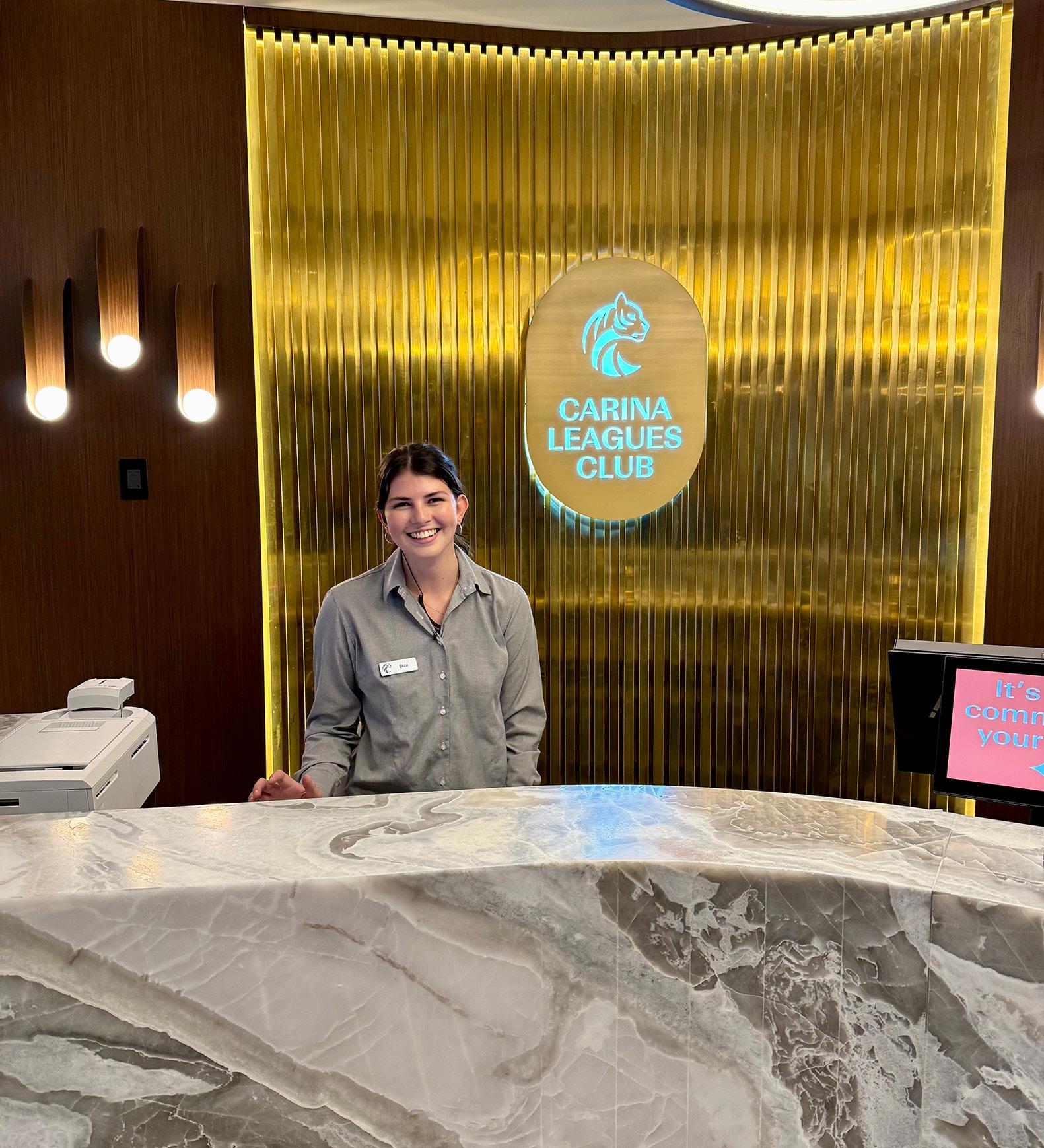
“We should also be using AI in the boardroom, to summarise complex regulations and documents to enhance our board’s knowledge, and to review our board papers and minutes to allow for heightened governance and compliance.”
But alongside the promise of AI, Brown warned of the need for a solid foundation.
“A robust framework is key to ensuring we use this AI appropriately; however I would encourage clubs to start having conversations with their IT teams and IT providers to look at ensuring the internal infrastructure is ready and teams know how to responsibly use AI in the workplace.”
She emphasised that relying on technology alone isn’t enough.
“We must remember that the best tools are only useful if the business is willing to invest in using them, so it is vital the board and management are committed to this concept,” Brown said.
“If we look to proactively integrate AI into our daily operations, I do believe we have a real opportunity to reshape
compliance in the industry and lead positive change across the sector.”
Balancing innovation and privacy
Facial recognition technology (FRT) is another fast-developing space where clubs are weighing up innovation, compliance and privacy. In 2023, the NSW government committed to mandating FRT in hotels and clubs with gaming machines to better identify excluded patrons. The technology is being positioned as a more reliable method than manual checks for implementing statewide exclusion registers and third-party exclusion schemes.
Elke Oberg, marketing manager at Cognitec Systems, said that clubs already using facial recognition have seen the benefits.
“Clubs that have either run a face recognition trial in their facility, or use the software in daily operation, are easily convinced about the technical capabilities benefitting their business, and trust the high matching accuracy when finding people in watchlists,” she said.
Carina Leagues Club is using AI to help handle general call enquiries so reception can focus more on connecting with patrons.
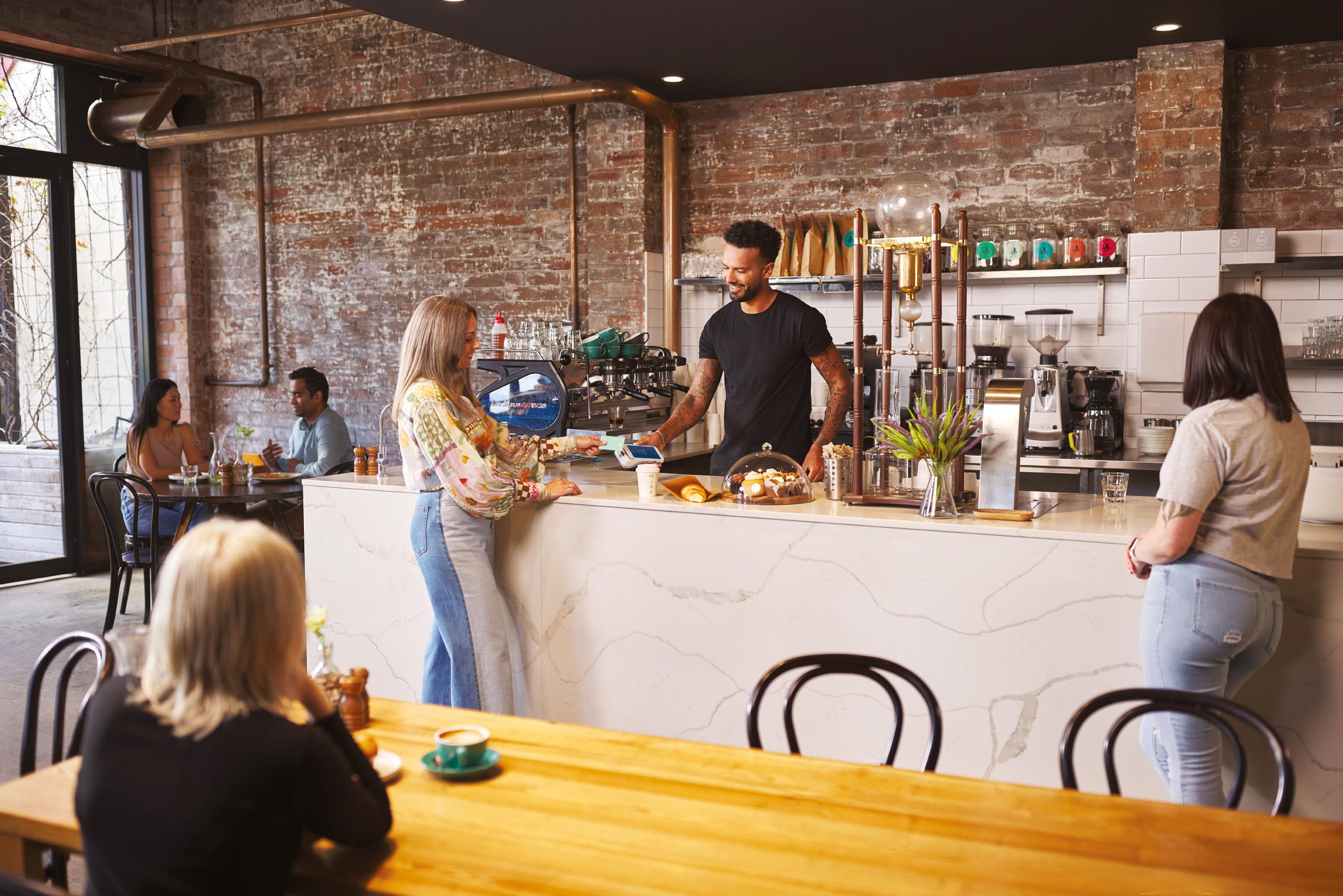

But challenges remain, Oberg cautioned.
“[Facial recognition technology] is always going to be [costly], but in the long run, it’s worth it.”
Tom Francis, Francis Venues CEO
“Clubs and other venues are increasingly concerned about the impact of privacy regulations, their complexity, and the cost and time spent to meet compliance,” she said. “All newer laws require extensive documentation, some even expensive certification. It is getting harder to convince clubs that these efforts and expenses are worth the benefits and financial gains when using a face recognition system.”
Oberg highlighted it’s also important to understand the public perception of new technologies such as FRT.
“Businesses are wary of scaring off patrons who are concerned about their privacy within a facility using face recognition technologies,” she said. “In most countries, it is now required to make their use transparent, so good customers may choose to avoid this particular club if they have to consent to the use of their facial image.”
In Victoria, Francis Venues has already rolled out facial recognition technology at its club entrances. CEO Tom Francis said the move was driven largely by compliance and licensing obligations, adding that it also supports safer operations in high-volume venues.
“It’s for when you say you have barred patrons, and the onus is on the manager to work out if someone breaks their barring order, but [the technology] just takes off that risk and requirement,” he said.
“And if security is worried that some people are going to come in on a Friday night and are finding a way to get into the venue, at least the technology will flag things from that point of view.
“The other side is self-exclusion from a gambling standpoint where it’s very hard to pick and choose who’s self-excluded because you can only go off little photos, so if that information is fed into AI, it’s at least 90 per cent accurate. But people also change … so how can you pick that up when venues in Victoria can have 100-150 self-excluded patrons?”
While Francis believes in the technology, he acknowledged the biggest downside is the costly upfront investment.
“It’s always going to be that, but in the long run, it’s worth it, especially if you’ve got a firewall set up,” he said. “For something like FRT, you need to follow proper privacy policies, and you need to pay for legal advice. You’ll need signage as well that’s forward-facing for customers and for staff.”
For clubs considering FRT, Francis recommended asking around. “Just get lots of quotes. If you speak to someone in one area, whether it be cybersecurity to point-of-sale development, for every one person, go speak to another two or more for advice. Don’t just go with one, because I’ve seen so many times it can be priced inappropriately.”
Beyond AI
While AI and facial recognition dominate much of the technology conversation lately, digital transformation across clubs is also being driven by more practical needs, including the modernisation of membership systems and payment workflows.
According to MiClub marketing manager
istockphoto/afterday
Recognize and Analyze
Is this patron . . .
Automate security alerts with face recognition
Cognitec’s FaceVACS-VideoScan technology scans faces of visitors, compares them to image galleries, and instantly alerts security staff to known persons.
The software also performs anonymous facial analysis to detect underage visitors, count individuals and visits, estimate age ranges, and track people flow.
Our Australian team works with you to design the system architecture, install the right cameras, and implement work flows and best practices.
Let us show you an online demo, and introduce you to reference projects.
We are eager to learn about your face recognition needs and ideas.
Cognitec is the only company worldwide that has worked exclusively on face recognition technology since its inception in 2002. www.cognitec.com | sales@cognite.com
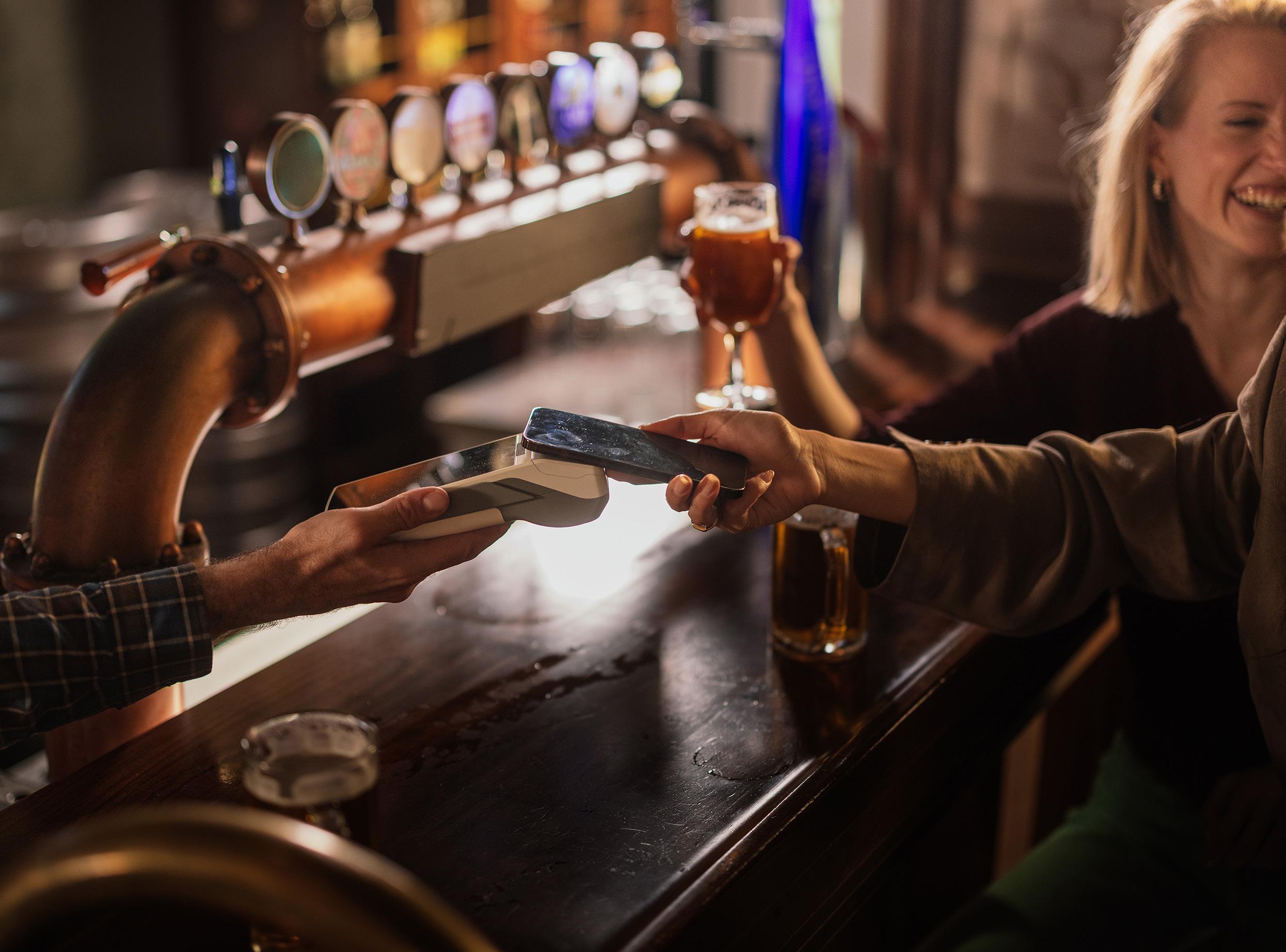
Phil Laurie, club adoption of tools like MiMembership often comes down to necessity rather than enthusiasm.
“Sometimes you’re basically forced into decisions around upgrading software because the incumbent systems are no longer supported, or they’re not PCI compliant,” he said.
The payments space has seen a similar shift, with many clubs now rethinking how transactions fit into their broader operations. Smartpay marketing manager Alannah Turner said payments are no longer viewed as just a “transactional necessity” but as a central part of the customer experience.
“We’ve seen an influx of modern payment solutions entering the market to lower the cost of merchant fees and facilitate the demand for efficient and elevated POS and payments bundles outside the traditional business models,” she said.
“We know hospitality venues are looking
for solutions that integrate seamlessly with their broader operations. There has been a higher adoption of mobile terminals, online booking solutions, and loyalty solutions that simplify operations and offer an exceptional customer experience.”
Turner said the demand is being driven by a mix of factors, including rising customer expectations, staff shortages, and the leaner business operations.
“Payment tech is no longer a back-end tool; it’s become front and centre of the customer experience.”
Still, Laurie cautioned that adoption speed can be held back by ingrained workflows and decision-making processes. Staff who use systems daily aren’t always consulted, which can add friction. But when benefits are clear, he said, uptake is much faster.
“Some adopt it very well, especially in areas where their incumbent software doesn’t do the job for them. Or, if
the administrative benefits are well articulated to them, as in this software is going to save you X time or help you do this next thing, that can expedite the process,” Laurie said.
Turner agreed that clubs often have unique demands compared to other hospitality venues, particularly when it comes to transaction speed and reliability across large, multi-service sites.
“Our Multi-Network SIM is designed to constantly search for and connect to the strongest available network, so there’s minimal downtime during busy periods,” she said.
Looking ahead, Turner believes that payment technology will continue to shift towards integrated payments and operational systems with one point of contact for all solutions. “Consumers are savvier than ever, and their expectations of hospitality venues will continue to drive towards simplified customer experiences.”

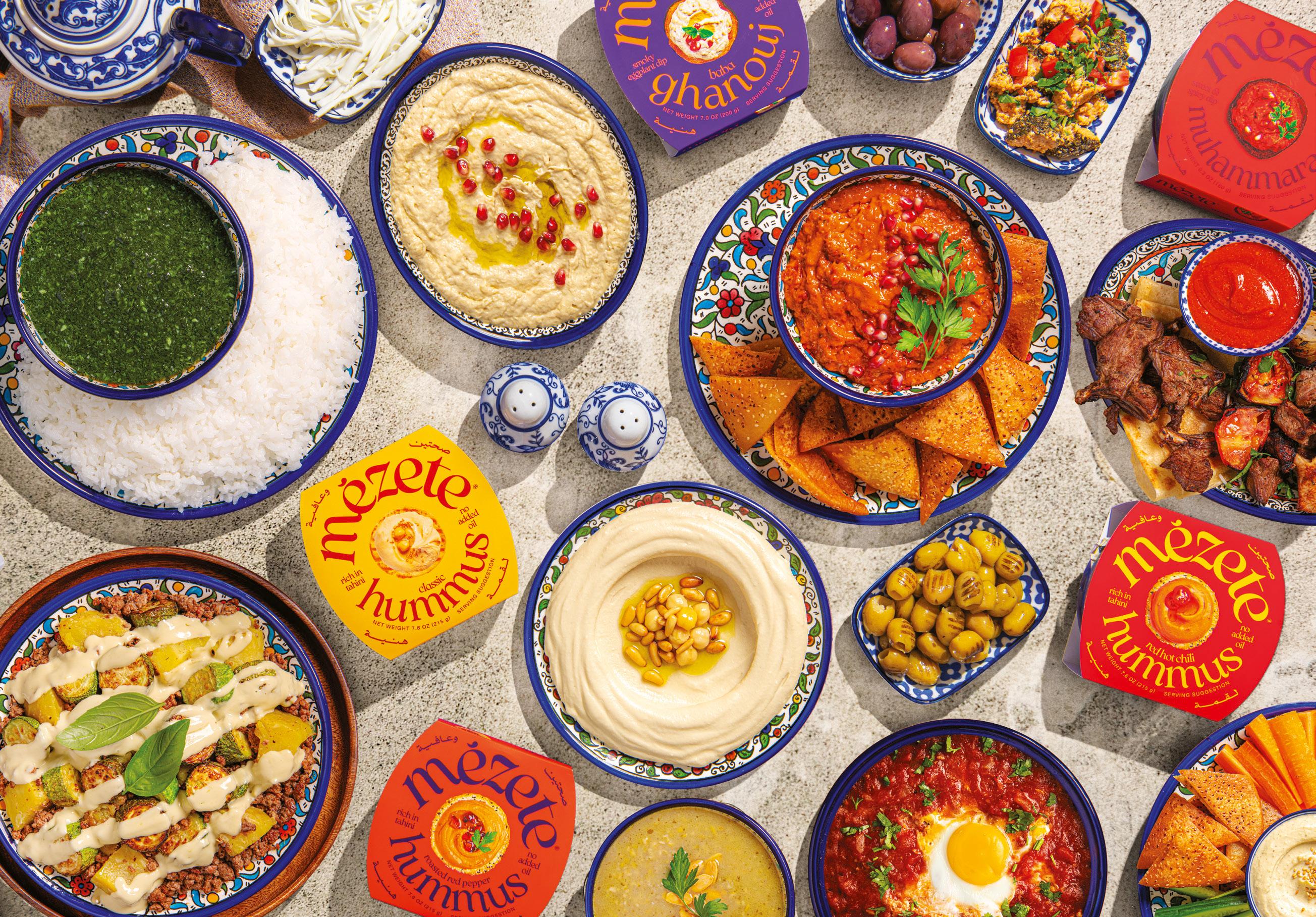
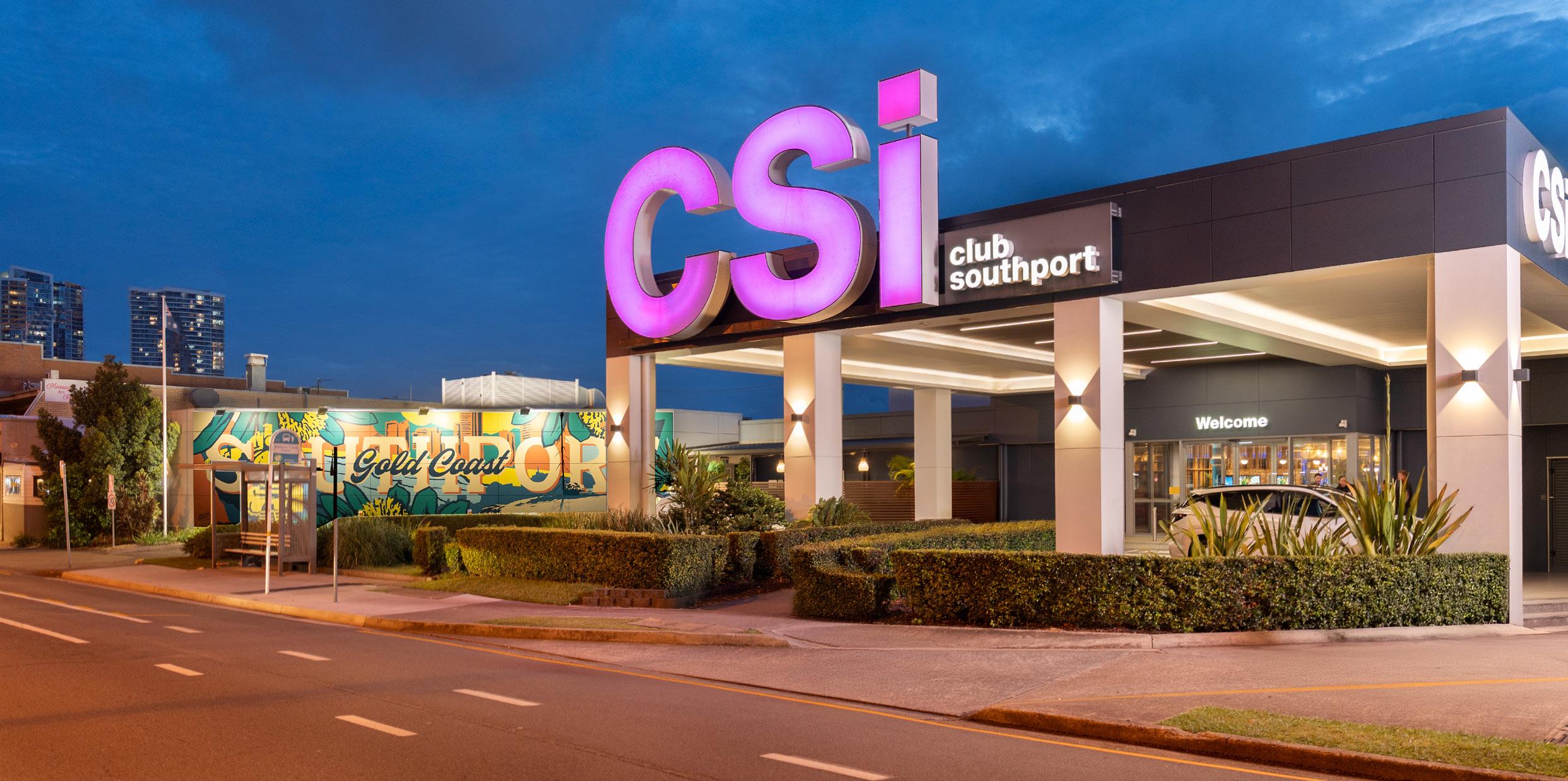
Branding beyond the fitout
Renovations may change the physical appearance, but branding is what changes perceptions. What story does your club want to tell?
WITH MANY CLUBS unveiling new looks, refreshed interiors, and upgraded furniture, it’s just as important to think about the story your venue tells through branding and communications. Renovations can transform the physical space, but how a club presents itself through uniforms, logos, and marketing plays a vital role in shaping member perception and attracting new audiences.
Research by Lucidpress underscores this point, showing that consistent brand presentation can increase revenue by up to 23 per cent. In a competitive market, it’s often these brand touchpoints that differentiate one venue from another.
Last year, Cronulla RSL unveiled a refreshed club that embraced its history while introducing a Mediterranean-inspired look to celebrate its enviable position overlooking the beach.
“In 2024, we were going through a significant rebranding and a pretty big renovation of our main floor,” operations manager Bradley Bishop said.
“We changed the restaurant, the main seating area, the deck, bar and cocktail space. Our blue and white check uniforms just weren’t going to fit in anymore. The look and feel of the brand went more earthy beach, drawing inspiration from the Mediterranean, so we had to look at different options.”
The club opted for two uniforms, khaki green and oatmeal, to match its new earthy, coastal aesthetic. The club also relaxed its dress rules for pants and shoes.
“We’re an RSL with a long heritage, and we like to think we’re a bit classier than your average pub. But it’s 2025, our staff are different, and we need to change with them,” Bishop said. “Now, they can wear sneakers instead of black leather shoes. We wanted to move with the times.”
Other teams, such as duty managers and reception staff,
retained a sharper look. “It’s still a beachside venue, and while it’s relaxed, our duty managers still wear suits. Guests should feel they’re being greeted at Cronulla RSL, not the dodgy pub downstairs.”
For Bishop, uniforms are a key part of the bigger brand picture. “At the end of the day, we all serve schnitzel and sell beer, but it’s about the story you tell, and encouraging guests to choose your venue over another. Our brand story aligns with our values of fun, comfort, and great customer experience,” he said.
“This is an RSL unlike many others. In some parts of NSW, young people might be embarrassed to go to the RSL. Here in Cronulla, they’re proud of it; it’s fun and funky place to come to on the weekend. The brand needs to speak to an 18-year-old all the way through to their grandparents.”
The power of presentation
Cronulla RSL’s approach reflects a wider shift in how clubs view staff presentation from a dress code to a core element of brand identity. Cargo Crew founder and chief creative officer Felicity Rodgers has seen this evolution play out across the industry.
“We’ve seen a shift over the years, with clients understanding the importance of investing in a quality uniform and harnessing the power of presentation,” she said.
“Uniforms aren’t just about function anymore, they’re a key part of how a brand shows up. These days, it’s not enough for a uniform to just do the job, it’s got to feel good, look great and tell your story.”
As the customer experience becomes a greater focus for service industries, Rodgers believes what staff wear plays a significant role in setting expectations and shaping first impressions.
“Whether you’re a family-friendly sports club or delivering a premium hospitality experience, staff presentation sets the tone,” Rodger said.
“Colours, cuts and finishes can mirror your club’s brand colours and personality, while embroidery or accessories can create distinct points of difference between outlets and roles. When styled well, a uniform becomes a moving brand touchpoint that unifies your crew.”
Rodgers has worked with many clubs, including Cronulla RSL, and noted that most want to look professional without slipping into corporate stiffness. She noted there’s a strong demand for modern suiting mixed with relaxed, smart-casual styles.
“Pieces like the Smith Oxford shirt and the Taylor suit jacket in navy are go-to choices, they’re sharp yet easy to move in. Along with earth tones, clean lines and fabrics that hold up to long shifts are key,” she said.
For her, the best uniforms are versatile. “Uniforms that transition from day to night, and that staff enjoy wearing, are driving preference,” Rodgers said. “It’s all about creating a polished, consistent look from front to back that aligns with the club’s hospitality offering and enhances the guest experience from first glance.”
Her advice for clubs looking to update their staff uniform is to define the atmosphere they want to create first.
“Is it premium, relaxed, [or] coastal? Then consider practicality; fabric durability, comfort, fit for different body types and ease of laundering. An additional consideration can also be to engage team stakeholders to be part of the decision-making process. They are the ones wearing the uniforms, so including them in the uniform journey can greatly increase employee satisfaction and adoption of your new uniforms in the long-term.”
Rodgers also encourages clubs to think beyond aesthetics. “How will your crew feel wearing this uniform daily?” she said. “At Cargo Crew, we help clubs map uniform choices to each role, from bar to reception to events. Brand alignment is crucial, so we also offer styling guidance and logo application to ensure the final look enhances your club’s identity and performs under pressure.”
Marketing the makeover
Meanwhile, CSi Club Southport has completely overhauled its marketing and brand strategy to match the completion of its $10 million renovation at the end of last year. This included rolling out strategic campaigns across digital, print, and in-club channels, and delivering behind-the-scenes glimpses of the renovation, which helped build anticipation and excitement.
“From the outset, a clear narrative was crafted to highlight not just the physical changes, but the broader vision behind them, emphasising community, innovation, and a commitment to delivering exceptional experiences,” general manager Blair Sleeman said.
The club’s updated interiors, enhanced amenities, and revitalised spaces have all contributed to a brand that Sleeman describes feels more “vibrant, welcoming, and dynamic”.
“Where the club was once seen as a traditional community
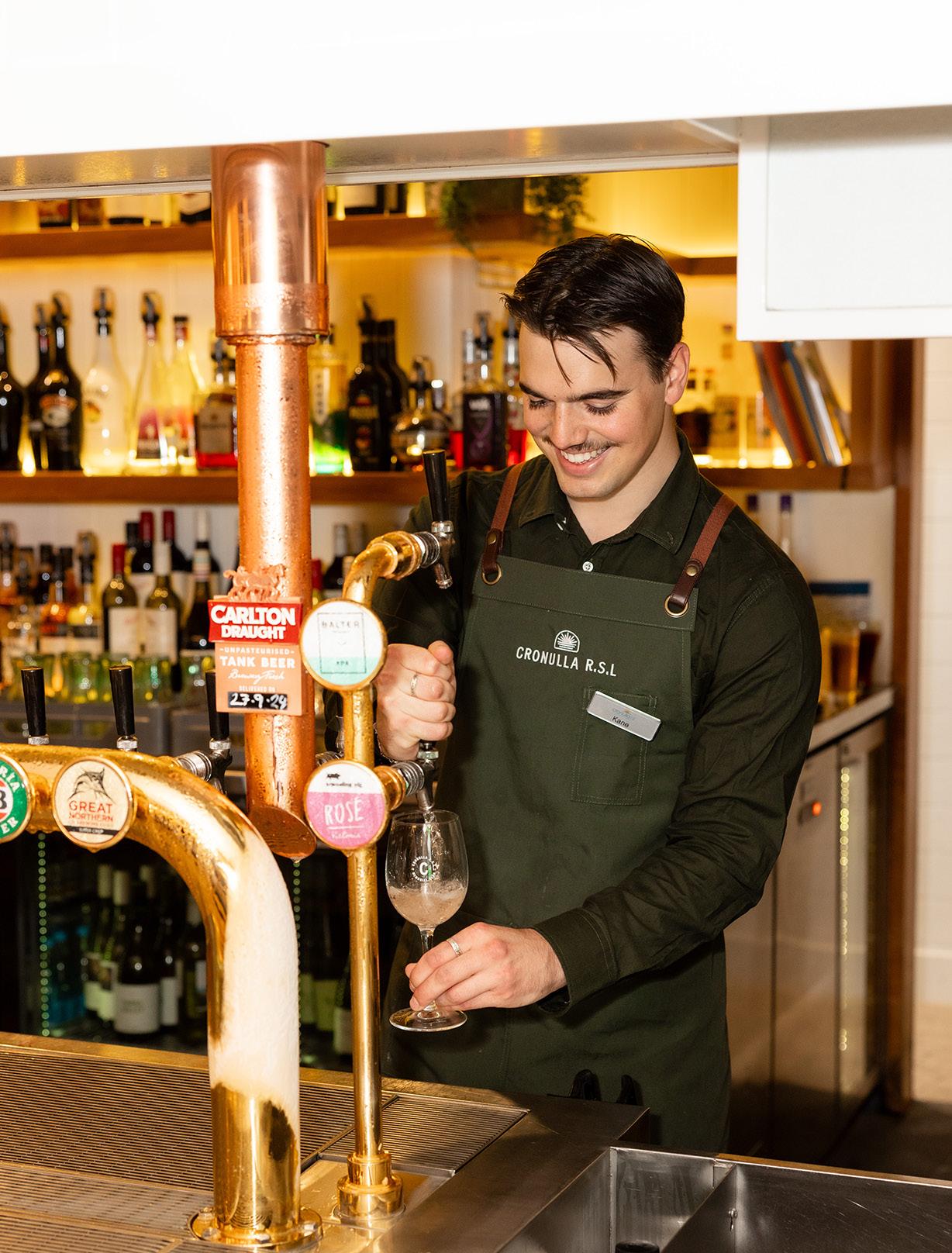
“Uniforms aren’t just about function anymore, they’re a key part of how a brand shows up.”
Felicity Rodgers, Cargo Crew founder and chief creative officer
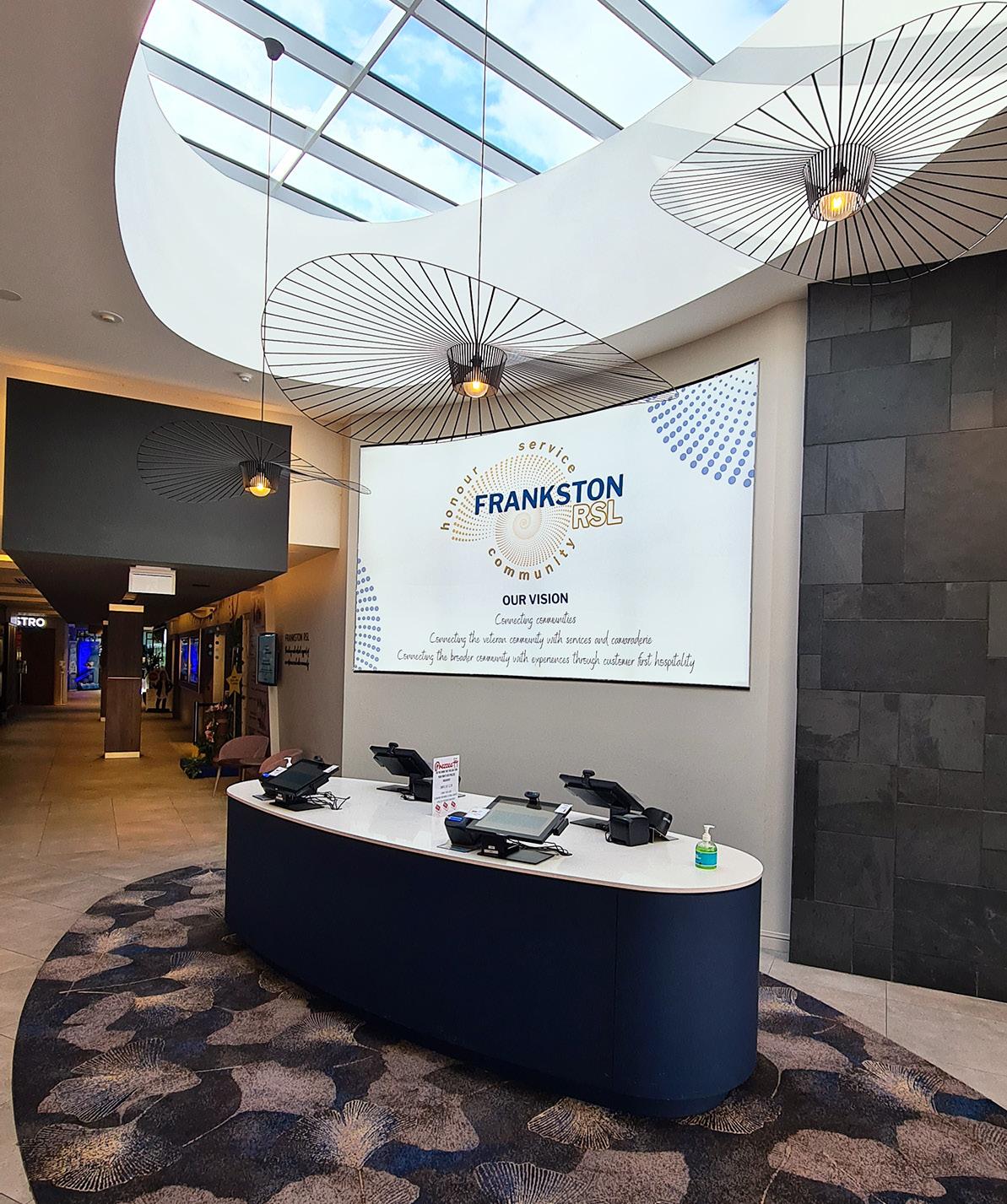
Frankston RSL unveiled a new logo in April to better reflect the locality, growth, and evolution of the club.
Cronulla RSL worked with Cargo Crew to refresh its uniform to reflect the club’s new earthy, Mediterranean interior.
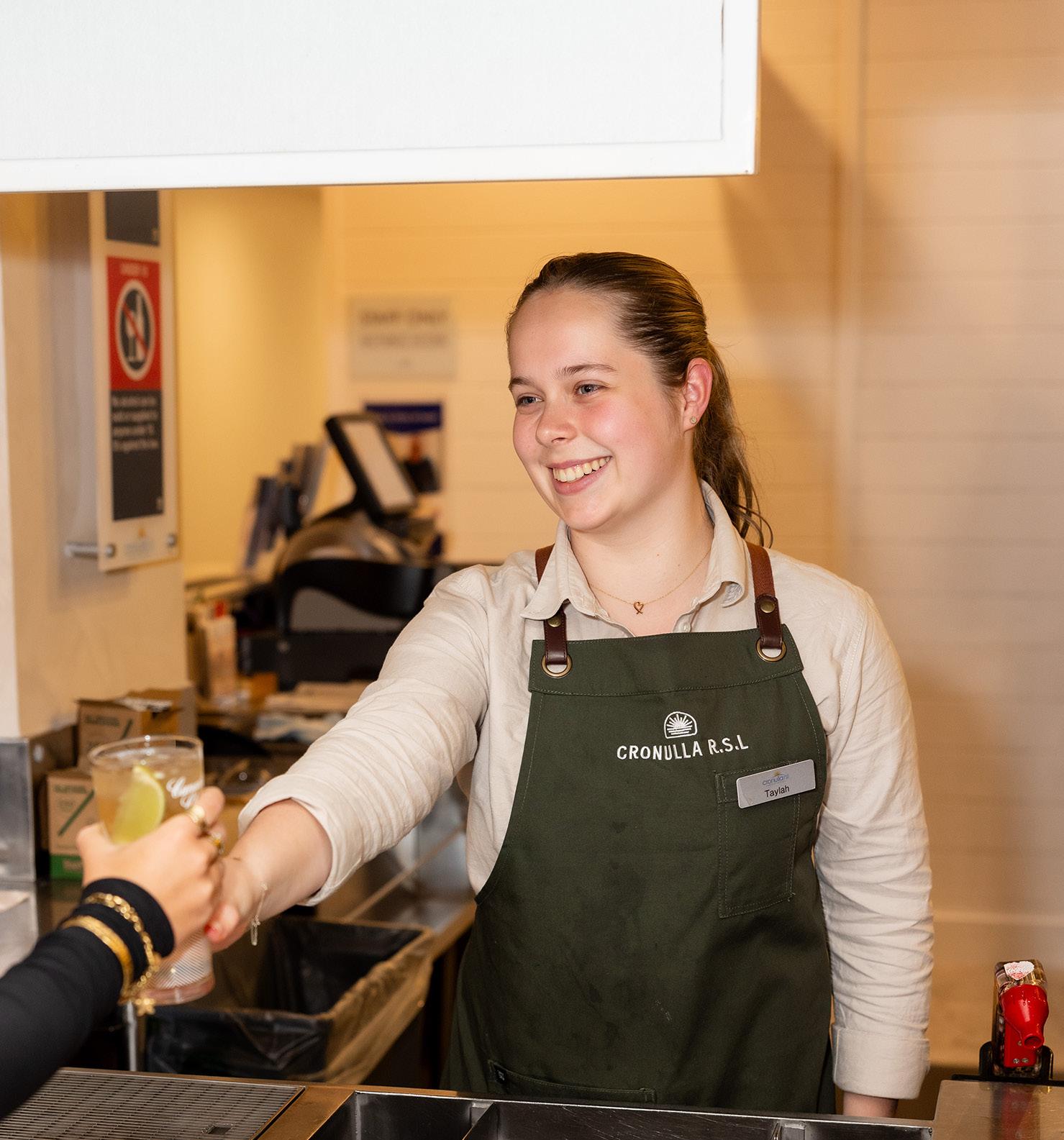
“At the end of the day, we all serve schnitzel and sell beer, but it’s about the story you tell.”
Bradley Bishop, Cronulla RSL operations manager
venue, it now presents a fresh, contemporary image that reflects both modern aesthetics and a renewed focus on inclusivity,” he said.
“This evolution has allowed the club to reposition itself as a destination for both longstanding members and new visitors and families, while still honouring its heritage.”
The rebranding and marketing initiatives, according to Sleeman, have had a noticeable positive impact on foot traffic.
“Membership numbers have risen, with increased interest from both returning and new members,” he said.
“Brand awareness has grown, as evidenced by higher engagement on social media, more enquiries, and greater attendance at club events.
“Community engagement has also deepened, with more local partnerships, collaborative events, and a stronger sense of belonging among members. Overall, the switch in branding and marketing has positioned the club as a forward-thinking, inclusive, and vibrant hub for the community.”
The new brand has also attracted a more diverse demographic, from younger professionals and families, as well as newcomers to the area.
“This shift is a direct result of both the modernised facilities and a refreshed brand image that appeals to contemporary tastes,” Sleeman said.
“To connect with this new group, branding and marketing efforts have shifted to highlight the club’s versatility, social atmosphere, and familyfriendly offerings. Messaging has become more inclusive, with a focus on experiences, events, and amenities that cater to a broader range of interests and lifestyles.”
The story ahead
Like CSi Club Southport, Frankston RSL’s rebrand followed a period of three renovations across its bistro, cafe, function room, and gaming areas, as well as a change in management and a business restructure.
In April, the club unveiled a new logo featuring a gold-accented nautilus, symbolising its bayside location and growth. The logo is also wrapped by the club’s tagline: honour, service, community.
Frankston RSL marketing and promotions manager Patricia Russo, who came up with the design and concept, explained the logo now matches the club’s current colour scheme and fitout, which features a mix of neutral tones and hues of blues.
“The old logo felt outdated by way of design and colour palette. We were looking for a new logo and brand identity that would have a long shelf life, a high brand recall, and [greater] top of mind awareness,” she said.
According to Russo, the previous logo was a spheroid and yellow, with “no interesting connection to relate back to our legacy or product and service offering, nor something tangible that could be remembered by”.
“The old logo didn’t have a story to tell, and wasn’t supported by a rationale that could explain, ‘what does your logo represent and why have you chosen that design to represent you?’” she added.
Alongside the new logo, the club refreshed its staff uniforms 12 months ago, featuring a mix of grey and charcoal shades, broken up by fine white pinstripes. Russo said the darker palette was an intentional choice, helping staff stand out against the lighter, softer tones and textures of the club’s interiors.
For Russo, rebranding is about more than visuals. “[It’s] also about an internal renewed mindset that helps to reinforce a company’s values and raison d’être, as much as it leads to enhanced brand recognition to drive long-term growth and business success.”

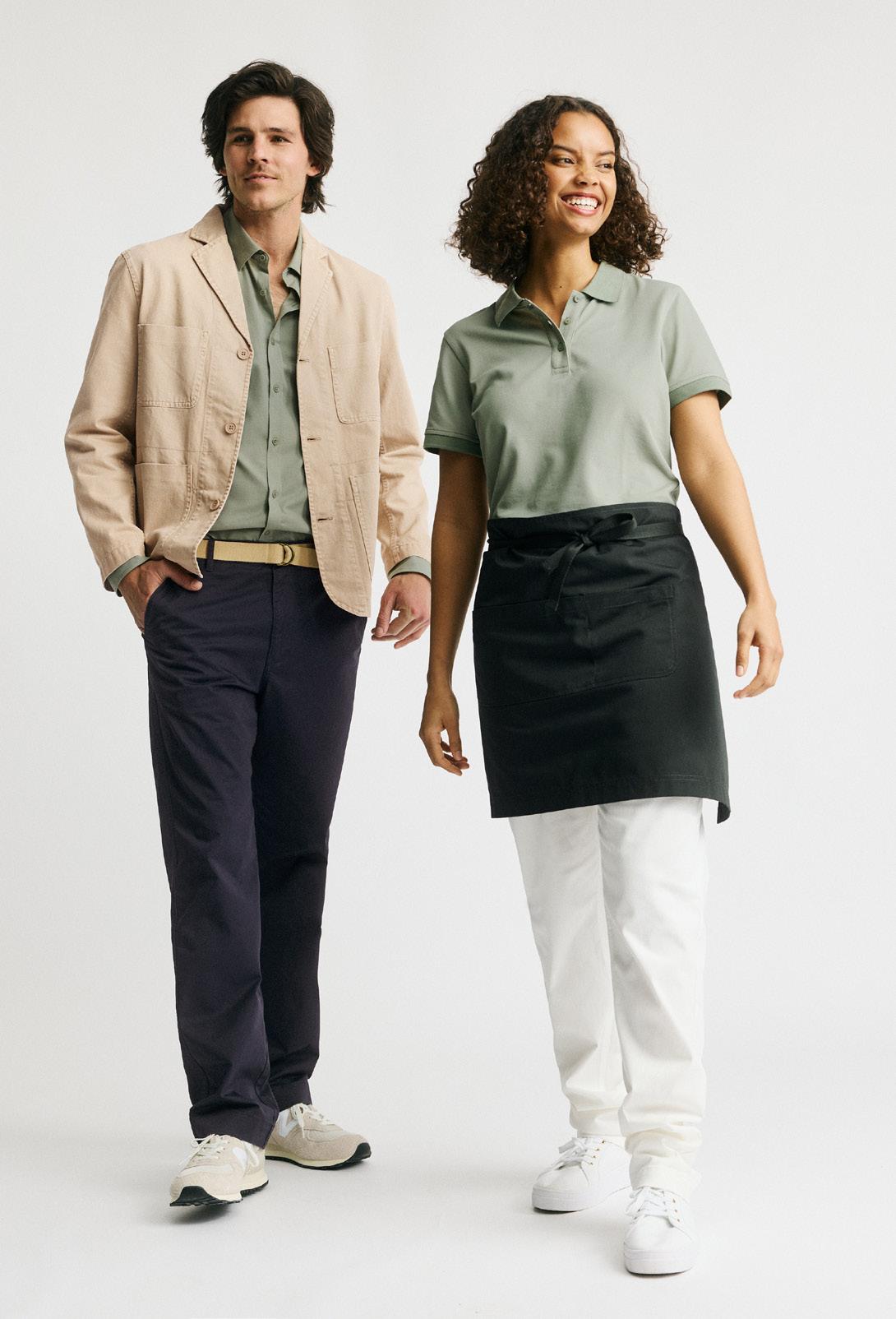

The Global Destination for Uniforms
The evolution of Catering HQ Group
Step into the new era of Catering HQ Group, a bold reinvention of the original boutique catering operation into a full-service hospitality powerhouse.
CATERING HQ GROUP is no longer just a catering company. It is now a comprehensive hospitality solutions provider that brings together deep expertise in culinary excellence, logistics, innovative technology, and scalable business models to deliver seamless, highimpact hospitality solutions. At the core of this transformation is a clear, confident statement: we are the solution.
Led by Directors Steve Sidd and Albie Aldahawi, the business has grown from a boutique caterer into an integrated group with international potential.
“Through this evolution, Catering HQ has remained focused on one objective; to solve problems for clients, venues, and partners by offering end-to-end solutions through four connected pillars” Catering HQ group managing director Steve Sidd said.
Leading the Group’s four-pillar strategy is Catering HQ’s venue offering, the original arm of the business and the foundation on which everything else has been built. Since 1996, it has earned a reputation for excellence as a boutique catering and events company.
The team delivers high impact catering across NSW, partnering with multiple venues across Sydney, including the Castle Hill Group, Cronulla RSL, and Brighton Lakes Golf Club. We also work with dynamic cultural institutions including the Museum of Applied Arts & SciencesPowerhouse Sydney Observatory, Castle Hill and Ultimo locations. Most recently, we were officially appointed as a Panel Member selected to cater outdoor events at the iconic Sydney Opera House.
From this operational strength came a need for smarter systems, this led to the development of our next solution. Established in 2010, Hospitality Genie is a

purpose-built venue management platform developed in-house to solve the challenges venues face every day. While originally designed for the hospitality industry, its versatility extends across multiple sectors, including retail catering, aged care, manufacturing and beyond.
“What began as an internal tool has now grown into a product we can offer externally, allowing other operators within the hospitality industry to tap into the same efficiency,” Sidd said.
From the ground up, the third solution emerged, shaped by insight, and driven by purpose. Catering HQ Wholefoods was created in 2020 to manage food production, beverage supply, logistics, and warehousing, all under one roof. This ensures the quality of ingredients is maintained, delivery is reliable, and largescale catering can be executed without compromise. It’s also the gateway to new markets, with external supply options opening up through partnerships and wholesale offerings.
In 2024, the group introduced Network: Hospo Business In A Box, a pioneering hospitality franchise model. It empowers entrepreneurial individuals with restaurant, cafe, or event-space ambitions to run
their own business under the Catering HQ business model. Hospo Business In A Box gives franchise partners the complete toolkit with systems, supply chain, product access, and ongoing support. It’s a business-in-a-box model built on decades of practical experience and success, and enables scalable expansion with consistent delivery and brand values
By consolidating Catering HQ, Hospitality Genie, Wholefoods, and Network under one umbrella, the Group offers a vertically integrated ecosystem: from technology infrastructure and supply chain to venue execution and expansion opportunities.
Driven by authentic leadership and a hands-on-approach, Sidd continues to anchor the business in family values, hospitality excellence, and innovation. Under his stewardship, Catering HQ Group isn’t just elevating the hospitality space, it’s redefining how the industry envisions high-quality hospitality across every touchpoint.
Catering HQ Group has evolved into a comprehensive, multi-pillar hospitality powerhouse, delivering excellence across food service, technology, supply chain solutions, and scalable growth opportunities.
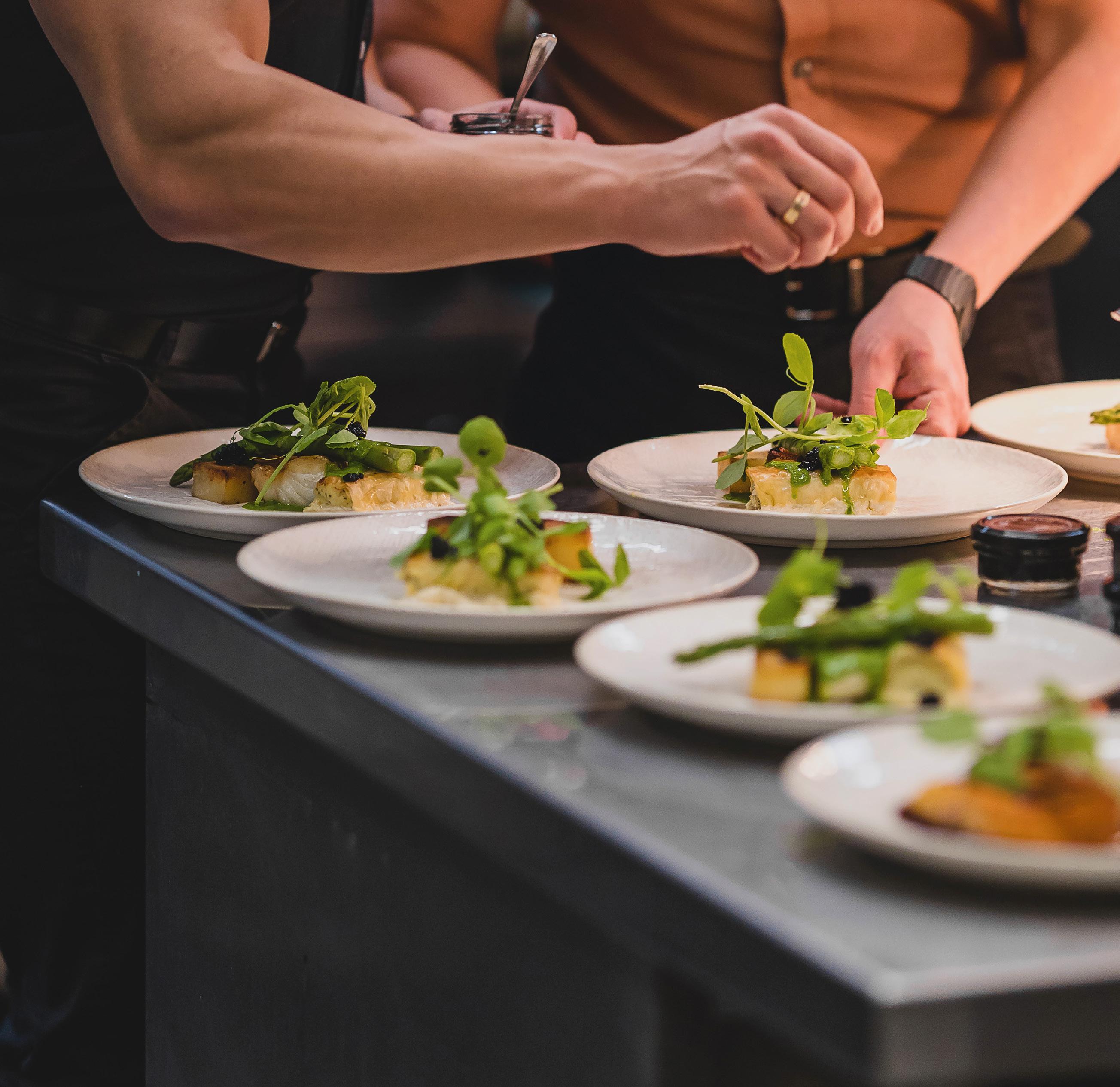

Delivering hospitality excellence across Australia since 1996 from premium wholefoods to unforgettable experiences.
“We are the solution”

Your hospitality solution
Your hospitality solution
Established in 1996, we are a proudly family-owned hospitality and events business known for full-service delivery, trusted partnerships, and seamless execution across diverse clients.

Your profitable solution
Hospitality Genie is an all-in-one management platform tailored for hospitality venuescustomised to your needs and accessible on mobile.
Your supplier solution
Your supplier solution
Established in 2020, we supply premium, sustainably sourced ingredients through our brands: Good & Plenty Wholefoods, Tooti’s Patisserie, and Moon Deli.
Your franchise solution
A unique franchise opportunity to be in business for yourself with full support from Catering HQ Group. We’re looking for partners who love food and service, share our values, and are ready to grow with the Catering HQ Network.
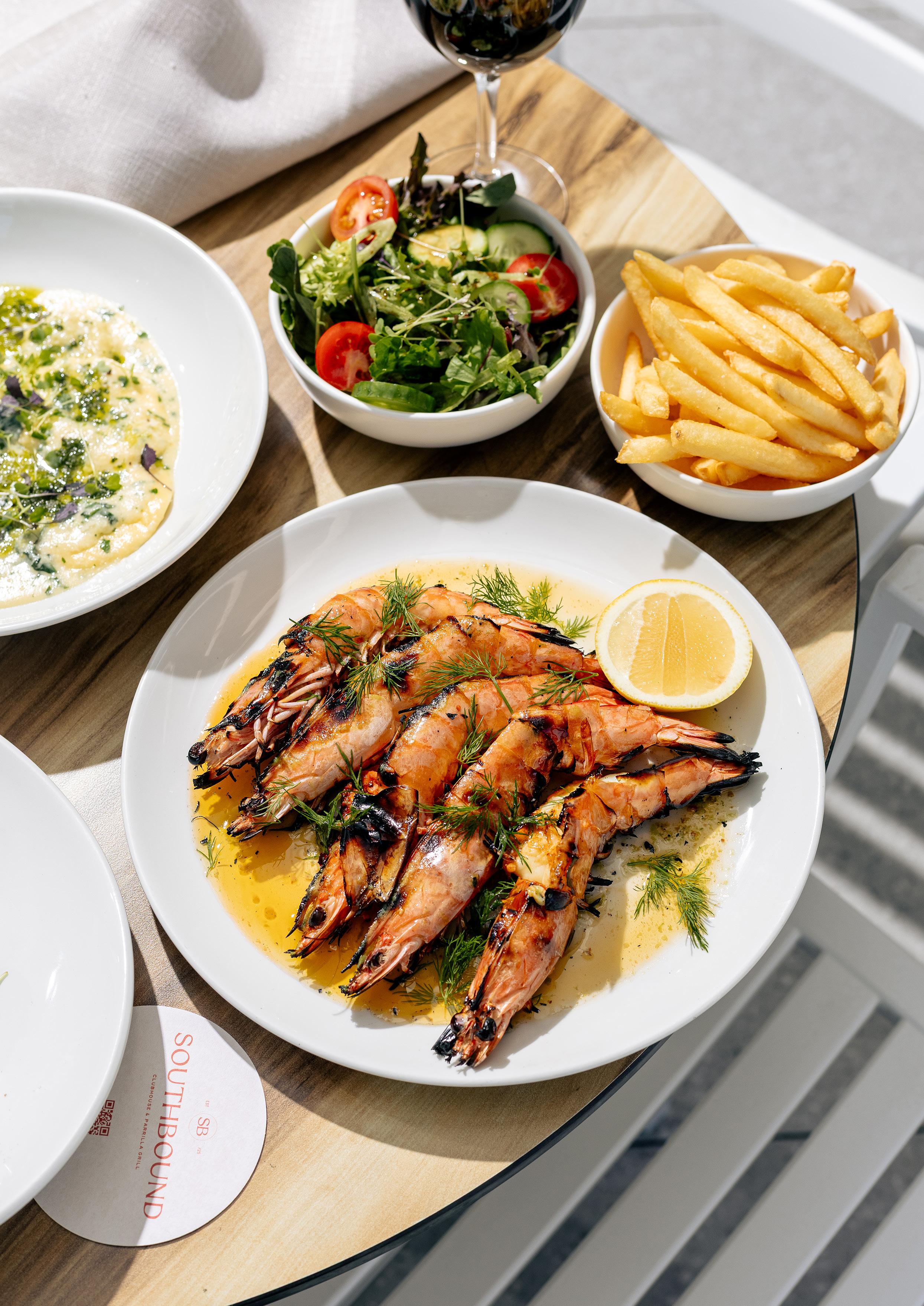
At Canberra Southern Cross Club’s Southbound, the Parilla Grill is used for dishes like the XL prawns.
Image credit: Ben Calvert.
Seasonal spread
Clubs are finding the sweet spot between seasonality, sustainability, and member expectations as they roll out their menus for summer.
AS THE DAYS get longer and the weather turns warmer, clubs are swapping out winter menu favourites like slow-cooked comforts for lighter, fresher, and vibrant dishes.
For Adham Aston, co-founder and COO of The Catering Group, the team behind venues such as Theo’s, the Mediterranean-inspired restaurant at The Greens, The Entrance, this seasonal shift is what makes menu development exciting.
“We always cover two seasons in one, so we’ll do a spring and summer menu and an autumn and winter menu, just because different produce grows better in different seasons,” he explained.
“As it cools down, you want more hearty things to warm you up. In summer, you want things that are lighter, refreshing, and more colourful.”
The focus on seasonality is what underpins The Catering Group’s approach when it comes to designing menus that
respond to produce availability, climate, and diner expectations, rather than following a template or food trends.
“We’re pretty individual like that. We like to do our own research, and not so much follow trends. Obviously, if we see something cool, we’ll pinch a little of this and that and combine it into one,” he said. “It seems to be working pretty well because we’ve just had the busiest winter we’ve ever had everywhere.”
The lure of seafood
But if there’s one thread Aston returns to again and again, it’s delivering quality food.
“Obviously, we’ve got all the staples that most clubs have,” he said. “But we try to at least change the rules a little bit and not just do substandard stuff. We try to find the best ingredients – even down to the pasta we don’t just buy the packeted stuff; ours is handmade.”
Seafood is set to be another big focus
“I still believe that quality is better than cutting prices. If you’re giving people quality, then they can understand what they’re paying for.”
Adham Aston, The Catering Group co-founder and COO
at Theo’s this summer. On the menu, that translates into popular dishes like the grilled Humpty Doo barramundi with kipfler potatoes and gremolata, and beer-battered butterflied snapper served fish and chips style.
Fresh seafood also takes centre-stage at Canberra Southern Cross Club’s fish and chip shop, Snapper & Co. Located on the ground level of the group’s Yacht Club, guests can dine in the fully serviced restaurant, in the casual courtyard, or enjoy a picnic on the lawn overlooking Lake Burley Griffin.
“What started as a hole-in-the-wall $250,000 business is now a $2.5 million operation,” said Anurag Gautam, the club’s food and beverage general manager, who claims it to be “probably the busiest inland fish and chip shop in the country”.
The store turns over around $6 million in trade annually. Of that, about $2 million comes from the sale of battered fish, while the store recorded selling half a million potato scallops last year.
“We batter and crumb our fish fresh. We use either Australian or New Zealand seafood,” he said. “It’s a simple offer but you’ve got to execute it well and it’s all priced reasonably.”
Besides fish and chips, other items on the menu included a chilled seafood platter, whole-baked baby snapper, lobster cocktail, and fish burger. While the food menu is simple, everything is carefully sourced.
“We have a policy of Australian-first. Even if it’s more expensive, it supports our community and we know where it’s come from,” Gautam explained. “There are no shortcuts to success.”
“[Snapper & Co] started as a hole-inthe-wall $250,000 business [and] is now a $2.5 million operation.”
Anurag Gautam, Canberra Southern Cross Club F&B general manager
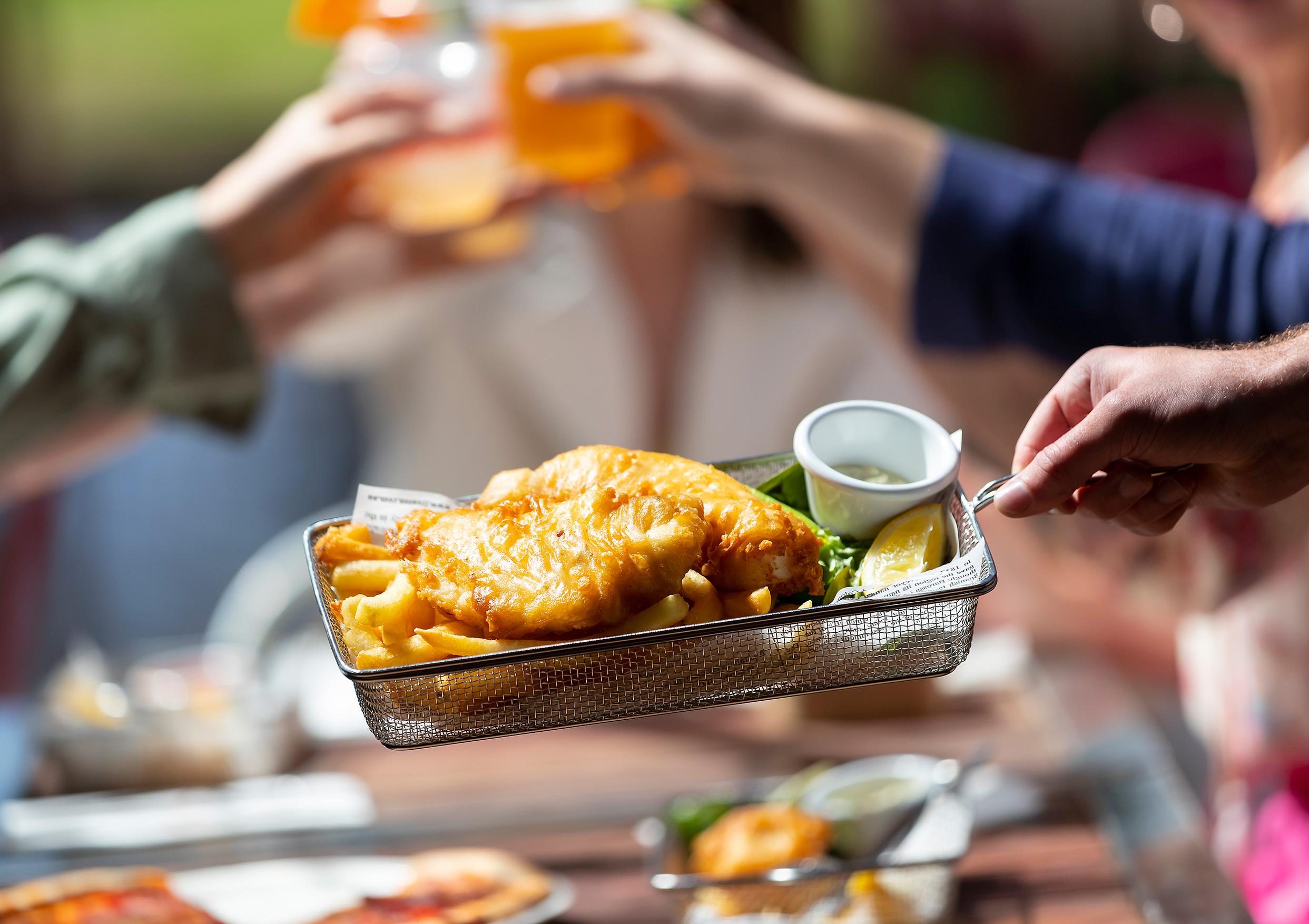
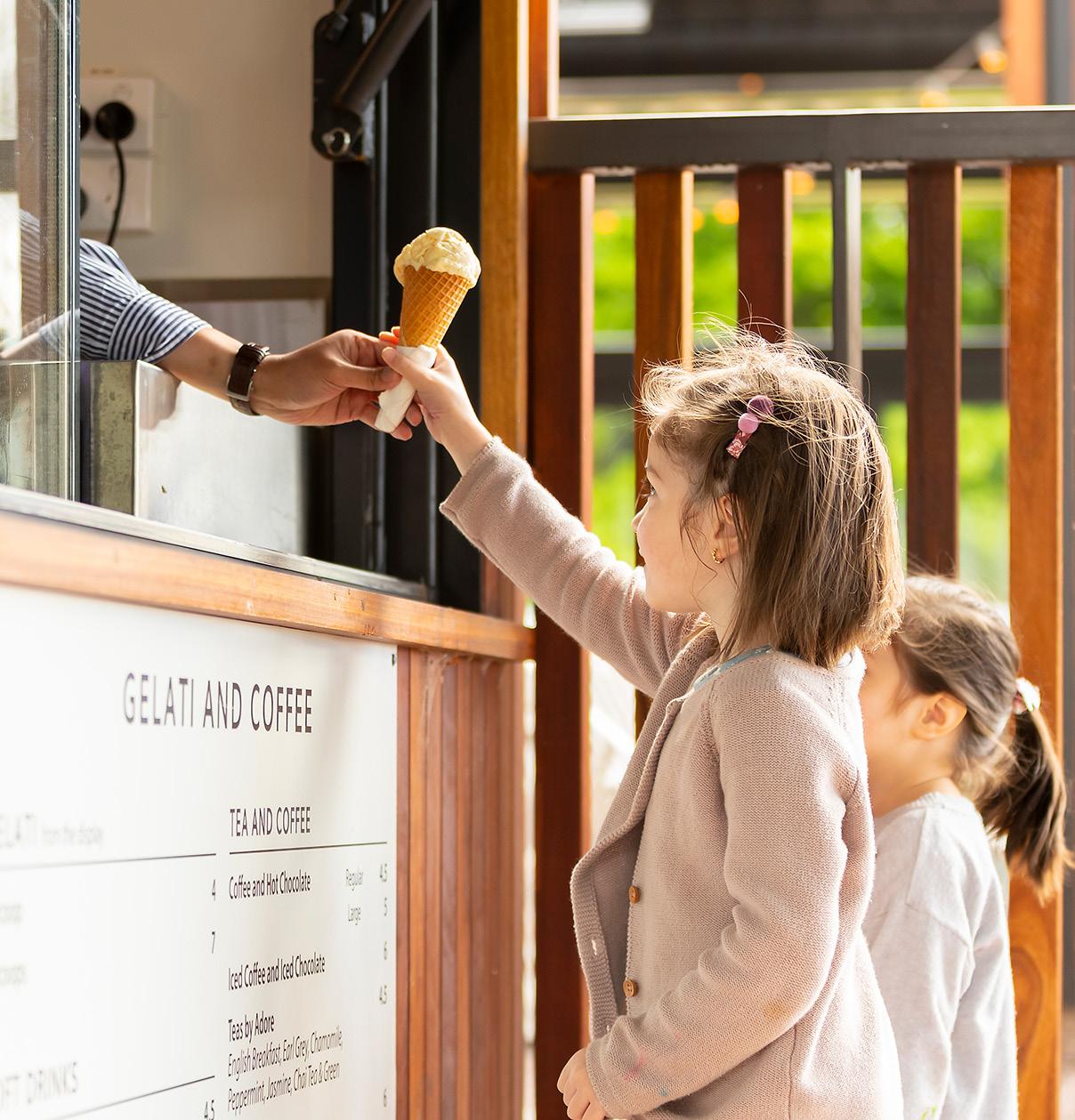
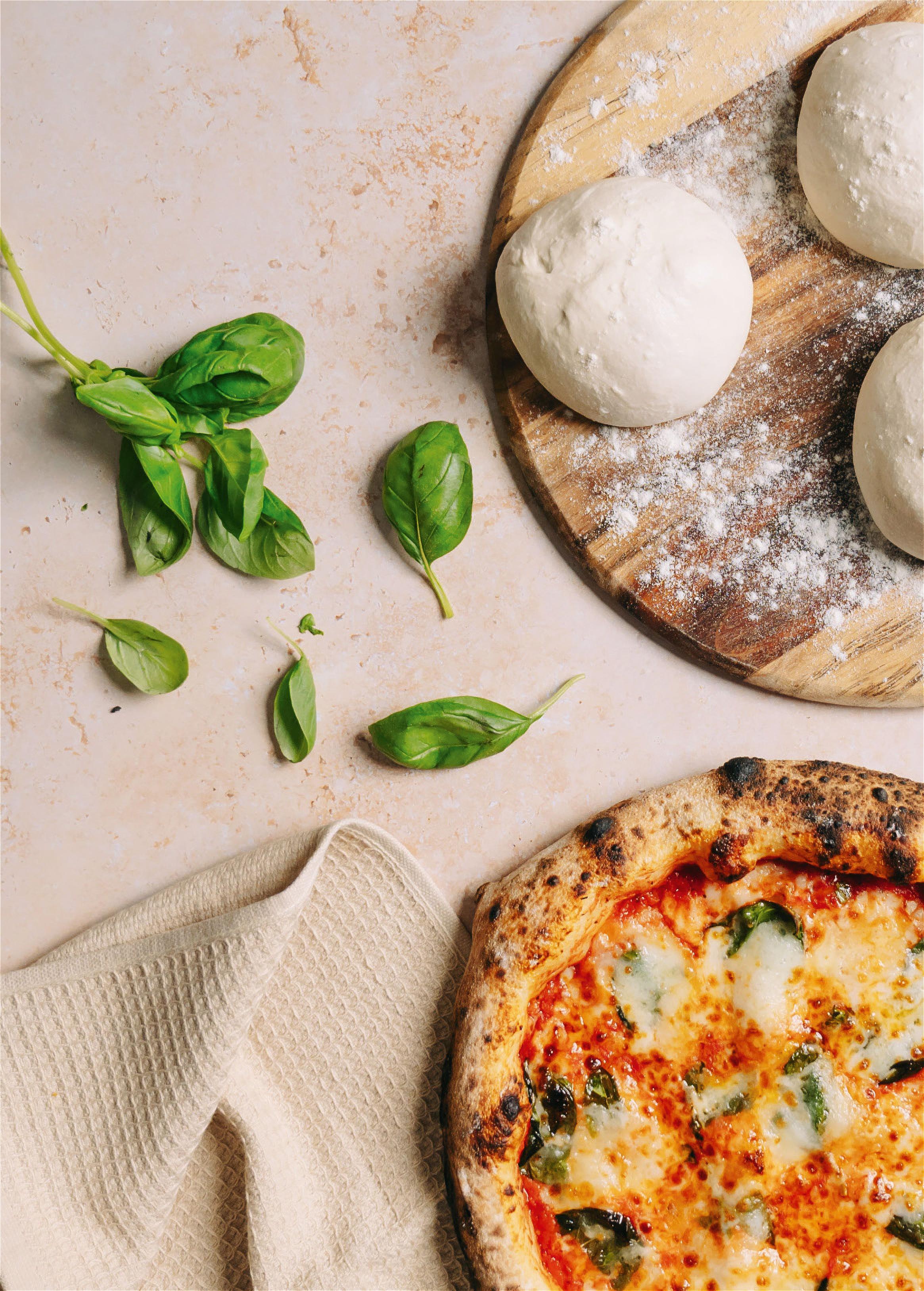







Setting the stage
According to Lightspeed’s latest figures, sales data from over 10,000 Australian hospitality merchants showed that Australians spent more per visit than the last several years during winter 2025. Bars recorded an average sale of $34.15, up 4.2 per cent from 2024 and a striking 7.3 per cent increase from 2022.
Lightspeed managing director Nicole Buisson said the willingness to spend during winter sets the stage for what’s ahead. She noted the opportunity for venues now lies in preparing for the warmer months, particularly in how menus are designed and positioned, to maximise this momentum.
“Menu design is not just about aesthetics. It is a revenue lever that can subtly guide customer choices, enhance the dining experience, and build loyalty,” she said. “The trends we’ve seen this winter suggest that consumers are primed for discovery and willing to spend more per visit. To capture this appetite, venues should rethink how menus can both inspire and influence.”
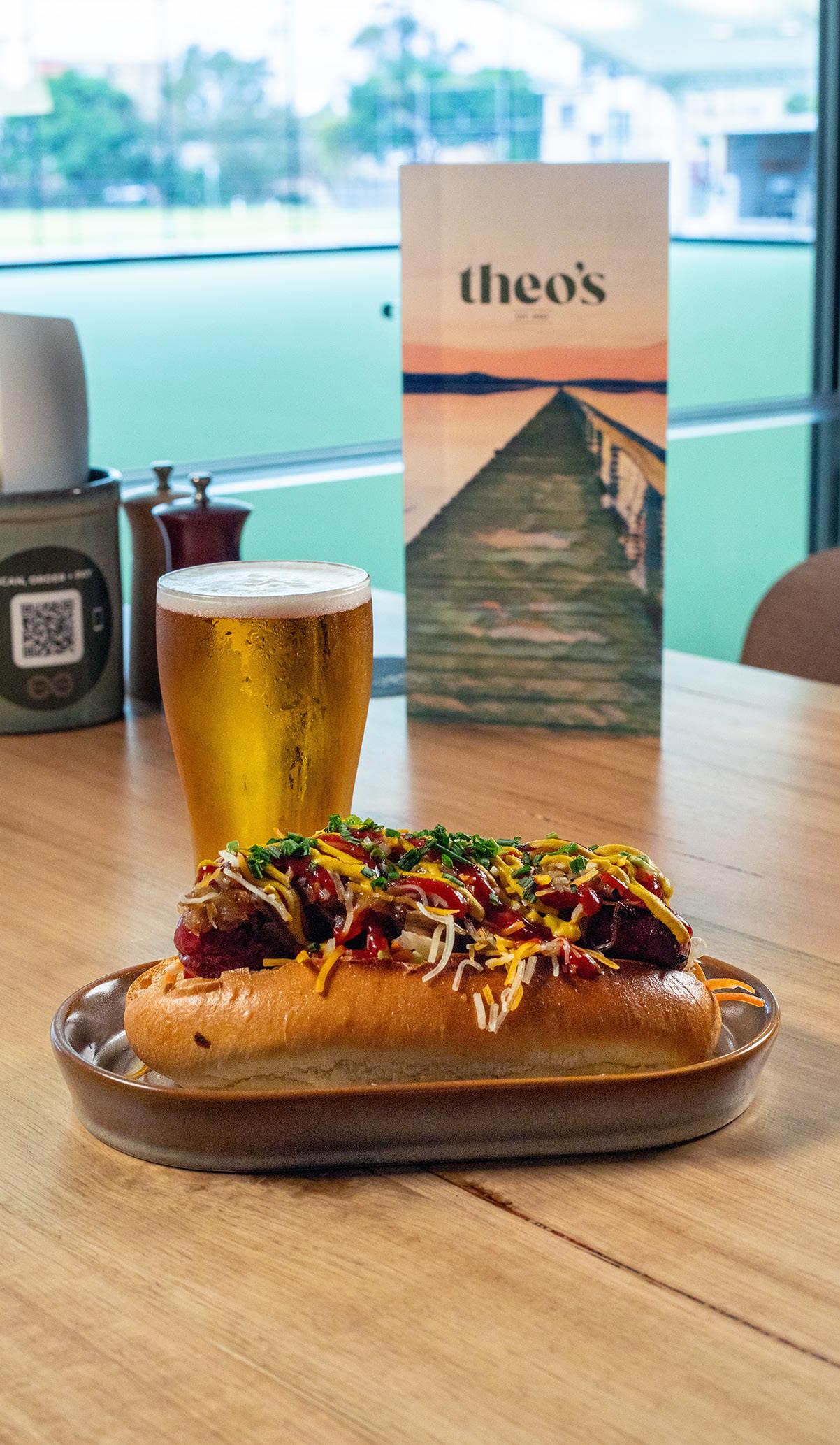
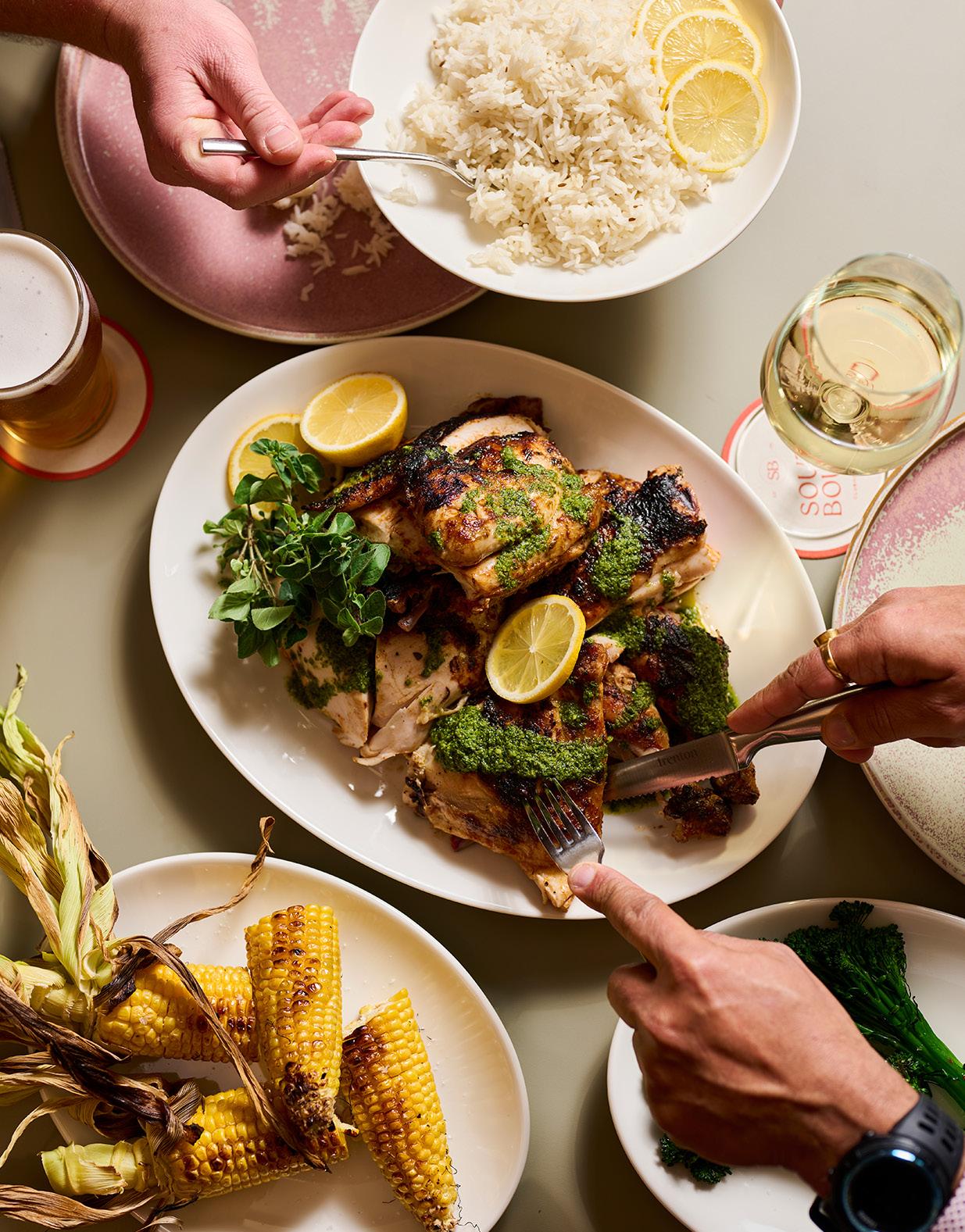
Shared cuts
But the summer table isn’t limited to seafood alone. Members are increasingly seeking fresh, shareable proteins prepared with theatre, flavour, and flair. Southbound Clubhouse and Grill, Canberra Southern Cross Club’s newly redeveloped venue in Tuggeranong, has completely embraced that approach. The kitchen has introduced a Parrilla grill, an Argentinian open-fire grill that brings bold, smoky char to every dish.
On the plate that means dishes designed for sharing, including a signature in-house dry-aged angus steak from Yambinya Station in New South Wales; XL grilled king prawns served in the shell; and baby barramundi marinated in mint, coriander, coconut, green chilli, ginger and lime, wrapped in banana leaf and grilled over coal.
“Everything in the kitchen is electric, except the grill,” Gautam said. “We even flew in two chefs from South America to train our team. It’s about bringing that authenticity and quality through to the menu.”
Gautam said Southbound was designed as a “pub in a club” that could meet members’ growing appetite for family-friendly dining and elevated yet affordable meals.
“Tuggeranong used to be called ‘nappy valley’ because it was popular with families who had young kids. But now the kids have grown up and moved out, people’s mortgages are almost paid, so people in the community have decent chunk of disposable money,” he said.
“They’re at the stage they don’t mind paying good dollar for a nice meal. But they don’t want anything pretentious, but they do want a good feed.”
Image credit: Ashleigh St George, Pew Pew Studios.

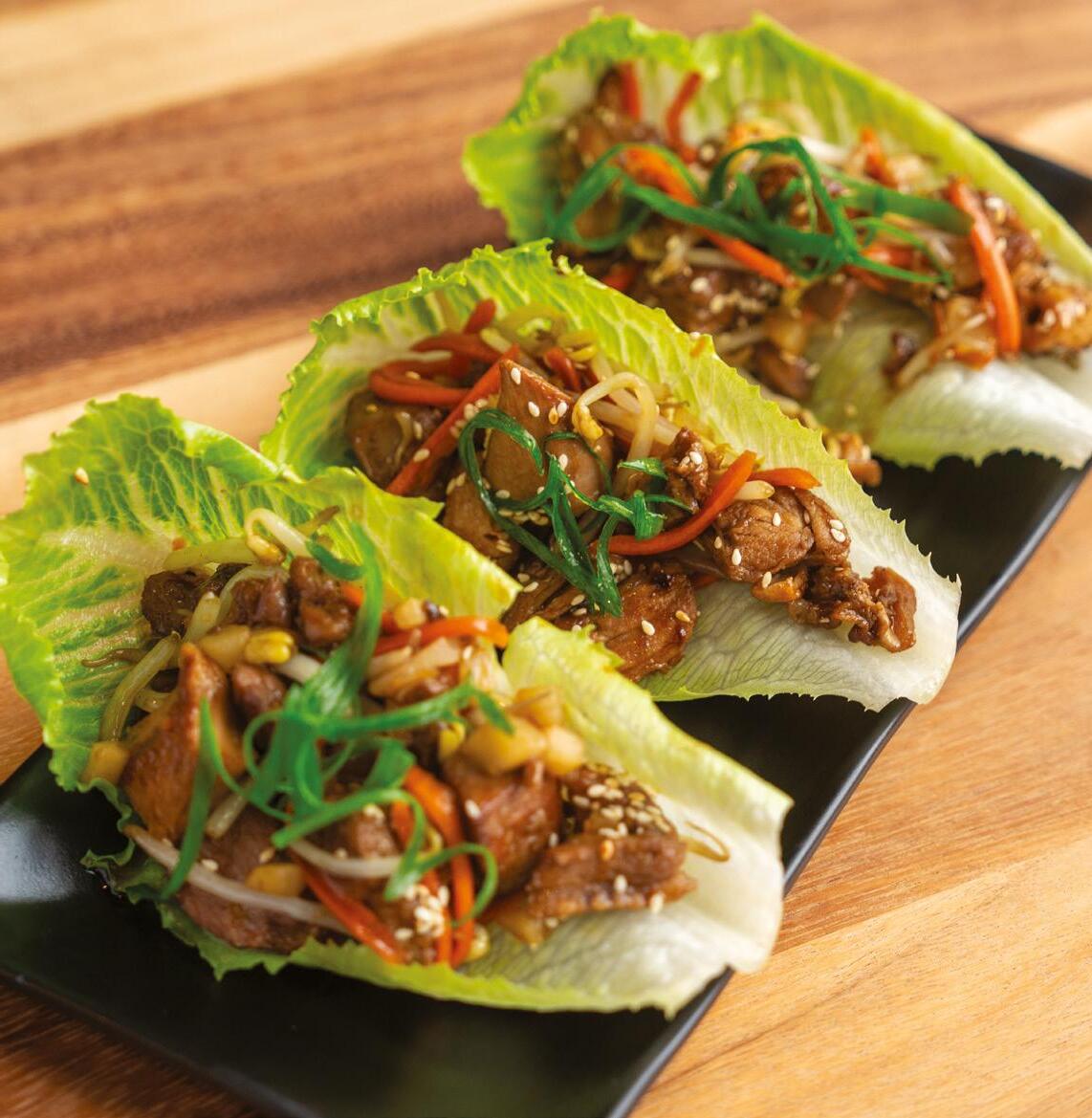
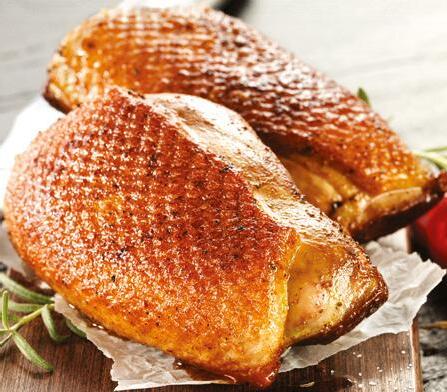
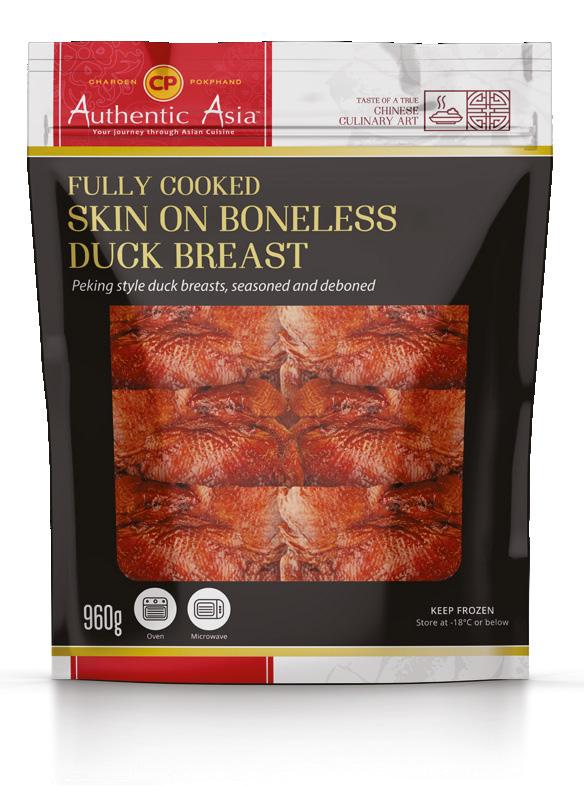
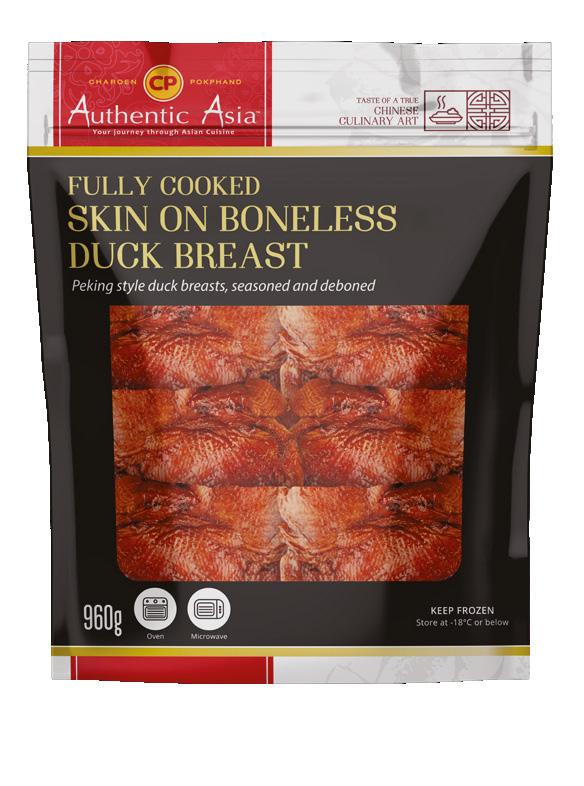

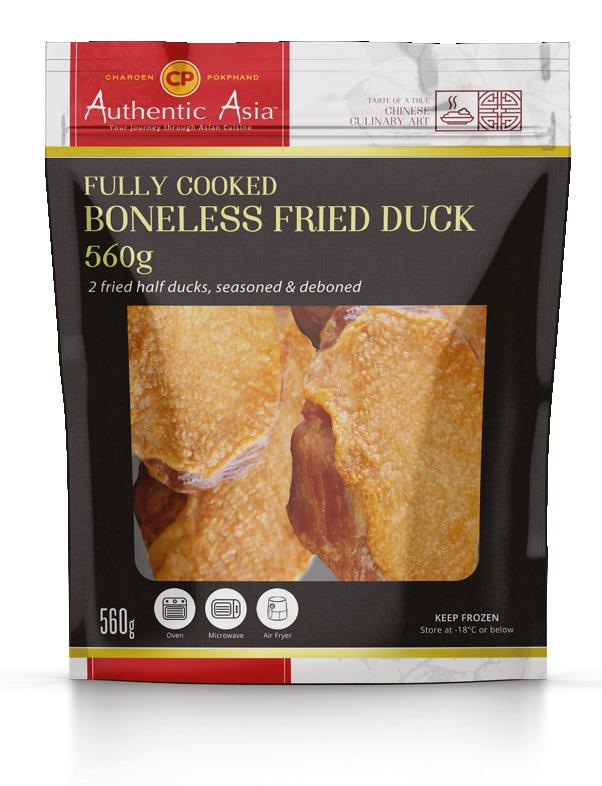
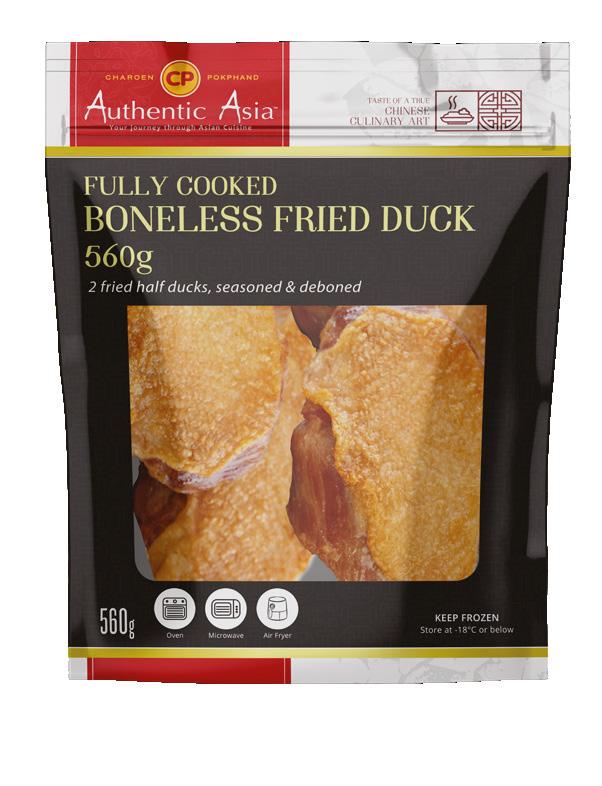
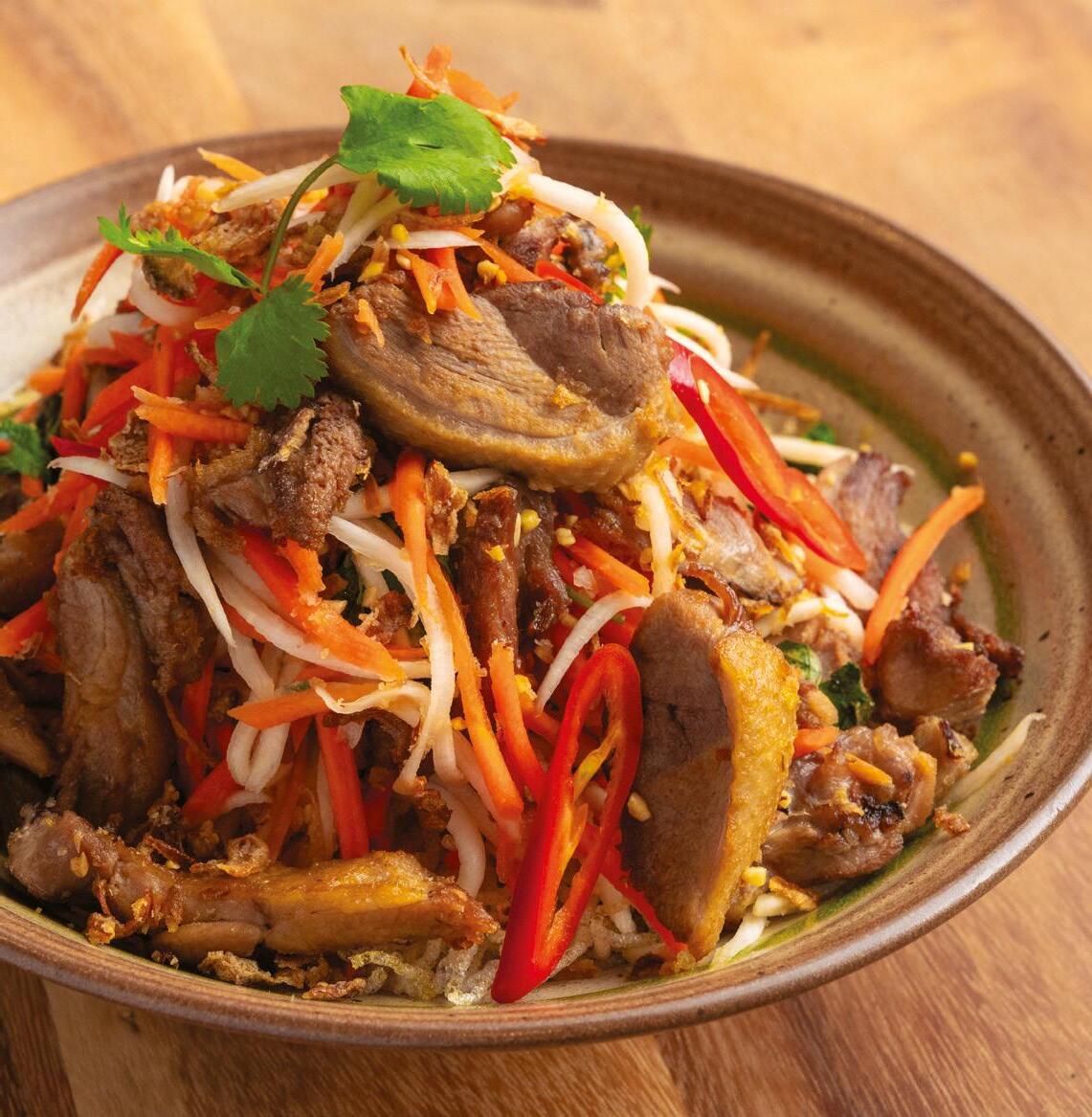
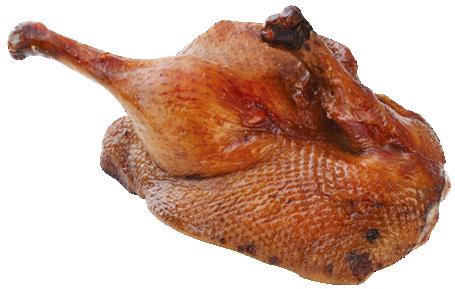
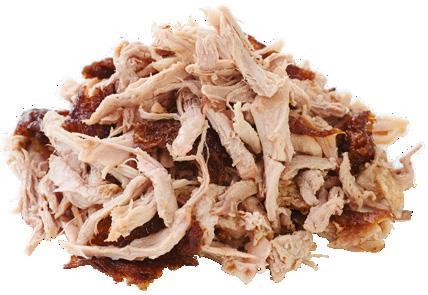
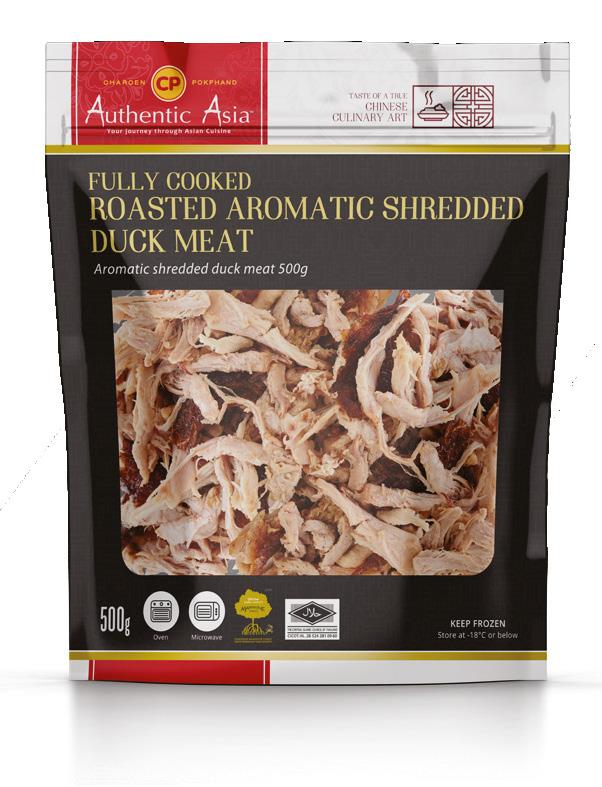
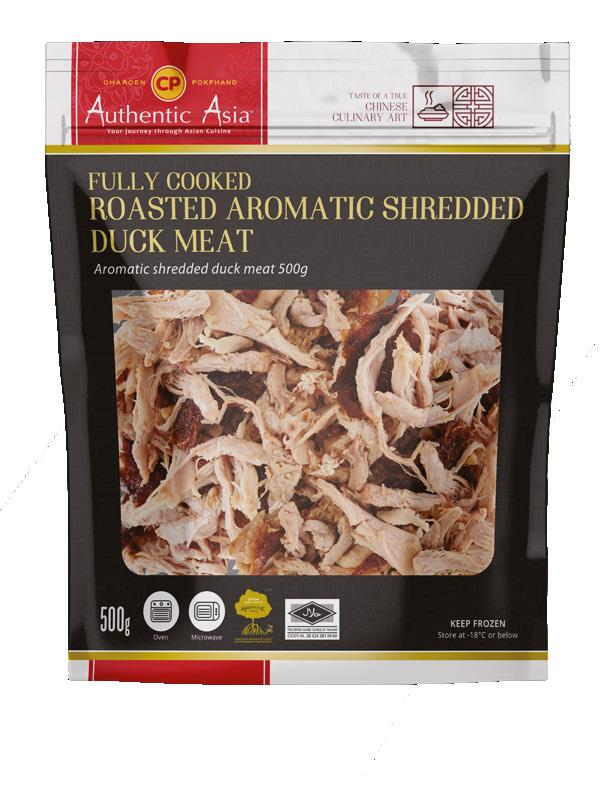
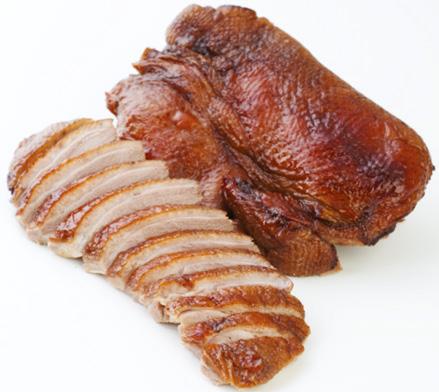
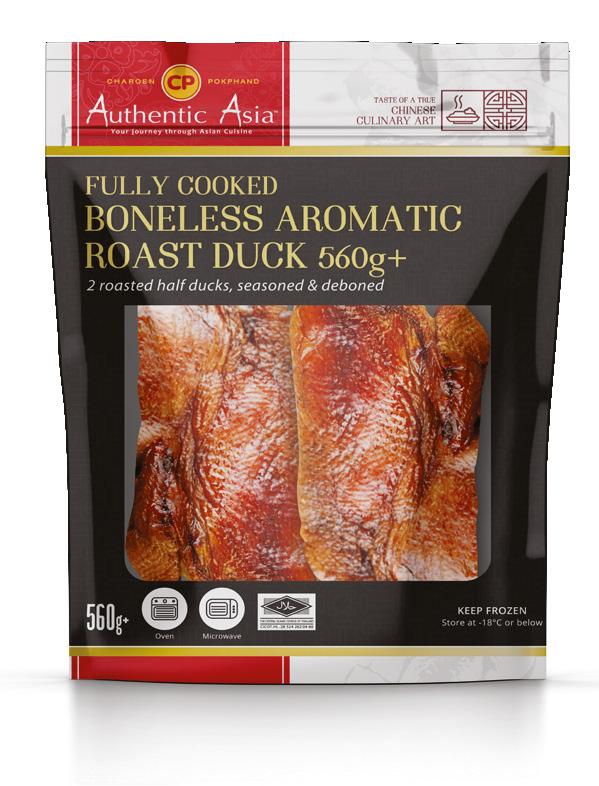
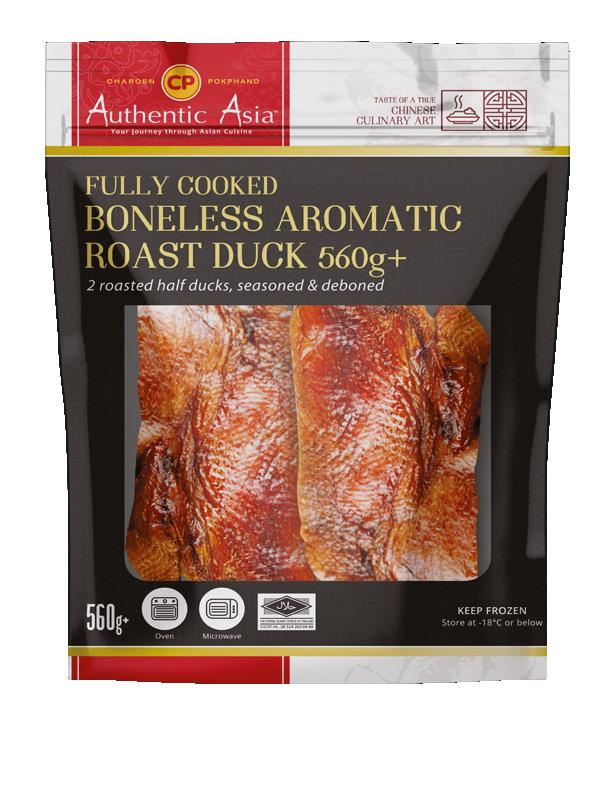
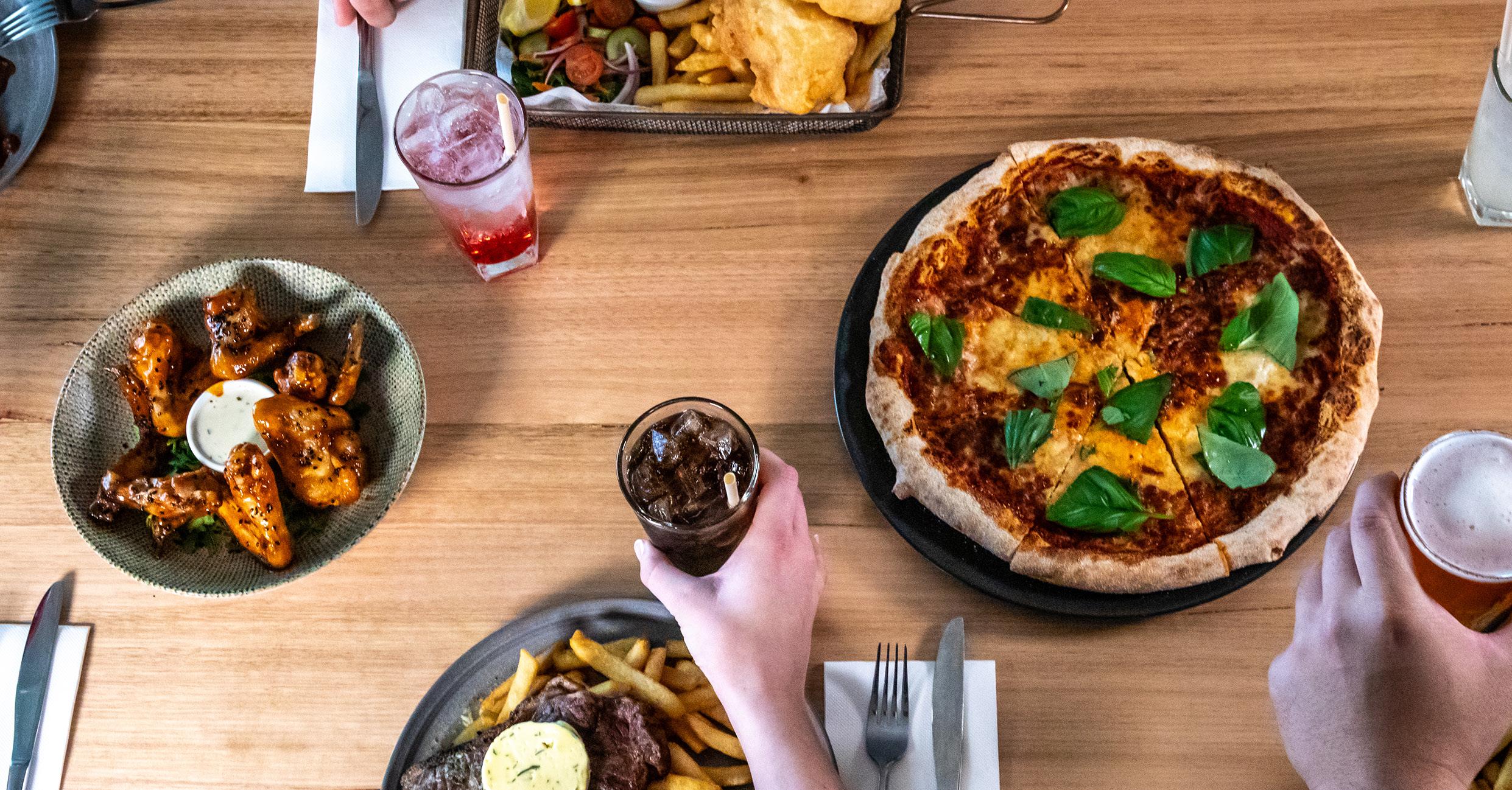
Quality doesn’t however always have to be complicated. Andrew Turner of CPF Australia said duck, long seen as a fine-dining protein, is now being used in more casual food offerings.
“Duck is shedding its reputation as a finedining-only protein,” he said. “Chefs are increasingly using it in relaxed, modern formats — tacos, bao, noodle bowls, pizzas, wraps, and salads — often as a swap for pulled pork or beef. The focus is on speed, convenience, and flavourforward dishes that still feel premium.”
condiments like kimchi, are also appearing on menus beside classics like pork schnitzel.
Even as clubs innovate with global flavours and lighter proteins, some classics such as pizza never lose their shine. Ricardo Moretti, chief executive of RDM Pizza, attributes this to its versatility, shareability, and convenience.
“Pizzas are a crowd-pleaser that offer a combination of convenience, variety, and familiarity, making them a favourite item on club menus,” he said.
“A lot of people talk about lower cost, but it’s not always lowest cost. It’s actually the best value.”
Joe D’Andrea, Goodman Fielder food service head
CPF’s shredded aromatic roast duck, for example, can be tossed through a noodle salad or be used as a pizza topping with minimal prep, Turner highlighted. “It’s incredibly versatile, wellpriced, and ideal for venues looking to lift their protein offering without overcomplicating prep.”
Pork is also expected to enjoy another seasonal moment this summer, particularly yhjlln the barbeque. kk9uk000phhhpp“Pork chops, cutlets, scotch and tenderloin are perfect for summer over the grill,” said Lylle BalzerBlackstock, head of communications at Australian Pork. “Chefs love working with pork because it versatile and consistent.”
The adaptability of pork also means chefs can move beyond the expected, BalzerBlackstock said.
“For venues looking for a fresh approach to burgers, pork burgers with seasonal ingredients such as sweet pineapple are a perfect solution,” he said.
Balzer-Blackstock added seasonal fruits such as pineapple and mango, along with spicy
The shareable nature of pizzas also makes them appealing for clubs catering to groups.
“Pizza has a high profit margin and is generally a popular item on menus, making it a good investment for businesses looking to increase revenue,” Moretti added.
“Overall, pizza is a globally renowned food item, which consumers are always looking for and provide high levels of profitability making the decision for clubs to expand their offerings and attract new customers.”
Just as seasonal produce influences other menu items, the time of year can also shape pizza preferences. During warmer months, patrons gravitate toward lighter, fresher toppings, Moretti said.
“We see favourites like Margherita with fresh tomatoes, basil, and mozzarella; prosciutto and arugula with shaved parmesan; and BBQ chicken with grilled meat and cilantro,” he said.
“Caprese with cherry tomatoes and balsamic glaze or pesto pizzas with roasted vegetables and goat cheese are also in demand.”
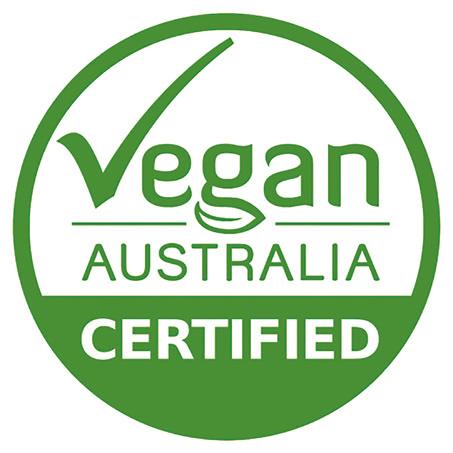
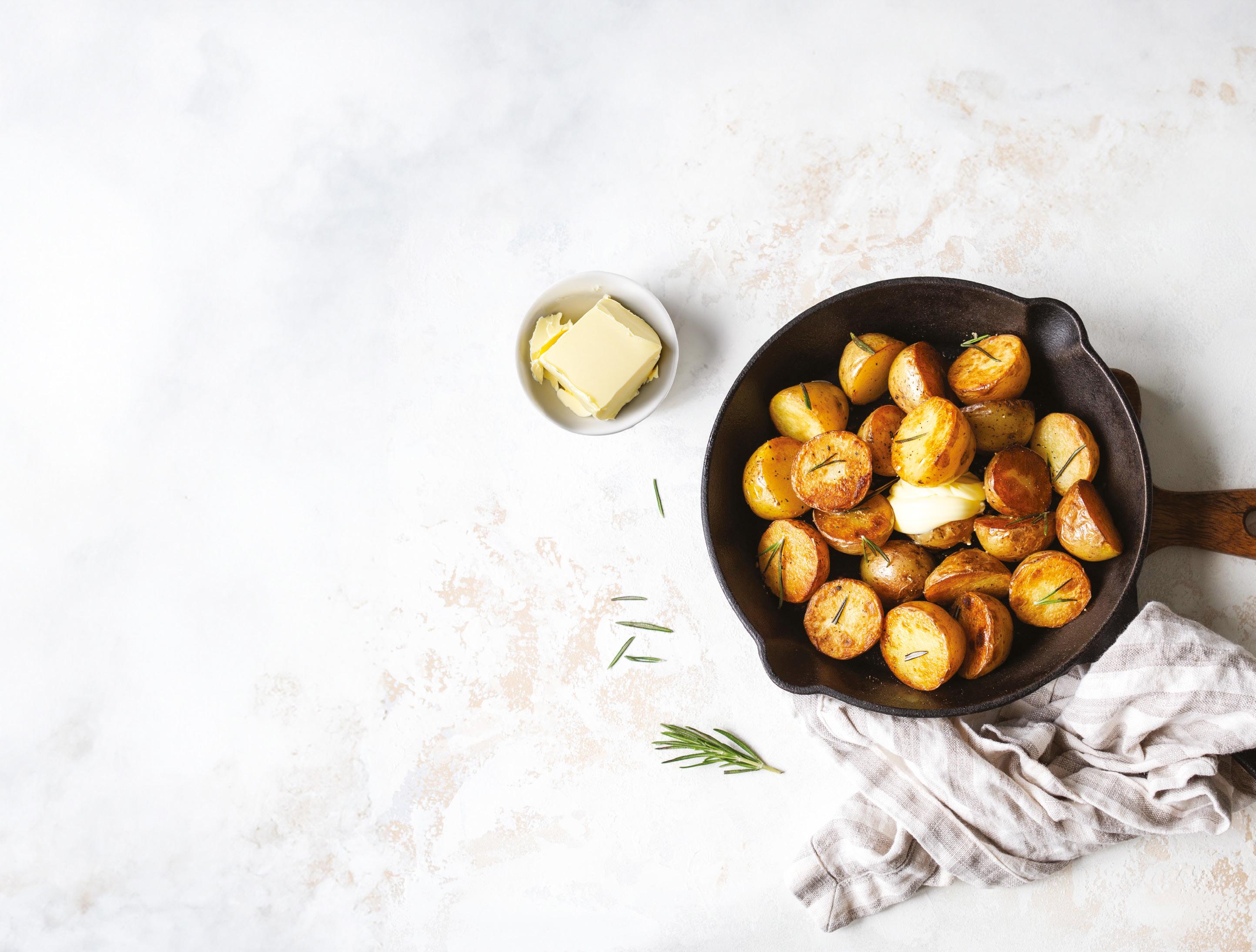
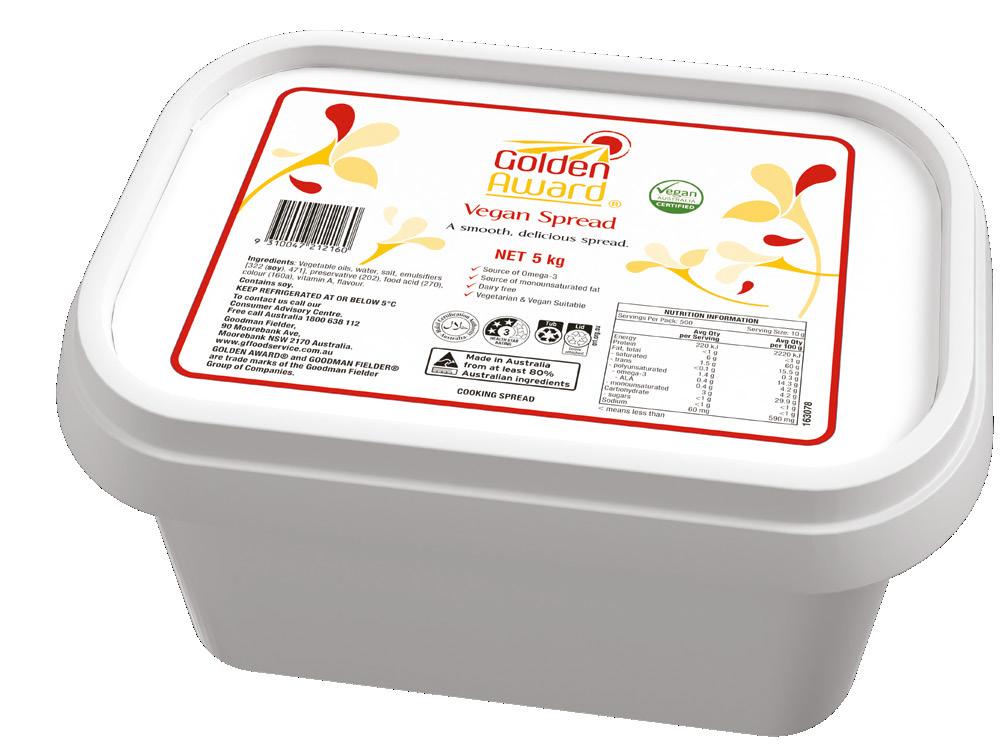


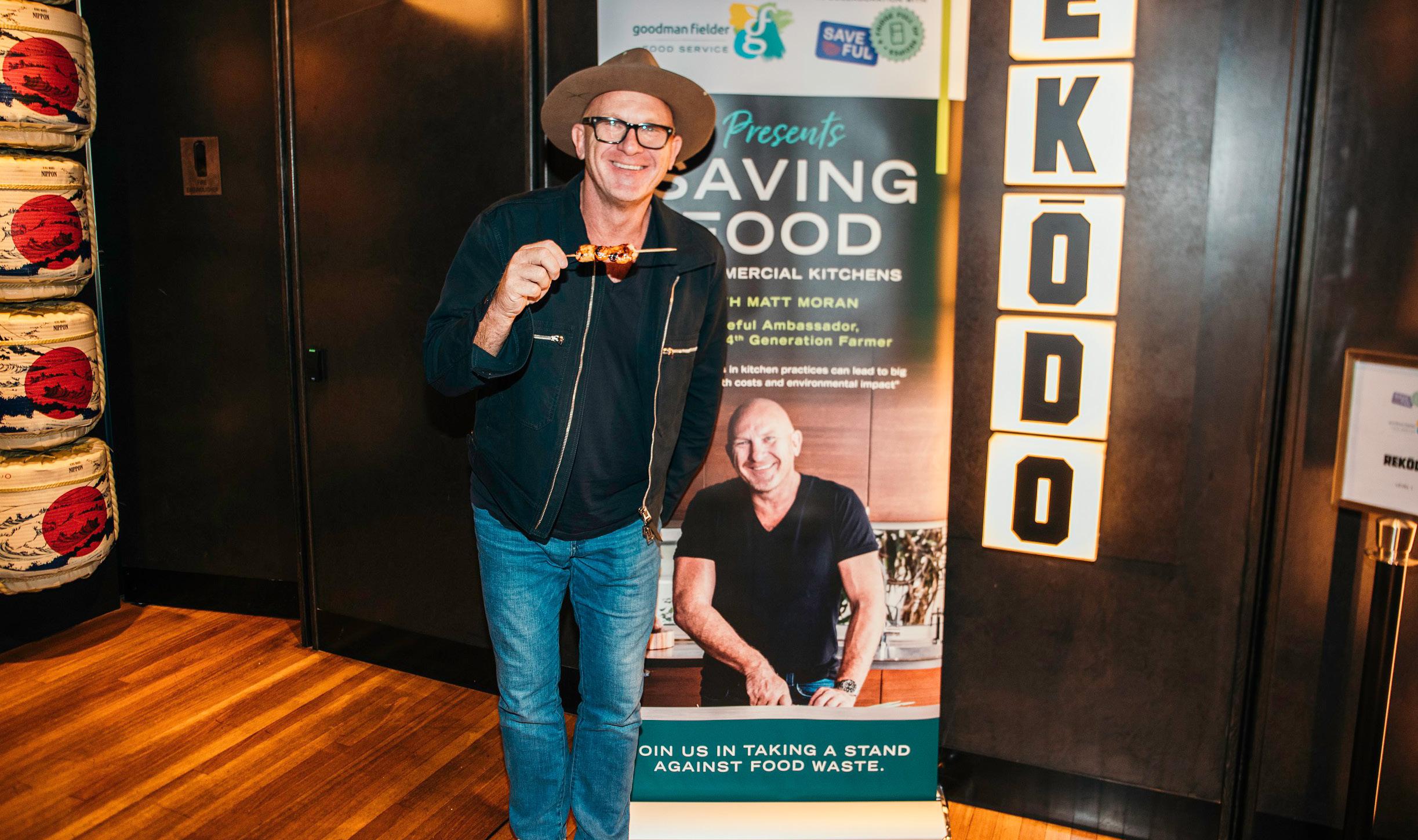
A sustainability lens
Of course, designing menus in 2025 isn’t just about flavour. Sustainability and food waste are front of mind for chefs, suppliers, and consumers alike.
Celebrity chef Matt Moran – who is also the ambassador for Saveful, a free app designed to help reduce waste – said the way chefs think about ingredients has transformed since he started cooking 40 years ago.
“I remember the first time I thought about waste, when I was head chef at an Italian restaurant and [the owner’s] mother came in and made all the pasta,” Moran recalled.
“I remember one day putting the broccoli stalk in the bin, and you never saw someone go off like someone who was born in Italy during the Second World War. Now, I can tell you 20 different things you can use it for.”
Moran added that the pressure on chefs today is even greater than when he started out. “The margin is getting smaller and smaller, harder and harder. You’ve got to be smarter about what you do and how you do it,” he said.
For Moran, who’s a fourth-generation farmer, sustainability comes back to seasonality where it’s about using produce when it’s at its best, in abundance, and at the right price point.
“When mangoes first come in the season, they’re incredibly expensive and the product isn’t great,” he said. “In the middle of the season, they’re cheap, in abundance, and the best. That’s when we should be using them.”
Goodman Fielder’s head of food service, Joe D’Andrea, echoes that sentiment, pointing out that smarter use of ingredients is about flavour as much as cost.
“That’s how you can actually grow value … how can we make more from less? And how do we extract all the best flavours to delight those consumers?”
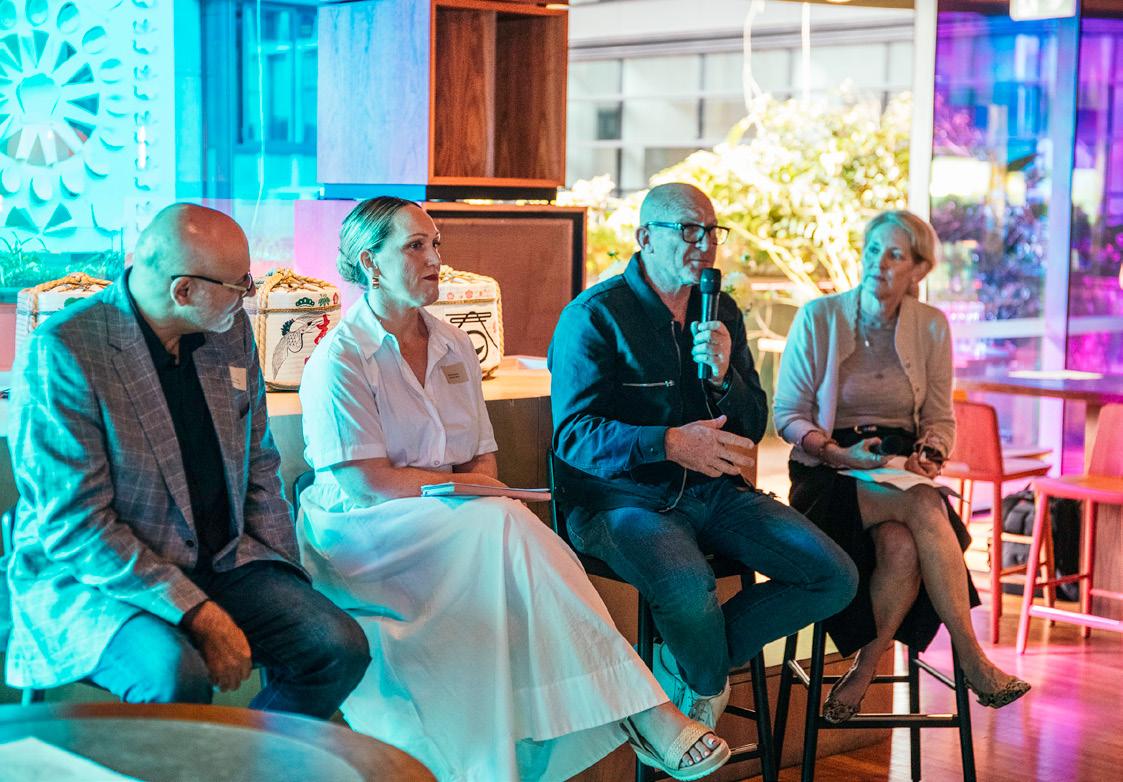
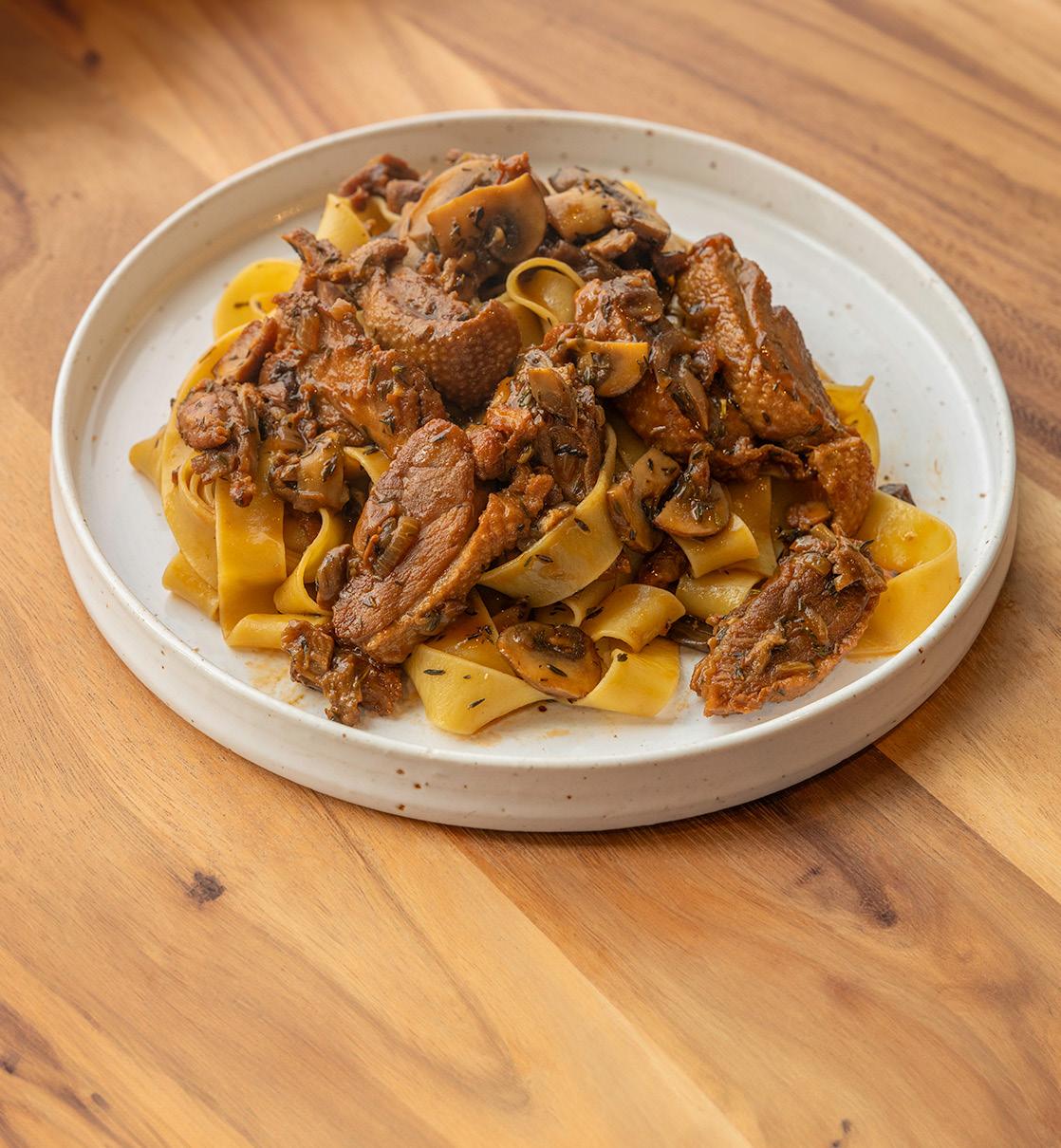
Celebrity chef Matt Moran said the pressure on chefs to get creative with out they use produce.
Duck is shedding its reputation as a fine-dining protein.


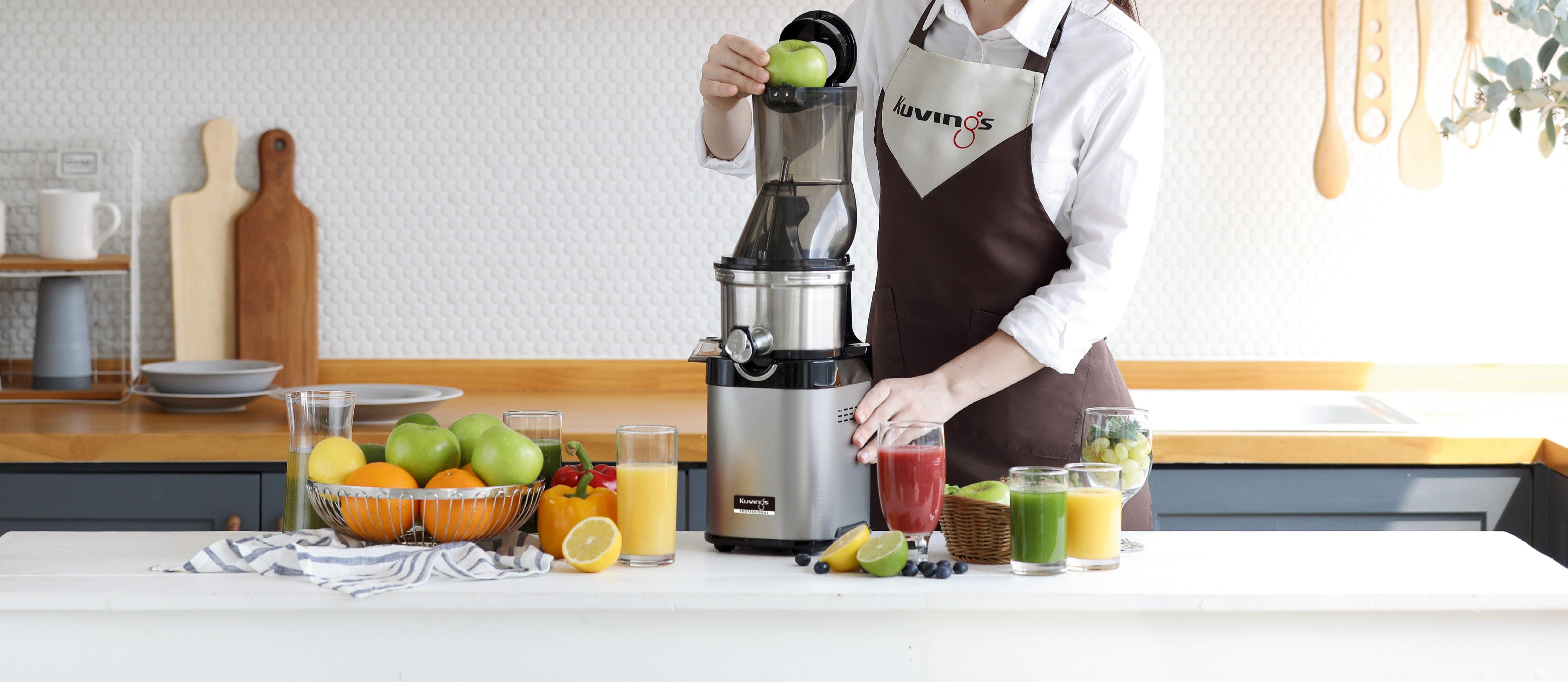































































































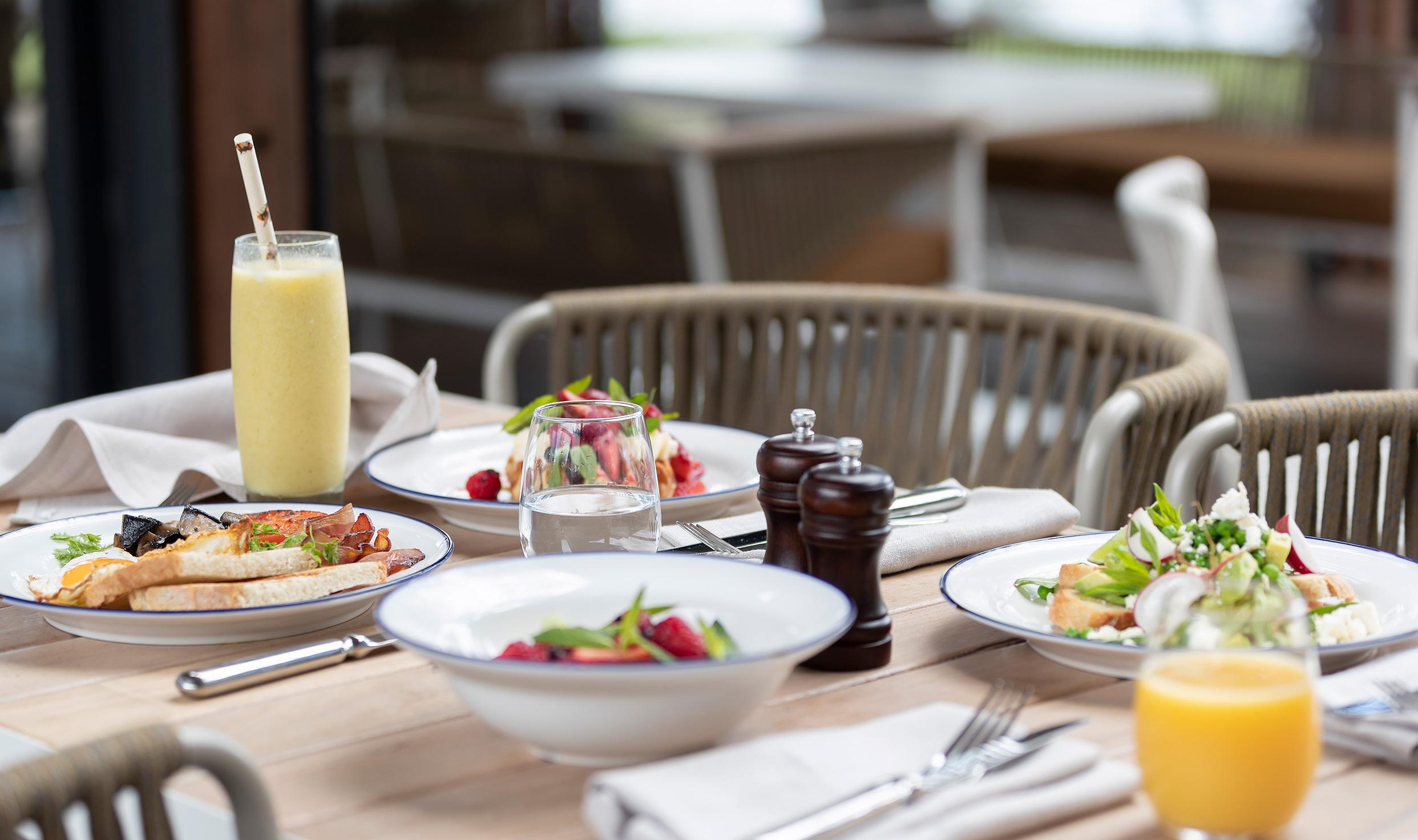
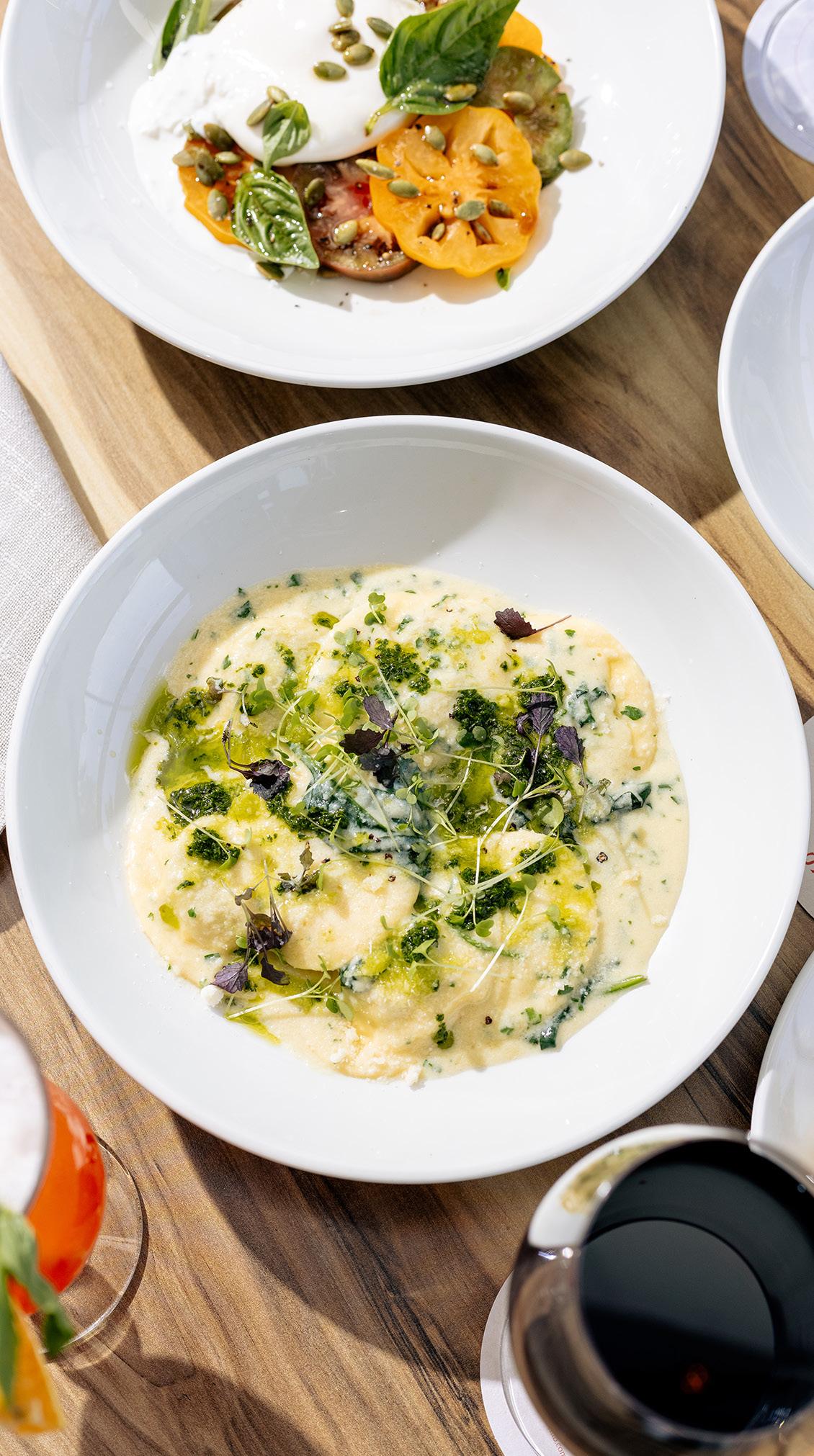
Balancing costs
In addition to reducing waste, the rising costs of goods, labour shortages, and consumer sensitivity to price hikes will all weigh heavily on how clubs operate their kitchens this summer. But the solution isn’t simply chasing the lowest cost, according to D’Andrea.
“It’s actually the best value,” he said. “What can I deliver within my establishment that I can use in a cost-effective way to deliver a better value experience. [It’s] either reduce my overall cost or increase my traffic and my revenue through customers coming back and enjoying those meals.”
Aston agreed that focusing on quality is still the best long-term strategy.
“I still believe that quality is better than cutting prices,” he said. “If you’re giving people quality, then they can understand what they’re paying for. Even if you go into the supermarket right now, it’s almost just as cheap to eat out than go and buy groceries and cook it all. Obviously, we try to keep cost as low as possible for members.”
That doesn’t mean the economics aren’t tight. “Earlier this year lamb was such a great price, but now it’s spiked out of control,” Aston said. “But I just can’t go and change a menu and up that price. We’ve got to take those hits when they do happen. It’s just a balancing act of not trying to rip anyone off but really showcasing the product we’re offering at the best available cost we can get it.”
Changing consumer behaviour is also shaping menus. “I think people are going out less to restaurants now,” Aston reflects. “I think clubs are coming back a bit because they’re community-driven; people like that about clubs and spend a bit of time there.”
For Aston, the reward lies in seeing that connection play out in real time. “We’re all foodies, it’s not a job for us,” he said. “There’s nothing better than having people sit down and have a big smile on their faces, having a few drinks and some food. It makes what we do a real pleasure.”
Image credit: Ben Calvert.






Elevate your burger game

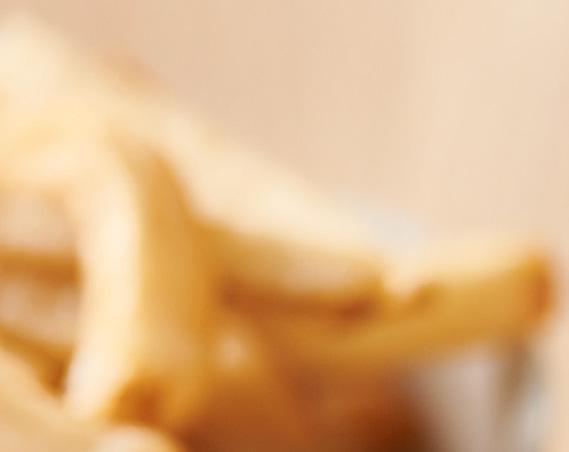

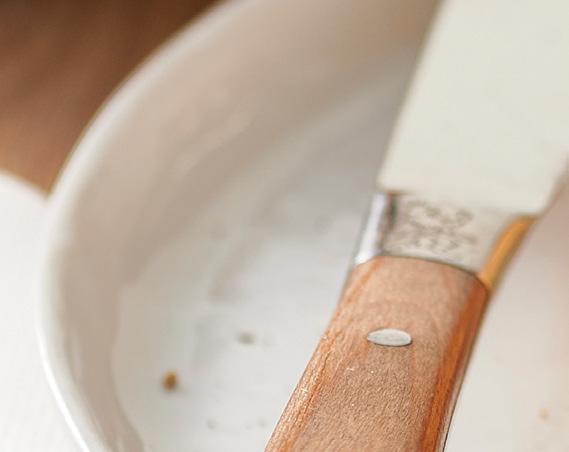


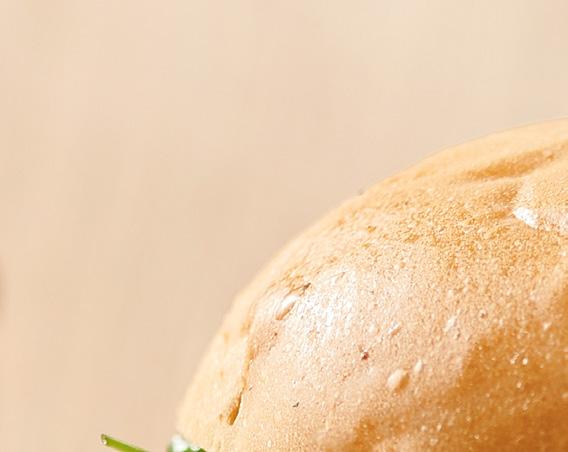
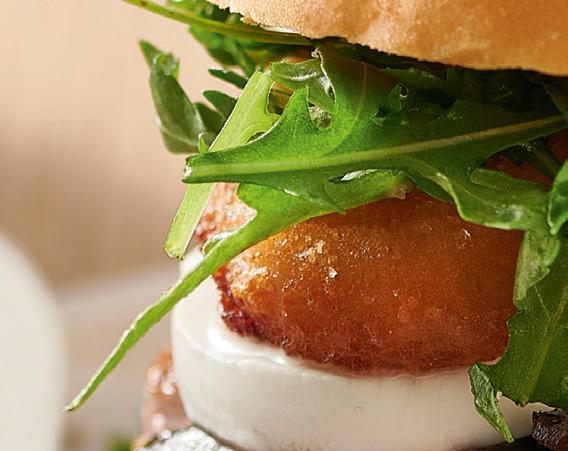
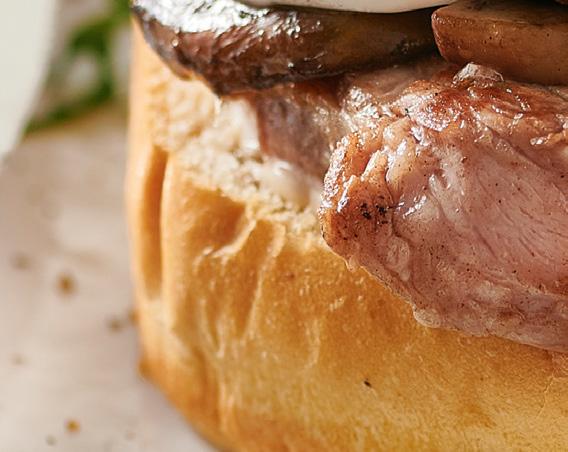


Seven out of ten casual dining venues already have pork on the menu. * And it’s no wonder – tasty, delicious pork brings an enticing twist.
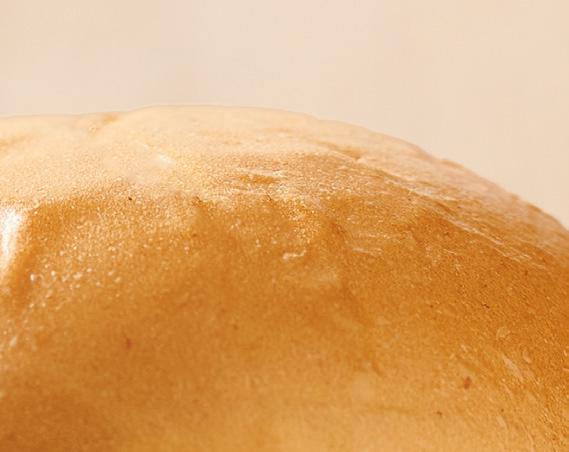
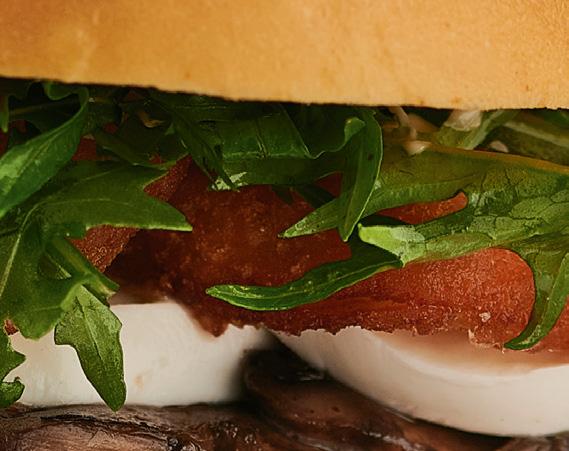
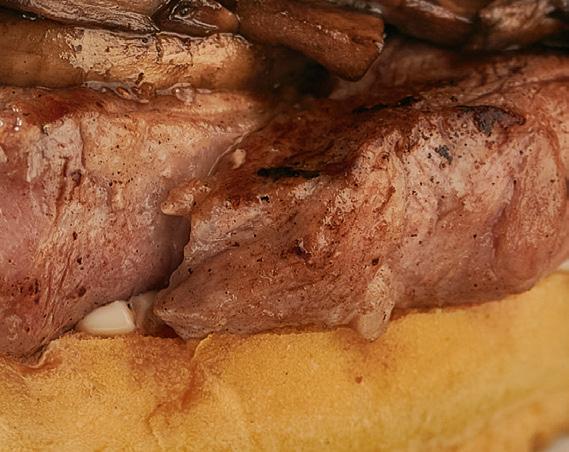
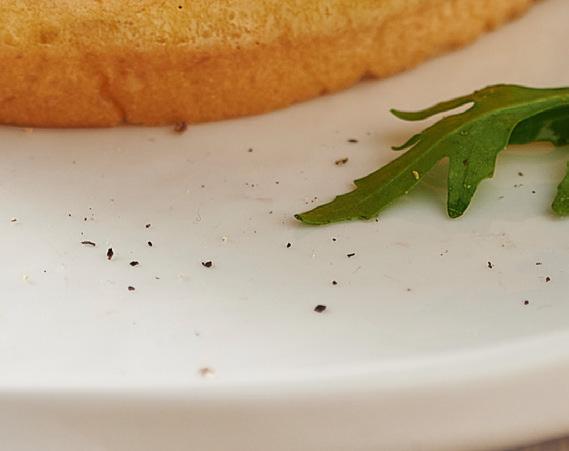

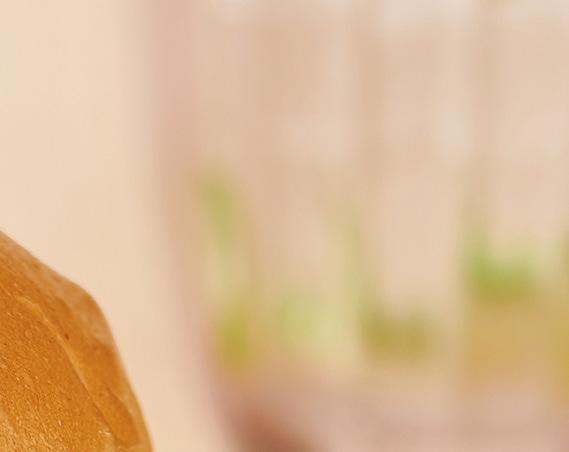
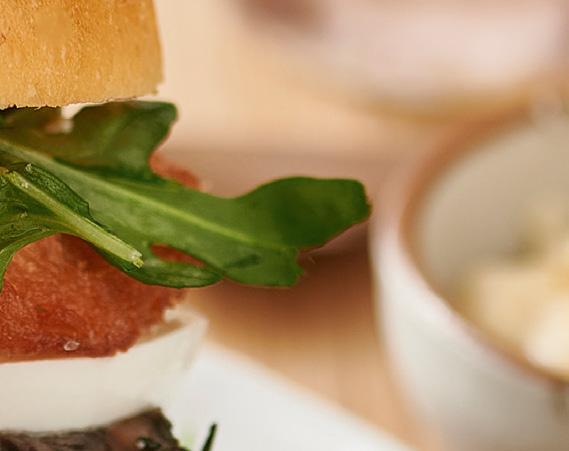
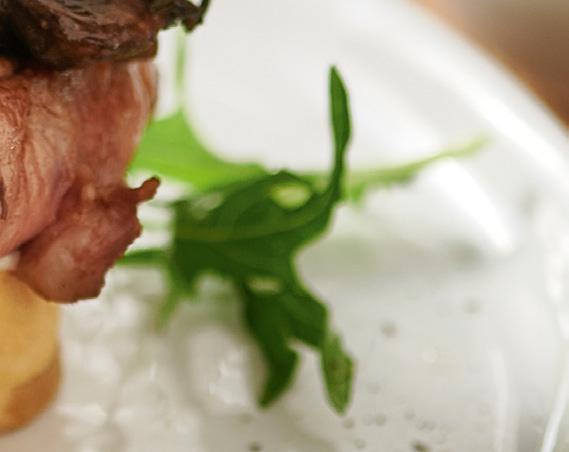
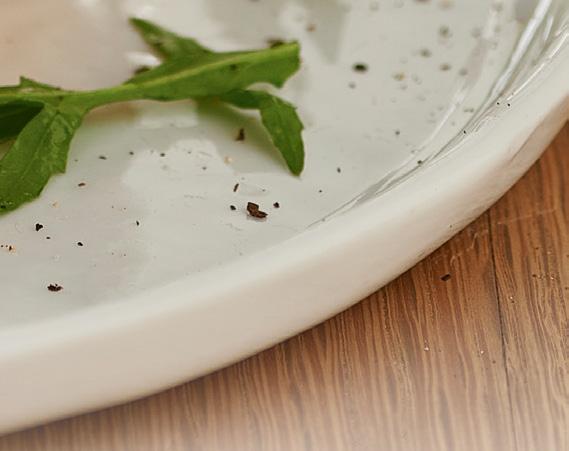

With burgers still the #1 menu item in foodservice,** make yours stand out with this juicy grilled pork scotch burger loaded with mushrooms and crispy, golden battered onion rings.
Get some pork on your menu






Sweet pork scotch burger with pineapple jalapeno chilli salsa
INGREDIENTS (Serves 10)
• 10 milk buns
• 10 x 160g pork scotch fillet steaks
• 1 cup chipotle BBQ Sauce
• 1 cup mayonnaise
• 10 leaves green oak lettuce
• 1 cup coriander leaves
• Salt to taste
• Finely chopped jalapenos, to serve on the side
PINEAPPLE JALAPENO CHILLI SALSA
• 1 cup chopped roasted pineapple
• ¼ cup red onion, finely chopped
• 2 green jalapenos, deseeded and finely chopped
• ½ cup coriander leaves, chopped
• ½ cup lime juice
• Salt to taste
SALSA
To make pineapple jalapeno salsa, combine all salsa ingredients in a bowl and set aside.
PORK
Season pork steaks with salt and chargrill for approximately 2 minutes on each side or until cooked through, brushing with BBQ sauce. Rest for 3 minutes.
TO ASSEMBLE
Cut milk buns in half and toast until desired liking. Generously smear the mayonnaise and BBQ sauce on both sides of the bun. Place lettuce on the base of the bun, followed by the pork steak and the salsa. Top with the coriander leaves and the other half of the bun. Serve with extra Jalapenos.
Note for recipe: Cooking times and temperatures may vary with kitchen facilities and appliances. Desired doneness and the recipes should be noted as a guide only. We have not considered special circumstances leading to adverse effects such as allergies, health-related restricted-diet, and pregnancy-related effects. As such, Australian Pork Limited is not liable for any undesired cooking outcomes from this recipe book.
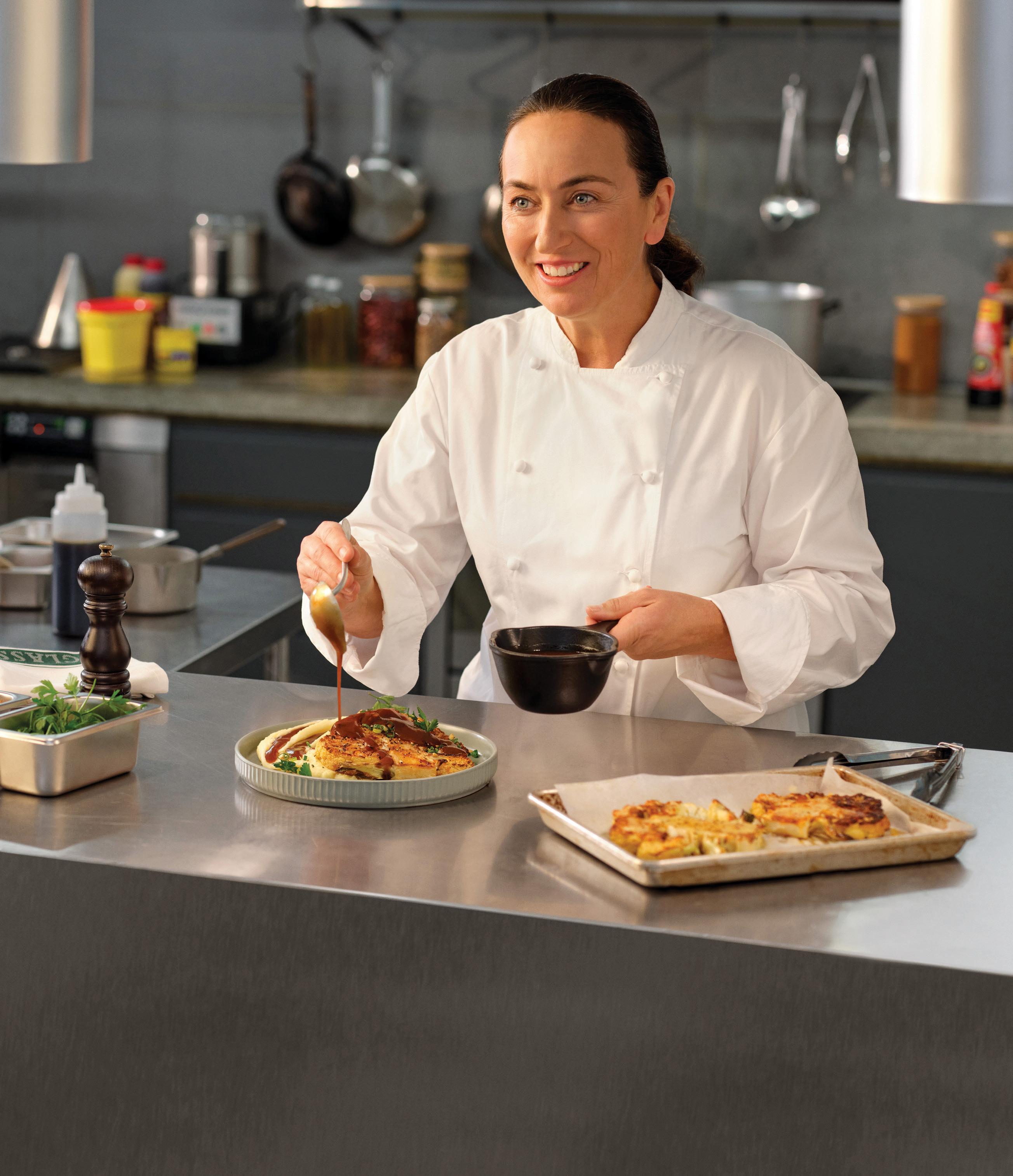
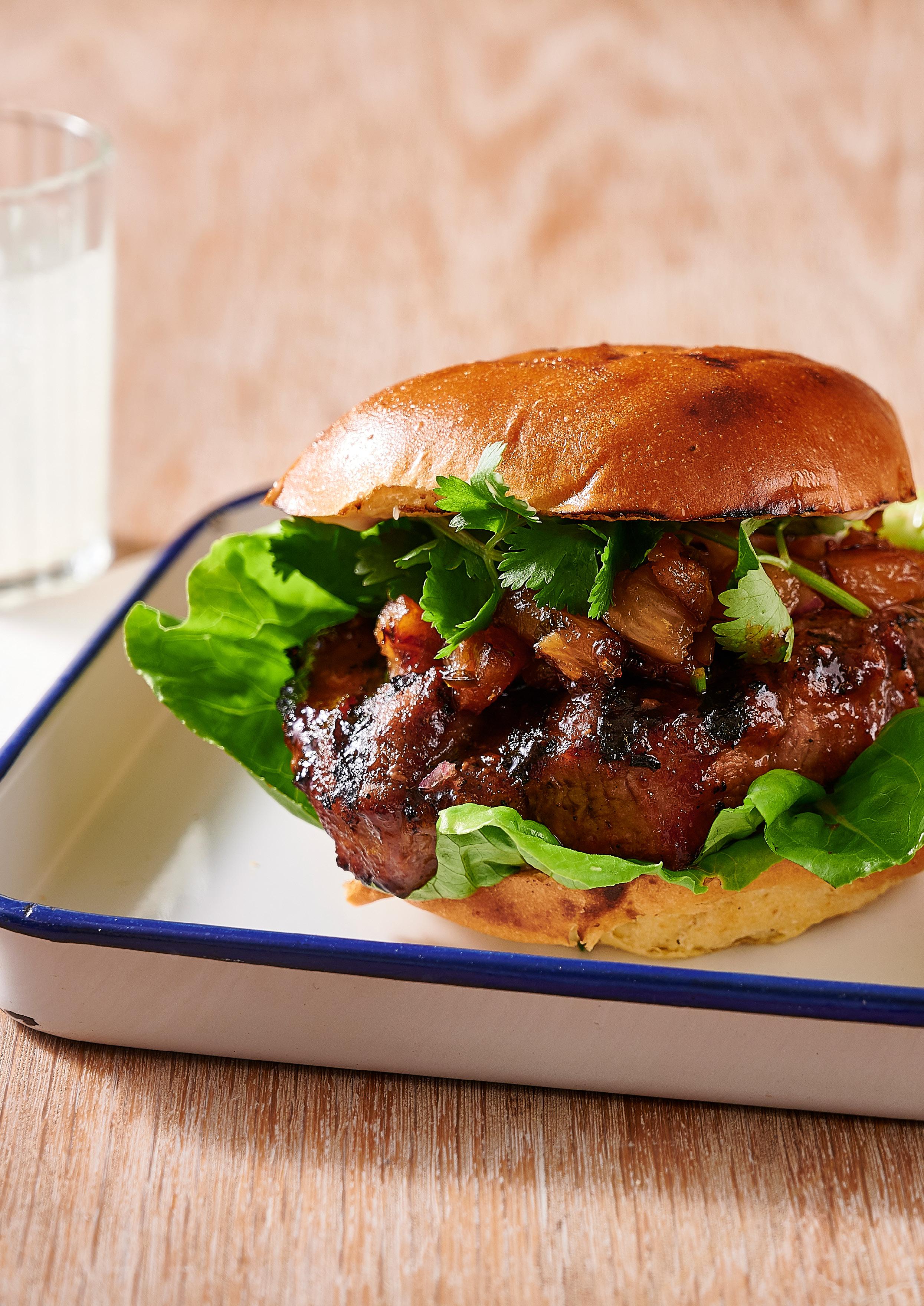

MAGGI® GRAVY HANDLES ANY CHALLENGE WITH EASE
Make Maggi® Gluten Free Supreme Gravy Mix the star of your team, and treat your customers to full-bodied, beef-flavoured brilliance that just happens to be vegan.





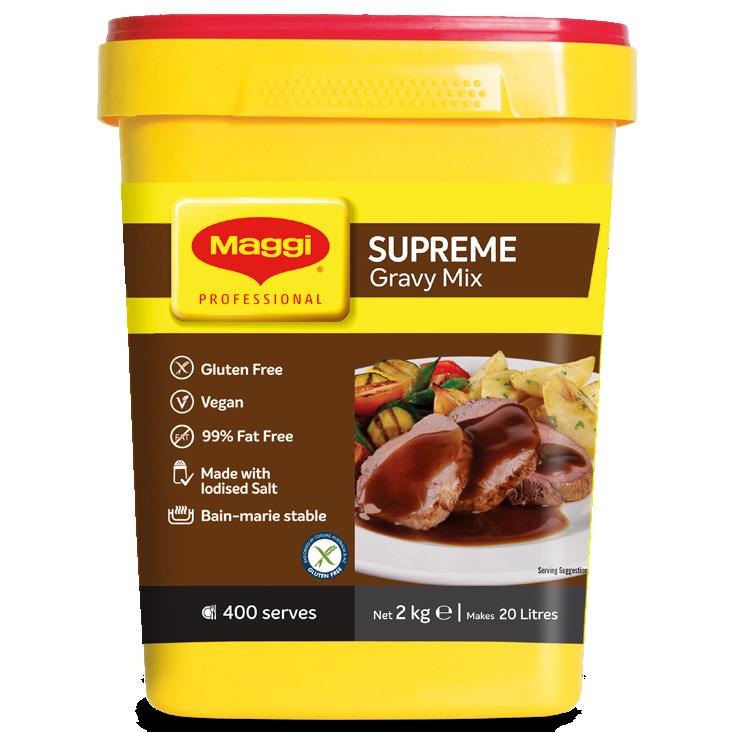
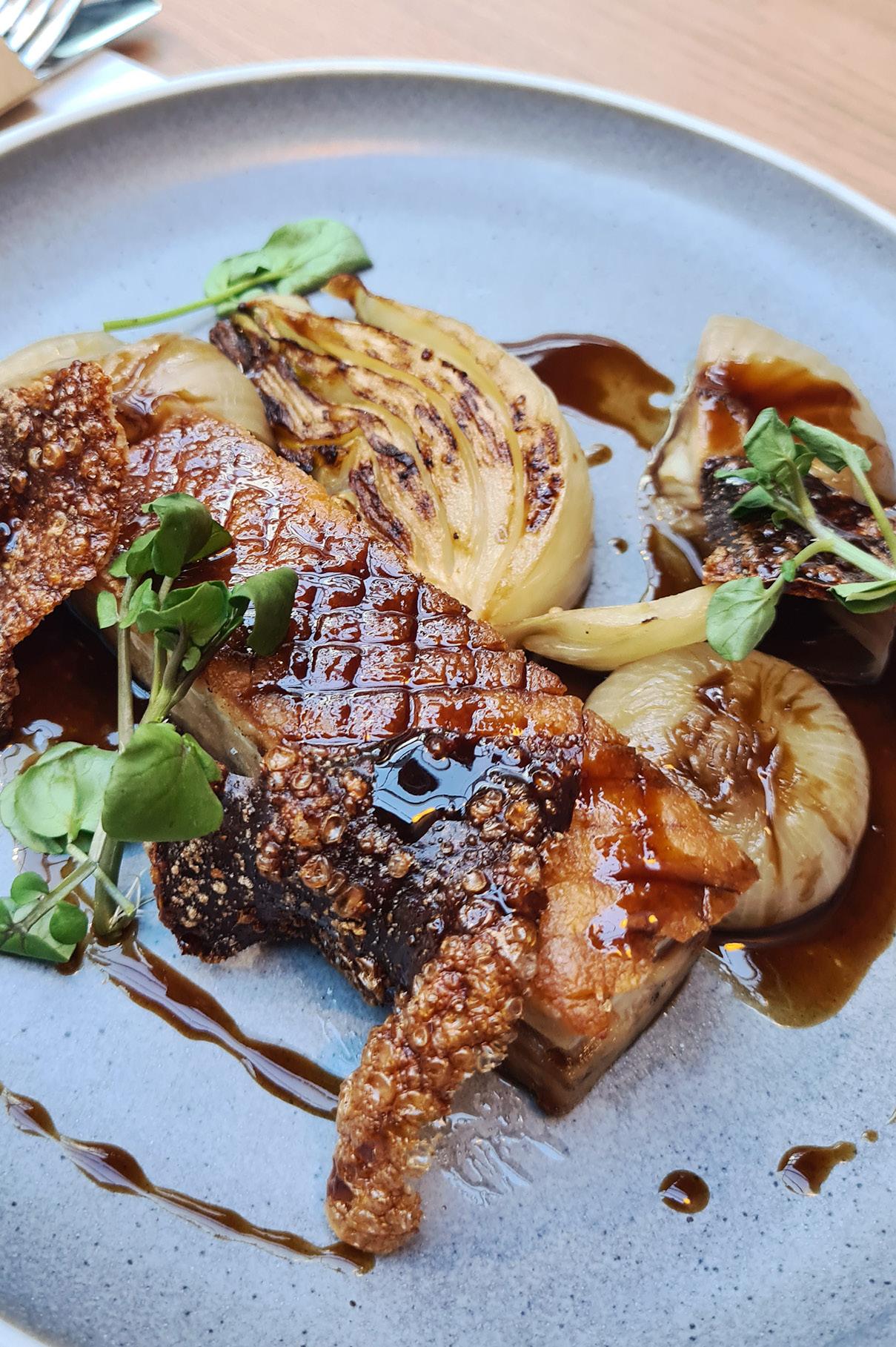
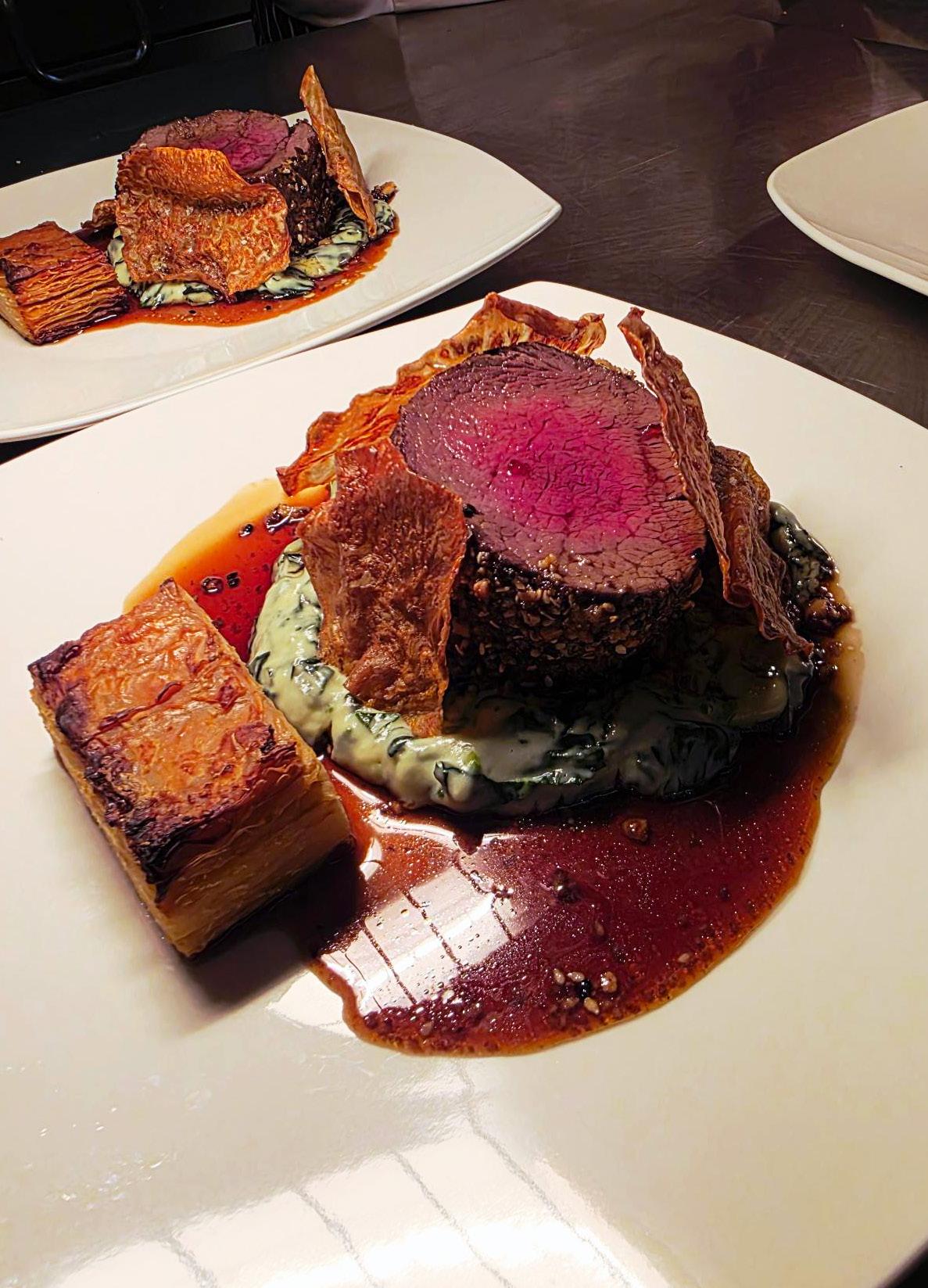
Bold ambitions
With nearly three decades of experience in the kitchen, Frankston RSL’s executive chef Dean Webster is still chasing new flavours and fresh ideas.
WHEN FRANKSTON RSL was crowned Best Metro Club Bistro/ Restaurant at this year’s Community Clubs Victoria Awards (read more about it on page 94), it marked a major milestone for executive chef Dean Webster and his team.
“It was a huge honour,” he said. “To be awarded Metro Club Bistro/Restaurant is an amazing achievement and great recognition of the work that has been put in over a long period of time with both the back-of-house and front-of-house teams.”
Webster’s path to executive chef at one of Victoria’s largest RSLs began nearly three decades ago in Sydney, sparked by a household love for food.
“I always had an interest in cooking while growing up, as both my parents shared the cooking. Dad was the ‘wannabe’ chef and that triggered my appetite for exploring cooking.”
That early interest evolved into a career when he began his apprenticeship, working across fine dining, function venues, clubs and restaurants. He earned his Certificate III in Commercial Cookery in 2000 and followed it with a Certificate IV in 2010. But for Webster, learning didn’t stop in the classroom.
“Cooking is something that’s intuitive and you develop a passion for. Sometimes the best ‘cooking school’ is daring to push boundaries and experimenting; you nail it most of the time, but it’s also important to have misses, as this only spurs you on to get it right and create something you are truly proud to serve.”
A pivotal influence during Webster’s early career was executive chef Paul Hamilton, who he worked with at Revesby Workers’ Club in Sydney.
“Paul taught me so many valuable lessons in my younger days and always believed in what I could achieve,” he said.
“He moved on to greater things, including group executive chef of a company that owns multiple restaurants and cafes – so he still is a great inspiration for me.”
Webster’s career gained new momentum when he relocated from Sydney to Melbourne. There, he continued to hone his skills across different kitchens before landing his first head chef role at Ringwood RSL, where he remained for 10 years. After a decade, Webster took the leap to Frankston RSL, a move driven by a desire to take on a larger challenge.
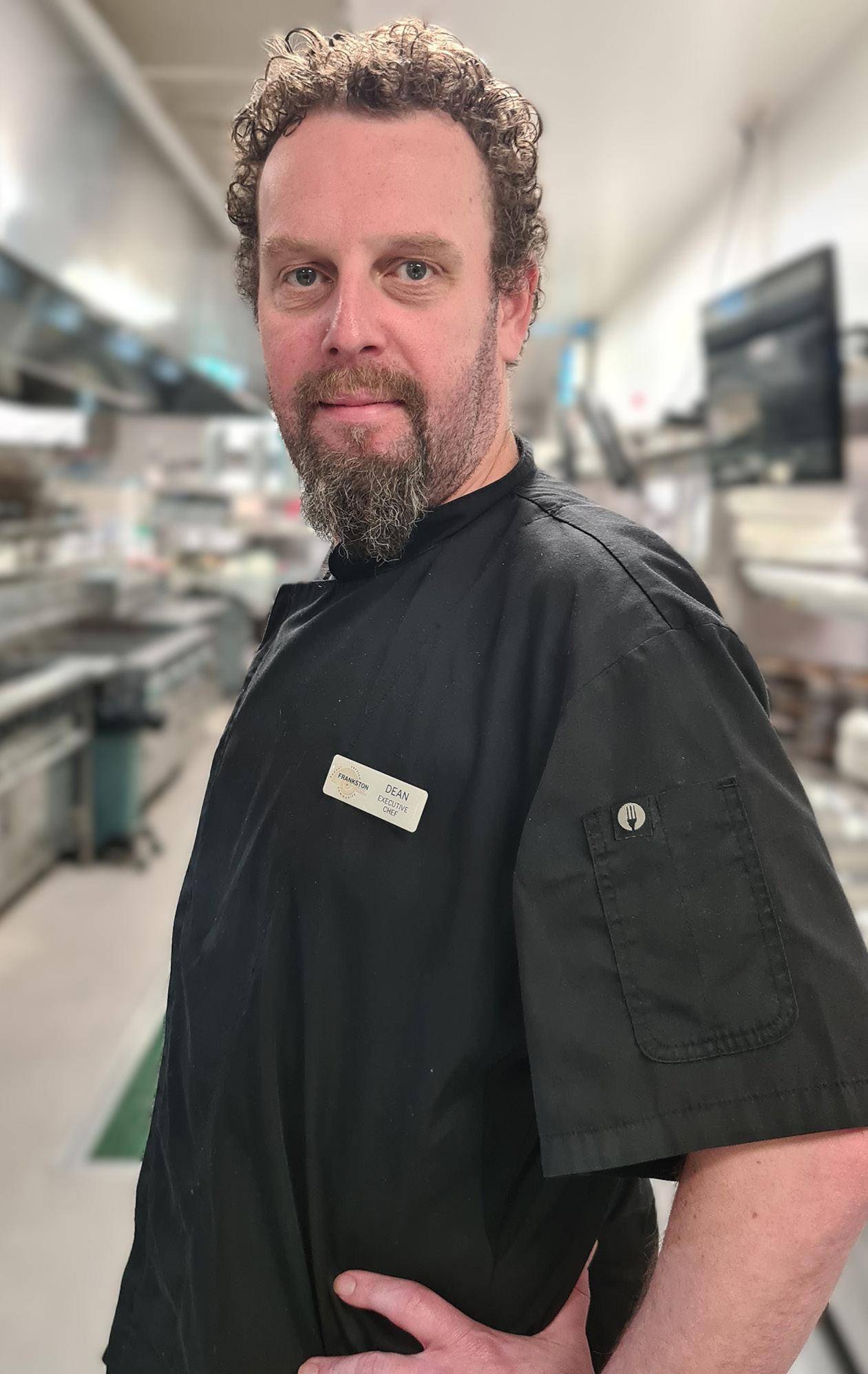
“I knew it would be a big challenge but one I felt ready for. Every day I look forward to continuing to drive the Frankston RSL and my team onto bigger and better things by producing quality food and putting my stamp on the business with new and exciting seasonal menus.”
Philosophy on a plate
Webster describes his food philosophy as a mix of innovation and responsiveness, balancing modern trends with the comfort classics that club diners still crave.
“Old favourites are a must on a bistro menu, as are dishes currently trending. You need to appeal to a wide gamut of diners in a club setting.”
When asked what dishes he’s most proud of, Webster’s passion is clear.
“I am proud of all the dishes that I create. When I set out on updating a seasonal menu, I keep in mind not only to make the menu innovative, but at the back of my mind is the thought of consistently achieving customer satisfaction and keeping them coming back to an eatery that’s high on their list of dining out options,” he said.
“I love cooking Italian food, as I did a large part of my apprenticeship in an Italian restaurant, but I also love cooking
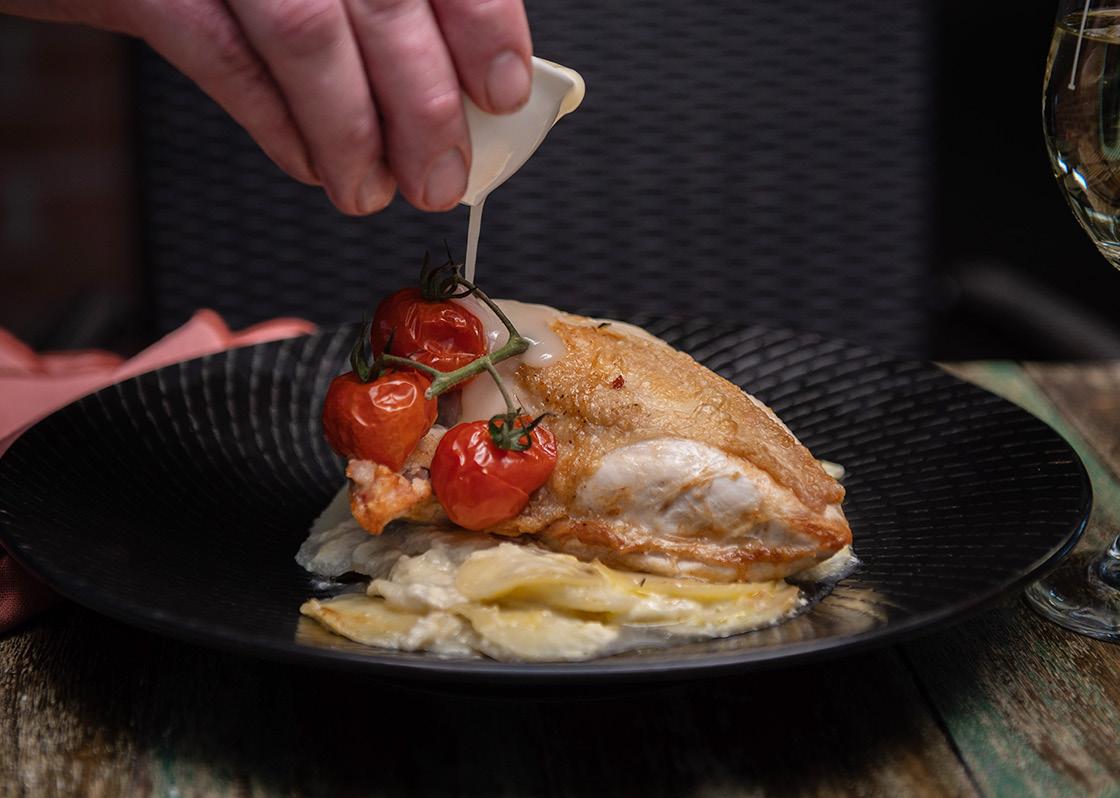
“Clubs give you greater connection with your customers … you get to know them as people.”
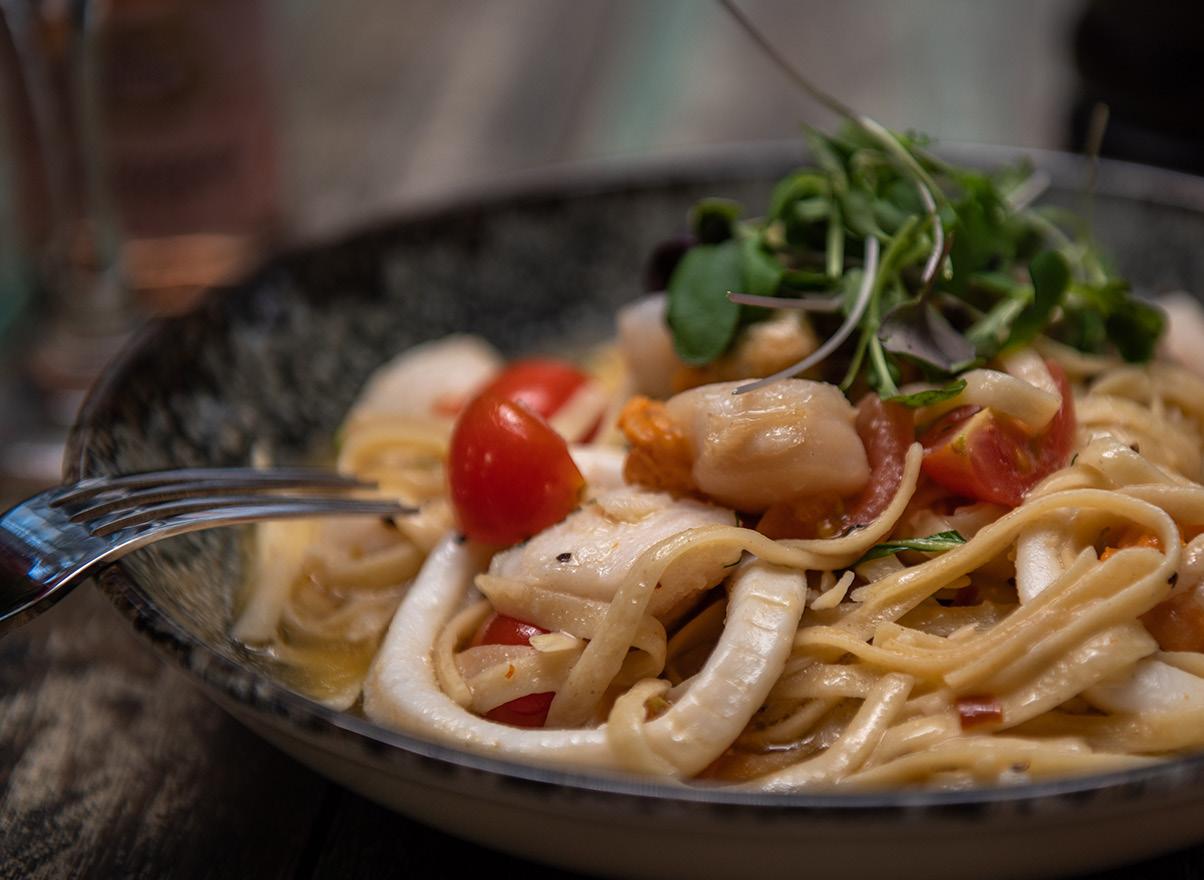
Middle Eastern food as you can get some beautiful intense flavours from all the spices. Personally, I could eat spicy food all day every day – the hotter the better!”
Club connection
For Webster, working in a club setting offers something different from standalone venues.
“Working in clubs give you greater connection with your customers, as a lot of them are club members and are at the venue quite often, so you get to know them as people, which is something not always possible working in other food establishments.”
As dining expectations continue to shift and club menus evolve, Webster sees opportunity, not pressure.
“People expect more. As diners become more open-minded and knowledgeable about food, their expectations grow higher in terms of quality and variety.”
Looking ahead, Webster is keen to explore more global flavours and bring fresh ideas to the bistro menu.
“Global street food is a big trend these days,” he says. “Working with these ideas, and implementing them into our menu, is an exciting possibility which will offer something new to our bistro offering.”
Dean Webster
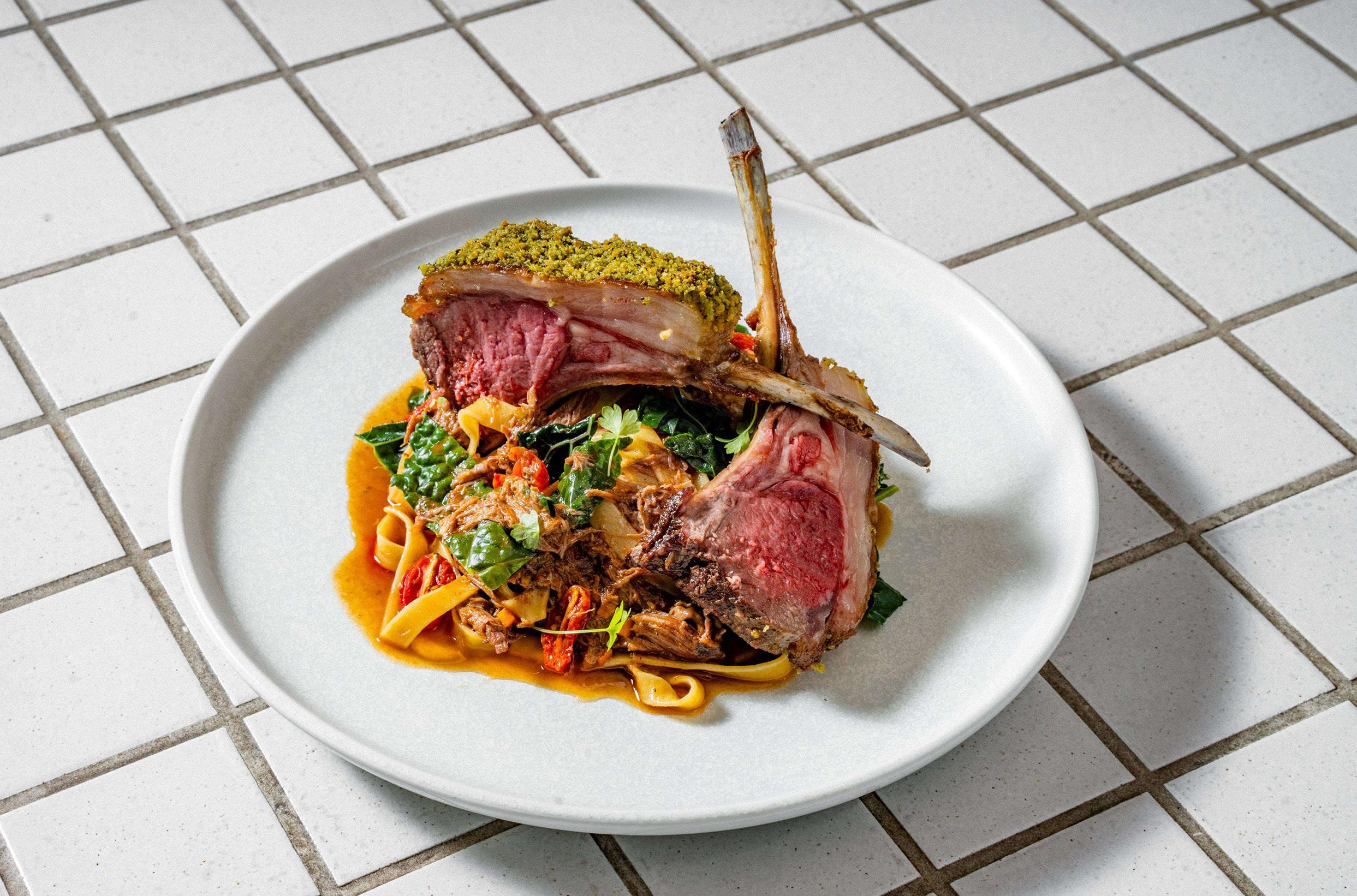
Dishing up a storm
From Broken Hill to Bundeena, Mudgee to Murwillumbah, 200 eateries from 171 clubs right across NSW entered some special competition dishes for this ClubsNSW 2025 Your Local Club Perfect Plate Awards.
THE PUBLIC VOTE was tallied and five state-wide winners and 13 regional winners of the ClubsNSW 2025 Your Local Club Perfect Plate Awards were announced at an awards night on Tuesday 15 July at the Western Sydney Convention Centre.
Taking out top honours for the large club category was Bankstown Sports Club for its herb crusted lamb rack and pappardelle.
Meanwhile, The Fraternity Club walked away with two awards from the evening: the state-wide medium club category for its ravioli di pesce, a seafood filled ravioli tossed in crab and prawn bisque reduction, and as the inaugural winner of the Perfect Pizza category for its Pizza Trevigiana that’s topped with Italian pork sausage, gorgonzola, portobello and shiitake mushrooms, radicchio and drizzled with honey and truffle oil.
“We’re absolutely thrilled to have won the inaugural Perfect Pizza category in the Perfect Plate Awards. It’s a huge honour for the team and a real testament to the hard work, creativity, and passion they put into everything we do here at the club,” The Fraternity Club CEO Glenn Ward said.
“Being recognised as the first-ever winner in this new category makes it even more special. It’s incredibly rewarding to see our efforts celebrated in such a meaningful way, and it gives us great pride to know that our pizza has made a lasting impression.
“We’re grateful for the support from our community and customers – they’re a big part of why we continue to push ourselves to deliver the best.”
In the state-wide small club category, The Polish Club in Sydney’s inner west won for its Bangalow pork schnitzel.
Kiama Leagues Club was announced as the fifth state-wide winner where it took out the best dessert category for its panna colada, a tropical take on the classic panna cotta with Malibu, toasted coconut, pineapple and a side of chocolate biscotti. The dessert was the brainchild of Gavin Robinson, one of the club’s many talented chefs, who has a real passion for desserts.
Kiama Leagues Club’s executive chef Sarah Rebbeck described the win as a proud moment for the team, and that they’re already thinking about next year’s dishes.
Bankstown Sports Club won with its herb crusted lamb rack and papparedelle.
“The perfect plate awards are about raising the bar in club dining,” she said.
“It highlights creativity and teamwork. It puts a spotlight on regional clubs and shows that we can compete with the best in the state.
“For our club, this win shows how food connects us to our members, community and to each other as a team. It proves that if we all work together, we can create something really special.”
One of the regional winners was The Ary Toukley on the Central Coast, which impressed the judges with its Humpty Doo barramundi dish. It was the club’s fourth time to win the category.
“Our continued success is a result of truly understanding our market and crafting dishes that resonate with our members. This year, we narrowly missed out on the state title by just one vote – an incredibly close finish that only fuels our passion for next year,” The Ary Toukley CEO Trevor Haynes said.
“Each win brings a surge in member engagement and strengthens the unity of our team, front and back of house, who take immense pride in competing. Since the announcement, members have been visiting in droves to try our winning dish, and their overwhelming support is a true reflection of the strong connection we’ve built within our community.”
ClubsNSW CEO Rebecca Riant said Perfect Plate, now in its fifth year, was an opportunity to shine the spotlight on the quality and diversity of club dining, and the dedicated chefs who work in the industry.
“From a Red Miso Glazed Snapper to a Beef and Guinness Pot Pie, this year’s winners are as varied as they are innovative, and they show that there really is something for everyone at your local club!” she said.
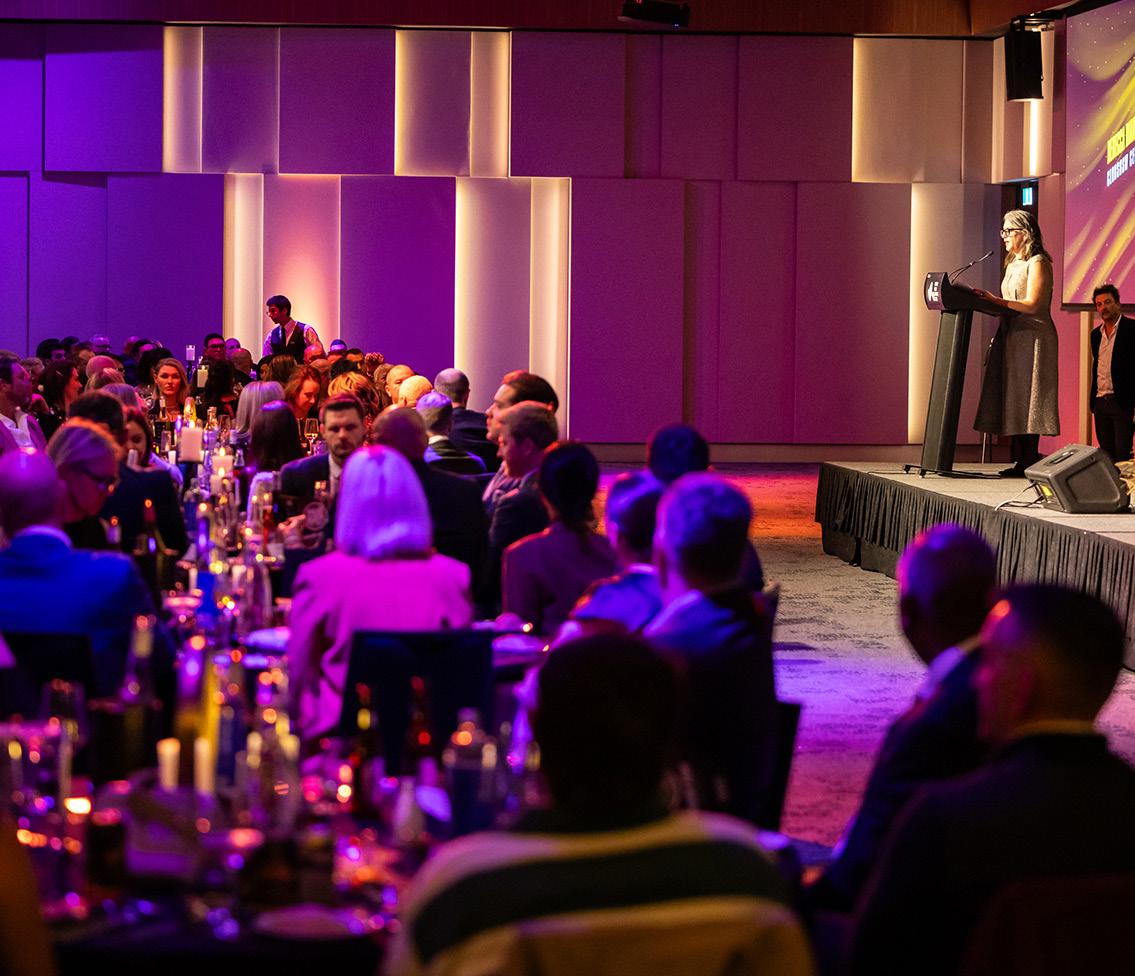
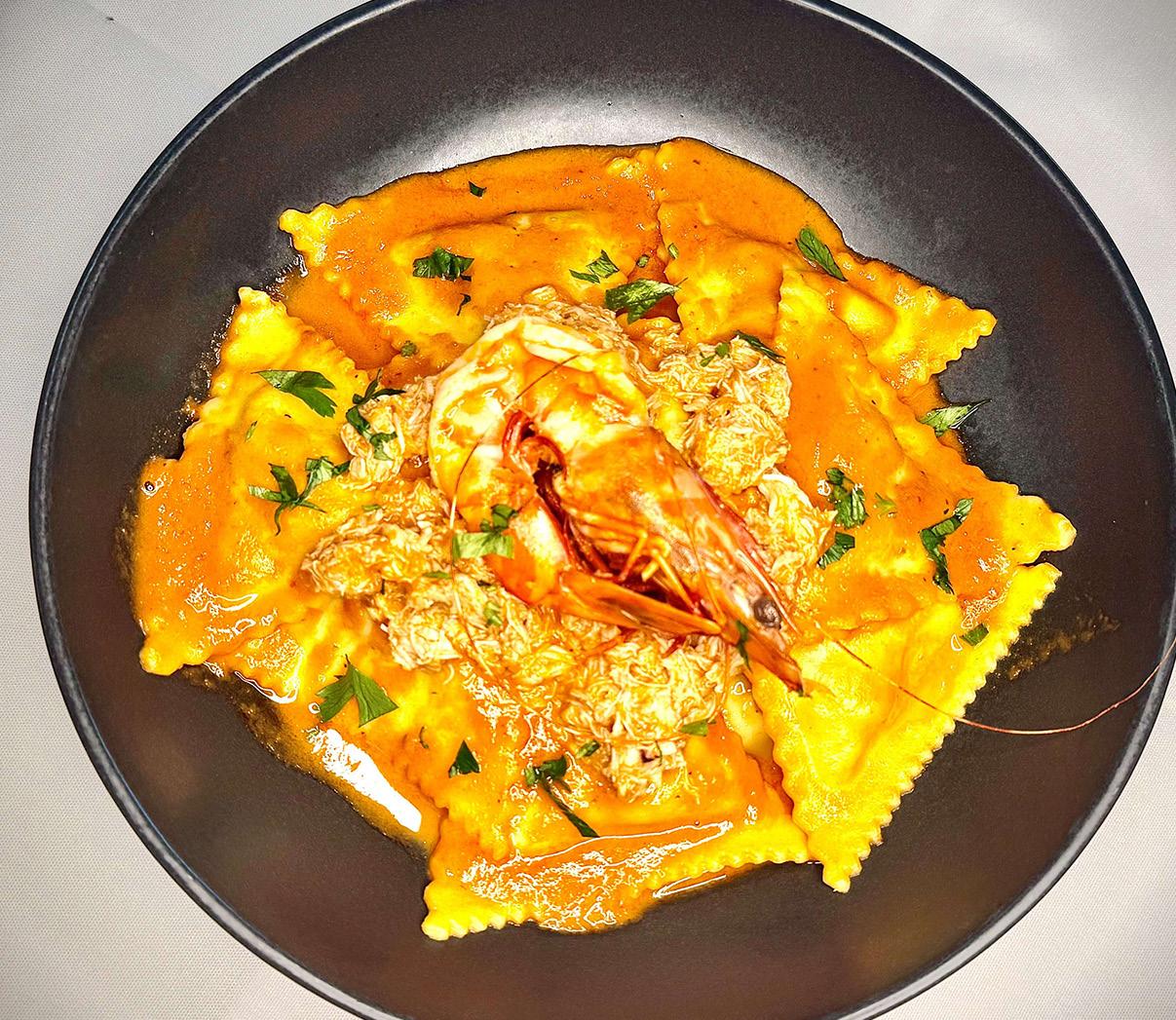
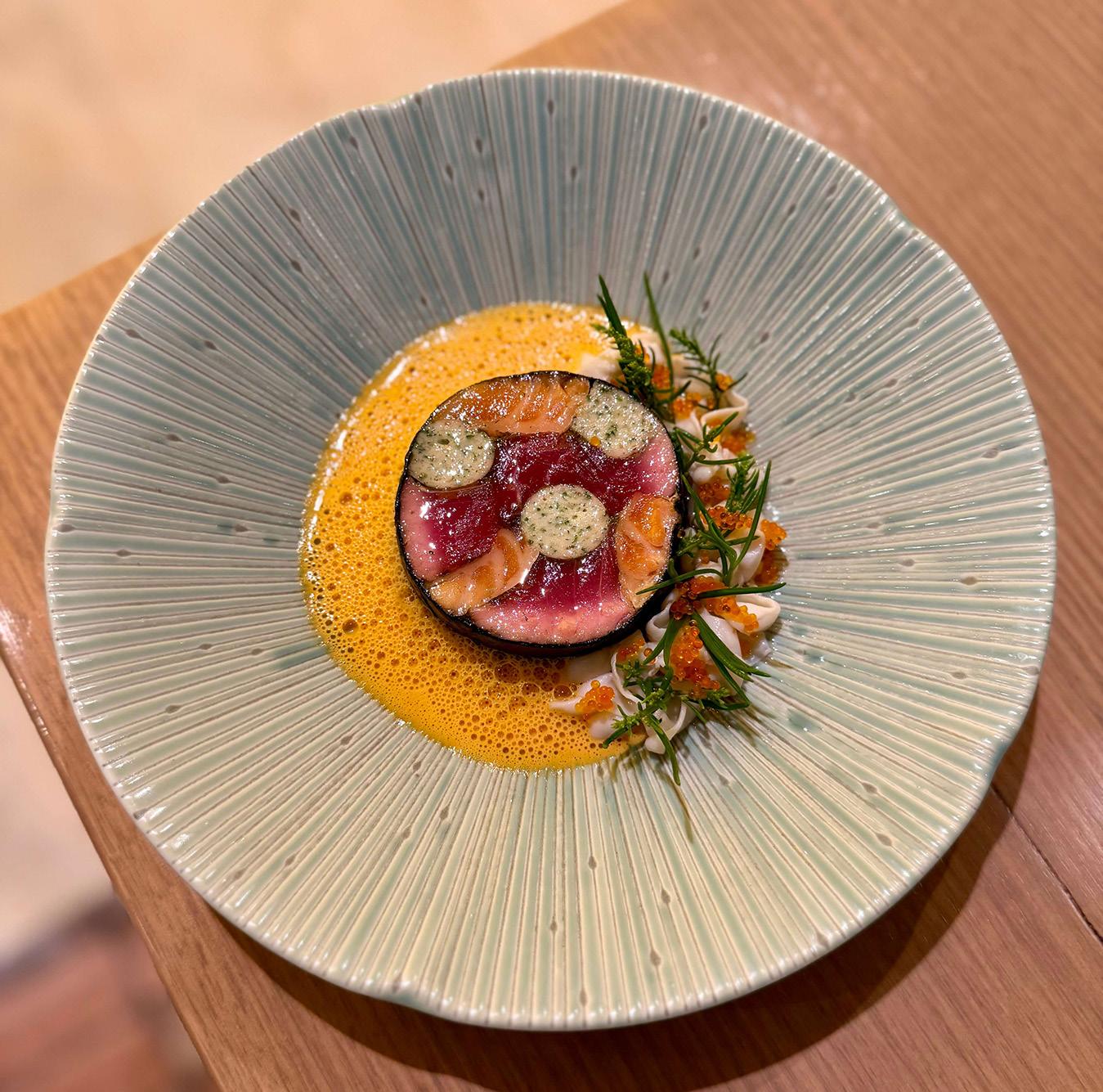
“Clubs are the perfect place to get together with friends and family, knowing that you can enjoy award-winning cuisine at affordable prices.”
Over 98,300 Perfect Plate dishes were purchased by hungry diners, with the competition’s ambassadors and celebrity chefs Matt Moran and Courtney Roulston, and NRL legend Nathan Hindmarsh collectively visited more than 60 participating clubs to meet the competing chefs and taste their creations.
“Every year, clubs continue to take it up a level when it comes to the quality of food, and this year was no exception. In fact, I’m thrilled that The Epping Club has taken out the top spot in the Northern Metropolitan region because they dished up some of the best Chinese food I’ve eaten not just in Sydney, but in the world,” said Moran, who started his career at Parramatta RSL.
“I was really impressed with the enthusiasm of the chefs I met as part of my Perfect Plate road trip. They were so passionate about what they created, and I love how many of them chose to highlight local produce.”
Fraternity Bowling and Recreation Club’s ravioli di pesce.
Coro 88’s fruits de mer moderne.
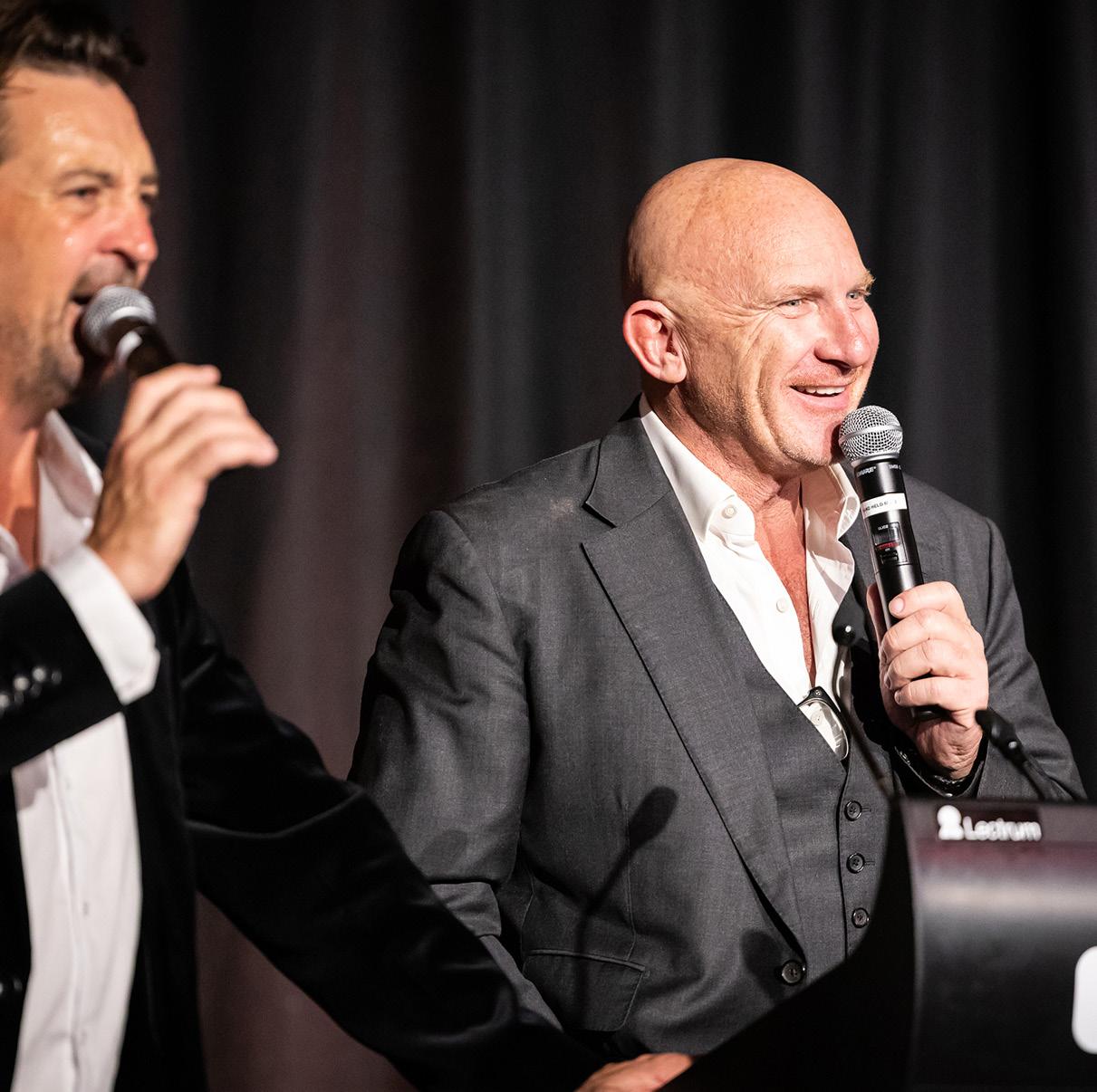
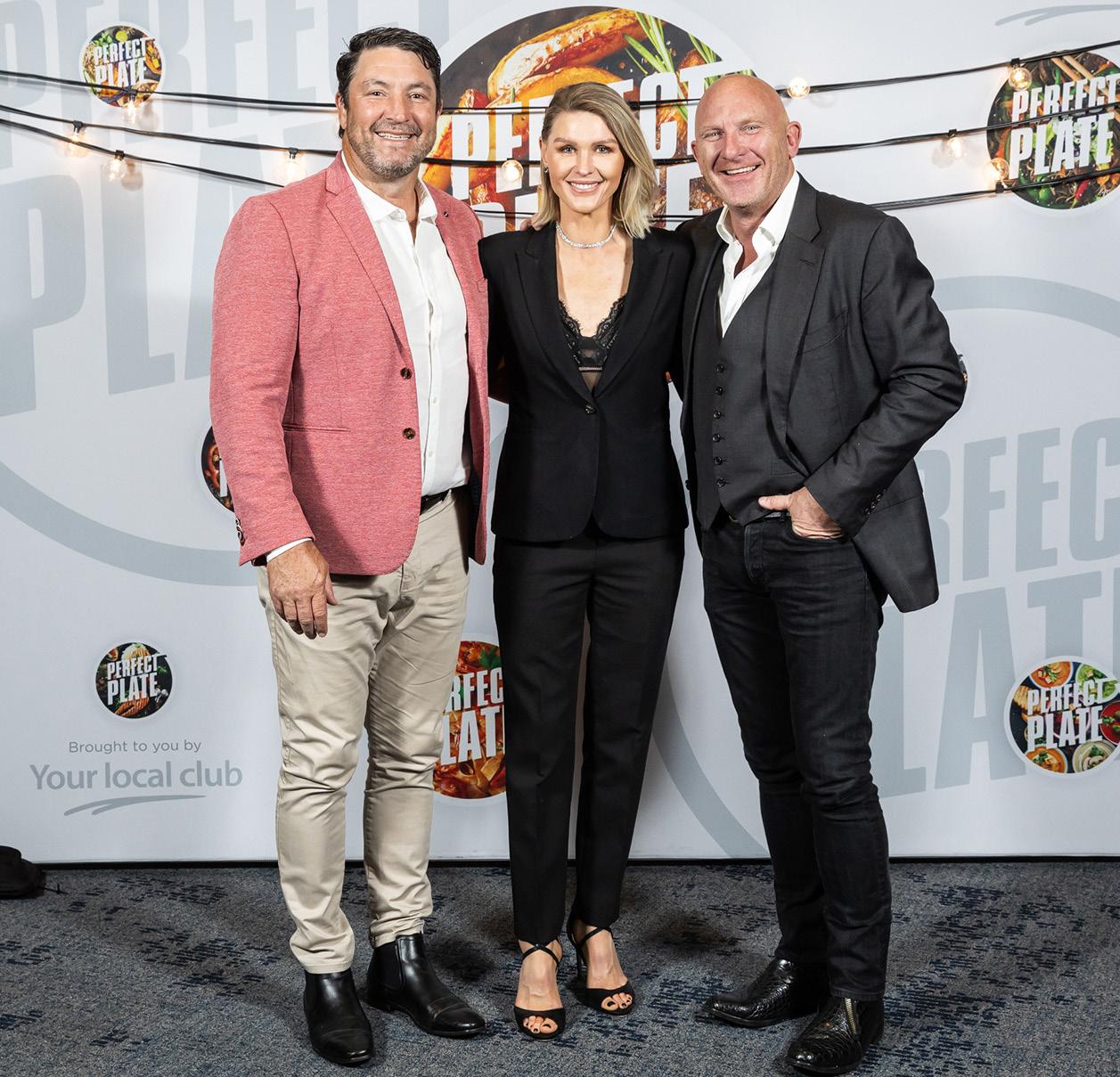
Here’s the list of winners:
STATE WINNERS
Small club
Polish Club Ashfield, Sto Lat
Bangalow Pork Schnitzel
Medium club
The Fraternity Club, La Trattoria
Ravioli Di Pesce
Large club
Bankstown Sports Club, Greenfield Bistro Station
Herb Crusted Lamb Rack & Pappardelle
Perfect Pizza
Fraternity Bowling & Recreation Club, Il Bene Pizza Trevigiana
Best Dessert
Kiama Leagues Club, Sails Bistro
Panna Colada
METRO WINNERS
Eastern Metro
Club York, Primi Italian Primi Vitello
North West Metro
Club Blacktown, Ocean Treasure Asian Dining
Ocean Kiss
Northern Metro
The Epping Club, Miss Yu
Peking Style Fried Egg Roll Wrapped Vegetables & Pork
Southern Metro
The Pinnacle South Hurstville RSL Club, Zenith Bistro
Ocean Harmony
Western Metro Coro 88, Coro 88 Dining
Fruits de Mer Moderne
REGIONAL WINNERS
Central Coast
The Ary Toukley, Ziva Eats & Pizza
Humpty Doo Barramundi
Central West
Bathurst RSL, The Bistro
Red Miso Glazed New Zealand Snapper
Far North Coast
C.Ex Coffs, The Brasserie Chicken Ballotine
Illawarra & Shoalhaven
Currarong Bowling & Recreation Club, The Peninsular Brasserie Stuffed Pork Tenderloin
New England Tablelands & North-West
South Tamworth Bowling Club, Southside Kitchen
Crispy-Skin Salmon and Pan-Seared Prawns
Newcastle & Hunter Valley
Budgewoi Soccer Club, Angkasa Curry Laksa
Riverina & South-West
Howlong Golf Resort, Fairways Bistro
Beef & Guiness Pot Pie
Southern Tablelands & Far South Coast
Catalina Country Club, Catalina Restaurant
Rangers Valley Black Angus Beef Short Rib (MB4+)
Nathan Hindmarsh, Courtney Roulston, and Matt Moran returned as judges of the awards.
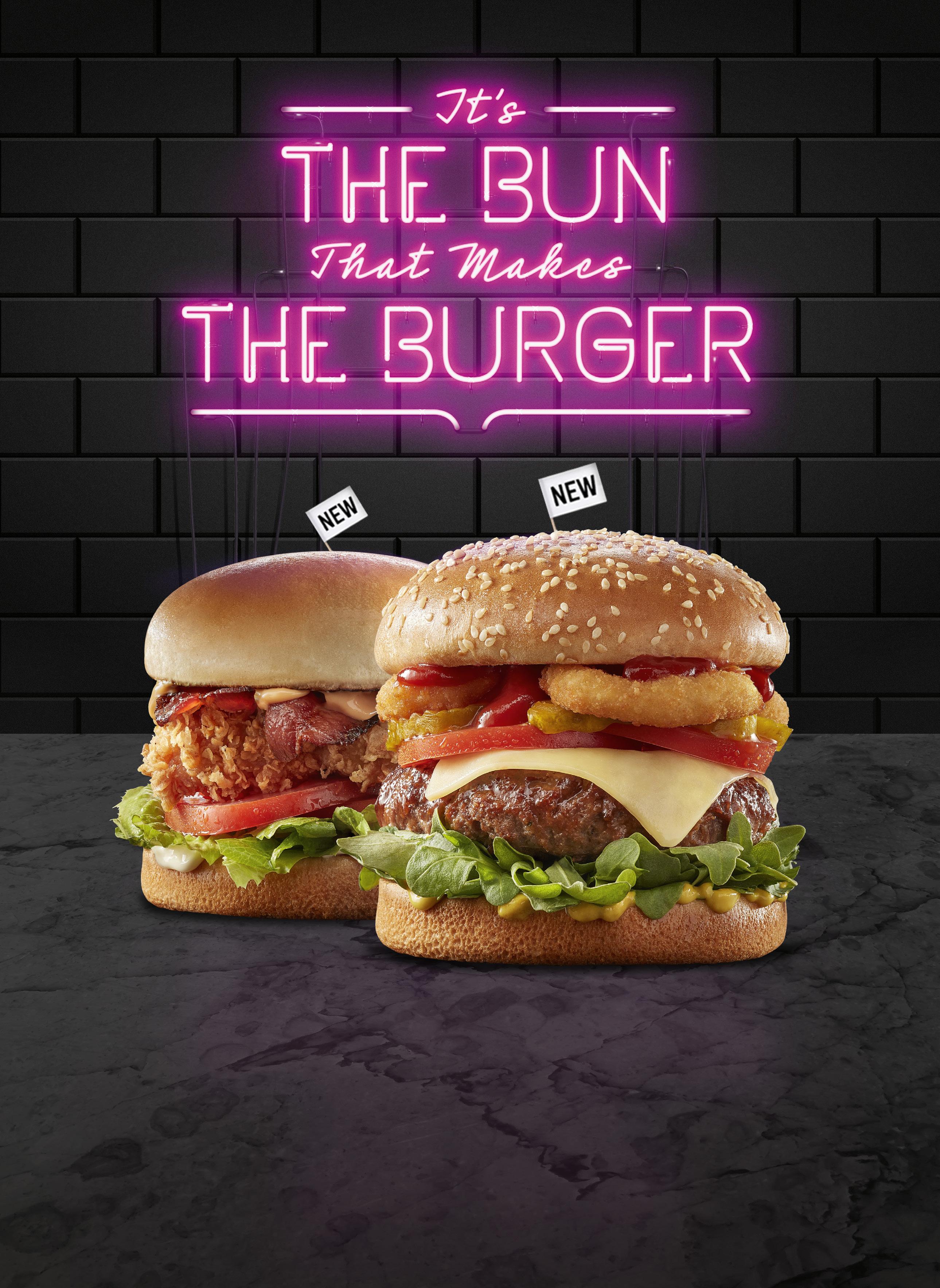
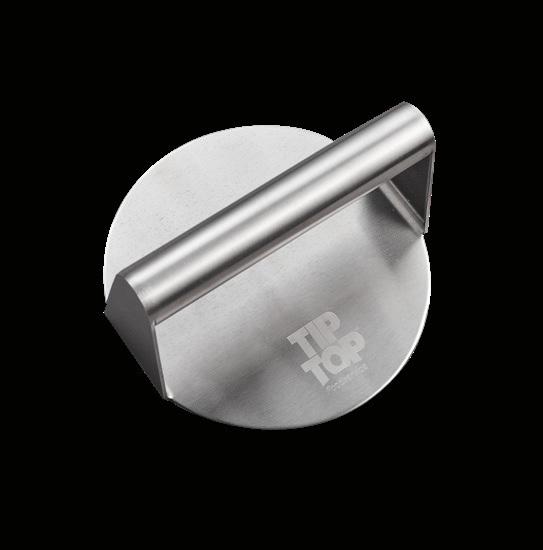

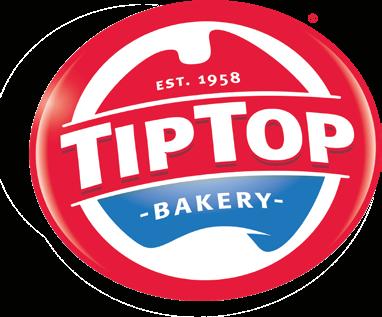
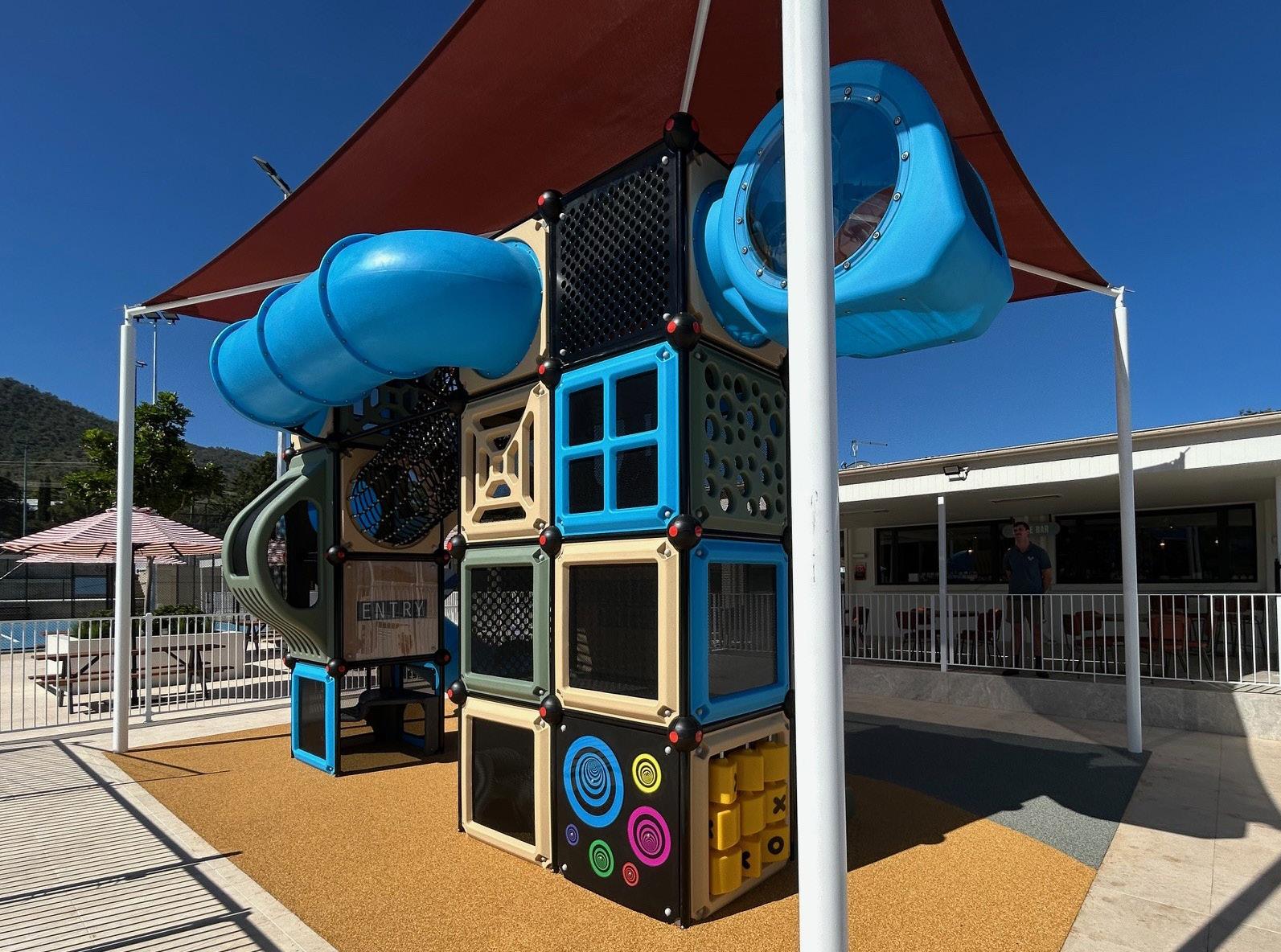
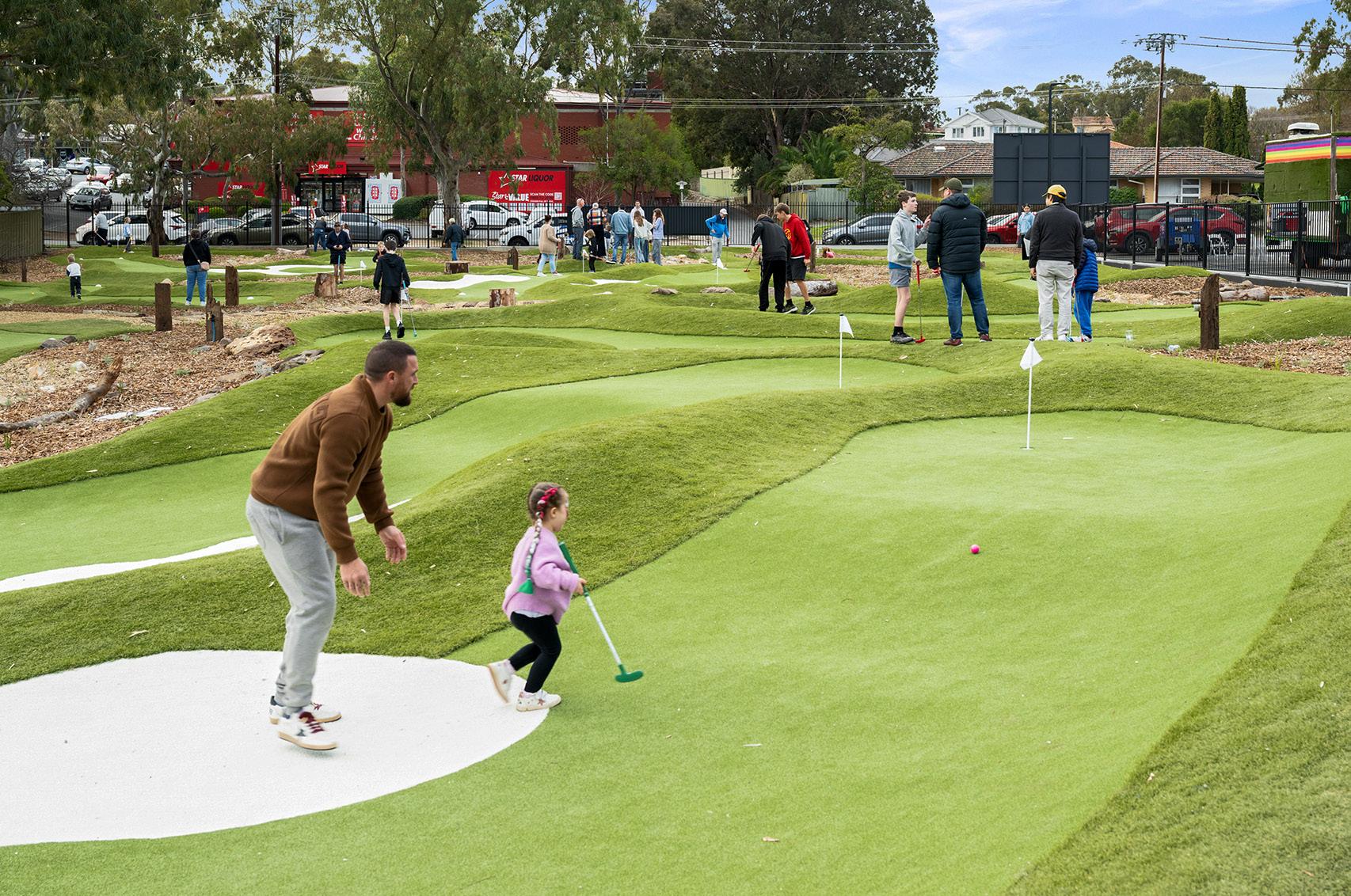
The new playground at The Courts at East is bringing a new wave of patrons through the doors.
Flagstaff Hill Golf Course’s new mini golf is proving popular among families.
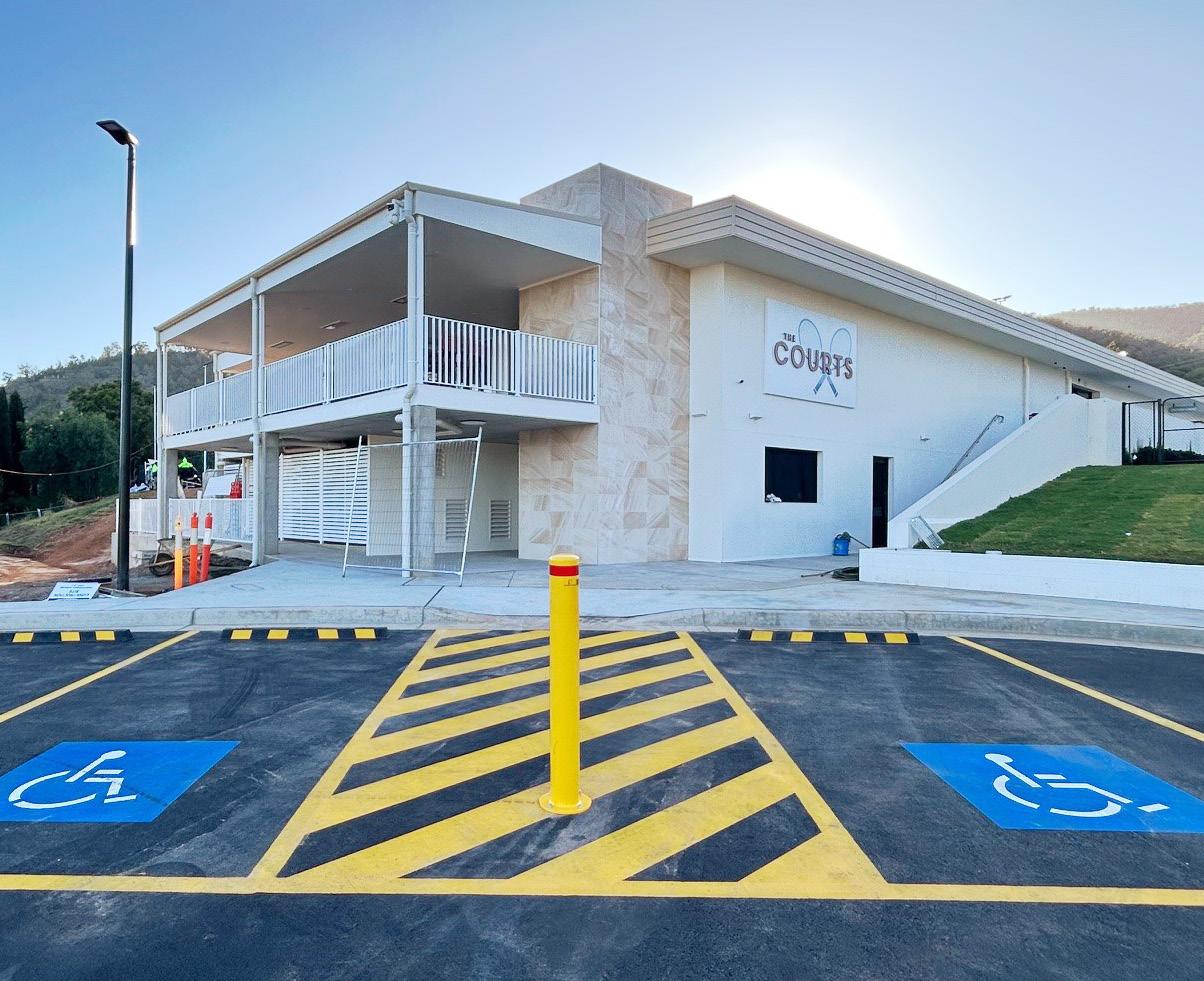
Space for everyone
Outdoor areas are no longer an afterthought for clubs but are instead helping bring new life into venues.
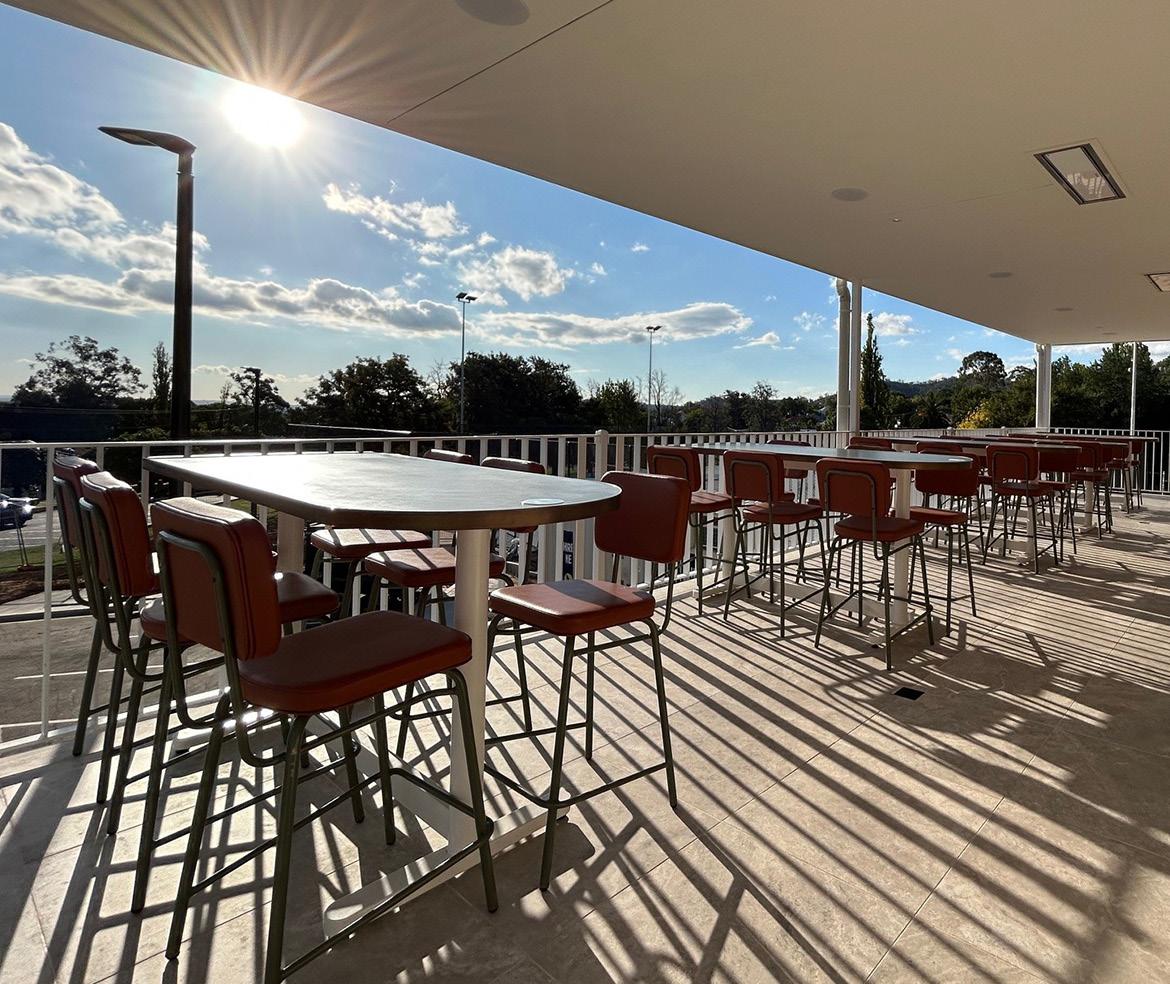
ONCE LIMITED TO a few tables on the lawn or a designated smoking area, outdoor spaces in clubs are now becoming well thought-out, versatile spaces in the wake of rising expectations and shifting member demographics. Clubs are investing in everything from alfresco dining and playgrounds to multi-use lawns to grow their appeal, expand their footprint, and reshape how clubs are perceived by their communities. These developments aren’t just aesthetic – they’re strategic.
At The Courts at East in Tamworth, its attention to its outdoor space began as part of the club’s renovations to create a space that didn’t feel like a typical club.
“We wanted this space to be very inclusive, targeted at families and being a family-friendly space, although still a place for everyone,” Garrett Laing, West Tamworth League Club project manager said.
“Although we are a club on paper, when you walk in, it’s not meant to feel like your typical club.”
The transformation began when Wests Tamworth took over the rundown East Tamworth Tennis Club in 2017.
Over several years, they turned what was once a tired function hall and dated pro shop into a lively space featuring an upgraded clubhouse with a new western terrace and expansive outdoor playground.
“It’s pivoted from being a venue just for tennis and a few functions to being a place… catering for people that want to venture out for a meal or two, which they can enjoy on the western terrace.”
That terrace now oversees a new playground and large outdoor area, which according to Laing was a “non-negotiable” during the planning phase.
“There’s certainly a calling for this in this part of town,” Laing said.
“The amount of interest that I would get just from people walking by… [about] how keen they are, just to have a space that is all inclusive with a playground.”
It’s part of a larger push to reach younger families and broaden the club’s appeal across age groups. While the design includes spaces for toddlers and parents, there are also plans underway to install a basketball court, bocce court, a large television screen that can be used for movie nights, and a dry bar.
“We’re really trying to lean into the younger demographic,” Laing said.
So far, the inclusive design has translated into a noticeable shift in patrons.
“Before we did anything, the clientele was limited. It wasn’t bustling by any means … now that we’re open, we’re getting a range of people through the door, which was the design intent and original brief.”
Beyond the fairway
Though located in a very different part of the country, Flagstaff Hill Golf Club in Adelaide has also embraced outdoor expansion as part of its recent redevelopment.
A new western terrace was introduced as part of The Court at Easts’ recent renovation.
“Now that we’re open, we’re getting a range of people through the door, which was the design intent and original brief.”
Garrett Laing,
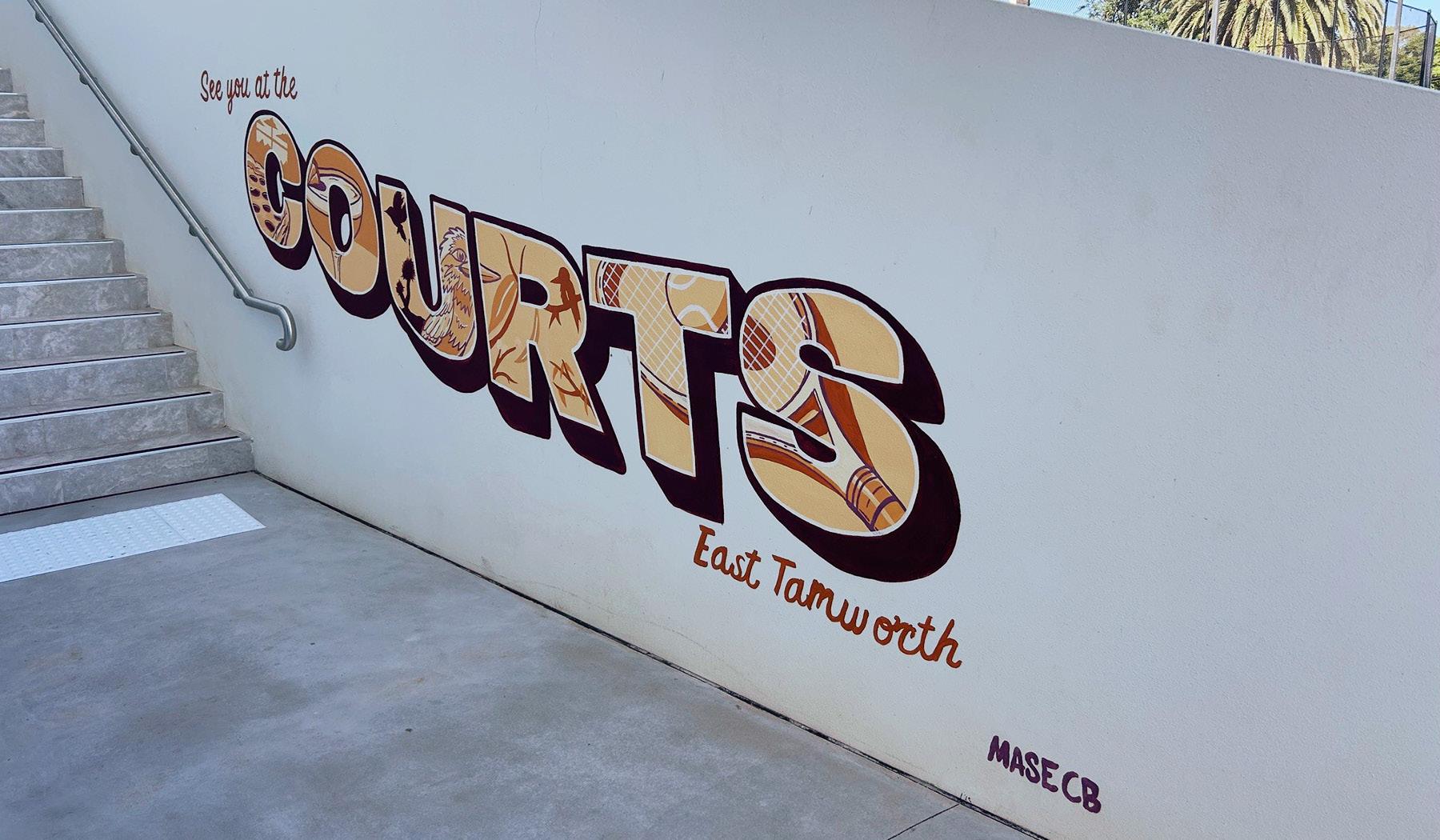
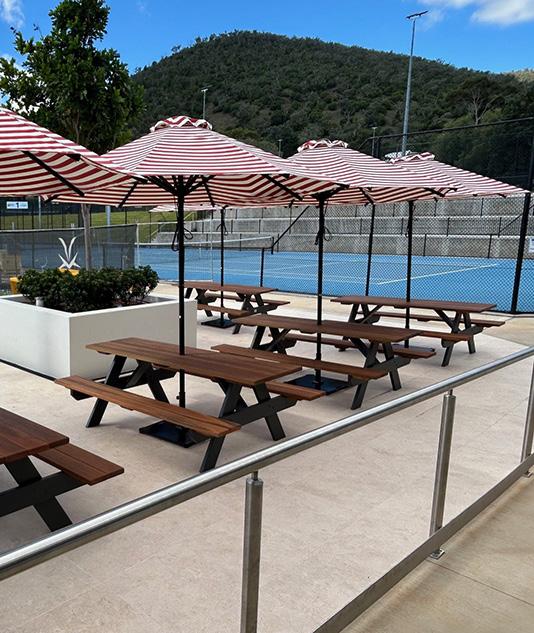
“We consider this whole development as now being a community hub versus the feelings of what a traditional golf club can be where it’s members-only and people questioning, ‘Can I go in?’” general manager Chris Coulter said.
The club’s redevelopment plans began in 2017 through a partnership with retirement living developer Living Choice. Under the deal, the club provided land for Living Choice to build villas and apartments in exchange for a new clubhouse integrated within the new development.
The result is a single-level, purpose-built space that now houses all hospitality and golf operations, alongside new outdoor attractions like a mini golf course and alfresco dining deck.
“The function room has really good views. The casual dining and deck now overlook our short-game and our mini golf area,” Coulter said.
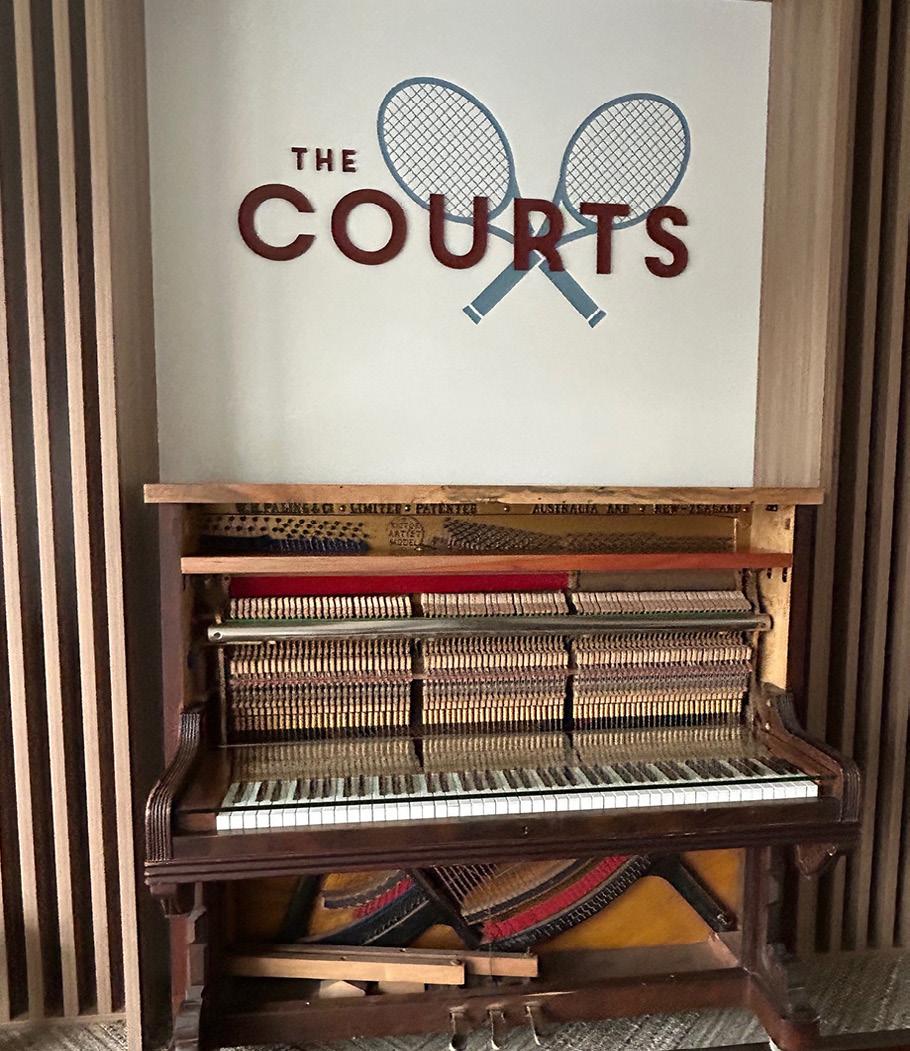
For the club, the mini-golf facility is more than a casual add-on; it’s a key revenue driver and an anchor for family-friendly engagement.
“It’s really aimed at not just the local market. The quality and the level of the mini golf we have built will bring people from all over Adelaide to Flagstaff Hill to play mini golf, and hopefully they stay on and enjoy our dining experiences,” Coulter said.
Both The Courts at East and Flagstaff Hill Golf Club are part of a broader movement where clubs nationwide are rethinking how outdoor areas can be used to boost dwell time and member engagement.
“Over the past few years, we’ve seen a clear shift in how clubs are utilising their outdoor spaces,” Club Clean Services CEO Brent Raper said.
“Many are investing in upgraded patios, outdoor dining areas and lounge zones to create more versatile, year-round environments for members.”
West Tamworth League Club project manager
Pictured on this page are family-friendly spaces at The Courts at East.
THE FUTURE OF HOSPITALITY CLEANING IS HERE
Smarter. Faster. Cleaner.
At Club Clean Services, we’ve spent over 30 years setting the benchmark in hospitality cleaning. Trusted by Australia’s top clubs and pubs, we combine hands-on expertise with the latest cleaning technology to keep your venue spotless, safe, and welcoming.
Now, we’re taking cleaning to the next level with the Rover X4, which we proudly showcased at the Australian Gaming Expo. This innovative machine highlights our commitment to smarter, faster, and cleaner solutions for the hospitality industry.
WHY THE ROVER X4 STANDS OUT
• Compact Power – Cleans in tight gaming floors, bars & busy walkways.
• Smarter Cleaning – AI navigation, 360° cameras, and “teach & repeat” tech.
• Proven Efficiency – Cleans up to 1,860 m² per fill with 2.5 hr runtime.
• Better for Staff – Reduces strain, frees teams for higher-value tasks.
• Backed by Tennant + BrainOS® Clean Suite for unmatched performance.


WHY CHOOSE CLUB CLEAN SERVICES?
• Over 30 years specialising in clubs & pubs
• ISO 9001, 14001 & 45001 certified
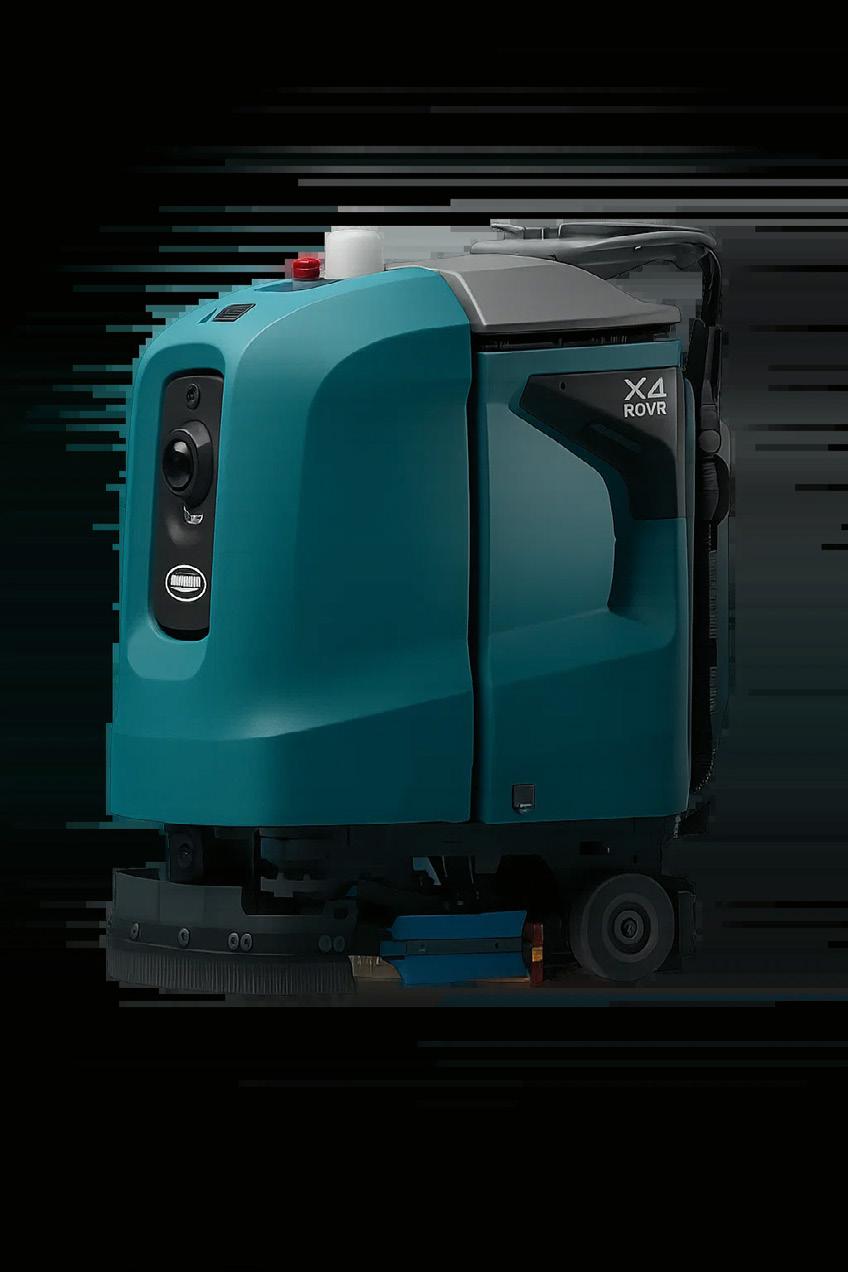
• Trusted by leading gaming venues
• Always investing in innovation



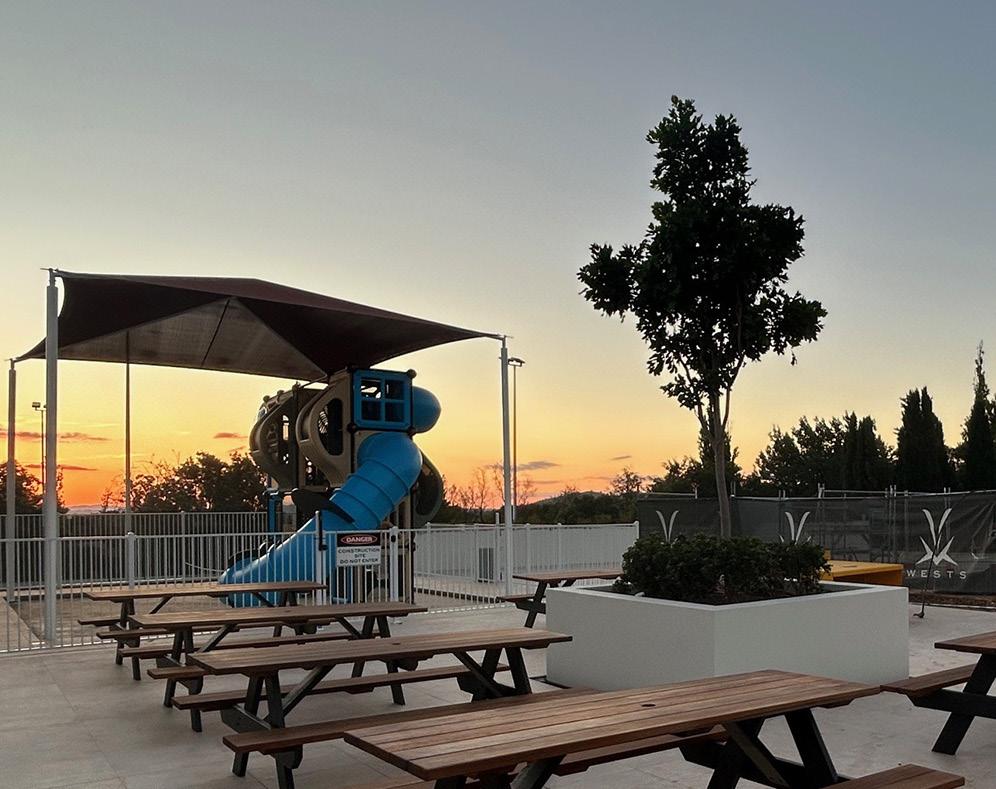
“We consider this whole development as now being a community hub versus the feelings of what a traditional golf club can be.”
Chris Coulter, Flaghill Staff Golf Club general manager
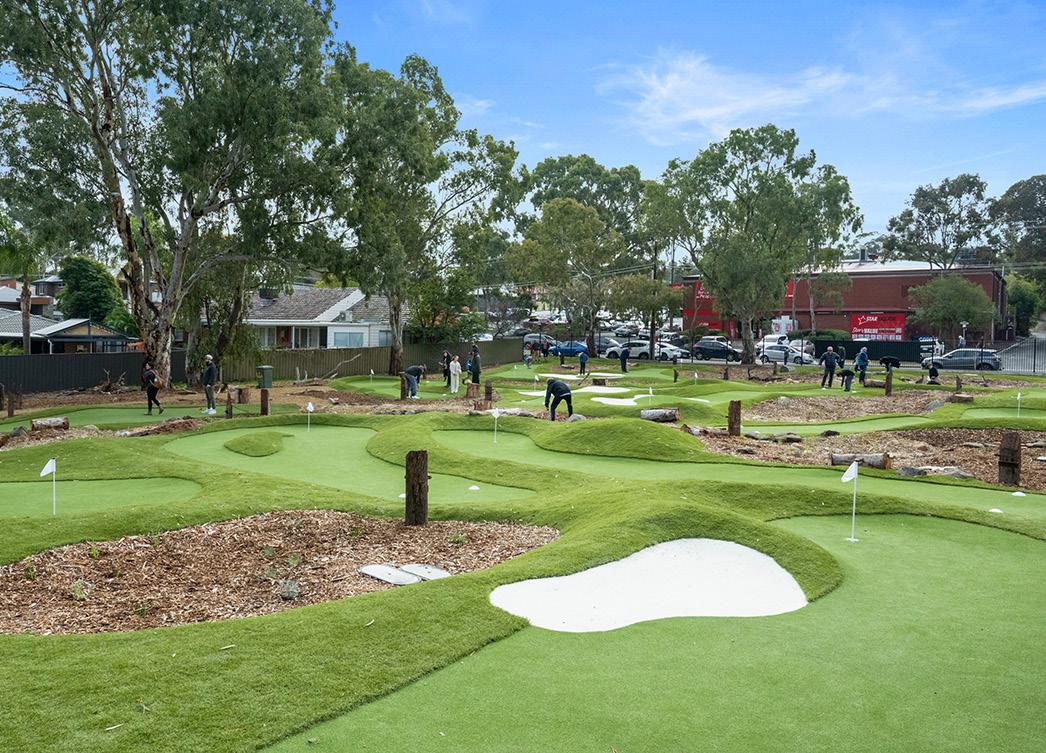
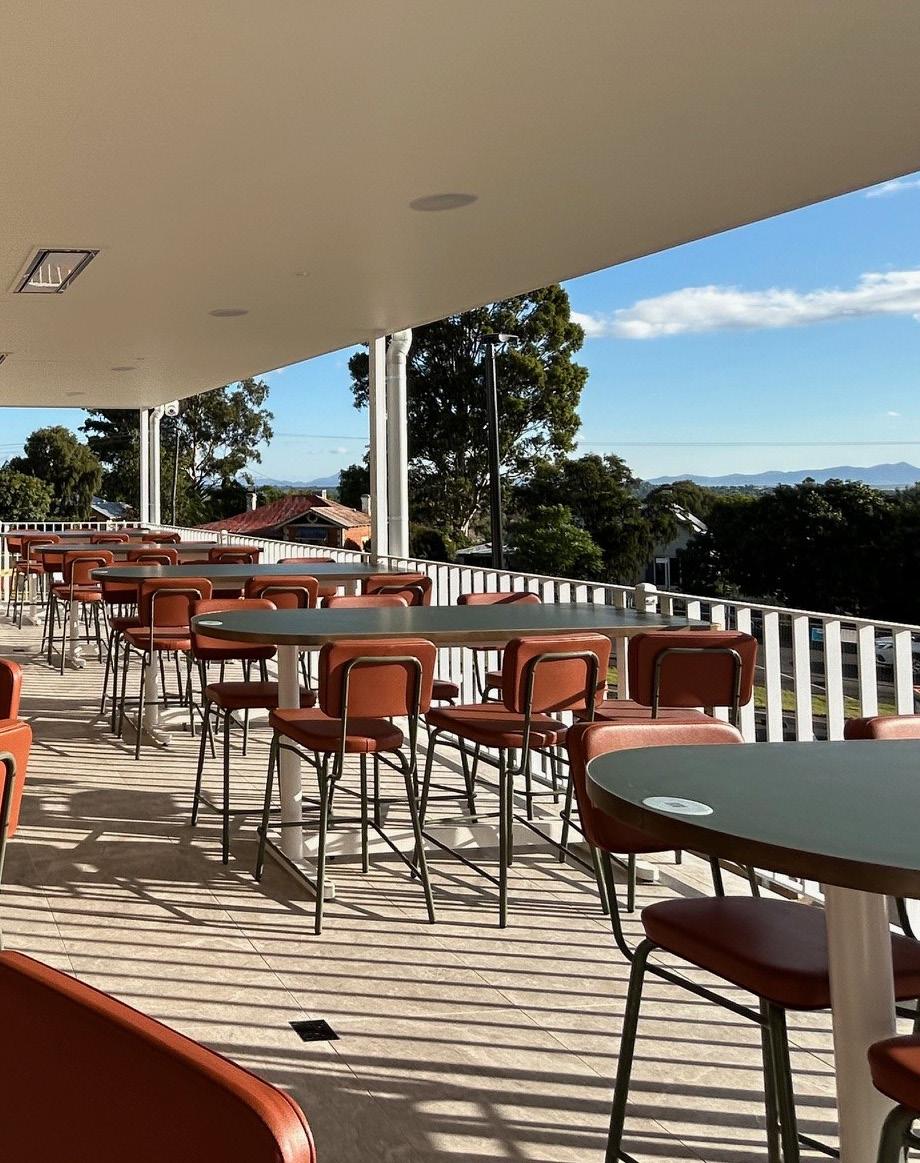
Pro tips for fresh outdoor spaces
Beyond layout and landscaping, furniture choices are evolving to meet modern expectations.
Recognised as Australia’s largest online hospitality furniture platform, Sawce noted that clubs are increasingly opting for durable, low-maintenance materials such as powder-coated aluminium, marine-grade stainless steel, and compact high-pressure laminates, paired with performance fabrics like solution-dyed acrylics that withstand fading and weather. Rope accents and recycled-plastic pieces are also gaining traction.
“There has been a movement towards longevity with outdoor furniture... these solutions offer much better corrosion resistance and UV weather resistance and became greater considerations for commercial settings,” the company said.
“Also, since Covid-19, there has been a rise in venues adding or expanding their outdoor guest experience by adding extra dining areas, gamingadjacent social zones, or event overflow areas and with an emphasis on furniture which is modular and stackable.”
But creating a great outdoor experience doesn’t stop with the furniture choice. Clubs are also learning that with increased usage comes increased responsibility for cleanliness, safety and upkeep.
“These areas are now treated as extensions of the club’s indoor experience, which means they need to look polished and always feel hygienic,” Club Clean Services CEO Brent Raper said.
Raper emphasised that regular professional cleaning plays a critical role in preserving both the appearance and structural integrity of outdoor spaces.
“Dirt, grime, mould, mildew, and pollutants can gradually break down surfaces like stone, concrete, wood, and synthetic decking if not properly maintained. Over time, this leads to premature aging, staining, and even costly repairs or replacements.”
Raper advised that professional cleaning services can not only restore outdoor areas to a like-new appearance but also protect them from longterm damage.
“By using the right equipment and environmentally safe cleaning agents, we help prevent surface erosion and extend the life of walkways, patios, furniture, and exterior structures,” he said.
“Clubs that invest in routine maintenance often find their outdoor spaces stay vibrant, safe, and inviting for much longer, saving money and reinforcing a high-quality image for their members.”
When it comes to new fitouts, thoughtful furniture choices can also enhance both practicality and guest experience. Sawce’s tip is for clubs to start with a clear vision for how the space will flow between indoor and outdoor spaces.
“Choose colours and materials to match your vision and consider the harsher requirements of outdoor furniture environments of UV, rain and corrosion,” the company advised.
“Prepare a furniture schedule listing quantities required, styles, colours, material preferences, timeframes, and price ranges. Consider the entire lifecycle of the furniture and not just the cheapest price. Ask for commercial warranties.”
Flagstaff Hill’s shorthand greens have been upgraded just in time for spring.
The terrace is fast becoming a popular seating area for visitors to The Courts at East.
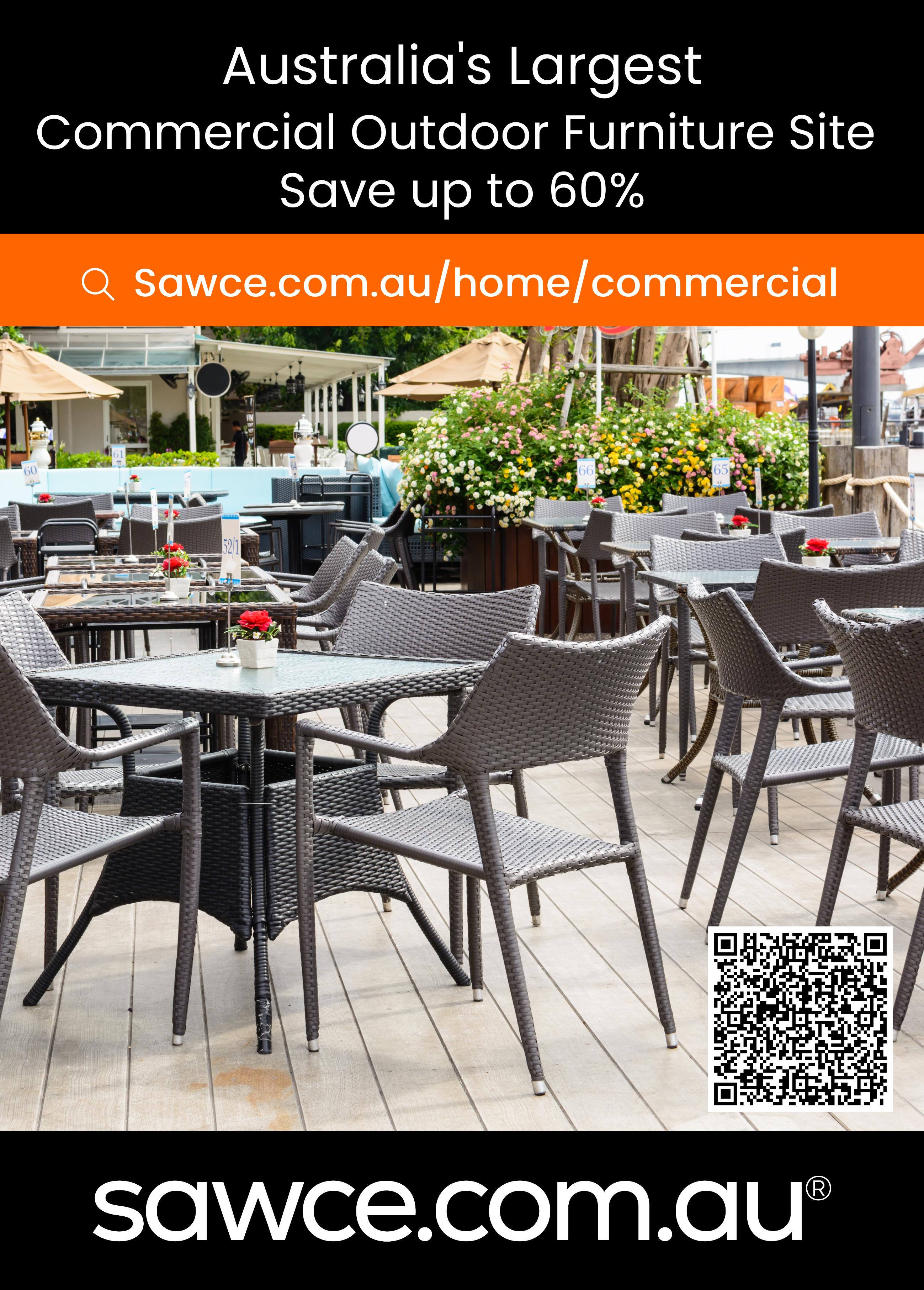
Is pickleball the new bowls?

It might not be as gentle as lawn bowls, but pickleball is gaining attention from both young and old, with some clubs now converting their greens to make way for the fast-growing sport.
THERE’S CHATTER IN the air that it won’t be long before pickleball, one of the world’s fastestgrowing sports, is recognised as an official Olympic sport. Closer to home, the sport’s popularity is also turning heads at struggling bowling clubs searching for ways to stay relevant and viable.
One of those clubs is the Cabarita Beach Bowls and Sports Club, which opened two new purposebuilt pickleball courts in early July, taking over the space of one of its existing bowling greens.
The club’s new general manager, Chris Watson, said the idea came from his predecessor, former general manager Steve Penfold, and acknowledged it was the right move.
“Diversity is the key in bowling clubs,” he said.
“You can’t survive on bread and water alone, so any new innovative thing you can introduce to your business, and if you put advertise and market it in the right way, it can only be a good thing for the future.”
Since launching, the new courts have attracted pickleball players from neighbouring Kingscliff, Pottsville and Tweed Head, and led to a spike in member numbers. Watson said, surprisingly, most players are older and “spritely for their age”, though there’s also been interest from younger people.
“There’s been a lot of excitement around us opening up here … [because] it means they can
come here and play, and then dine, which is appealing to them,” Watson said.
The move has also been warmly welcomed by existing members.
“We’re finding some of the bowlers are giving it a go,” he said. “I don’t think the bowling is being encroached upon because it’s a pretty vibrant little bowls community that is here six days a week, while pickleball is being played from 9am to 5pm.”
While those hours are likely to extend in summer and competitions will be introduced, Watson is looking to roll out pickleball as part of the club’s function offering, much like barefoot bowls.
“We are still a bowling club; we still celebrate being a bowling and sports club, and we keep to that,” he said.
“But the cost of running a bowling green is exorbitant. You’ve got clubs moving from greens to synthetic greens … you’d be lucky to make some money on that.
“The idea is we are a bowling and sports club. We wanted to offer something new, something fresh, and bring new faces to the club membership, which is exactly what it’s doing.”
While it’s still early days, Watson said there are already discussions about adding more courts.
“There is a vision for the future to put more in. We haven’t confirmed where or how, but the club is always looking at different things, including
upgrading to more pickleball courts and putting [in] three to four more courts,” he said.
“We’re not a huge club, we’re just trying to fit in a lot of things under one roof, so it’s pretty exciting times ahead.”
Embracing change
The same enthusiasm for pickleball is shared by the Orange City Bowling Club, which introduced it last November.
According to general manager Hugh Mawter, it’s been popular with those aged 20 to 50.
“People have taken to it,” he said. “We did a launch weekend and offered free coaching sessions. We had a couple of hundred through the door.”
Since then, Mawter said numbers have dipped slightly, which he attributes to persistent wet weather and the club’s regional location. He remains optimistic it will pick up once the weather warms.
Meanwhile, Warringah Bowling Club in Sydney’s north shore suburb
of Mosman had planned to sign a 12year licence agreement with Mosman Pickleball to bring the sport to the club, a proposal members voted on in April. Some 250 members attended, and 84 per cent voted in favour.
“We also found out our member base was open to change,” she said.
However, after facing potential noise complaints from neighbours over hardcourt surfaces, the club decided to launch with grass pickleball instead. Half of its bowling greens are now being used for four pickleball courts.
General manager Liarne Peek said the idea came to her after a conversation with her uncle.
“I have an uncle in his 70s, and they were saying how they have to wait six weeks to play pickleball, they can’t get a court, they love this sport. You’re in your 70s and you’re playing pickleball?”
She added the decision to introduce pickleball came out of necessity for the club’s long-term survival.
“Diversity is the key in bowling clubs … any new innovative thing you can introduce can only be a good thing for the future.”
Chris Watson, Cabarita Beach Bowls and Sports Club general manager
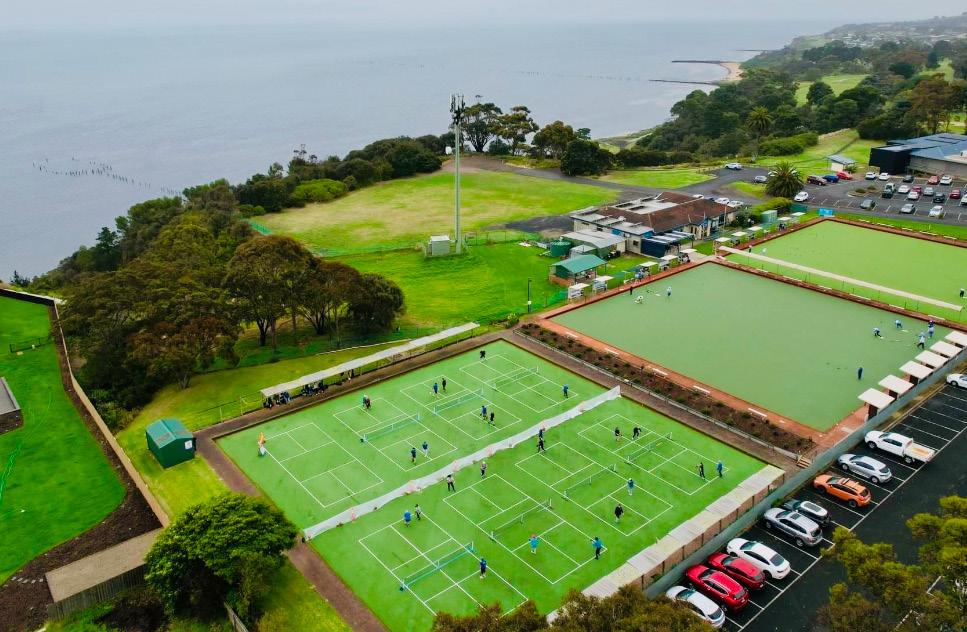
Pickleball FAQs
We checked in with the experts, Pickleball Australia, to get the low-down on what all the fuss is about.
What is pickleball?
Pickleball is a paddle and ball sport. Using a paddle and plastic wiffle ball, played on a hard surface indoors or outdoors, the game is a combination of tactical shots, patience, and easyto-learn strokes, which encourages an inclusive play environment with no need for modifications or adaptations to cater for gender, ability or age differences.
Pickleball is both fun and challenging with a combination of long rallies and a blend of soft and rapid fire shots; where the best athlete must earn their points not purely by athleticism, power and speed, but also through the use of positioning, patience, tactics and touch.
Where did it originate from?
In the summer of 1965, pickleball was founded by Joel Pritchard, Bill Bell and Barney McCallum on Bainbridge Island, Washington. Within days, Joel’s wife, Joan Pritchard, had come up with the name “pickle ball”—a reference to the thrown-together leftover non-starters in the “pickle boat” of crew races.
Who’s playing it?
Pickleball Australia members range from 8-90 years old, with 50 per cent of participants over the age of 55.
Why is it so popular?
Easy to
learn
Highly inclusive
Encourages intergenerational activity
Fun, social and competitive
Offers a range of identified mental, physical, and social wellbeing benefits
One out of three bowling greens at Clifton Springs Bowling Club have now been subleased to the local pickleball association.
“When I took over two and a half years ago … we weren’t making inroads in any particular direction and we needed to sit down and look at what we needed to do to fix the underlying problem of how to become more relevant in our community,” she explained.
The plan is to eventually resurface half the bowling greens with synthetic grass, which Peek says will be easier on the joints and suitable for multi-sport use, including pickleball, spec tennis, croquet, bocce, and recreational activities like yoga, Pilates and tai chi.
There are already signs it’s working.
“We had two courts marked up a couple of weeks ago, and we were out there testing out different balls. The number of people walking down the street and into the club and asking, ‘Can I have a go? How do I book?’
“My bowlers are now getting into pickleball. The bowlers do their social bowls, and then half of them stayed and played for another two hours.”
A grassroots revival
At Clifton Springs Bowling Club near Geelong, the pickleball surge prompted a creative and mutually beneficial partnership. The club was approached by the local pickleball group two years ago after their games outgrew court availability at the nearby primary school. With three bowling greens on site – one of which sat unused for years – it made sense to offer the space.
“I’ve been here for eight years, and in that time, I only saw it used once. It was basically sitting there doing nothing,” club president Eddie Kostrz said.
The club and the local pickleball club entered into a memorandum of understanding that allowed part of the councilowned land to be subleased to the pickleball club, on the condition
“We needed to sit down and look at what we needed to do to fix the underlying problem of how to become more relevant in our community.”
Liarne Peek, Warringah Bowling Club general manager
that all players become social members.
“What that did was take our membership up by about another 170-odd people,” Kostrz said.
Up until now, players have been using the original bowling surface, but plans are underway to upgrade the surface to “tournament-grade courts”.
“[The greens] are not giving enough bounce and they want extra bounce. They’re in the process of asking for a grant to do that and are working out a business plan for it,” Kostrz said.
While the arrangement has delivered immediate benefits, Kostrz sees a bigger picture.
“Our members are getting older, so we’ve got to think about how we’re going to get new members in. That’s an exercise we’re working through at the moment.”
Kostrz admitted that attracting younger bowlers remain a challenge, but he sees potential crossover.
“The average age of a pickleball player is about 60. Our average age is 72. So hopefully, once they move away from pickleball, they might come and join bowls,” he said.
According to Kostrz, a majority of bowls players welcomed the idea of introducing pickleball to the club.
“What I’m trying to do is to make sure we meet each other in the centre, to enjoy what we’ve got, and get to know each other a bit better.”
Kostrz said embracing new additions like pickleball is essential for survival.
“We’ve got to think outside the square about how to make money,” he said. “That’s what a lot of clubs have to do if they haven’t got pokies, otherwise, they’re not going to be around for long.”
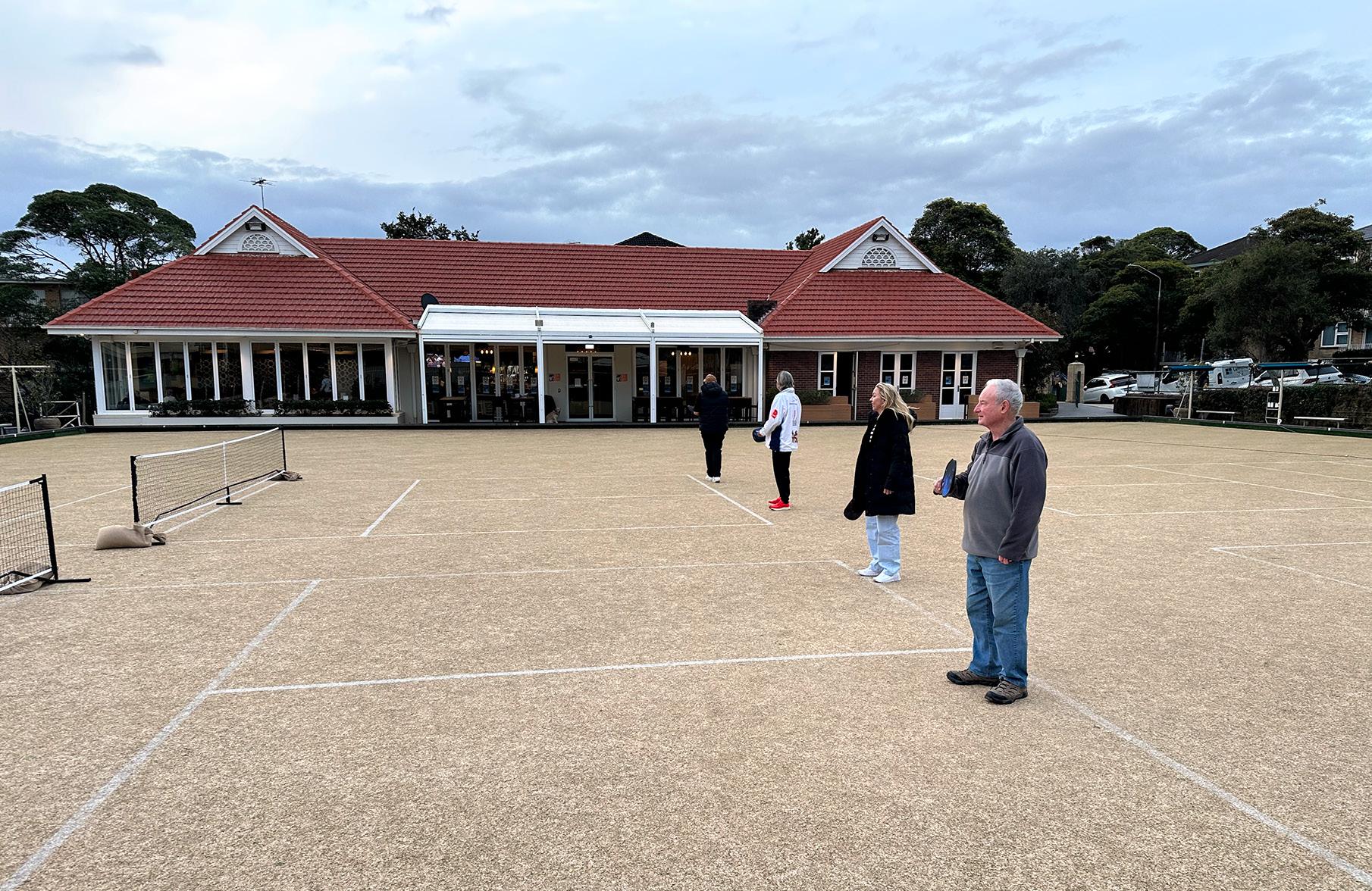
Warringah Bowlo members have embraced the addition of pickleball to their club.

GREAT COFFEE

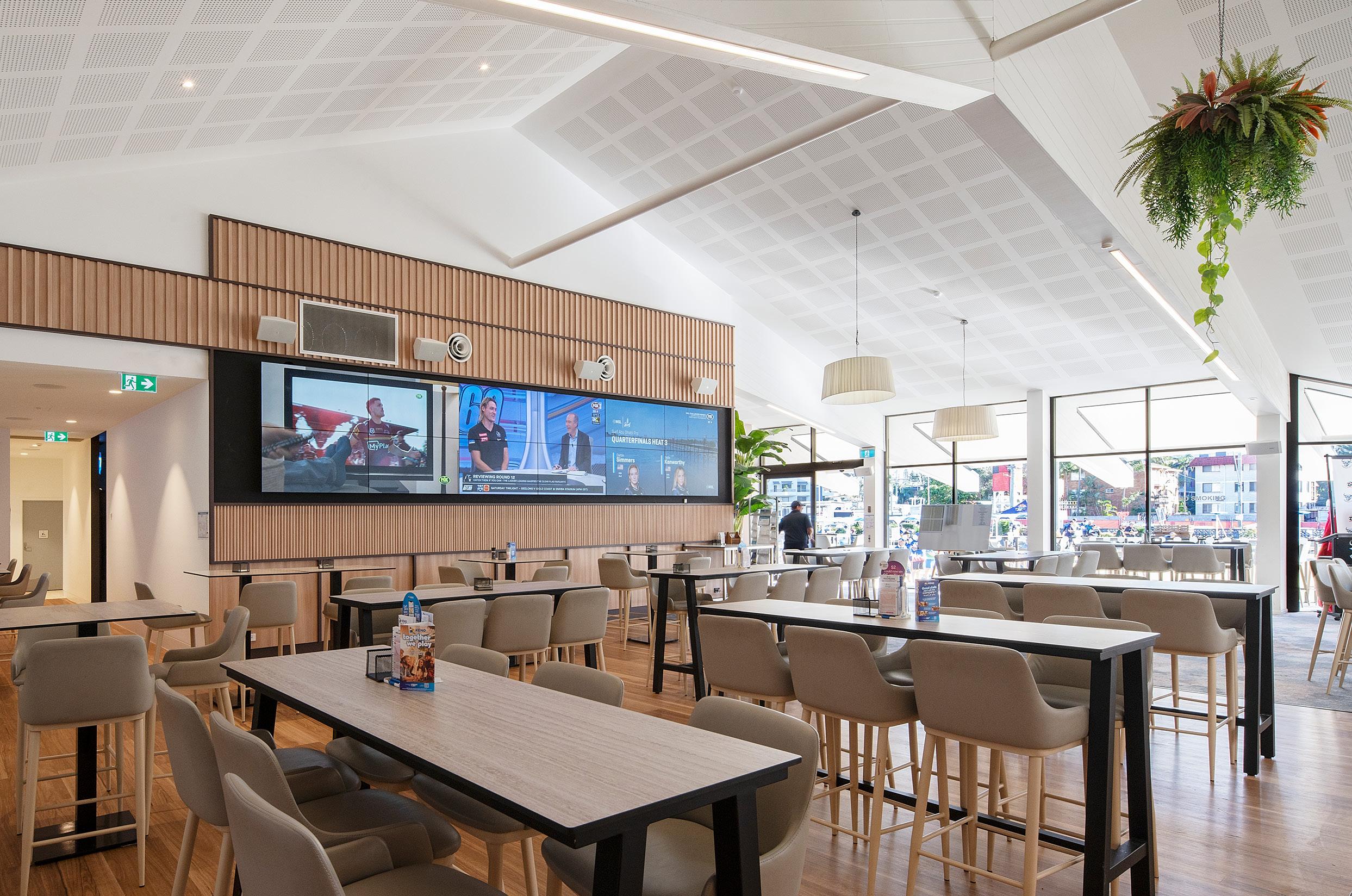
Polished for play
It was a race to the finish for Broadbeach Bowls Club to complete its $5 million upgrade ahead of the biggest event on the Australian bowls calendar.
BY THE TIME the first bowl was delivered on 7 June for the Australian Open, the dust had barely settled on Broadbeach Bowls Club’s renovation.
The final pieces of the extensive 18-month makeover came together just days before the nation’s largest bowls tournament kicked off.
“We kicked off renovations around late February and it was finished just before the start of the bowls tournaments in June,” said general manager Simon Neale.
This year’s event saw a record 4,200 bowlers descend on the Gold Coast, with Broadbeach Bowls Club serving once again as the official home of the tournament and host of the finals. The pressure to be ready was immense, but for the club’s leadership team, the tight deadline was just part of a broader vision to modernise the much-loved beachside venue.
With sweeping views of both the ocean and nearby CBD, Broadbeach Bowls Club has seen it all. But nearly 75 years since opening, the venue was long overdue for a refresh.
“It was outdated,” said Neale. “We really have brought the club into the modern era.”
Neale joined the organisation as part of a broader leadership refresh just as construction began. Together, they made a series of strategic updates to the original plans, ensuring the works weren’t just about aesthetics but about futureproofing the club.
“We picked it up and ran with it and continued making our own strategic changes to that renovation,” he said. “We’re really, really happy with the outcome.”
Staged to succeed
The first phase of construction began in early 2024 and involved a major overhaul of the eastern side of the venue. This included the addition of a new alfresco deck, bar, locker room, bowls office and bathrooms. The redesigned alfresco area, in particular, has proven especially popular with both members and guests.
“It was an alfresco area, but it was on the
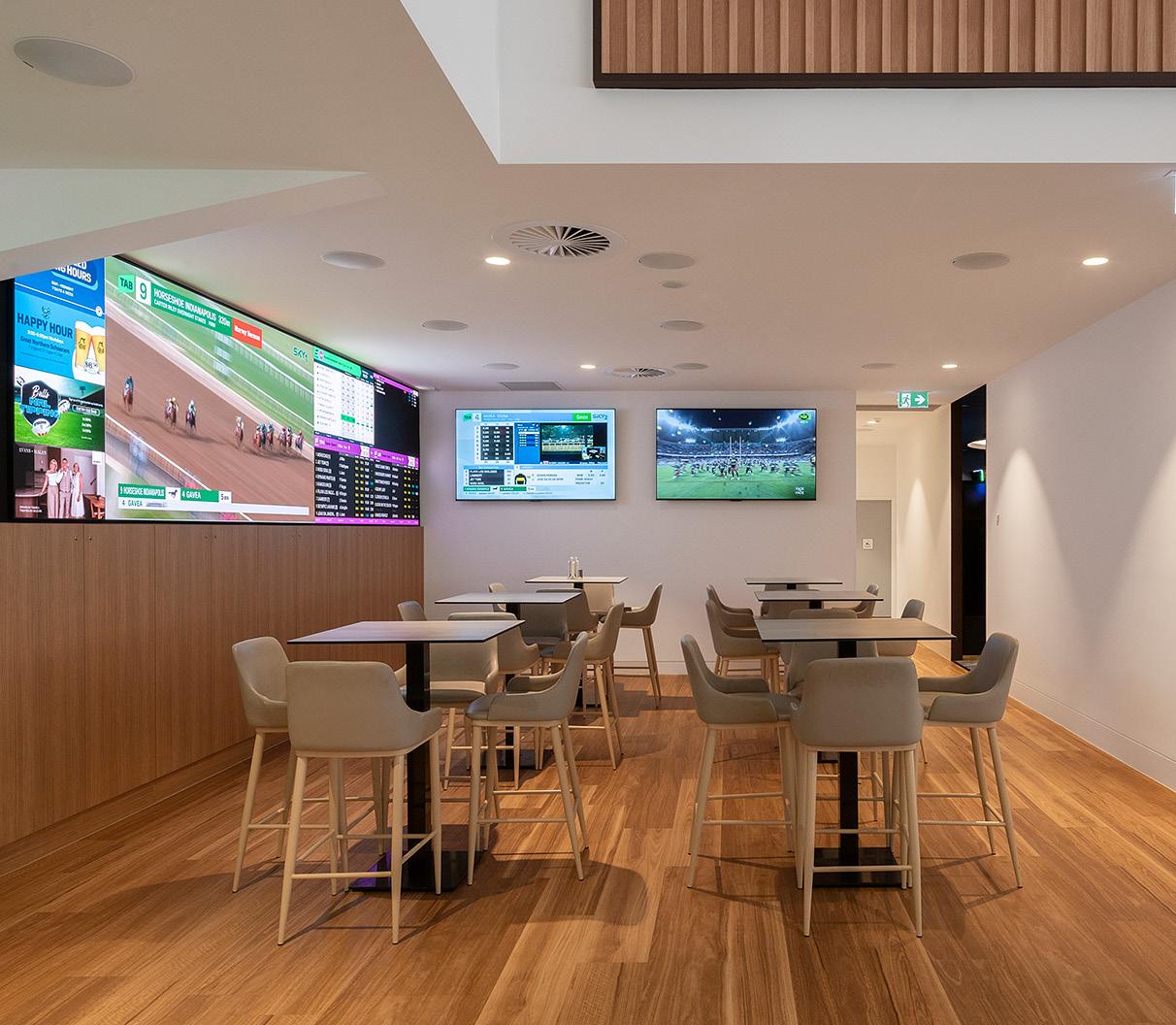
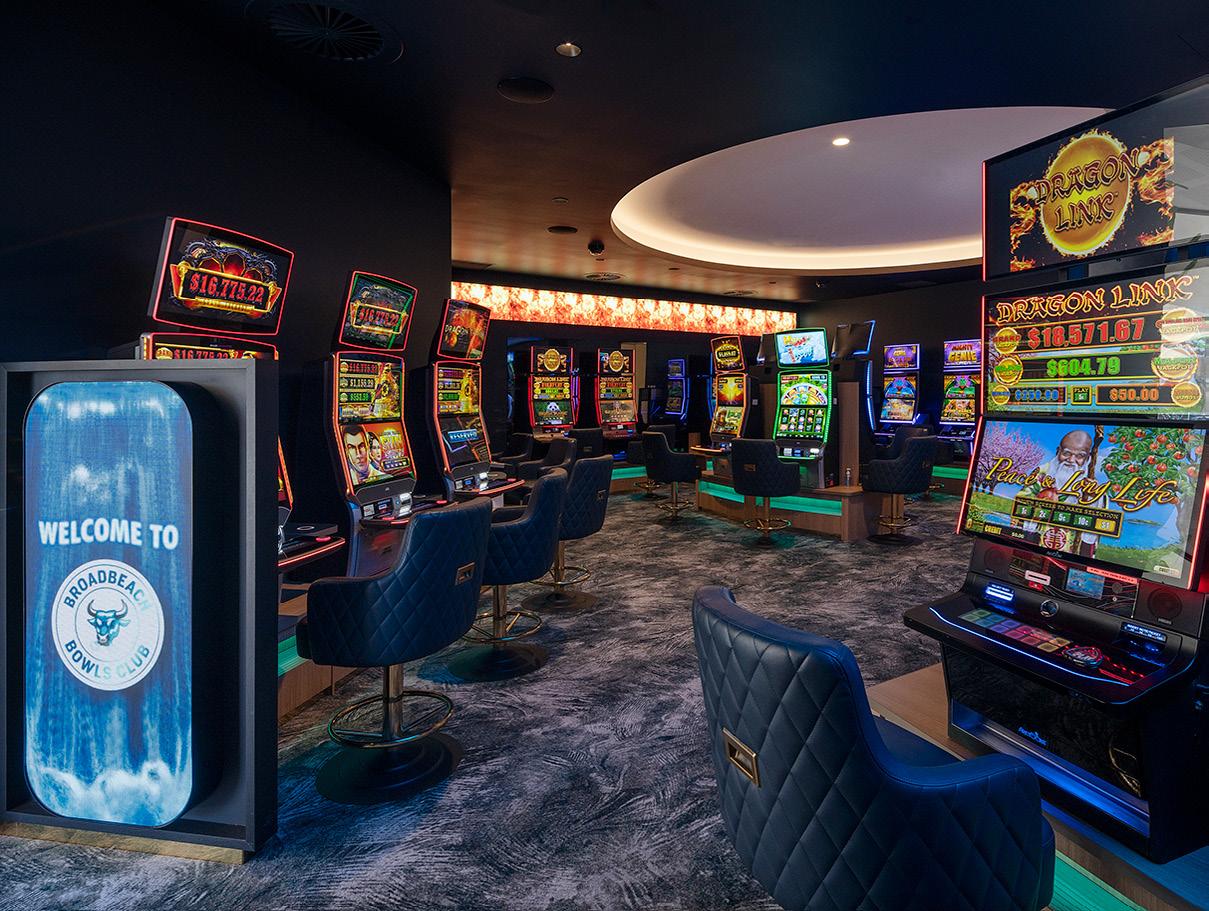
ground level,” Neale explained. “What we’ve done is raised the deck area in line with the rest of the bistro and the club. It’s now an amazing function area that’s great for gatherings and corporate groups.”
The first stage of renovation wrapped up just in time for the 2024 Australian Open.
“We finished knowing that’s our busiest time of the year,” Neale said.
Undeterred by the tight timeframe of stage one, the club followed a similar timeline for stage two of the renovations. Kicking off in February 2025, this phase focused on the western end of the building and was delivered in just 12 weeks.
This final stage included a full refurbishment of the gaming room – or as Neale puts it, the club’s “engine room” – as well as the reception and main foyer, and TAB and sports lounges.
“The gaming room was again pretty tired and needed some love, and it was a high priority,” Neale said. “The gaming room has seen the biggest change. The sports and TAB
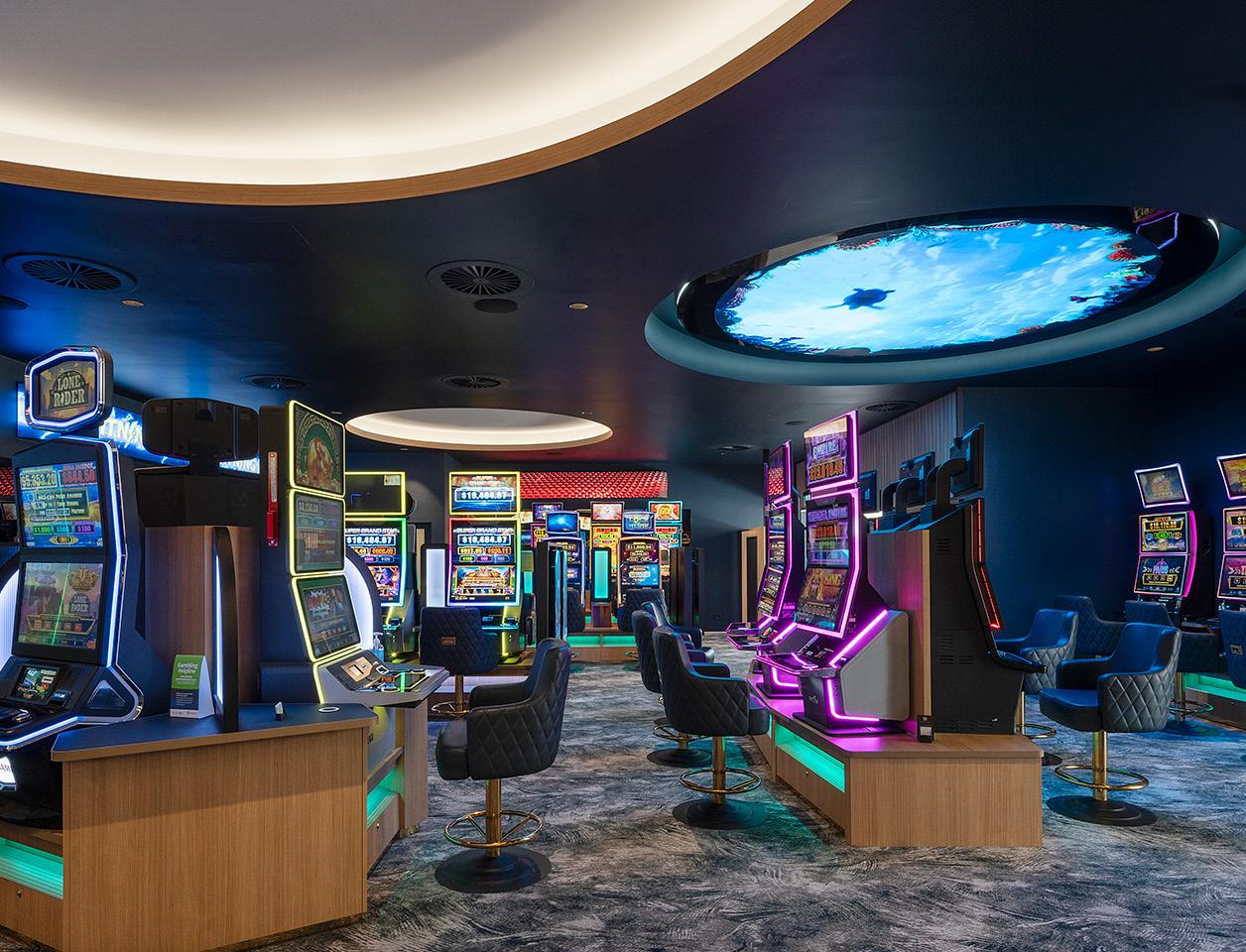
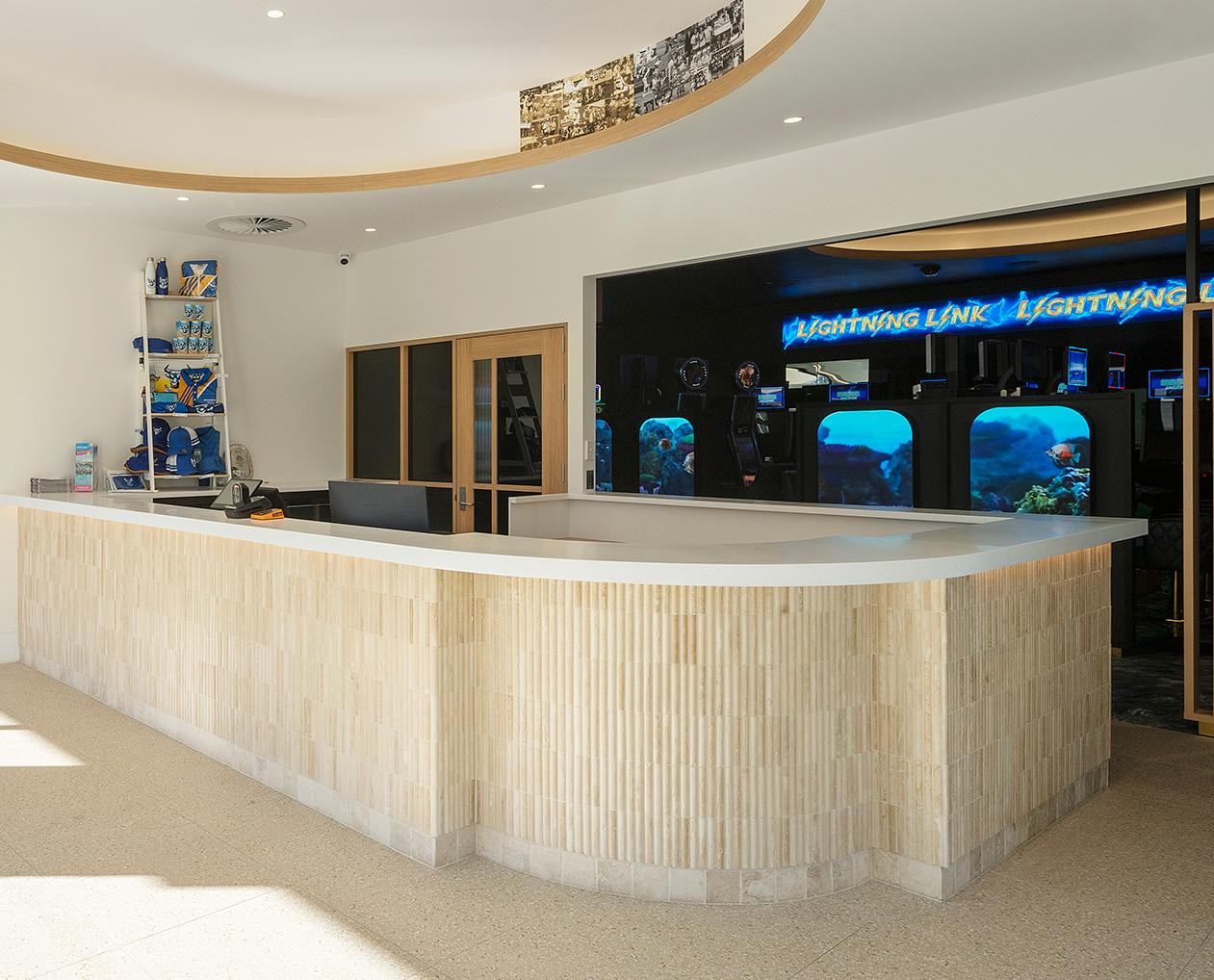
dual lounge is now pretty inviting, and there’s something for everybody.”
Architecture firm David Raby Architects led the redesign, working alongside Rohrig Construction to deliver the new look. The result is now a light-filled, modern venue that combines comfort, functionality and architectural flair, including curved timber walls, recessed lighting, and warm textures.
In total, the project pushed towards the $5 million mark, a significant investment for a club that’s landlocked.
“We obviously tried to utilise the space as efficiently as possible,” Neale explained.
The finished product is not just a venue that looks modern but it’s now a space that works hard for its community, offering something for everyone from diehard bowlers to social visitors.
“It’s an amazing facility for [members] to call their own,” said Neale. “The club is now in an amazing position.”
“We really have brought the club into the modern era.”
Simon Neale, Broadbeach Bowls Club general manager
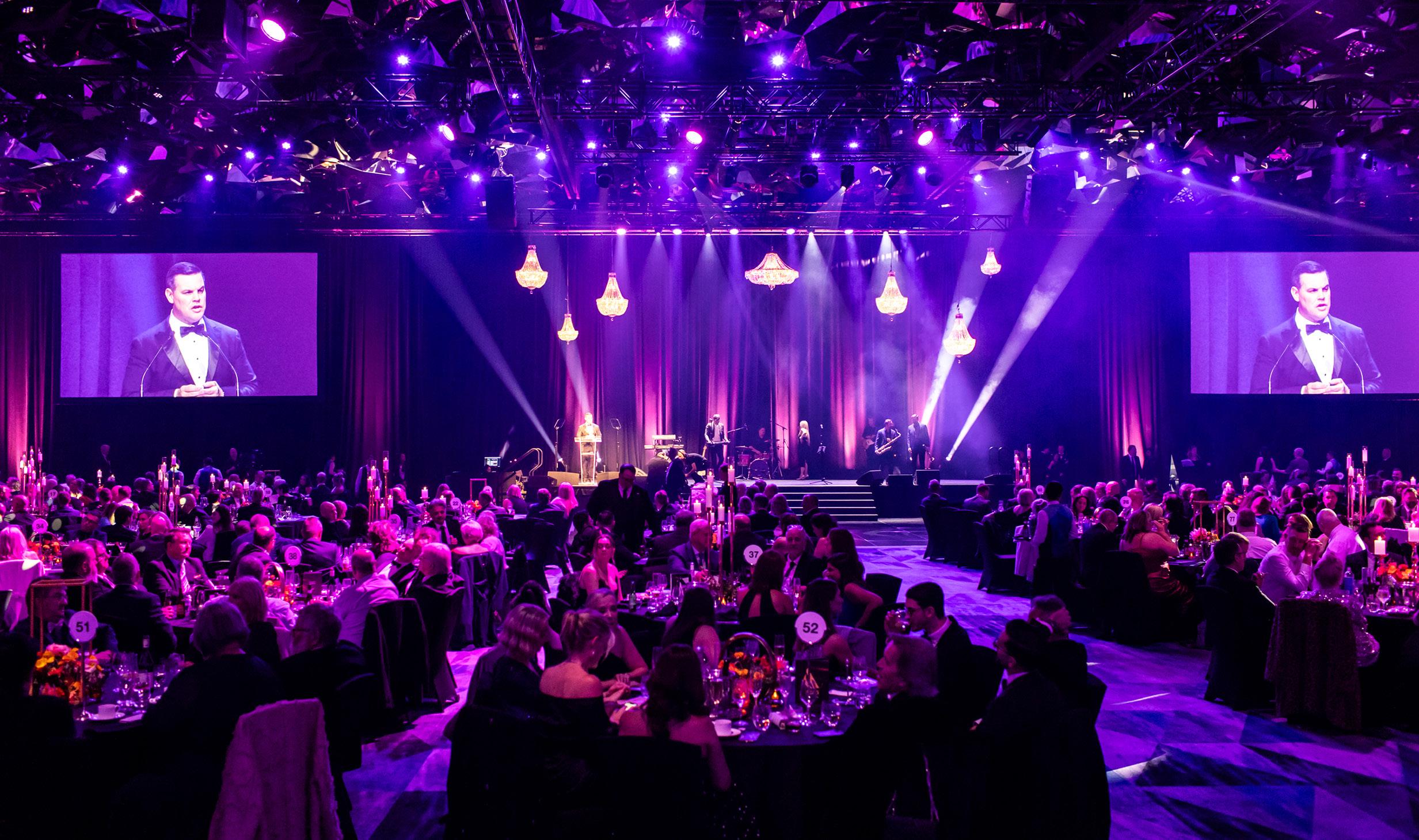
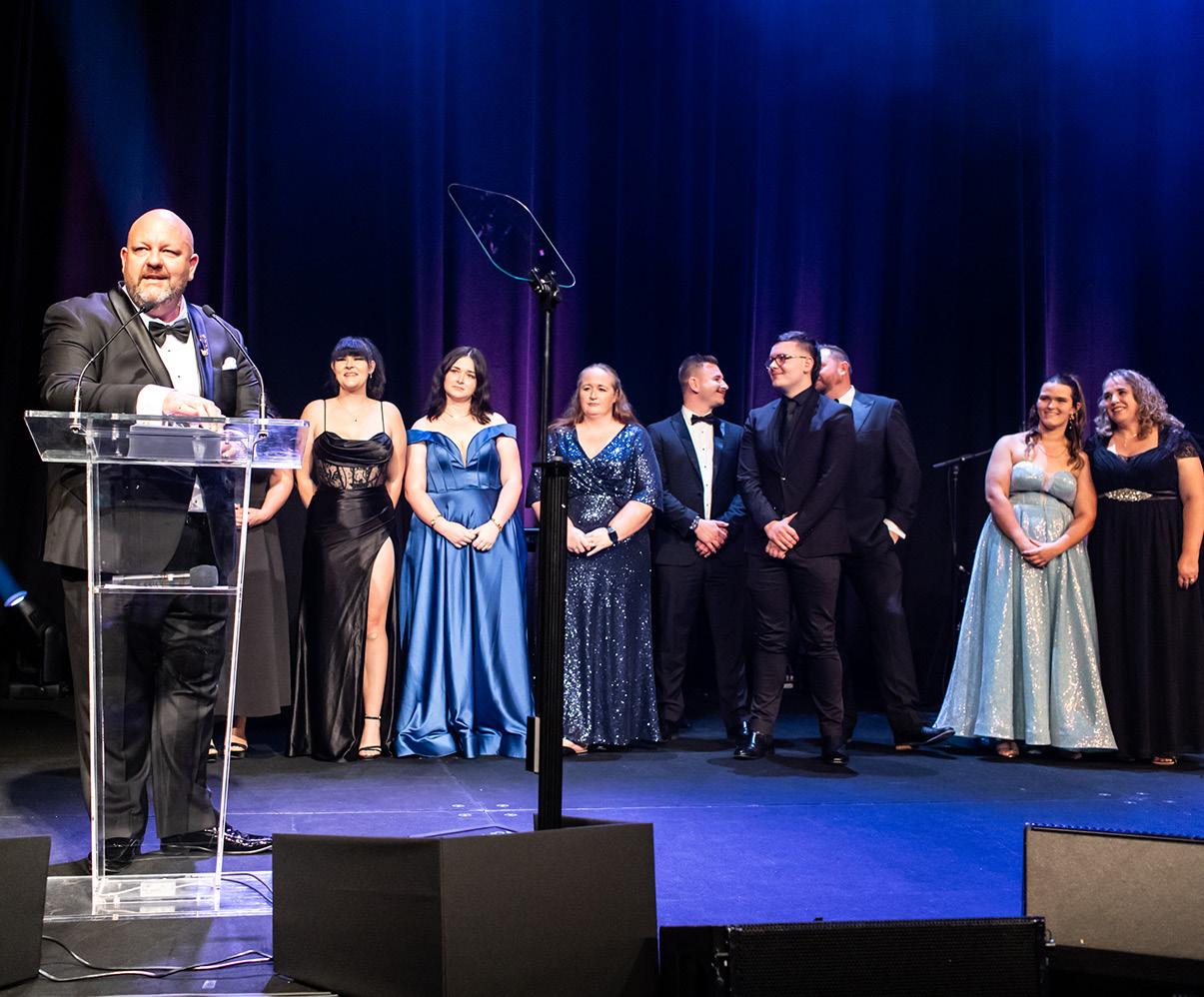
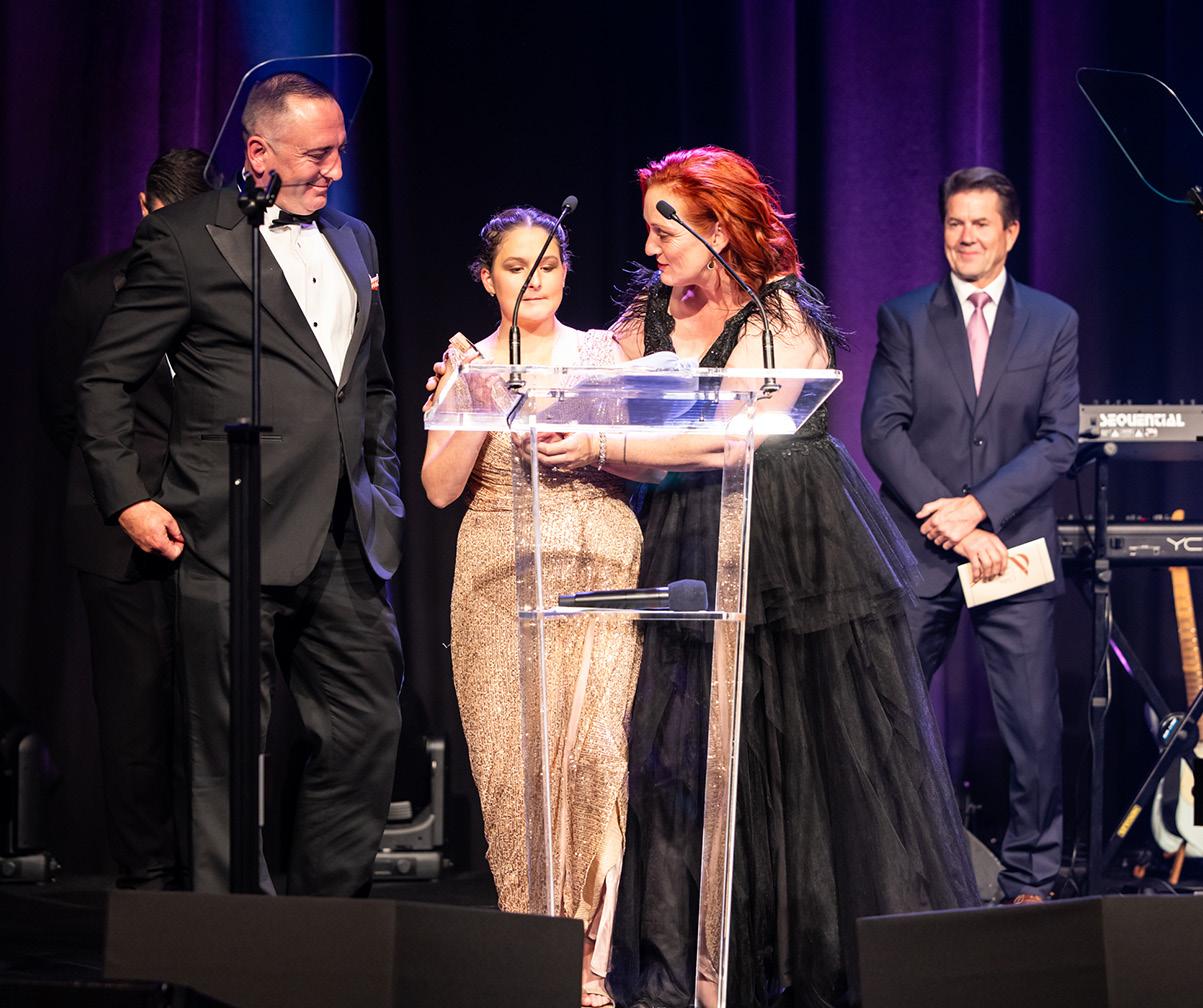
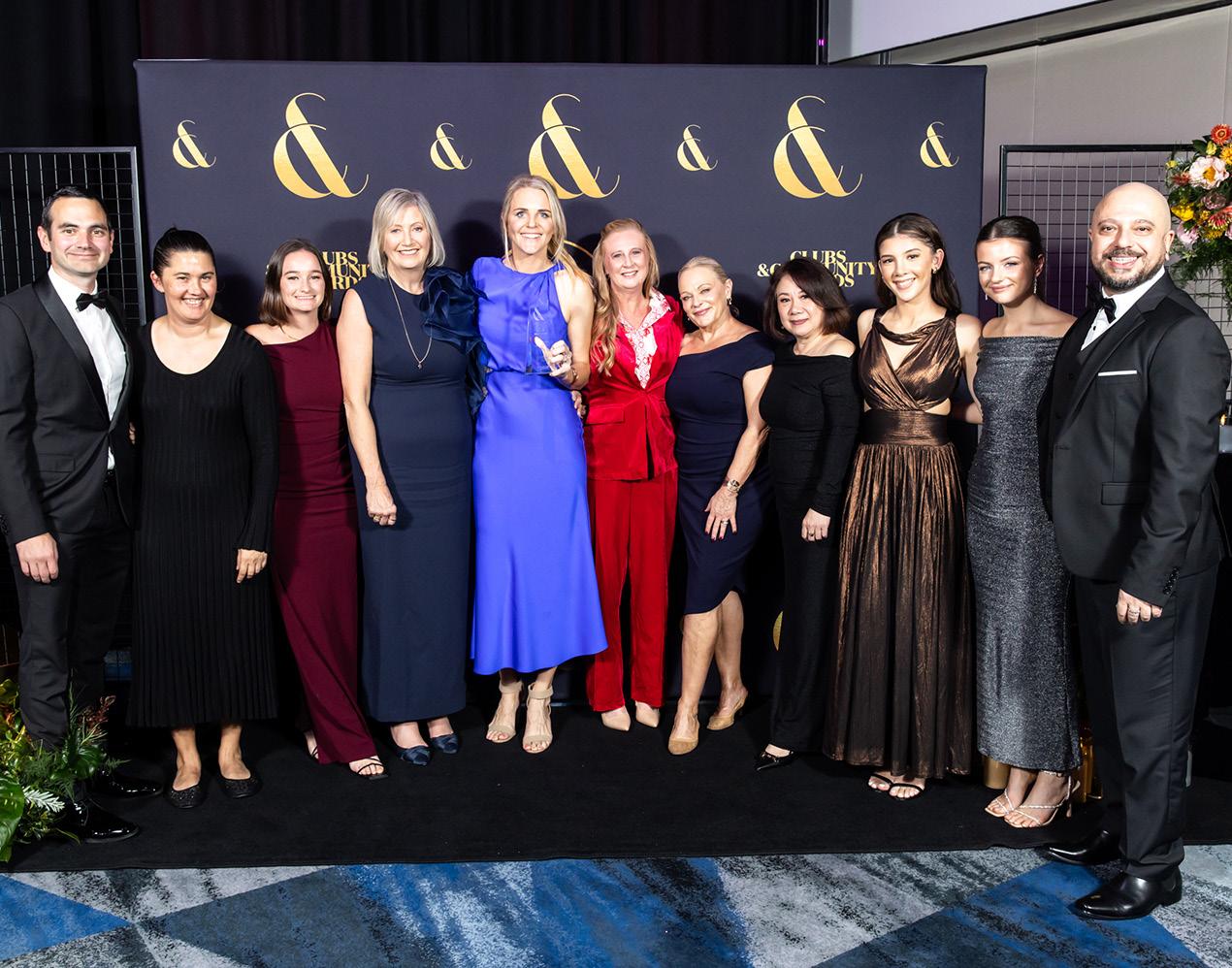
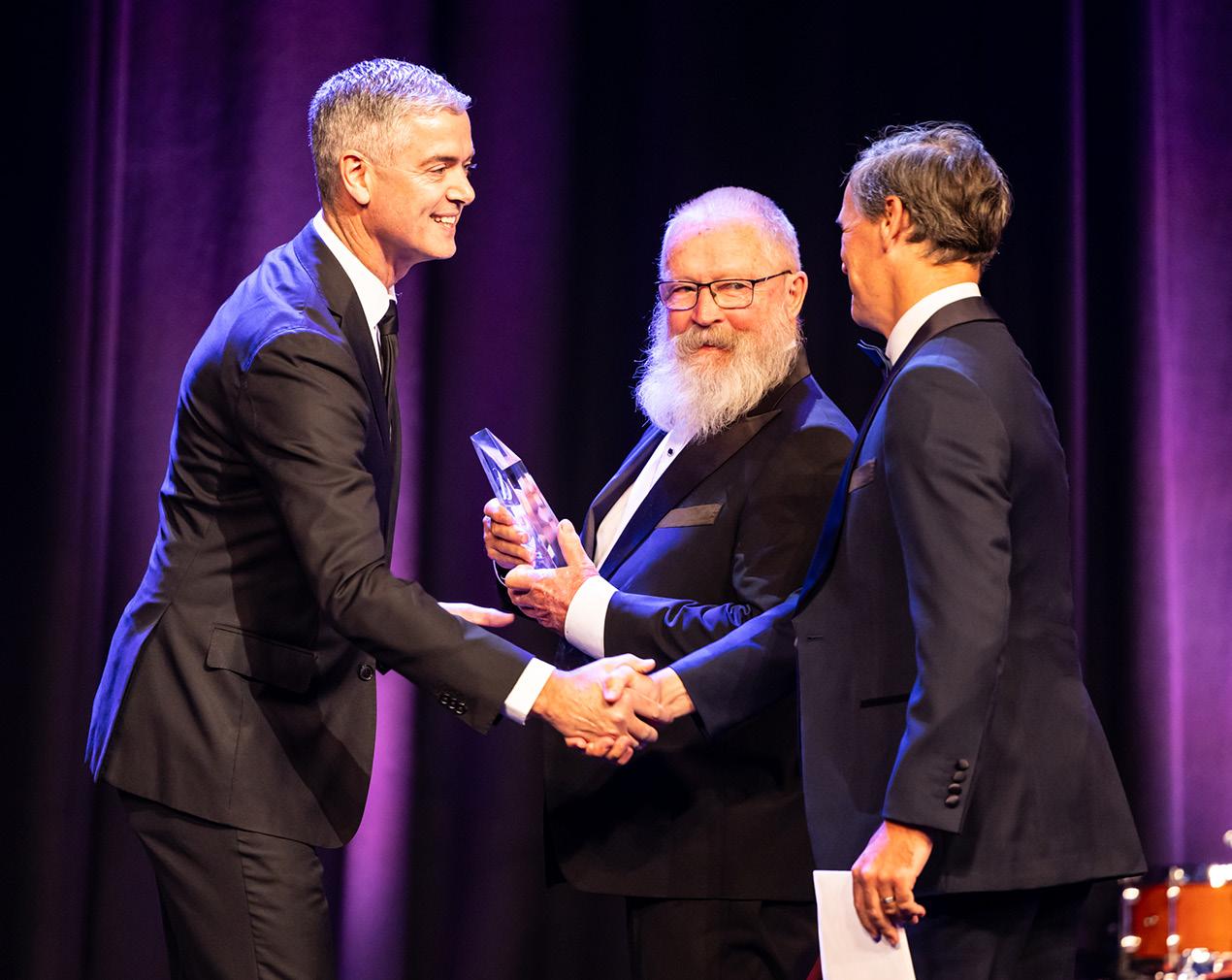
Club Taree was one of two winners of the Heart of the Community Award.
The Formal Project founder Sam Oakes worked with Wests League Club to ensure no child is left behind.
Ramsgate RSL was recognised for its Feeding Local School Projects.
Mounties board member Denis Byrne (pictured centre) accepted the club’s award in the Arts, Culture and Entertainment category.
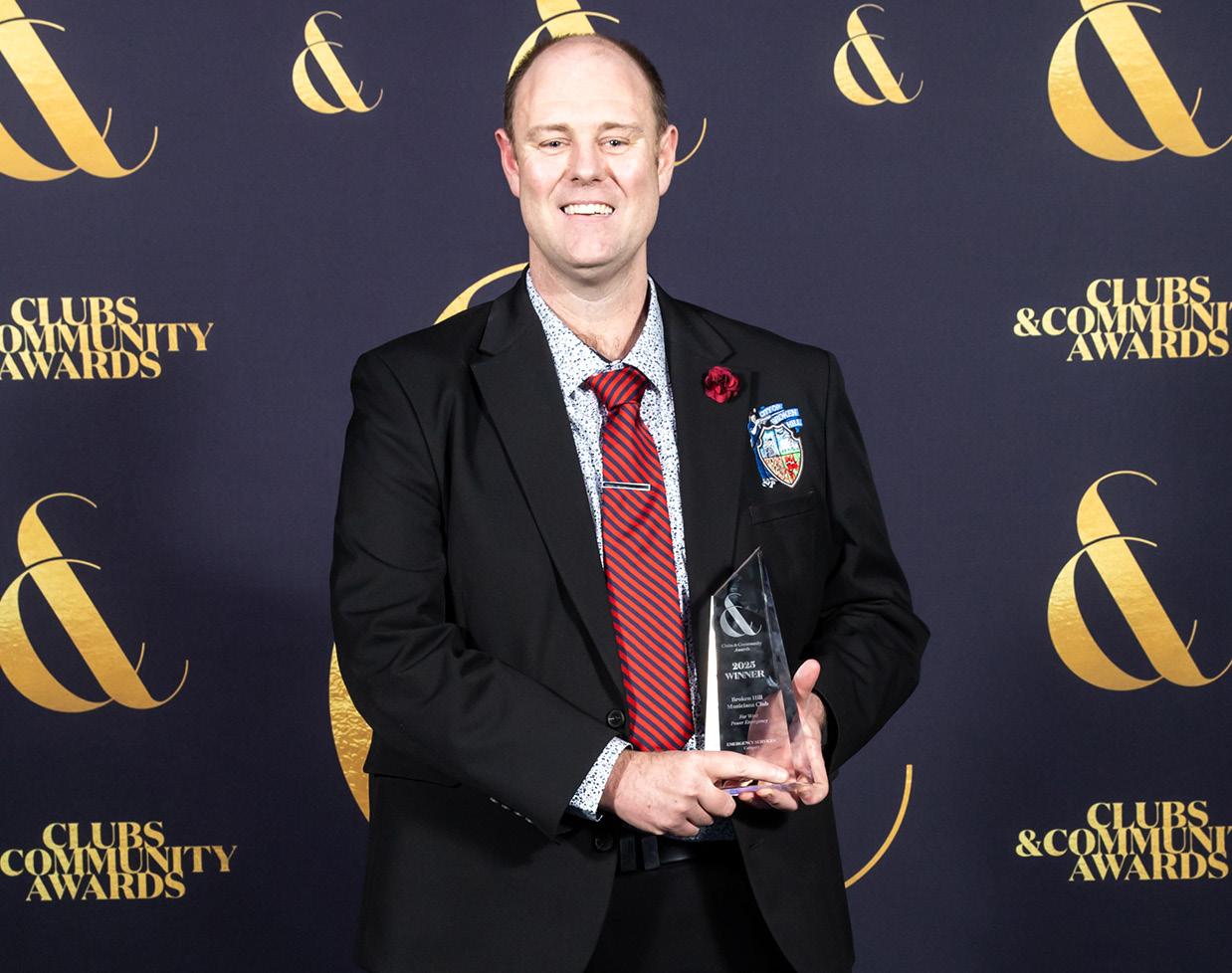
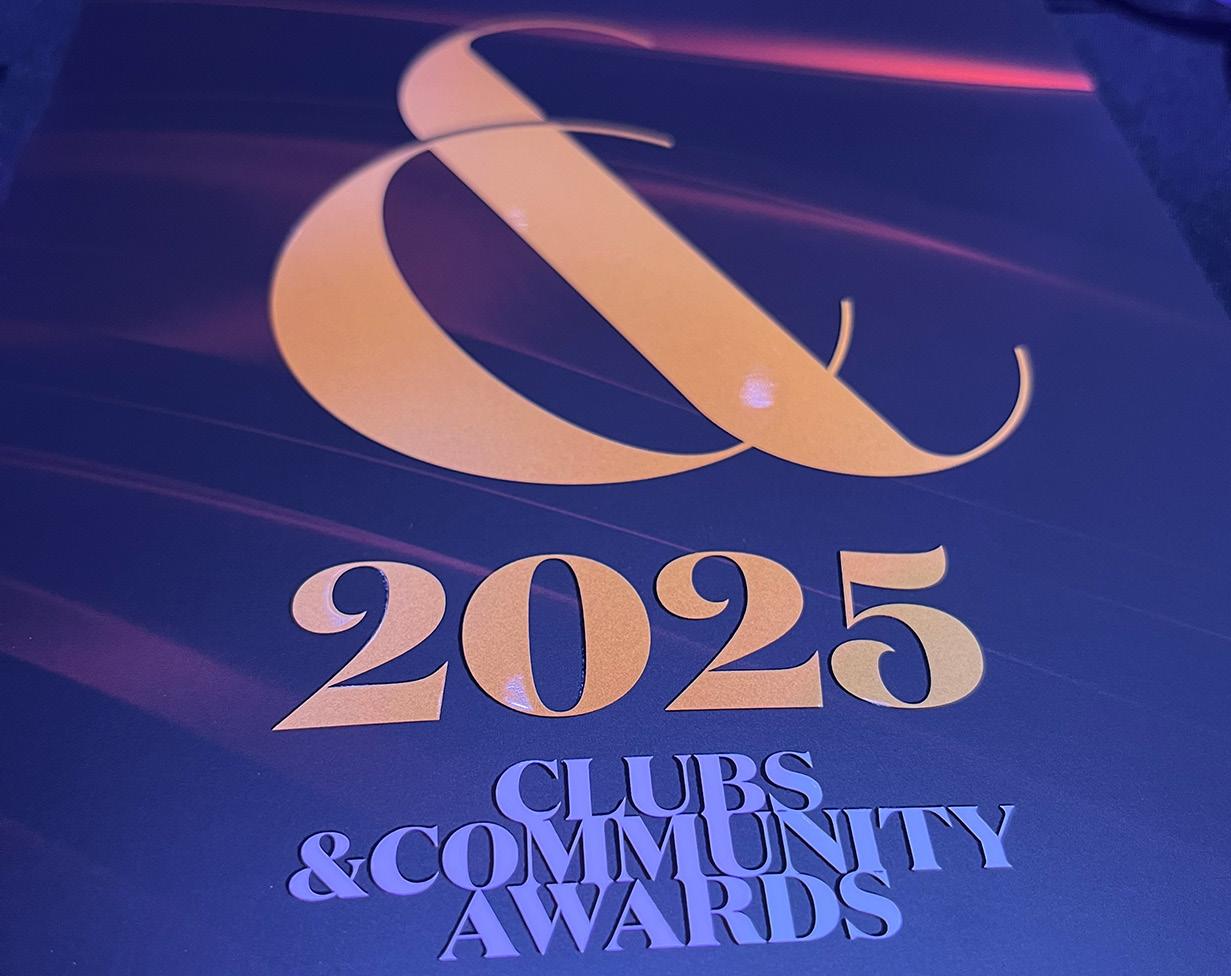
NSW clubs recognised for making a difference
Clubs from across NSW celebrated top honours at the 2025 ClubsNSW Clubs & Community Awards Night on Thursday 19 June at the ICC Sydney.
MORE THAN 900 guests filled the ballroom for the black-tie event, including Minister for the Night-Time Economy John Graham, Minister for Jobs and Tourism Steve Kamper and Shadow Minister for Gaming and Racing Kevin Anderson.
The annual event honours the incredible ways registered clubs give back to their communities. This year, winners and highly commended finalists were celebrated across nine categories: Arts, Culture & Entertainment; Education; Emergency Services; Environmental Sustainability; Fostering Grassroots Sport; Health Care; Heart of the Community; Mental Wellbeing; and Social Inclusion.
ClubsNSW CEO Rebecca Riant said the record number of finalists in 2025 reflected the depth of commitment from clubs across the state.
“Clubs exist to make their communities a better place to live and that was certainly on show last night, with the causes they’ve championed over the past year truly inspirational,” said Riant.
“We had a record number of finalists in 2025 – 142 all up –so the judges had their work cut out for them separating the outstanding from the extraordinary. I’m incredibly proud of our industry, with clubs again showing their unwavering commitment to shaping and strengthening local communities.”
Several categories had joint winners, highlighting just how competitive and impactful the entries were. The Healthcare award was shared between Wagga RSL and Bankstown Sports; Club Taree and Revesby Workers’ Club took home joint honours in the Heart of the Community category; and the Social Inclusion award was shared by Wests Leagues Club and South Tamworth Bowling Club.
For Club Taree, it marked the third time in seven years it has won
the Heart of the Community category. Club Taree CEO Paul Allan took the opportunity to acknowledge the team behind the club’s ongoing work.
“I’m so incredibly proud of them and the people that they represent,” he said. “I’m so blessed to have such an amazing team doing amazing things, who just say yes, say ‘How can I go?’ Say, ‘How can we make that better?’”
Another standout on the night was Broken Hill Musicians Club, which took out the Emergency Services award. CEO Michael Boland accepted the honour and called on the government to formally recognise the role clubs play during crises.
“When there’s an emergency, they go to your local club … and that’s what this industry does all the time,” he said. “People don’t call emergency services—they don’t trust them—they call your local club, because that’s what we do.
“I gave evidence to the parliamentary inquiry into the power outages in Broken Hill, and one of the recommendations was to officially recognise clubs as emergency evacuation centres. Even if they’re not listed, that’s where our community goes. And I’m calling on the government to make sure they will officially recognise this industry—the clubs that do so much for their community—as a first point of evacuation. Because that’s what we do.”
The night also raised funds for flood recovery efforts on the MidNorth Coast, with proceeds from the night will support clean-up efforts at the Taree Aquatic Club, which was recently damaged in severe weather.
Turn the page for the list of winners >>>
Michael Boland from Broken Hill Musicians Club
And the winners are:
Arts, Culture & Entertainment
Mounties
Empowering Voices: The Fairfield Fashion Runway Project
Mounties Group contributed over $36,000 through ClubGRANTS to the Fairfield Fashion Runway Project, created in collaboration with Think+DO Tank Foundation. The July 2024 event saw more than 60 refugee women showcase their creations in a public fashion parade. The products were then sold through community channels, creating economic pathways for the women to support themselves.
Education
Windsor RSL
Empowering Young Lives: Expanding First Aid Education
Windsor RSL Club launched the “Empowering Young Lives: Expanding First Aid Education” initiative to equip Stage 3 primary school students in the Hawkesbury region with essential life-saving skills, such as first aid education. It has impacted over 500 students.
Emergency Services
Broken Hill Musicians Club Far West Power Emergency
On 17 October, 2024, a severe storm south of Broken Hill destroyed seven transmission towers, leaving the Far West of NSW dependent on a single backup generator. After four days of power disruptions, the generator overheated, causing a fire. The Broken Hill Musicians Club quickly became a refuge, providing essential services like food, water, and charging stations. When emergency communications failed, the club helped secure a generator for a lifesupporting device.
Environmental Sustainability
Ramsgate RSL
Feeding Local Schools Projects
Since launching the ‘School Care Project’ in 2019, Ramsgate RSL has donated $50,000 to 13 local schools, supporting projects that enhance community engagement and environmental sustainability. Notable initiatives include water-efficient bubblers, edible gardens, waste recycling programs, and bike racks.
Fostering Grassroots Sport
Wests Illawarra
Grassroots Sport is Community Strong
In 2024, Wests provided $490,000 to 16 local clubs. Its funding has delivered playing kits for 400 junior rugby league players, expanded women’s cricket by 333 per cent, and helped Wests Devils Rugby League claim multiple premierships. Wests’ investment has also led to record participation: Unanderra Hearts Football Juniors grew from 382 to 547 players, Kembla Joggers saw a 25 per cent increase in Athletics NSW events, and Wests Darts Club doubled its teams.
Health Care
Wagga RSL
Bowlers Dig Deep for Children’s Ward
In December 2024, the Wagga RSL Men’s Social Bowling Club donated $12,000 to the Children’s Ward at Wagga Base Hospital. The donation stemmed from a 2024 initiative where the bowlers raised $6,000 through raffles, pie sales, and BBQs, with the RSL Board matching it dollar for dollar. The funds purchased play therapy equipment and supported staff education.
Bankstown Sports Club
The Great Sandwich Make-Off
With one in five Aussie kids experiencing hunger, Bankstown Sports has committed to feeding local school children through ClubGRANTS funding, but also rolling up the sleeves, buttering bread and delivering much needed nutritional sandwiches to local schools.
Heart of the Community
Club Taree
Staff Bring Cheer and Companionship to Locals
Each month, Club Mudgee staff donate their tips to various charities, and in December, they chose to support the Mudgee Combined Churches Christmas Luncheon & Hamper Drive. The staff raised $1469.16, with an additional $428.80 post-Christmas, funding 30 extra hampers for those in need. The Christmas luncheon hosted 70 guests, offering a meal, dessert, and drinks.
Revesby Workers’ Club
Biyani House - Revesby Women’s Shelter
Since 2021, the club has provided more than $370,000 in financial and in-kind support, helping to establish and sustain the only women’s shelter in the area for women and children escaping domestic violence.
Mental Wellbeing
Bathurst RSL
Defence Community Dogs
The program provides highly trained Assistance Dogs at no cost to ADF members who need physical and emotional support for mood, depressive and anxiety disorders, including PTSD
Social Inclusion
Wests League Club
No Child Left Behind- The Formal Project
The Formal Project (TFP), founded by Sam Oakes in 2019, provides free formal wear, interview clothing, and trade attire to individuals in need. Starting with a single clothing rack, TFP now operates a seven-day Op Shop, reinvesting proceeds into their programs. In addition to clothing, they provide personal hygiene products, youth work experience, and assistance for those facing homelessness or domestic abuse.
South Tamworth Bowling Club
Championing Inclusion for Disability Bowlers
South Tamworth Bowling Club is committed to making lawn bowls accessible to all. Through the club’s All-Abilities Bowling Program, the club provides tailored coaching, adaptive equipment, and an inclusive environment that fosters confidence and social connection. They have invested in key facility upgrades, including wheelchair-accessible pathways, specialised ramps, and modified ditches, ensuring every bowler can enjoy the game comfortably.
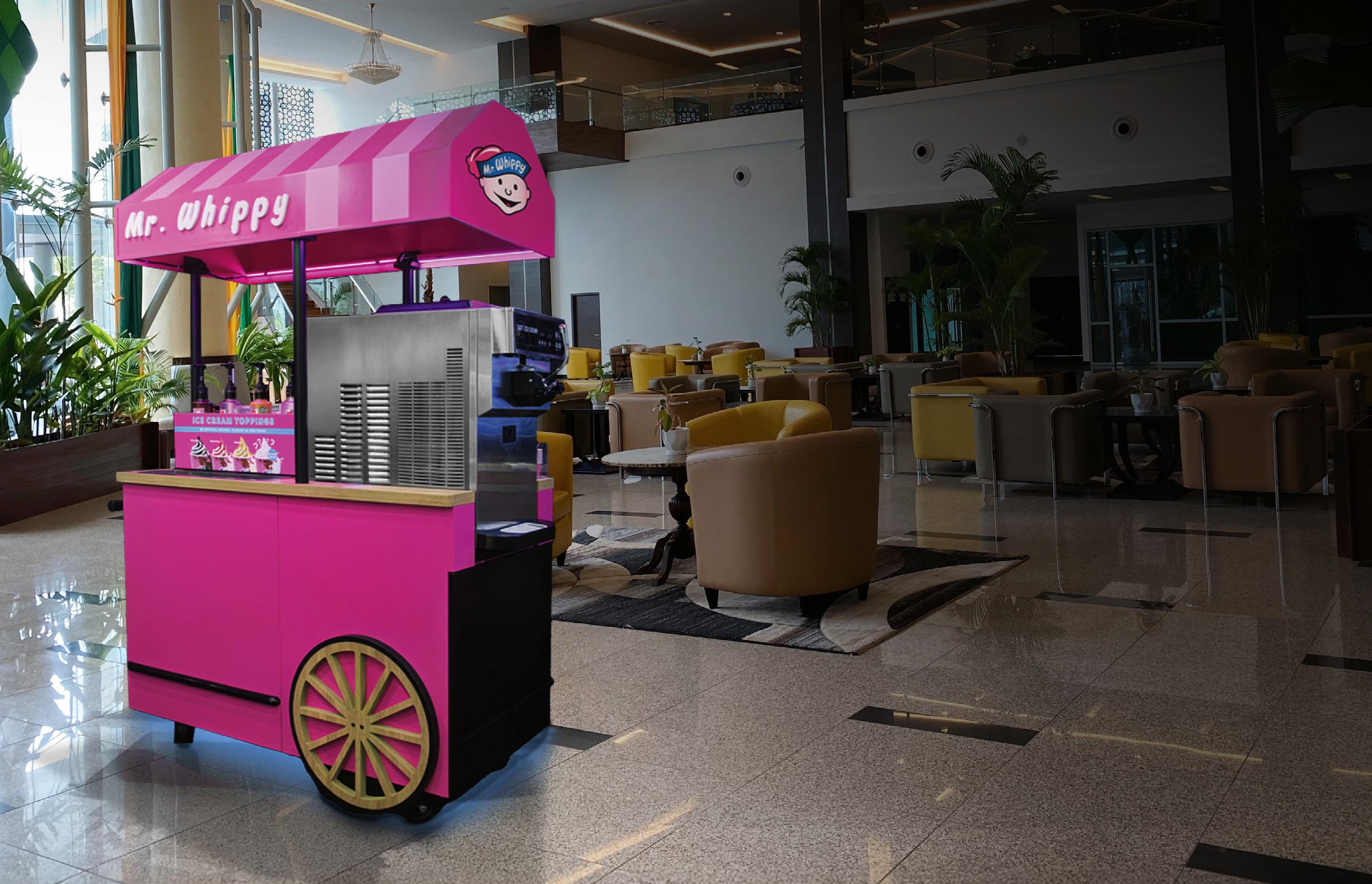


Place your order

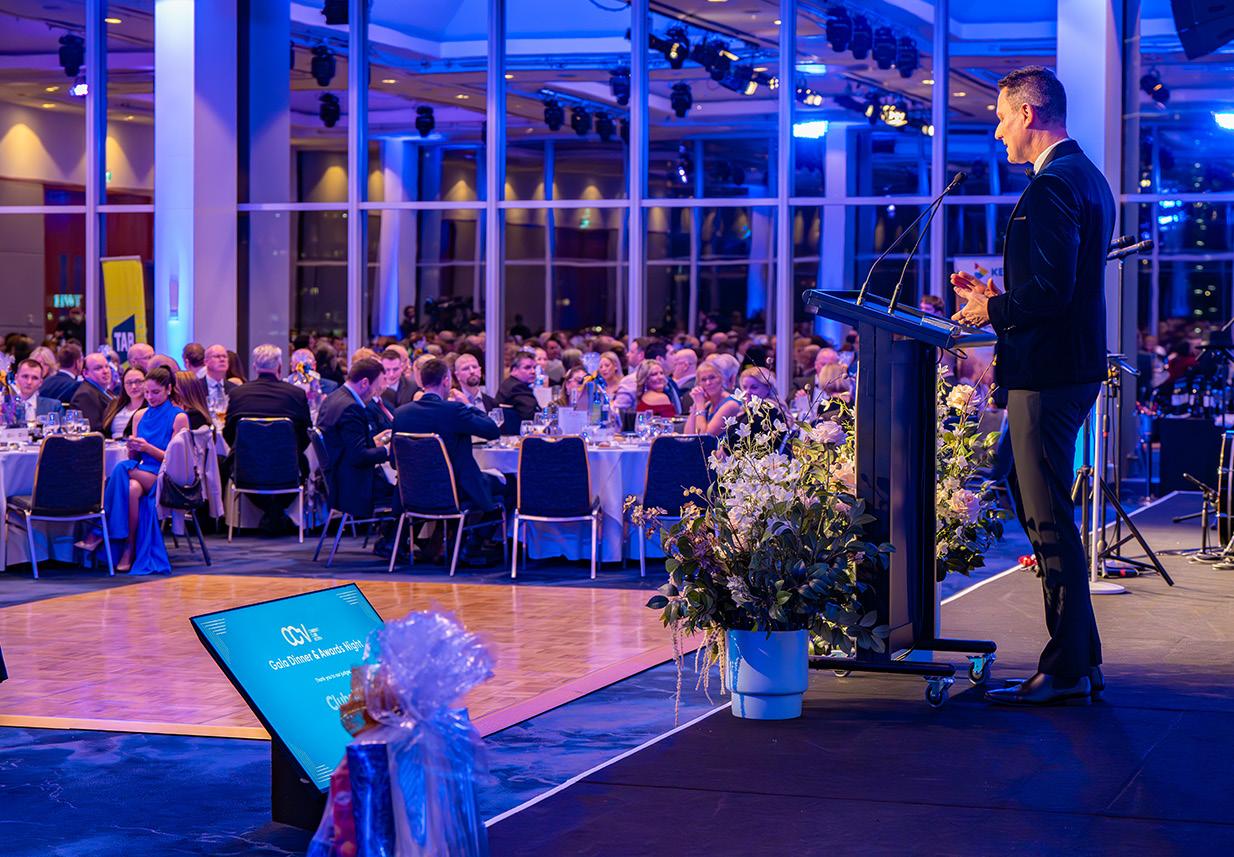
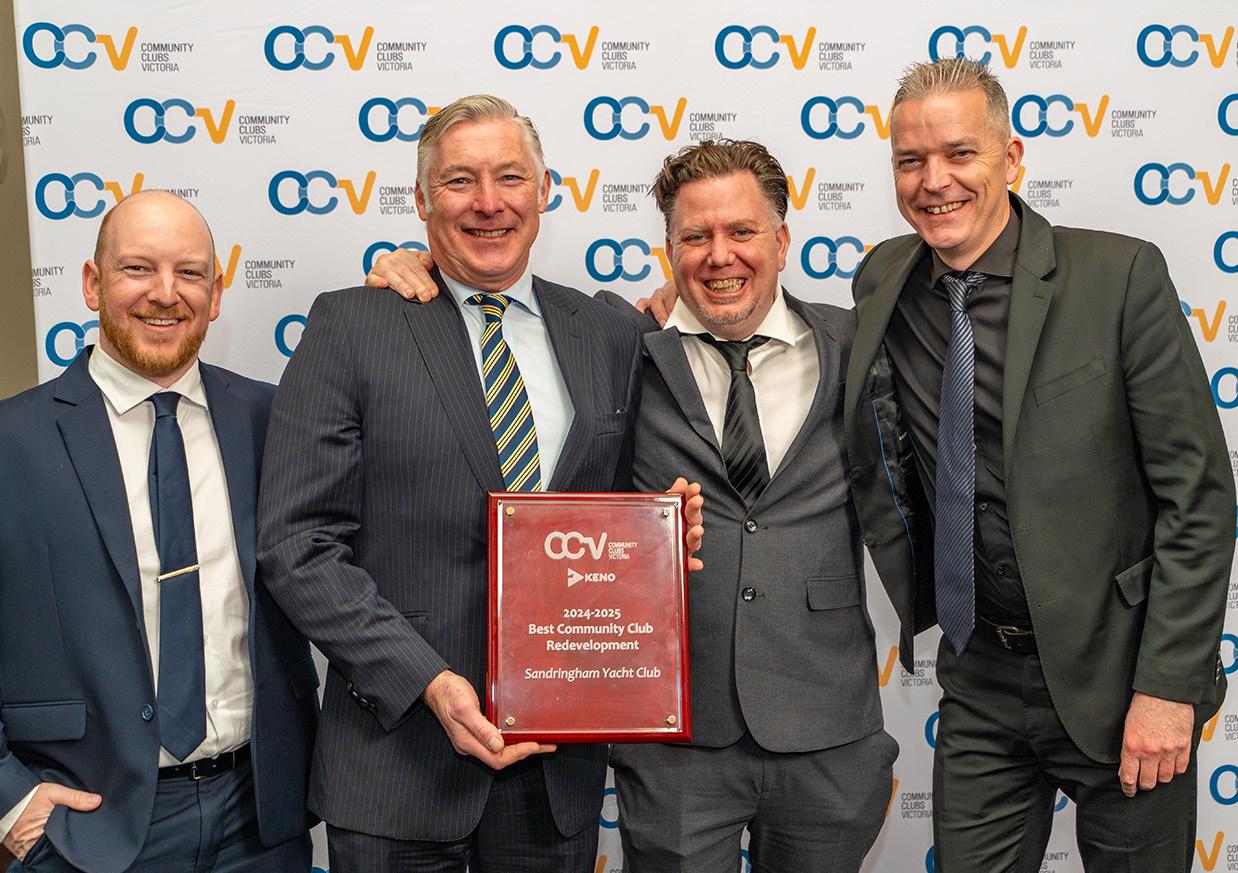
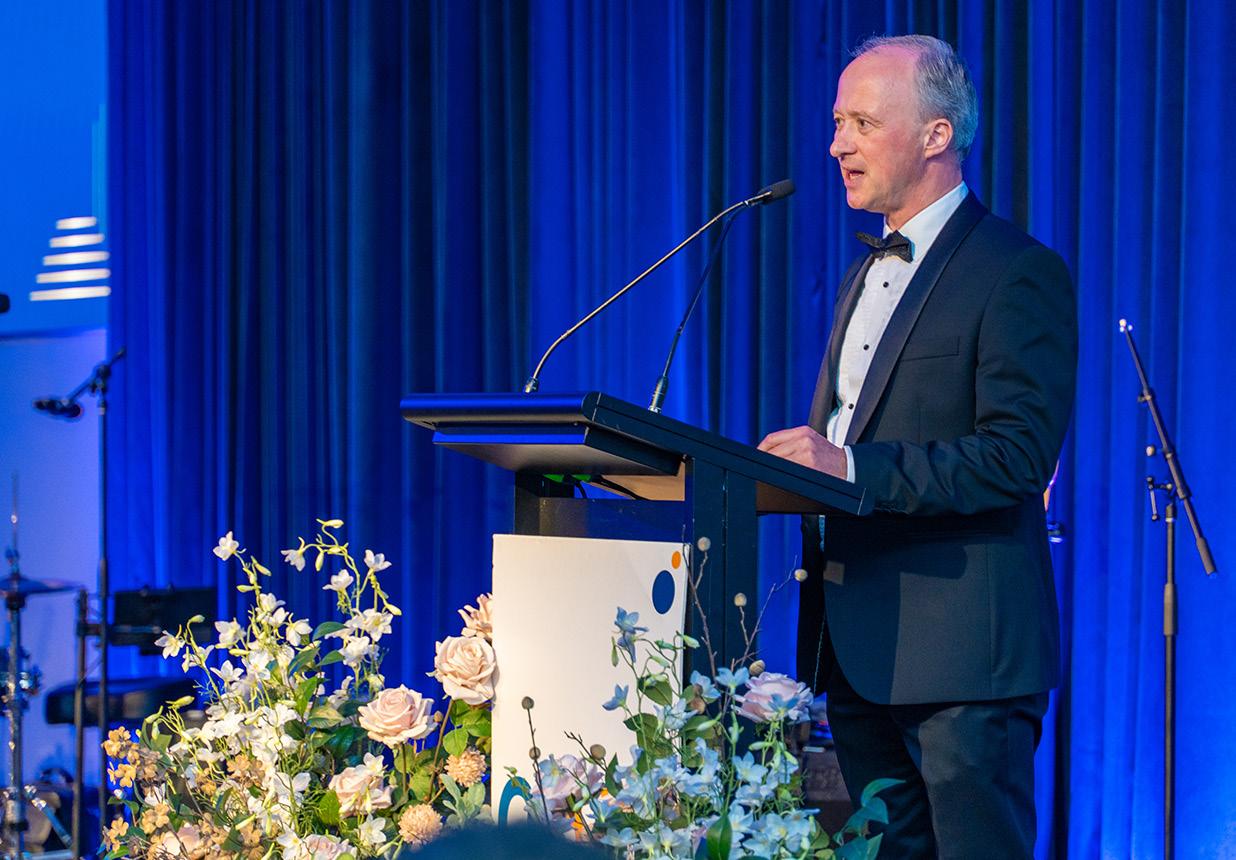
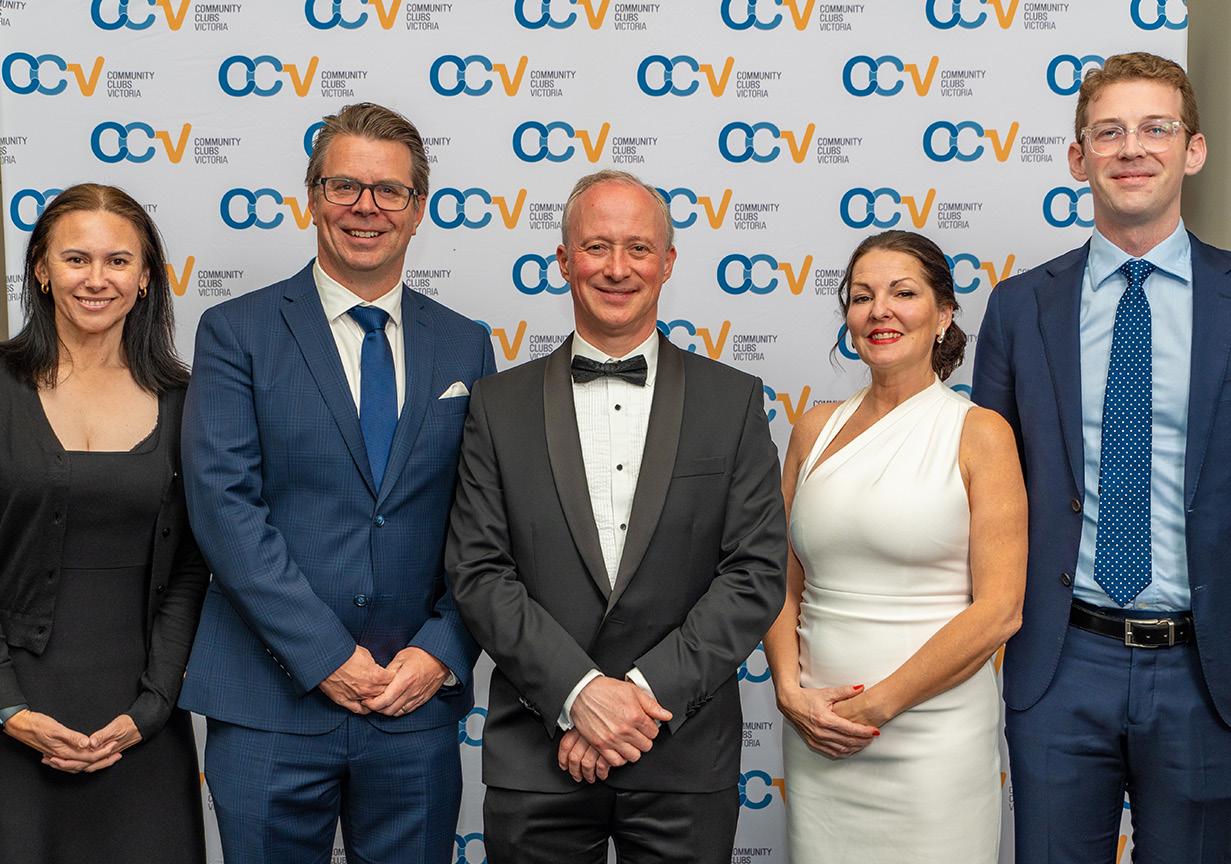
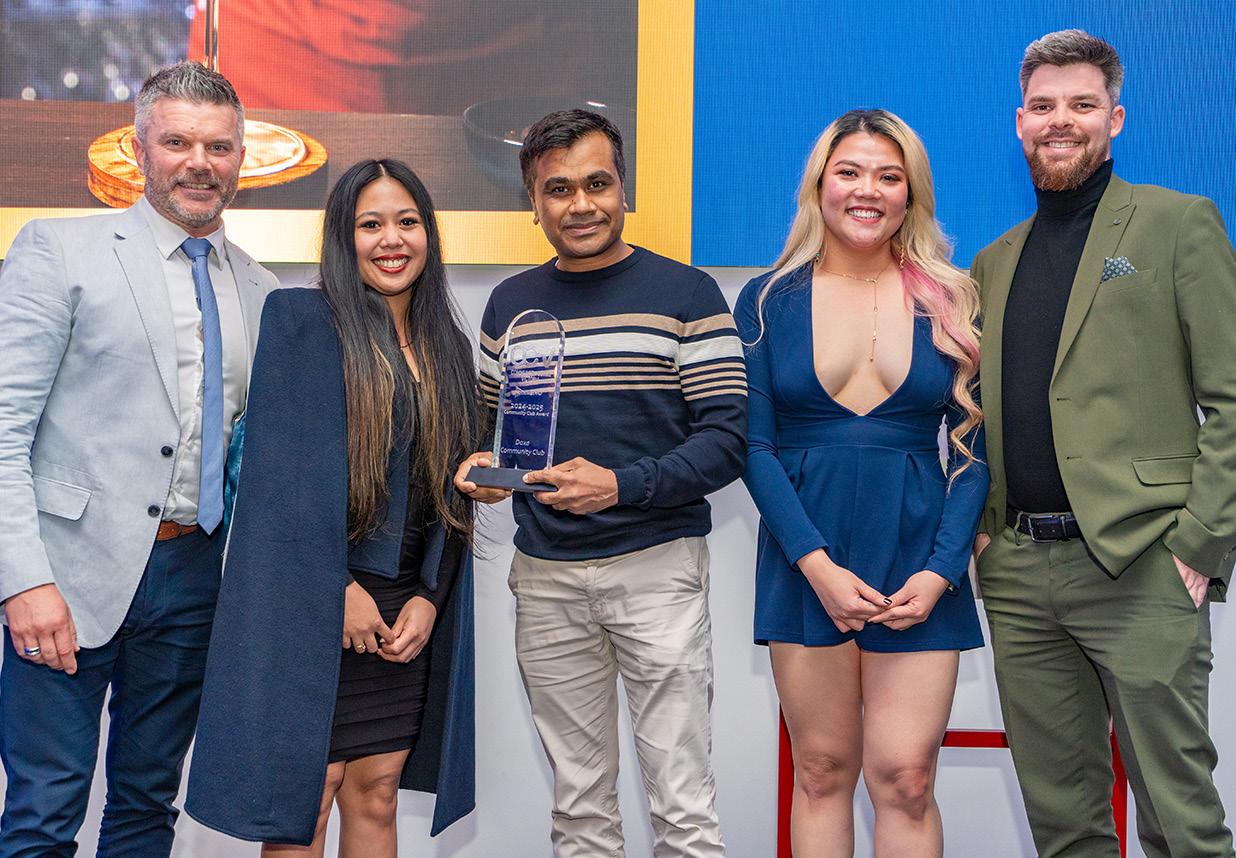
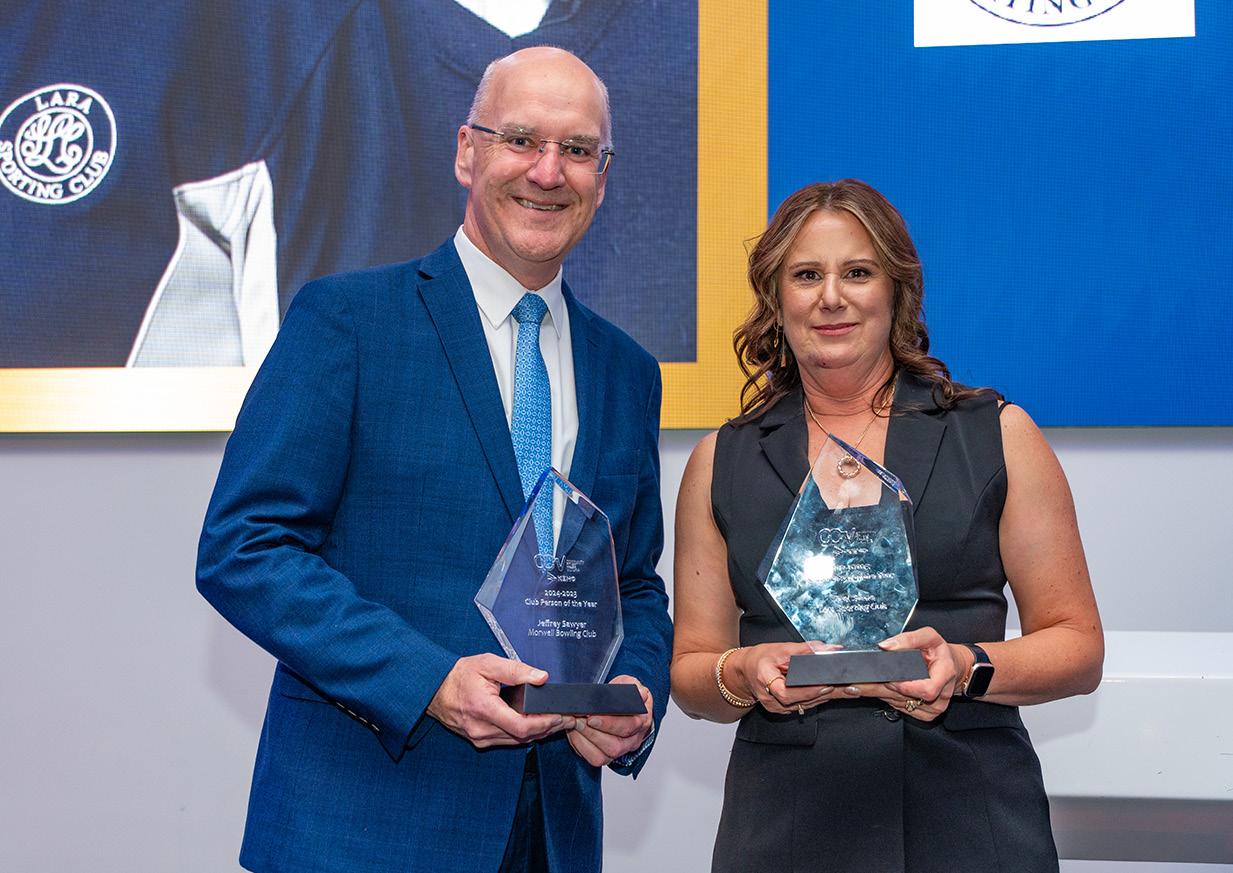
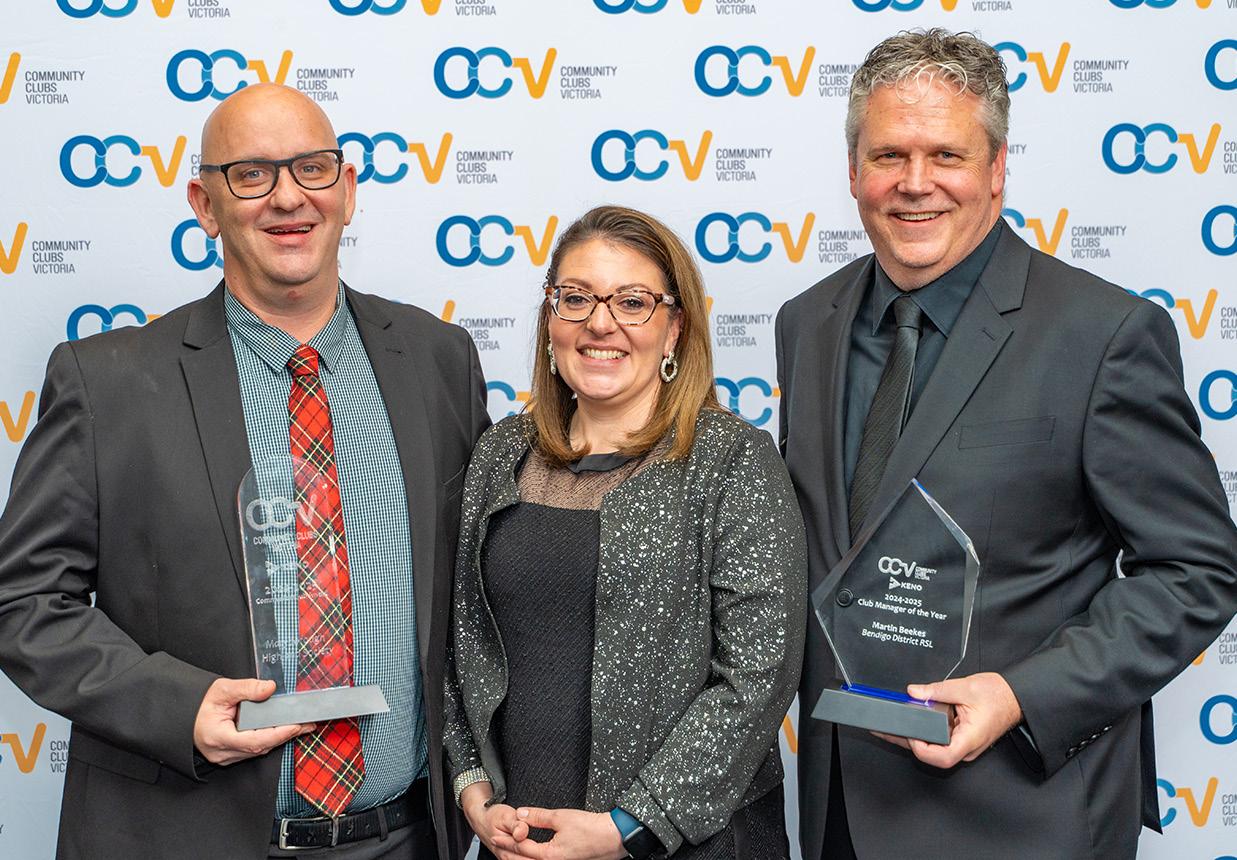
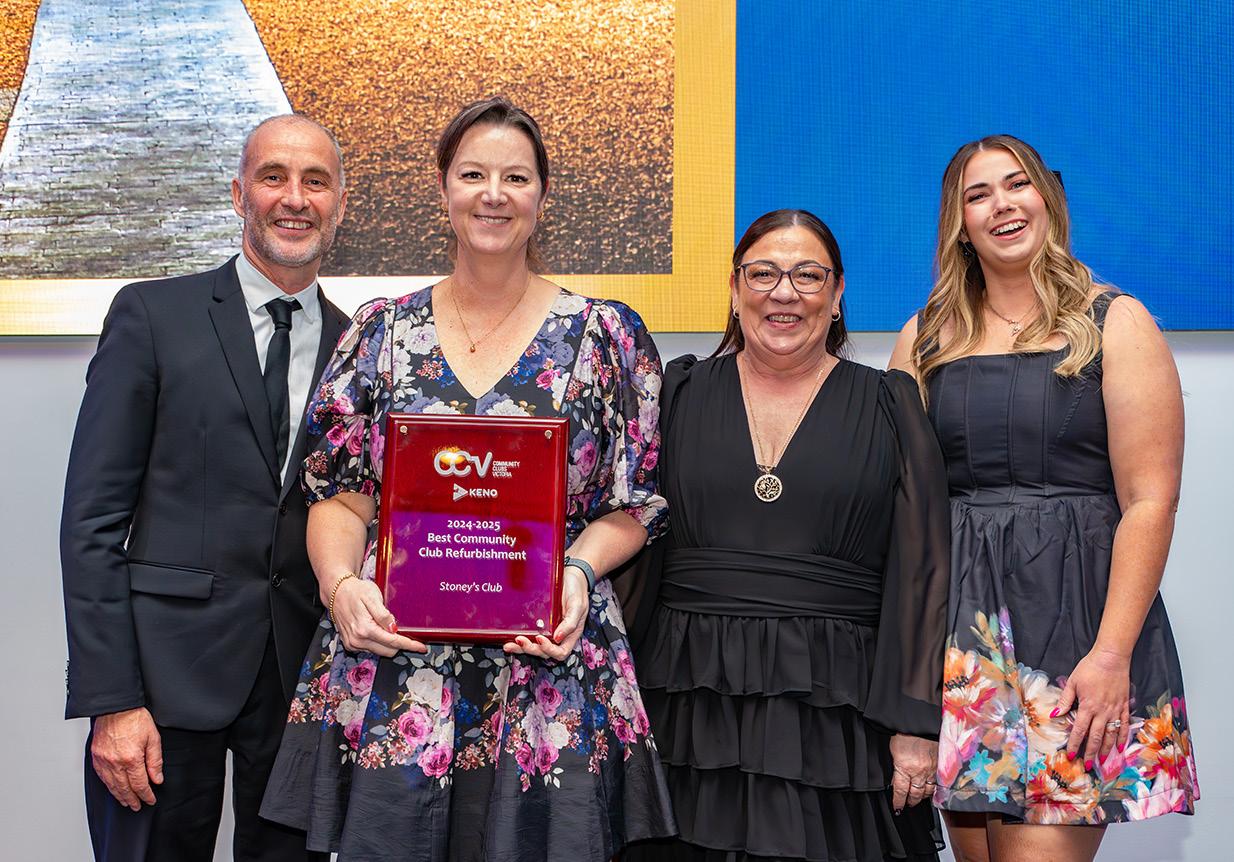
Then-CCV CEO Andrew Lloyd said this year’s awards held particular significance, given the operational challenges clubs continue to face.
Stoney’s Club was awarded the Best Club Refurbishment.
The Social Impact Award went to Warragul Sporting and Social Club.
Bendigo District RSL took home two awards.
The team at Doxa Community Club was awarded the Metro Community Club Award.
Sandringham Yacht Club took out the coveted Best Community Club Redevelopment Award.
Jeffrey Sawyer of Morwell Bowling Club and Carol Stone of Lara Sporting Club shared the honour of being named joint Club Persons of the Year.
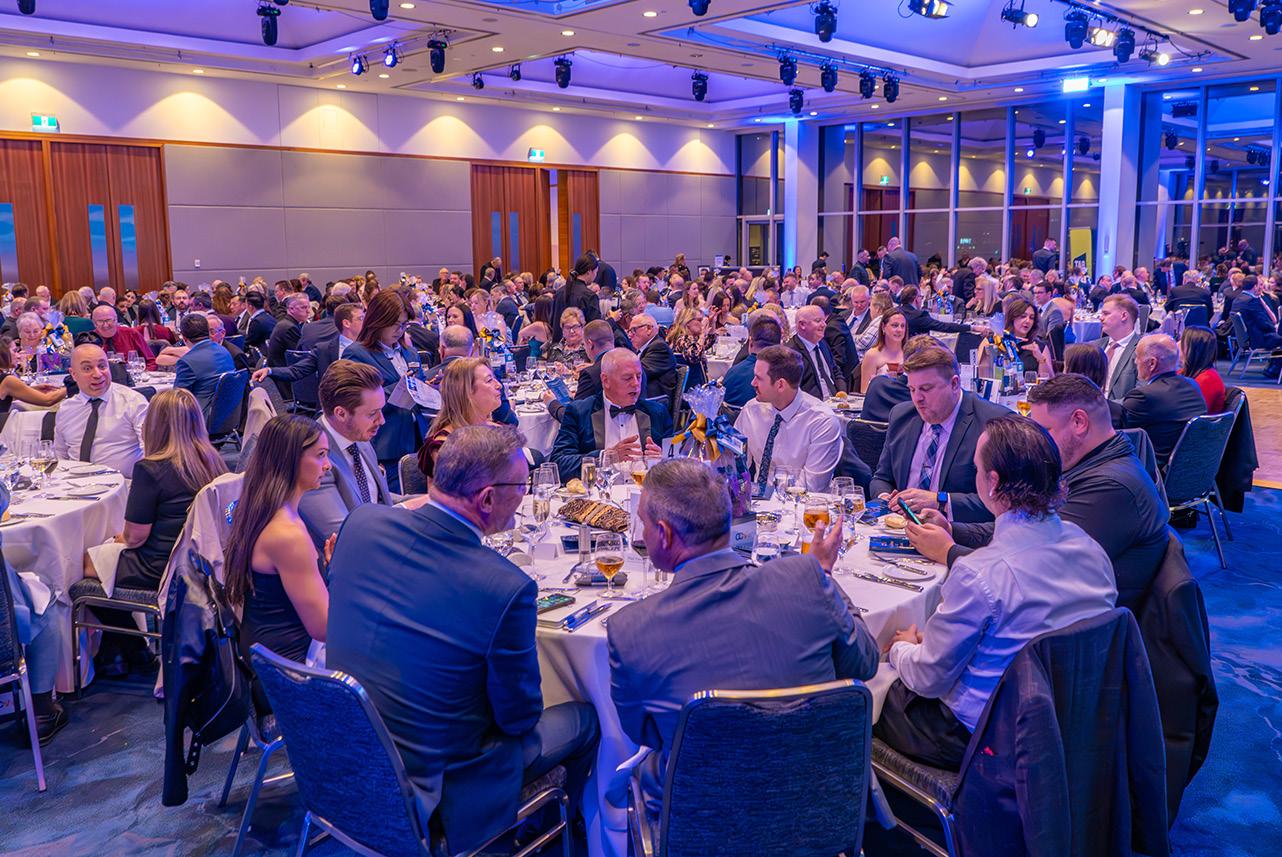
Victoria’s top clubs celebrated at 2025 CCV Awards
Victoria’s leading community clubs were honoured at the 2025 Community Clubs Victoria Gala Dinner and Awards Night on Saturday 5 July.
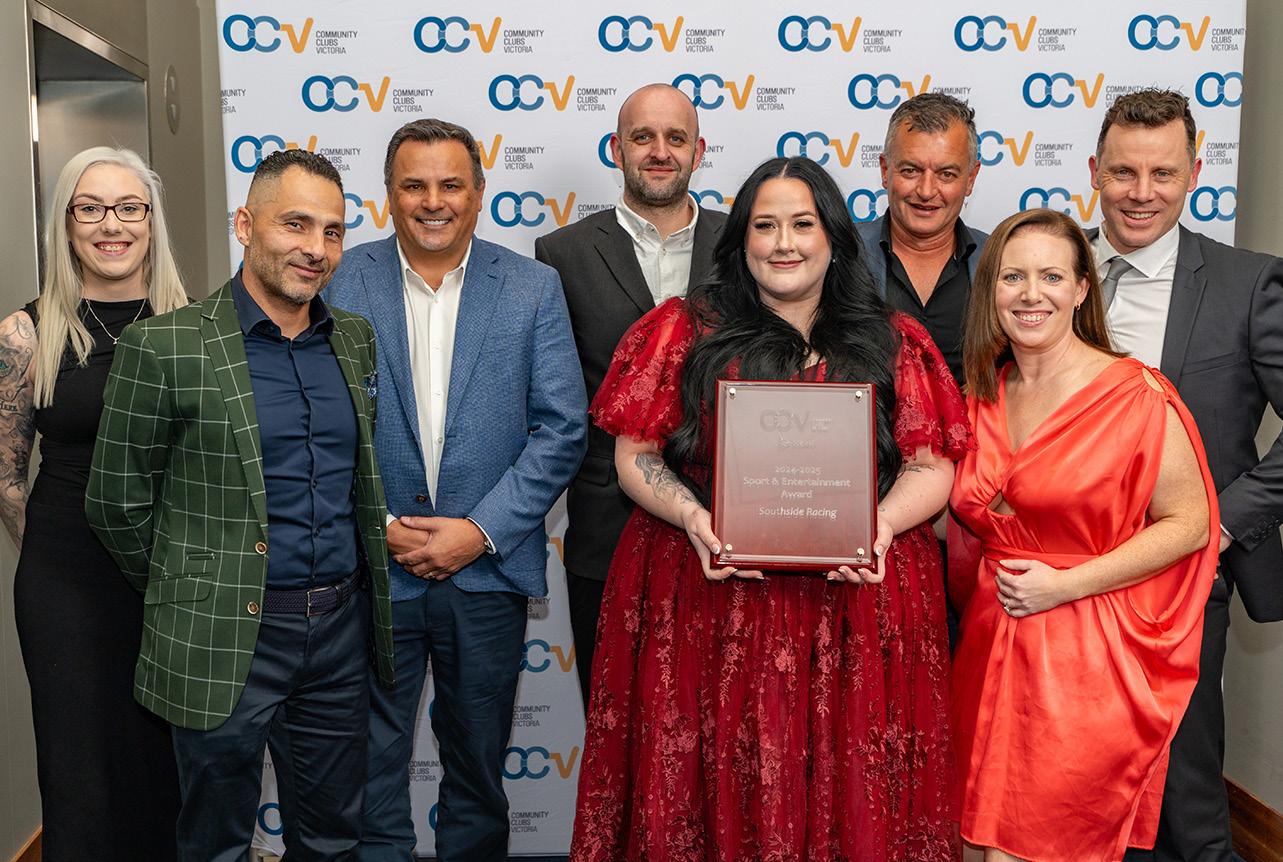
MORE THAN 300 industry stakeholders gathered for the annual event held at the RACV City Club in Melbourne, which recognises outstanding achievements in areas such as sustainability, entertainment, social impact and wellbeing.
Hosted by Community Clubs Victoria (CCV), the awards spotlight the people and venues driving positive change across the network of more than 1,000 community clubs across Victoria.
Then-CCV chief executive Andrew Lloyd said this year’s awards held particular significance.
“In a time when many clubs continue to face operational challenges, it’s more important than ever to celebrate the dedication, resilience, and positive impact of our clubs and their incredible staff,” he said.
“We’re proud to once again host this prestigious event, shining a light on the outstanding contributions being made across Victoria. It’s a privilege to honour those who strengthen the social and economic fabric of our communities.”
Among the night’s standout winners was Sandringham Yacht Club (SYC), which took home the Best Redevelopment award.
“The most rewarding aspect of our refurbishment at SYC by far has been the membership usage and uptake – they love it,” SYC chief executive Richard Hewett said.
“Additionally, the CCV award is nice recognition, as [the club] is a stunning space overlooking the Sandringham Harbour and when our fleets are sailing past, I’m not sure there’s many better views in Melbourne.”
Another standout was Doxa Community Club, which was named the Metro Community Club of the Year.
“This recognition is a real testament to the work of our incredible team across Clocks at Flinders Street Station, Central Point Melbourne, Miss Gunns Basement Bar and Betsy Jane Café, who bring to life the member experience we’re so proud of,” said Anthony Simioni, Doxa Community Club group general manager.
“This award acknowledges the values that are at the heart of everything we do, from quality facilities and member engagement to community support and staff development. More than just a hospitality provider, Doxa is a purpose-driven organisation, and it’s an honour to be recognised alongside other great clubs.”
CCV encompasses a vast network of over 1,000 community clubs across Victoria which employ more than 30,000 staff and serve approximately 2.3 million members. These clubs collectively contribute $1billion to the state economy, including community donations, subsidised access to facilities and volunteer work.
Turn the page for the list of winners >>>
Here’s
the full list of winners:
Best Community Club Redevelopment Award: Sandringham Yacht Club
Best Community Club Refurbishment Award: Stoney’s Club
Best Hospitality Team Award: Mulgrave Country Club
Best Member Experience Award: Greyhounds Entertainment
Best Sustainability Initiative Award: Chirnside Park Country Club
Club Manager of the Year Award: Martin Beekes, Bendigo District RSL
Club Person of the Year: Carol Stone, Lara Sporting Club; Jeffrey Sawyer, Morwell Bowling Club
Emerging Young Community Leader Award: Kylie McNeill, Club Noble
Metro Best Club Bistro/Restaurant: Frankston RSL
Regional Best Club Bistro/Restaurant: Phillip Island RSL
Metro Community Club Award: Doxa Community Club
Regional Community Club Award: Maryborough Highland Society
Regional Mental & Social Wellbeing Award: Bendigo District RSL
Social Impact Award: Warragul Sporting and Social Club
Sport & Entertainment Award: Southside Racing
Community Collaboration Award: Craigieburn Sporting Club
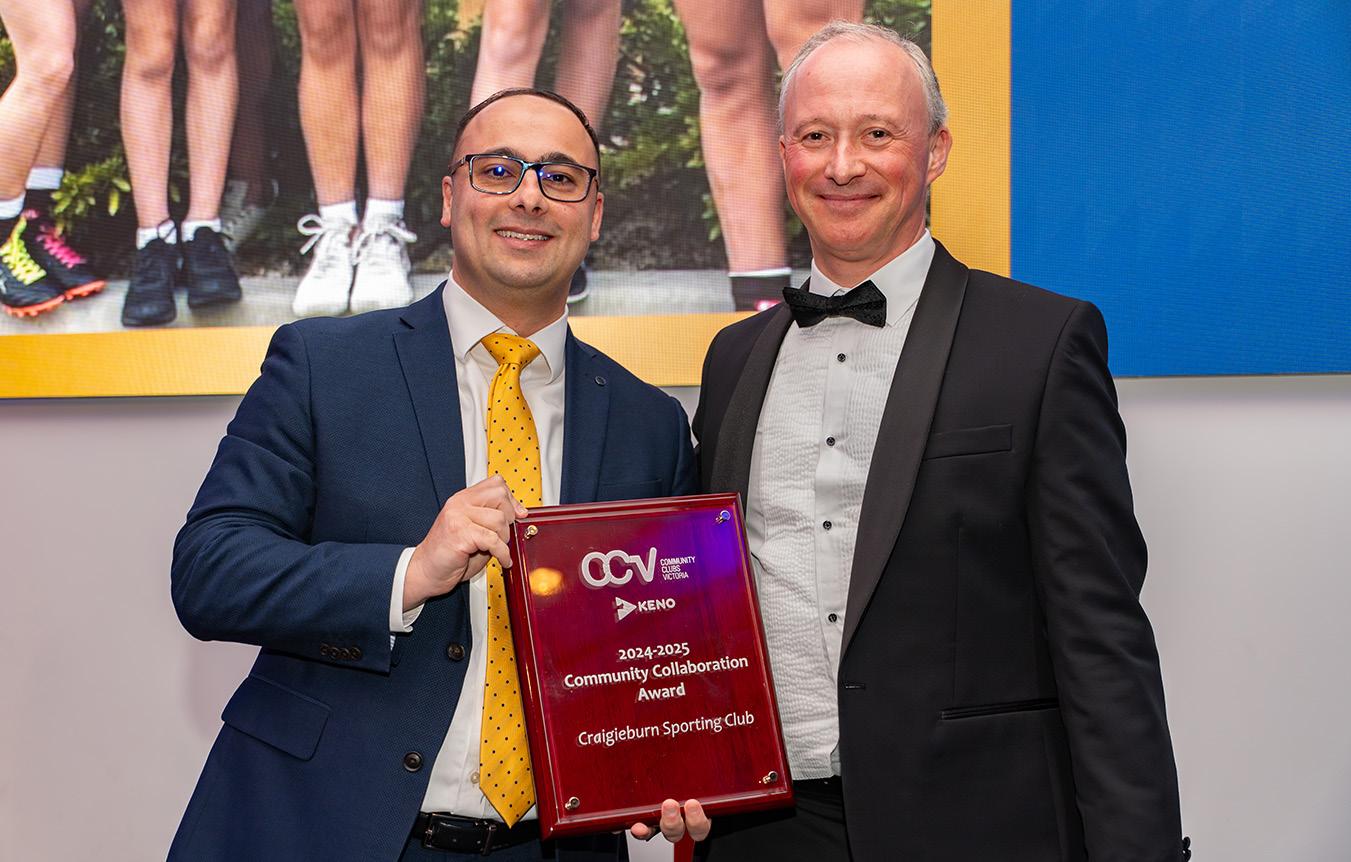
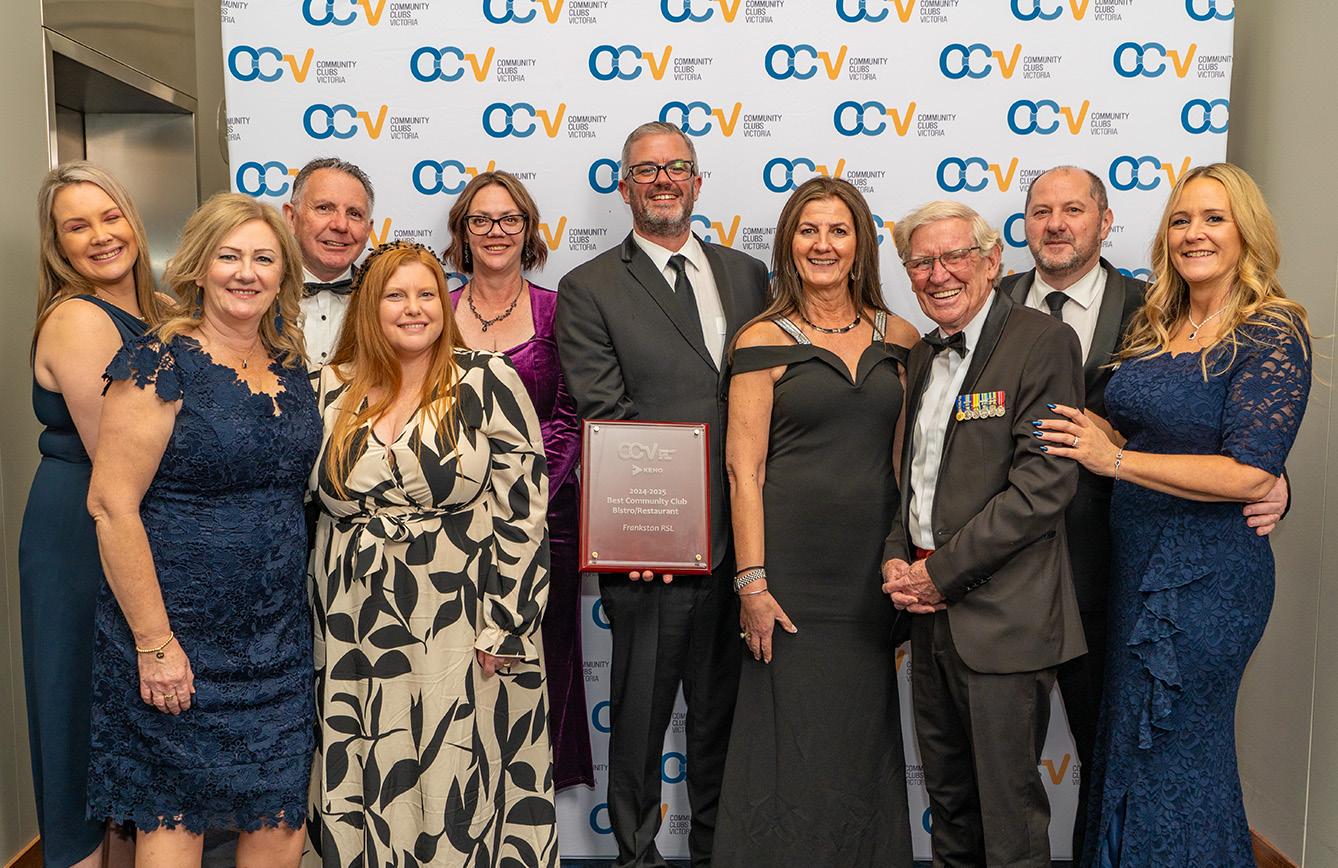
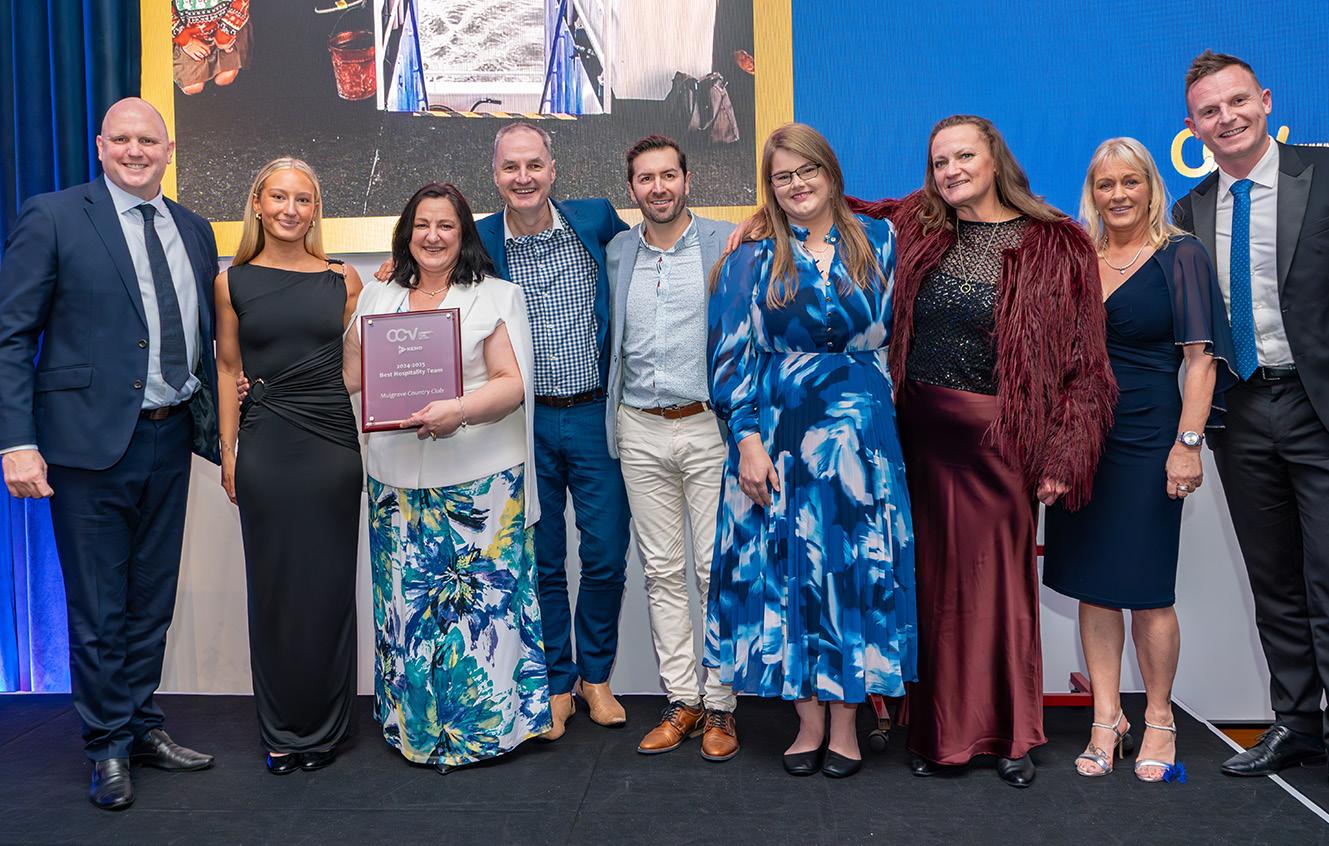
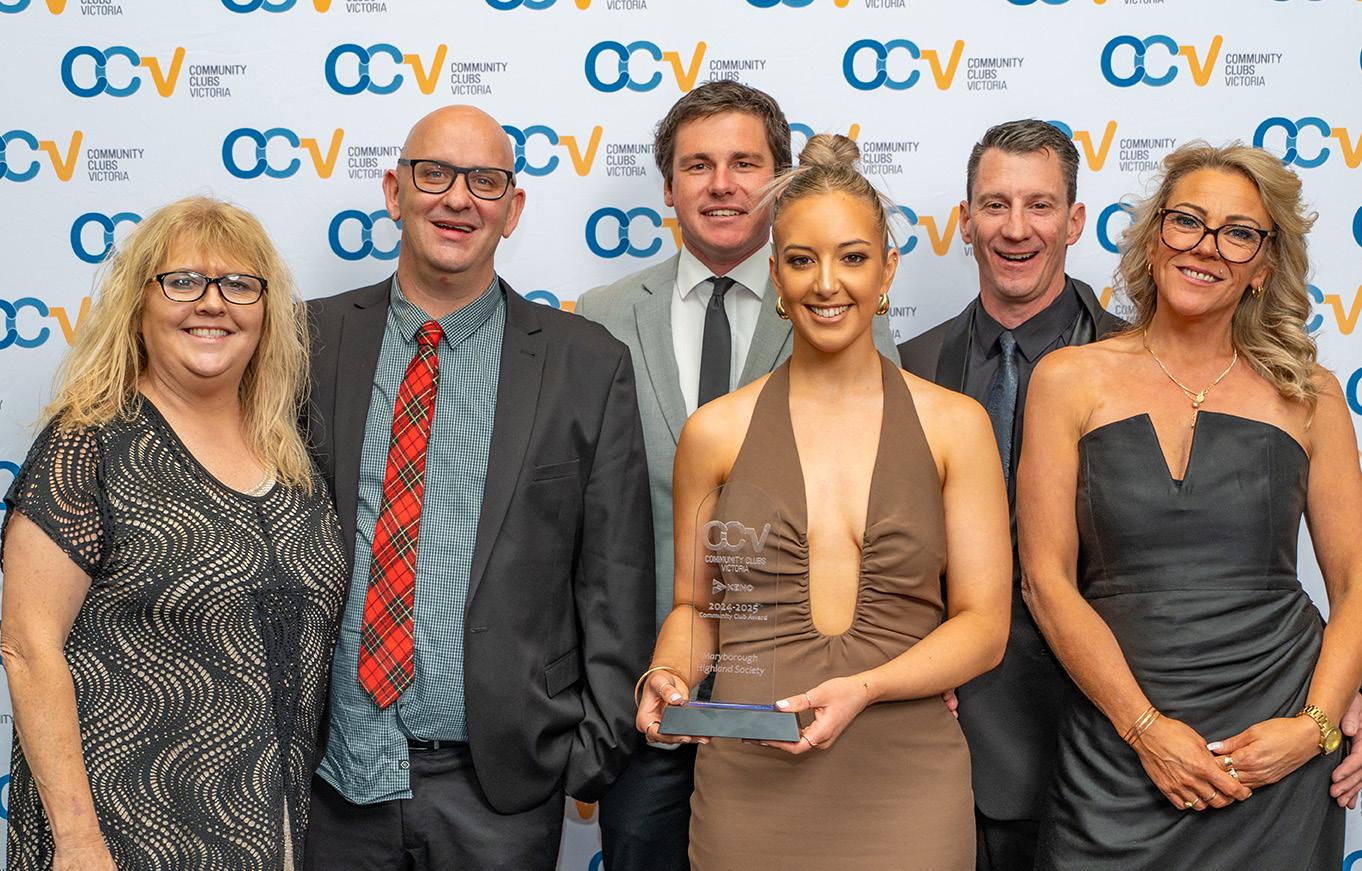
Craigieburn Sport Club was recognsied for its community collaboration efforts.
Frankston RSL took out the Best Metro Club Bistro/Restaurant category.
Mulgrave Country Club was recognised for having the best hospitality team.
Maryborough Highland Society won the Regional Community Club award.


Angela Burling is the recipient of the 2025 Women in Clubs Bursary, as she leads Kirwan Sports Club with purpose and passion.
Named as the 2025 Women in Clubs Bursary recipient, Kirwan Sports Club operations manager Angela Burling has been recognised for leading with purpose and passion, cultivating a safe and inclusive environment.
ANGELA BURLING REFLECTS on how her recent award win is a powerful reminder that women in clubs are making real, lasting changes.
What does a typical day look like?
No two days are exactly the same and that’s what I love about it. I oversee the day-to-day functioning of the venue, which includes managing rosters, supporting department heads, ensuring compliance, and responding to operational challenges as they arise.
I spend time on the floor, checking in with staff and engaging with members, and I’m often coordinating with suppliers, reviewing reports, or planning upcoming events. I also prioritise team development and mentoring, so part of my day is always invested in helping staff grow in confidence and capability. It’s a fast-paced, dynamic environment that keeps me on my toes and constantly learning.
What drew you to work in the clubs industry in the first place?
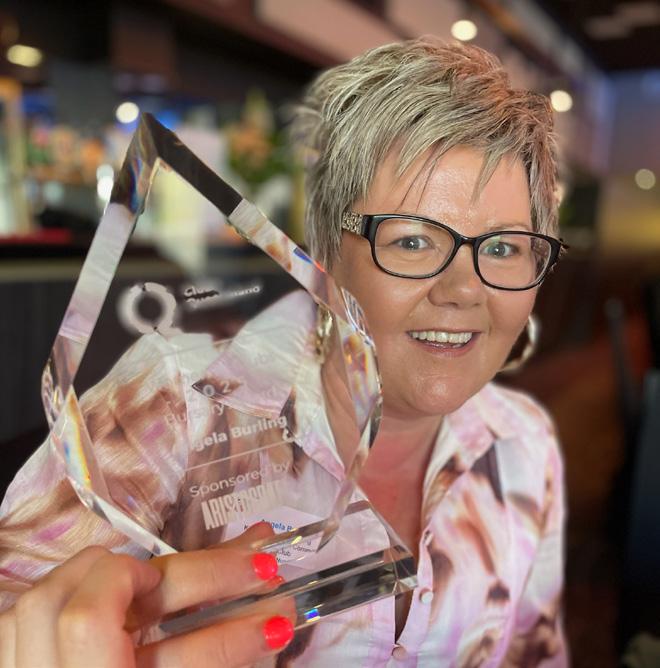
Q&A Angela Burling
Operations manager Kirwan Sports Club
Initially, it was the energy and community spirit of clubs that drew me into that unique blend of hospitality, events, and people-first service. Over time, what kept me here was the opportunity to make a meaningful impact. Clubs are more than just venues; they’re hubs for connection, support, and community. Being part of a space that brings people together and uplifts the community is incredibly rewarding.
What’s one piece of advice you’d give your younger self?
Believe in your voice even when it feels uncomfortable to speak up. I’d tell my younger self that leadership isn’t about having all the answers, it’s about having the courage to keep learning, to support others, and to stand firm in your values. Confidence grows with experience, but it starts with trusting your instincts and being brave enough to use your seat at the table.
What’s something you’re proud to have achieved in your role?
One of the things I’m most proud of is the team culture we’ve built that genuinely supports, includes, and uplifts each other. I’ve focused on creating a workplace where people feel seen, valued, and empowered to grow. Whether it’s through mentoring new staff, celebrating wins big and small, or just making sure everyone feels part of the journey.
If you weren’t working in this industry, what do you think you’d be doing instead?
If I weren’t in the club industry, I’d be living out my other passion working in the travel and tourism space, ideally as a tour leader or experience coordinator. I can see myself leading small group adventures through tropical islands, bustling cities, or remote outback landscapes, sharing local secrets, creating unforgettable moments, and making every guest feel like they’re part of something special. There’s something magical about travel: the stories, the spontaneity, the human connection. Just like in hospitality, it’s about making people feel at ease, creating joy, and helping them experience something new. I’d still be doing what I love most, connecting with people and creating memories they’ll never forget.
Super Staff














HOSTPLUS OUTSTANDING VALUE SUPER
8 YEARS IN A ROW
We’re proud to have won Canstar’s Outstanding Value Super Award for the eighth year in a row. The award recognises our strong long-term performance, competitive fees and an array of product features. So it’s not just a win for us, but a win for our members.
MASTERING THE ELEMENTS
EXPAND YOUR PRODUCT OFFERINGS
Diversify your club’s cafe o ering with Airex Freestanding and countertop displays. Available in heated and refrigerated options, Airex has your club’s cafe needs covered.
